

TriQuarterly
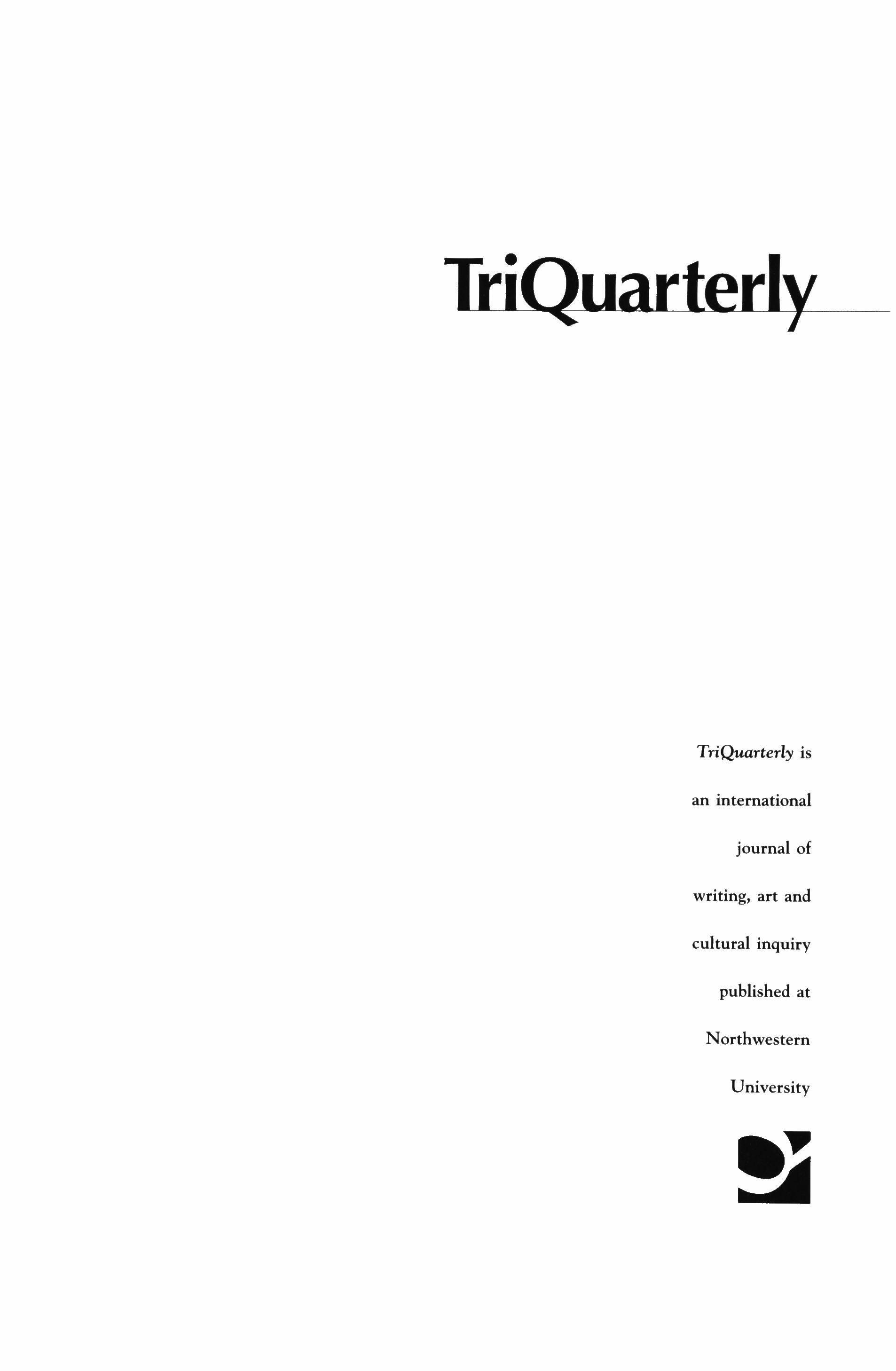
TriQuarterly is an international journal of writing, art and cultural inquiry published at Northwestern University

�_���___.]jriQE---'-u_a-.-rt_e._.._.rl�y
Editor
Susan Firestone Hahn
Associate Editor
Ian Morris
Operations Coordinator
Kirstie Felland
Production Editor
Vincent Chung
Cover Design
Gini Kondziolka
Editorial Assistants
Laura Hadden
Lindsay Meck
Assistant Editor
W. Huntting Howell
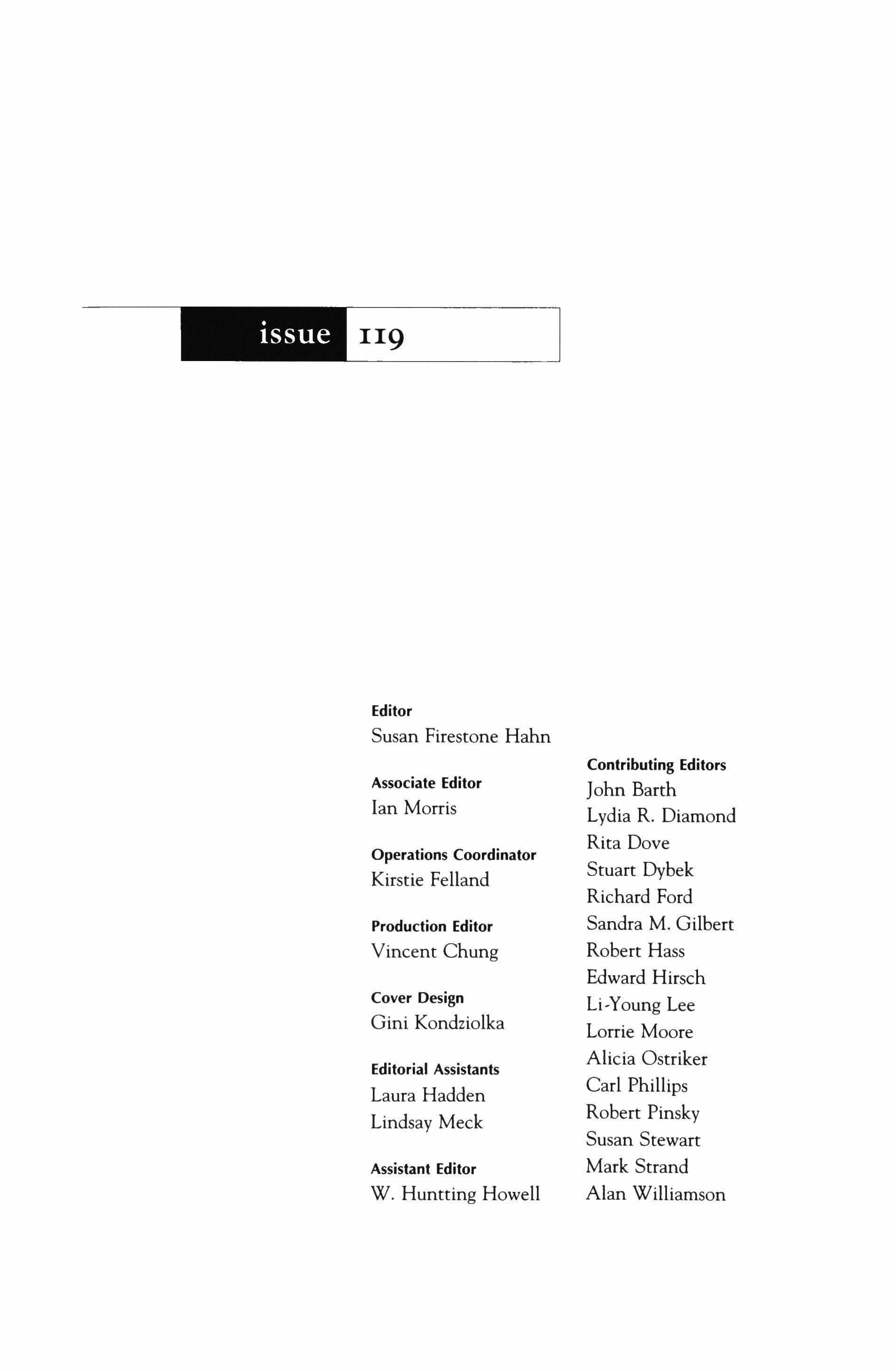
Contributing Editors
John Barth
Lydia R. Diamond
Rita Dove
Stuart Dybek
Richard Ford
Sandra M. Gilbert
Robert Hass
Edward Hirsch
Li-Young Lee
Lorrie Moore
Alicia Ostriker
Carl Phillips
Robert Pinsky
Susan Stewart
Mark Strand
Alan Williamson
119

Editors of This Issue
Nancy Eimers and William Olsen
4
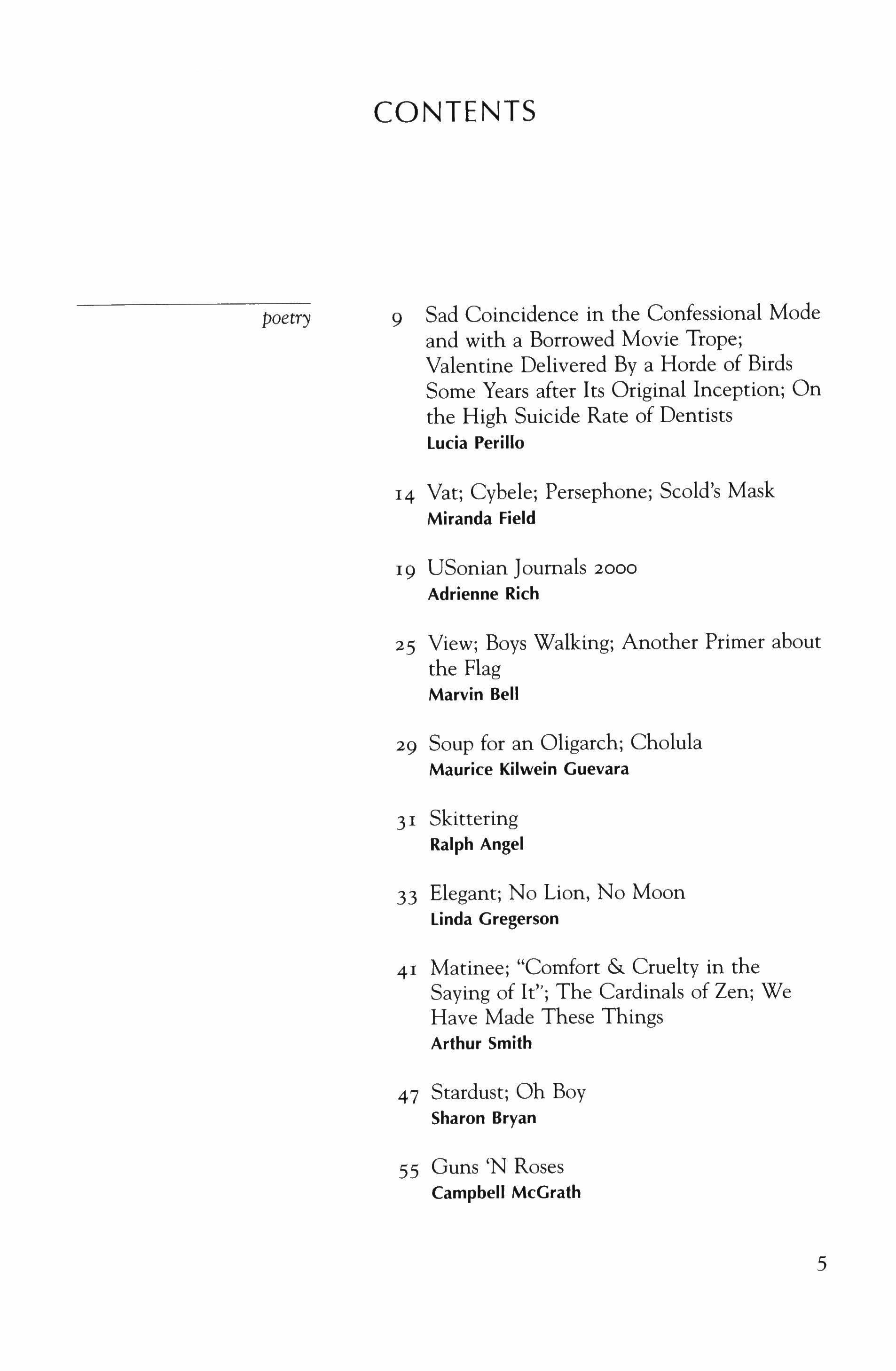
Sad Coincidence in the Confessional Mode and with a Borrowed Movie Trope; Valentine Delivered By a Horde of Birds
Some Years after Its Original Inception; On the High Suicide Rate of Dentists
Lucia Perillo 14 Vat; Cybele; Persephone; Scold's Mask
Miranda Field
USonian Journals 2000
Adrienne Rich 25 View; Boys Walking; Another Primer about the Flag
Marvin Bell 29 Soup for an Oligarch; Cholula
Maurice Kilwein Guevara
Skittering
Ralph Angel
Elegant; No Lion, No Moon
Linda Gregerson 41 Matinee; "Comfort & Cruelty in the Saying of It"; The Cardinals of Zen; We Have Made These Things
Arthur Smith
Stardust; Oh Boy Sharon Bryan
Guns 'N Roses Campbell McGrath
CONTENTS
poetry 9
19
31
33
5
47
55

59 Inkling
Michelle Boisseau
61 Small Casket; Face Lift, One; Blue Distances, Northern California
Dorothy Barresi
67 Sermonette; Hope; 0 Canada; Beautiful Day; Creche
Mary Ruefle
73 The Fish Cypher of Michel De Nostradam; The Pendulum
Norman Dubie
78 Board Book & the Costume of a Whooping Crane
David Wojahn
81 For My Mother in Lieu of Mourning; Dust Reginald Shepherd
85 A Haze on the Hills; Page by Page; My Grandmother Told Me
Pamela Stewart
88 On Whether What Was Found or Not Was Looked For; How You Knew You Were Naked
James D'Agostino
93 The New Gods; Picturing Happiness
Jack Myers
95 Mother Lets Off a Little Steam; What's My Line
J. Allyn Rosser
105 The Yellow House Alone in Snow; Pursuit of the Yellow House
Robin Behn
110 Thinking of Red; Stroke; Matins: Gregor Mendel and the Bees
Linda Bierds
6
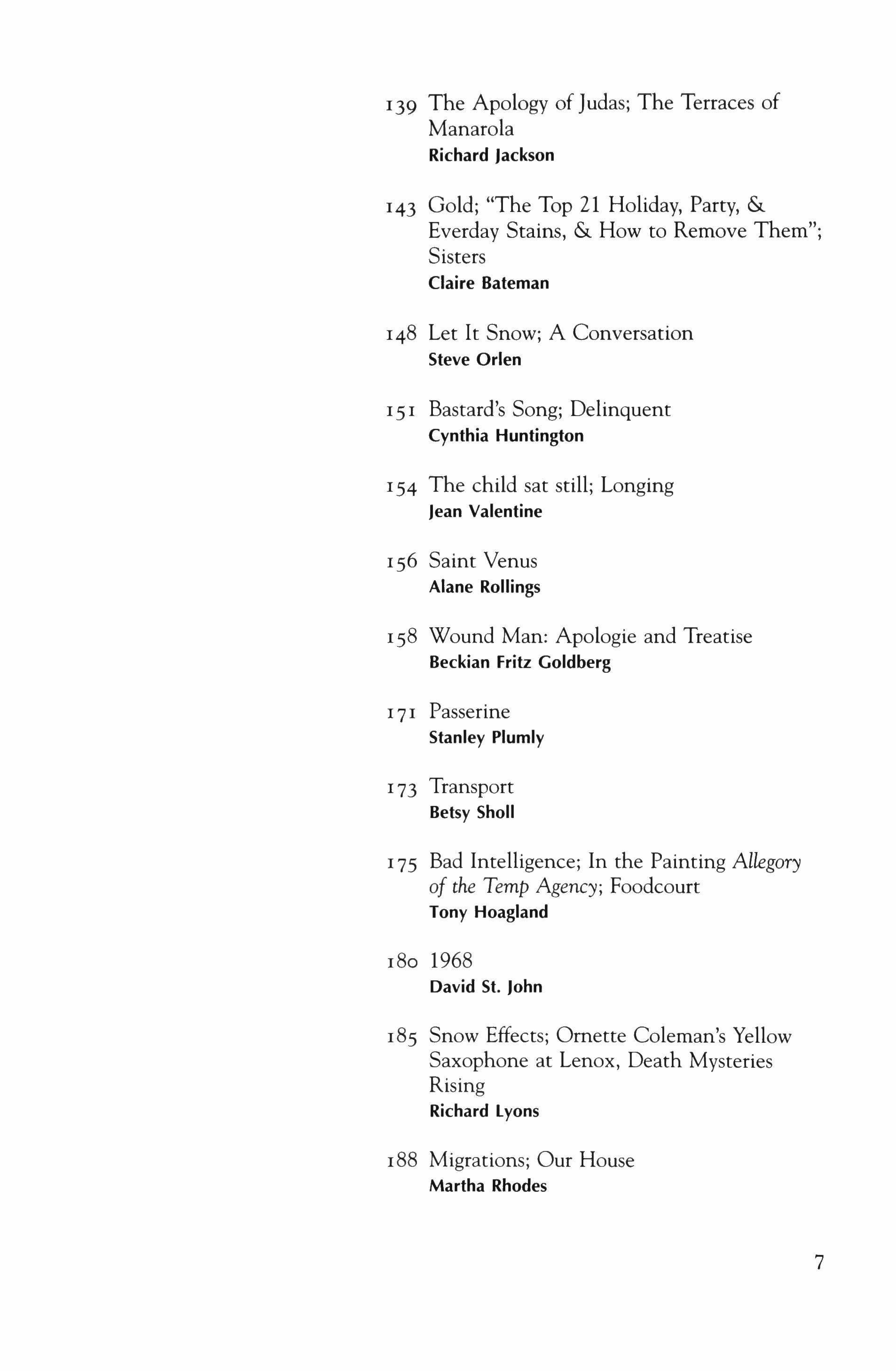
139 The Apology of Judas; The Terraces of Manarola
Richard Jackson
143 Gold; "The Top 21 Holiday, Party, & Everday Stains, & How to Remove Them";
Sisters
Claire Bateman
148 Let It Snow; A Conversation
Steve Orlen
151 Bastard's Song; Delinquent
Cynthia Huntington
154 The child sat still; Longing
Jean Valentine
156 Saint Venus
Alane Rollings
158 Wound Man: Apologie and Treatise
Beckian Fritz Goldberg
I 7 I Passerine
Stanley Plumly
173 Transport
Betsy Sholl
175 Bad Intelligence; In the Painting Allegory of the Temp Agency; Foodcourt
Tony Hoagland
180 1968
David st. John
185 Snow Effects; Omette Coleman's Yellow Saxophone at Lenox, Death Mysteries
Rising
Richard Lyons
188 Migrations; Our House
Martha Rhodes
7
192 Bonite in the Park; Special Heads; Fiction
Funk
Mark Halliday
198 Lost, But for a Few Still-Bright Details; Plumage
Carl Phillips
201 Midtown; A Tulip Tree
John Koethe
translations 98 from The Night
Jaime Saenz
Translated from the Spanish by Forrest Gander and Kent Johnson
103 [I am the insect from my forest]; [The sun opens its lips and tells us]
Alfonso 0'Aquino
Translated from the Spanish by James Ryang
essay I 15 On He Flared
Stanley Plumly
205 Contributors
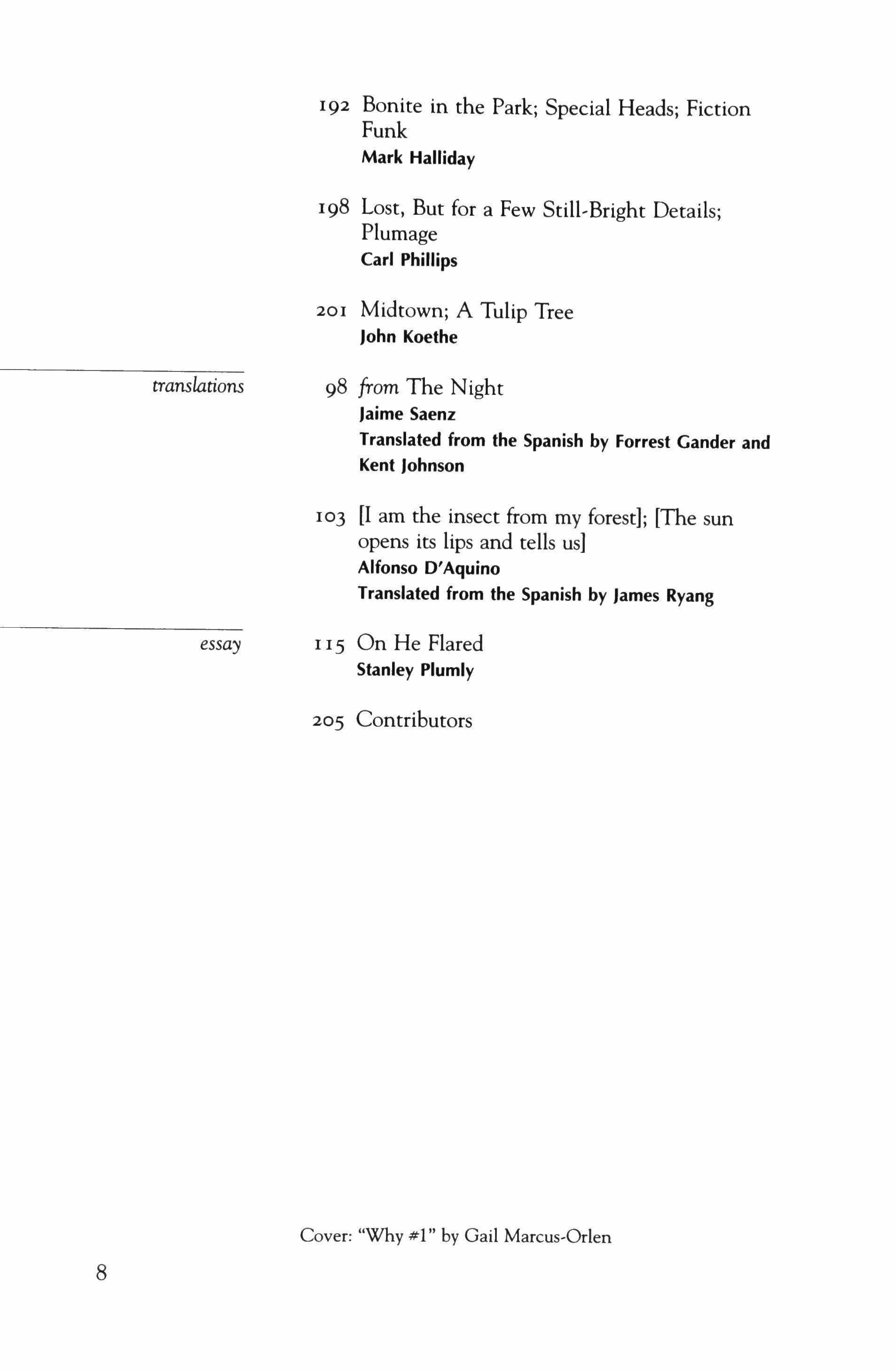
Cover: "Why #1" by
Gail Marcus-Orlen
8
Lucia Perillo
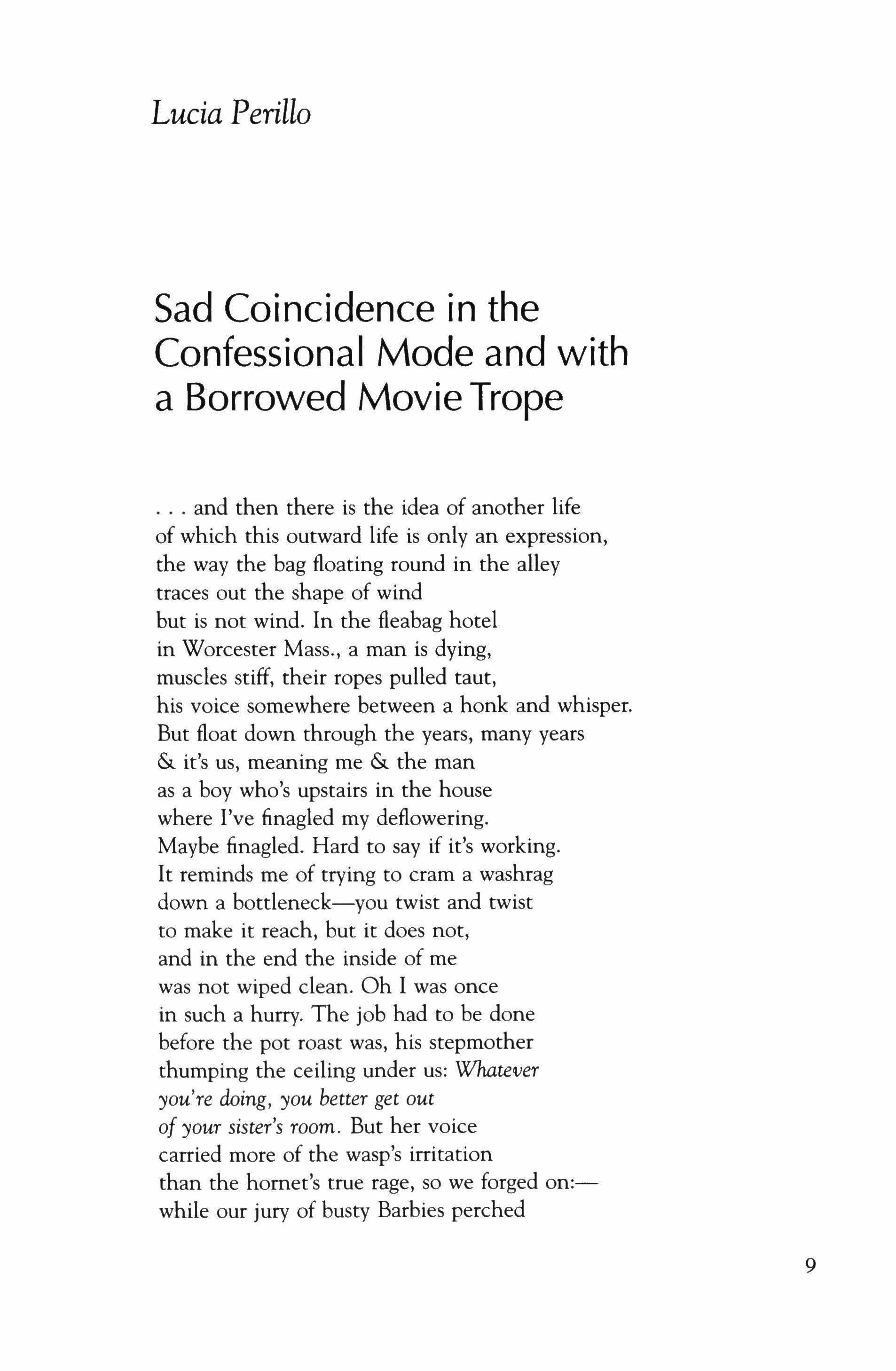
Sad Coincidence in the
Confessional Mode and with a Borrowed Movie Trope
and then there is the idea of another life of which this outward life is only an expression, the way the bag floating round in the alley traces out the shape of wind but is not wind. In the fleabag hotel in Worcester Mass., a man is dying, muscles stiff, their ropes pulled taut, his voice somewhere between a honk and whisper. But float down through the years, many years & it's us, meaning me & the man as a boy who's upstairs in the house where I've finagled my deflowering. Maybe finagled. Hard to say if it's working. It reminds me of trying to cram a washrag down a bottleneck-you twist and twist to make it reach, but it does not, and in the end the inside of me was not wiped clean. Oh I was once in such a hurry. The job had to be done before the pot roast was, his stepmother thumping the ceiling under us: Whatever you're doing, you better get out of your sister's room. But her voice carried more of the wasp's irritation than the hornet's true rage, so we forged on:while our jury of busty Barbies perched
9
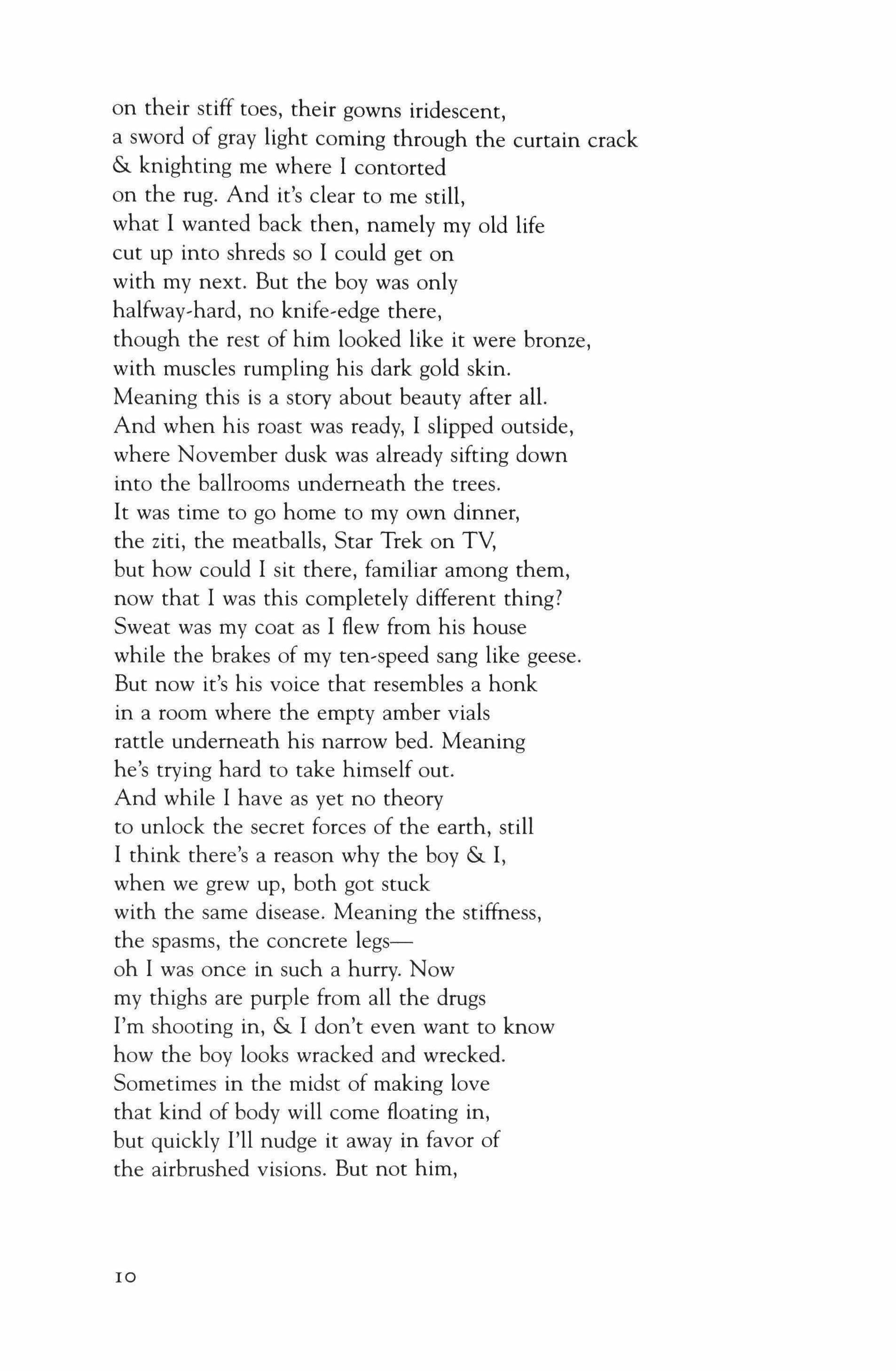
on their stiff toes, their gowns iridescent, a sword of gray light coming through the curtain crack & knighting me where I contorted on the rug. And it's clear to me still, what I wanted back then, namely my old life cut up into shreds so I could get on with my next. But the boy was only halfway-hard, no knife-edge there, though the rest of him looked like it were bronze, with muscles rumpling his dark gold skin. Meaning this is a story about beauty after all. And when his roast was ready, I slipped outside, where November dusk was already sifting down into the ballrooms underneath the trees. It was time to go home to my own dinner, the ziti, the meatballs, Star Trek on TV, but how could I sit there, familiar among them, now that I was this completely different thing? Sweat was my coat as I flew from his house while the brakes of my ten-speed sang like geese. But now it's his voice that resembles a honk in a room where the empty amber vials rattle underneath his narrow bed. Meaning he's trying hard to take himself out. And while I have as yet no theory to unlock the secret forces of the earth, still I think there's a reason why the boy & I, when we grew up, both got stuck with the same disease. Meaning the stiffness, the spasms, the concrete legsoh I was once in such a hurry. Now my thighs are purple from all the drugs I'm shooting in, & I don't even want to know how the boy looks wracked and wrecked. Sometimes in the midst of making love that kind of body will come floating in, but quickly I'll nudge it away in favor of the airbrushed visions. But not him,
10

the young him, the brass plate of whose belly would be more lovely than I could bear, though in chaster moments I will visit that alcove of me where his torso is struck by all the dark gold light that still slants in. Oh we are blown, we are bags, we are moved by such elegant chaos. Call it god. Only because it is an expletive that fits. His body, his beauty, all fucked up now. God. Then the air cuts out, & then we drop.
II
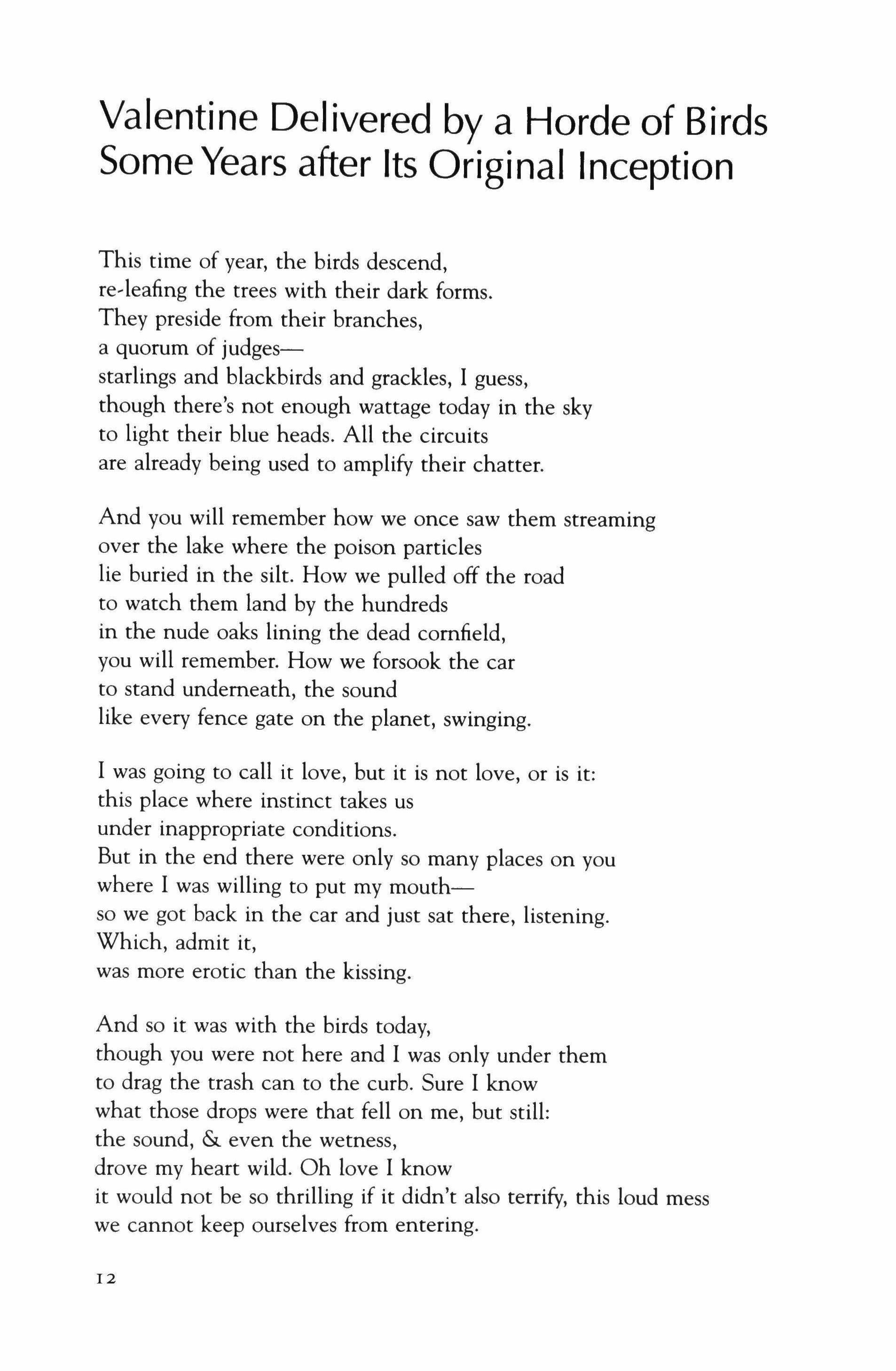
Valentine Delivered by a Horde of Birds
Some Years after Its Original Inception
This time of year, the birds descend, re-leafing the trees with their dark forms. They preside from their branches, a quorum of judgesstarlings and blackbirds and grackles, I guess, though there's not enough wattage today in the sky to light their blue heads. All the circuits are already being used to amplify their chatter.
And you will remember how we once saw them streaming over the lake where the poison particles lie buried in the silt. How we pulled off the road to watch them land by the hundreds in the nude oaks lining the dead cornfield, you will remember. How we forsook the car to stand underneath, the sound like every fence gate on the planet, swinging.
I was going to call it love, but it is not love, or is it: this place where instinct takes us under inappropriate conditions. But in the end there were only so many places on you where I was willing to put my mouthso we got back in the car and just sat there, listening. Which, admit it, was more erotic than the kissing.
And so it was with the birds today, though you were not here and I was only under them to drag the trash can to the curb. Sure I know what those drops were that fell on me, but still: the sound, & even the wetness, drove my heart wild. Oh love I know it would not be so thrilling if it didn't also terrify, this loud mess we cannot keep ourselves from entering.
12
On the High Suicide Rate of Dentists

It's no surprise, when you think about what the teeth are the ramparts of: slippery slope leading to the gullet. Little jagged-edged ivory makers of sameness, the Bolsheviks of the dining room: take the lobster tailor the prime rib, put in your mouth and chew them awhile and all class distinctions-whether deep-fried or drowning in butterquickly become moot. But any actual tears are hard drops to explain, especially coming from someone like the one who played "novelty music" when he chopped the fillings out of me. Guitarzan. How light-hearted he seemed as he chimed along with Jane's falsetto yodeling. And though you might think gastroenterologists would wear the crown of their despairs, at least they witness how bygones can be bygones and how the burden can be released. Versus this perpetual going-in, which is always the scariest part of the story: Give up hope all ye who enter here. Even the radishes are doomed, cut so painstakingly into roses.
So maybe part of their sadness comes from the sushi assembled to look like the stained-glass at Chartres. Or the crown roast whose bones wear those paperboy caps while ever so eager the knife goes in.
13
Miranda Field

Vat
The cough is an eschewal of language. The lungs boil and bubble and fill with spherical music. Down into this syrupy medium descends the mother's listening, diving for pearls, for nacreous jewels. It's like this in the interior. Whenever we go to those orchards, designated ether, dry and far from water, it's the apples that welcome us-dribbling their rivulets of juice where broken into or bruised. The child coughs and coughs an orchard's worth of ruddy balls, which jostle and knock and peal like underwater bells. Few subjects are angrier than wilderness subjected to agriculture. Inside a child is a spasm of unpossessed versus monopolized interests. Whatever wanders near the gate is taken in-into an atmosphere of orchards always near the boiling point of gold.
14
Cybele

Then she enacts exactly how the cows she loved were milked, teats plugged into the cool machine. She shows me, walking in the crowds on Broadway, on her own long torso: how the metal plugs latched on, a little roughly, but not to frighten the cow and stop the milk from flowing. The udder needn't be seduced to surrender, so long at the sucking is rhythmic, mechanical. Even a baby born without a brain perceives this, and fingertips' associations with specific letterkeys seem equally of All Creation. I took a class on how to make a nanny goat yield: make an okay sign with finger and thumb, collapse the a's soft rim, trapping the teat and pulling, as on a bell-pull or school-girl's pigtail. Knowing this is no way to respond to nature. Though it's much discussed-there's little need to fear mechanical surrogates if they insinuate themselves, or even force their attentions on us sometimes when we're much too fragile to stand up. Inflexible, oh yes, but also far less egotistical than the governors or guardians they mirror or pretend to be, they hold us like a futuristic form of love-in vehement but equally dispassionate pacts.
15
Persephone
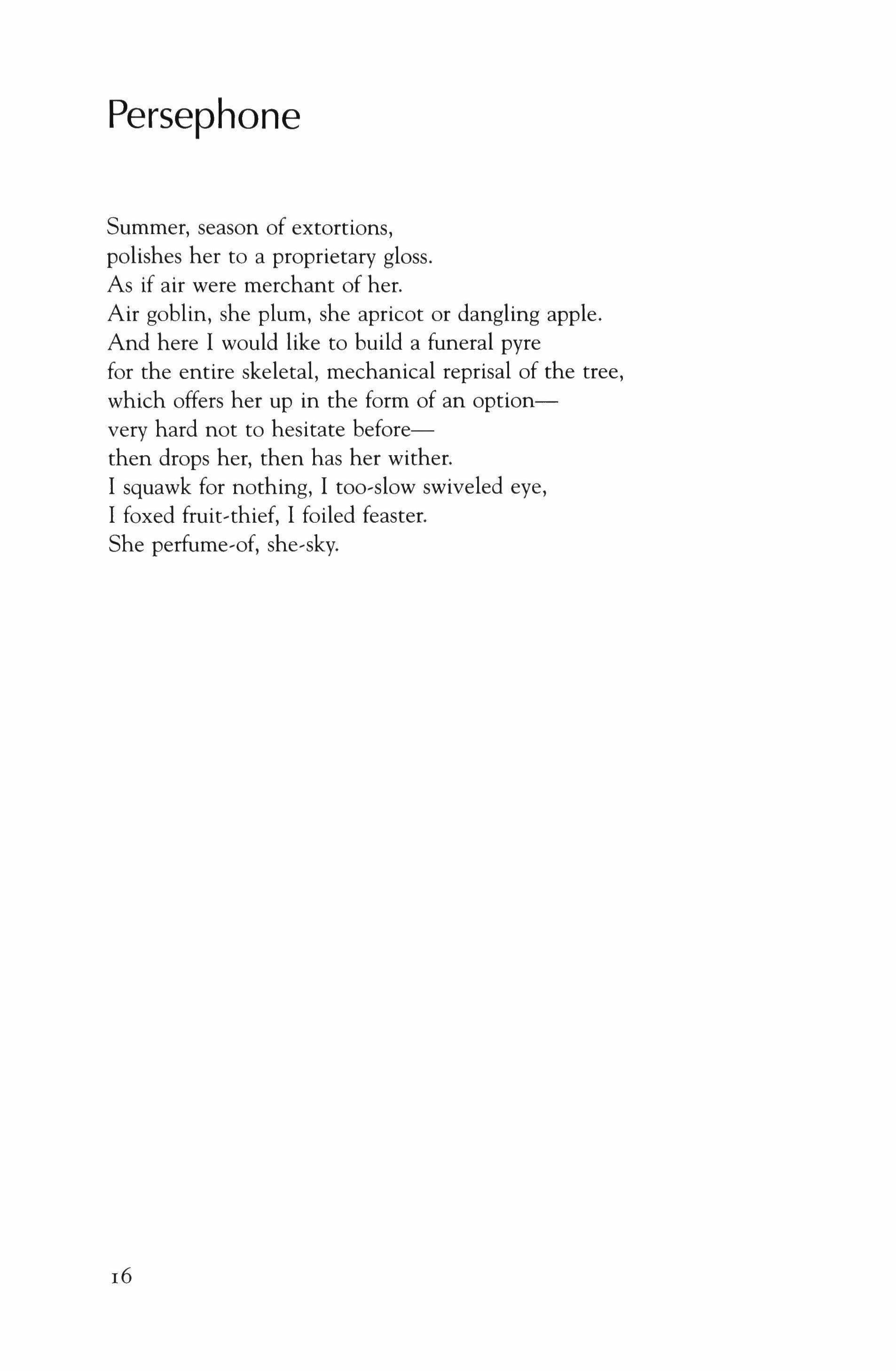
Summer, season of extortions, polishes her to a proprietary gloss. As if air were merchant of her.
Air goblin, she plum, she apricot or dangling apple. And here I would like to build a funeral pyre for the entire skeletal, mechanical reprisal of the tree, which offers her up in the form of an optionvery hard not to hesitate beforethen drops her, then has her wither.
I squawk for nothing, I too-slow swiveled eye, I foxed fruit-thief, I foiled feaster.
She perfume-of, she-sky.
Scold's Mask

Before the tongue wags,
Caliper the tongue. The tongue delivers lashes. Buckle the mask to tourniquet the tongue.
The mule-snout of the scold's mask
Blunts the pointing tongue, the hasp-tongue
Back to loaf-shape, to shovel-shape-
To food, to tool, to good machine, to tabernacle
Of intentional action. Not toy
That wills itself to whirring in the toy box.
The atmosphere the tongue lies bedded in
The tongue's environsMakes an ideology of its lewd motions.
A mildew in the market.
A pathogen in the aspic.
Cut off the flow that feeds the tongue!
Or twist or tie it tightly.
Or stuff the hole it cobras from with gauze.
Tonight, the tongue is a particularly muscular vine. Tonight it redoubles its efforts to ascend Heavenward. The husband-tongue, the "love-muscle" tongue. What miracles of synchronized swimming, What exquisite tension between buried root and forcefully
Arrowing-forth prow It's hard to hood this.
One tongue finds another to entwine, One tongue grows a bindweed round another's stem.
And consider carefully this ramification of the stickiest indexIts extremities are relentlessly expansionist
But slow motion, transfixing with sense
Whatever they contact. And of all members mobilized By voluntary acts, this exceeds by far all others
In numbers and varieties of its intentions.
But if caught in time, it can be constricted in childhood. It can be ratified, espaliered. It can be trained To arabesques of sexual servility. And citizenry. It can be sectioned. And seduced to science. It can be stilled for years, and stiffened.
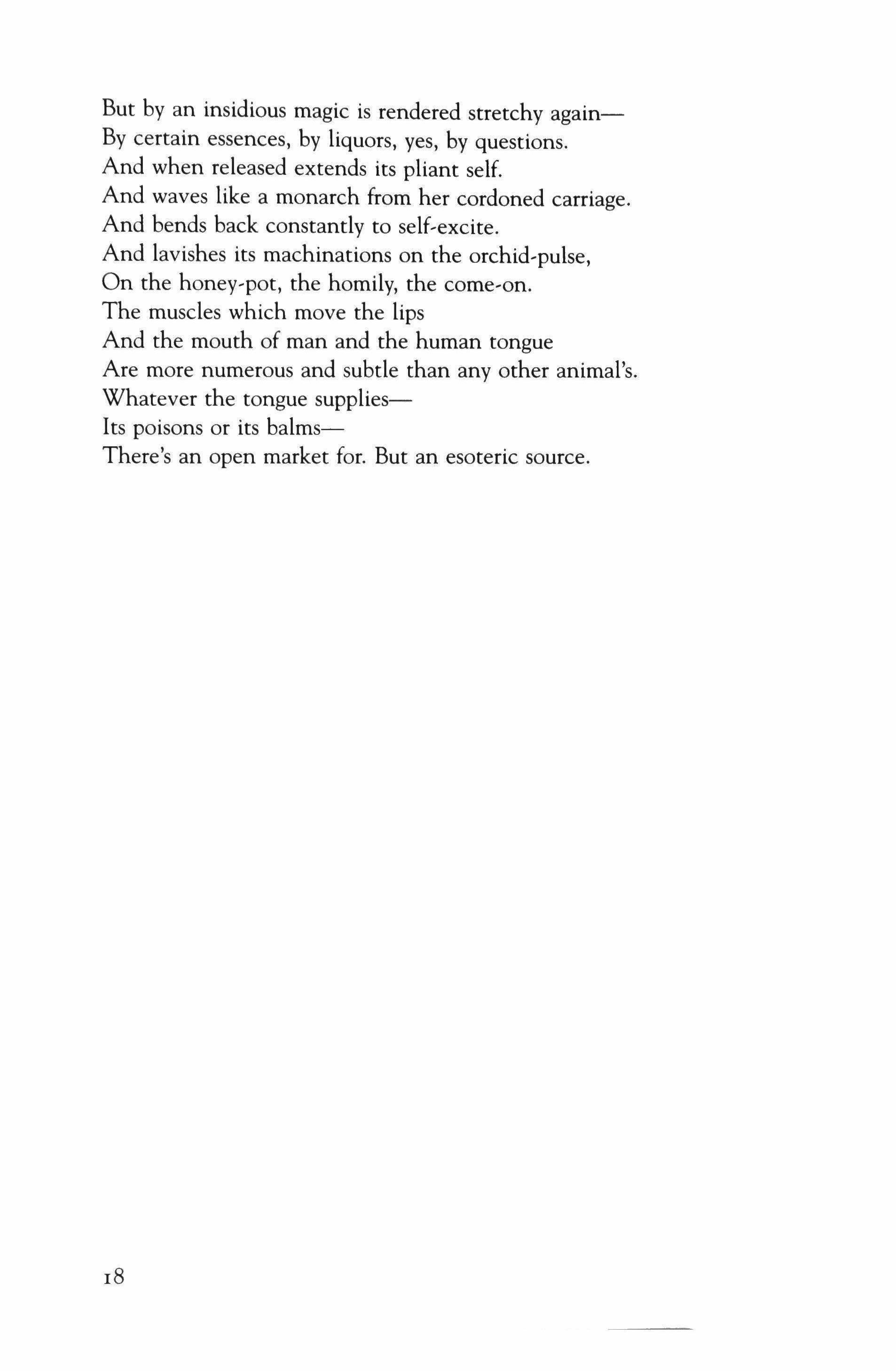
But by an insidious magic is rendered stretchy againBy certain essences, by liquors, yes, by questions. And when released extends its pliant self. And waves like a monarch from her cordoned carriage. And bends back constantly to self-excite. And lavishes its machinations on the orchid-pulse, On the honey-pot, the homily, the come-on, The muscles which move the lips And the mouth of man and the human tongue
Are more numerous and subtle than any other animal's.
Whatever the tongue suppliesIts poisons or its balms-
There's an open market for. But an esoteric source.
18
Adrienne Rich

USonian Journals 2000
USonian: the term used by Frank Lloyd Wright for his prairie-inspired architecture. Here, of the United States of North America.
Citizen/AI ien/N ightiMare
A country I was born and lived in undergoes rapid and flagrant change. I return here as a stranger. In fact I've lived here all along. At a certain point I realized I was no longer connected along any continuous strand to the nature of the change. I can't find my passport. Nobody asks me to show it.
Day/Job/Mare
to lunch with K., USonian but recently from a British university. Described as "our Marxist." Dark and pretty, already she's got half the department classified: She's crazy He's carrying the chip of race on his shoulder She's here because he is, isn't she? He's not likely to make it through Ask her about current Brit. labor scene; she talks about the influence of the industrial revolution on Victorian prose. My aim: get clear of this, find another day job.
As we left the dark publike restaurant the street-ordinary enough couple of blocks between a parking lot and an office complex-broke into spitting, popping sounds and sudden running. I held back against the wall, she beside me. Something happened then everything. A
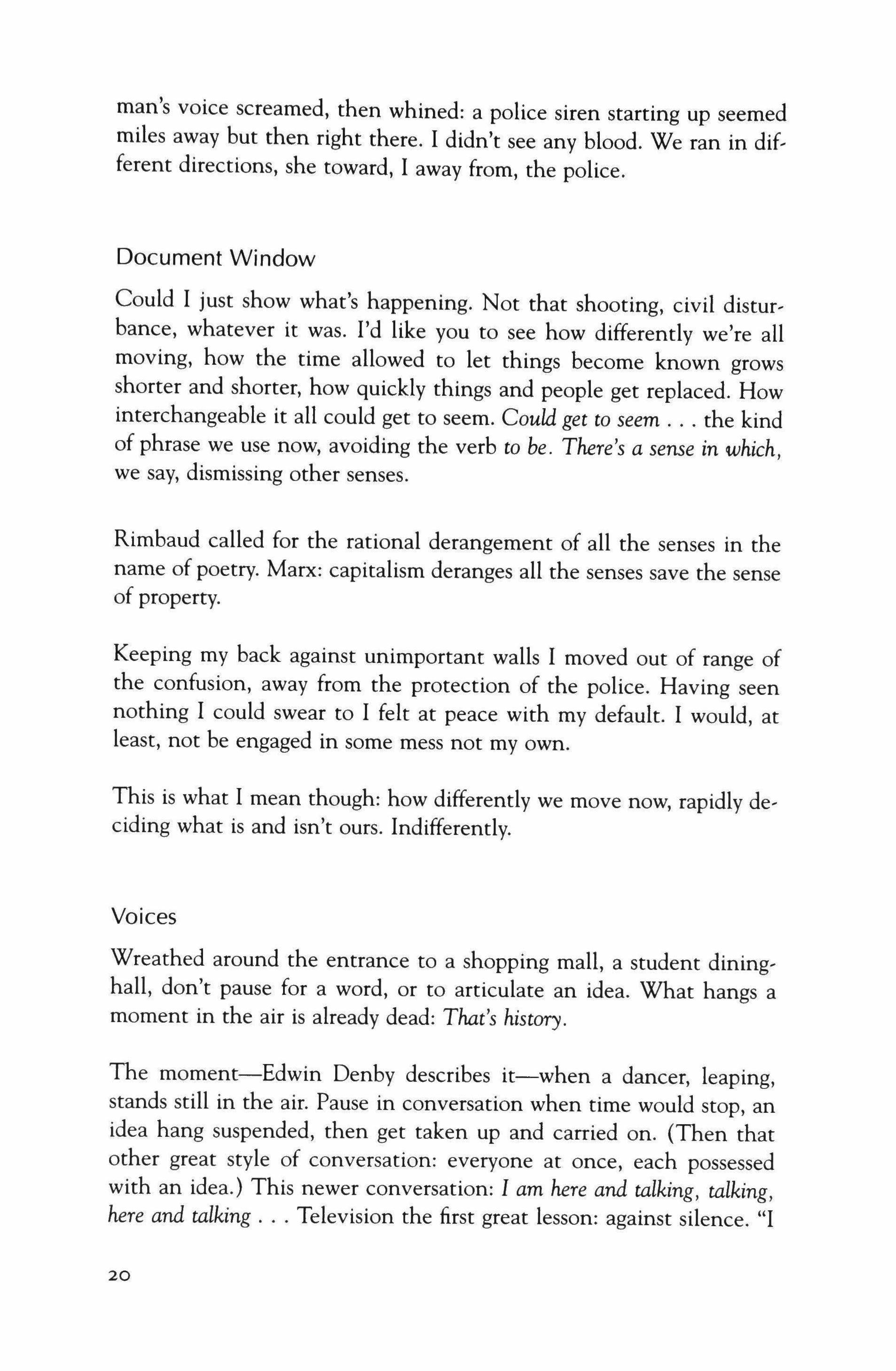
man's voice screamed, then whined: a police siren starting up seemed miles away but then right there. I didn't see any blood. We ran in different directions, she toward, I away from, the police.
Document Window
Could I just show what's happening. Not that shooting, civil disturbance, whatever it was. I'd like you to see how differently we're all moving, how the time allowed to let things become known grows shorter and shorter, how quickly things and people get replaced. How interchangeable it all could get to seem. Could get to seem the kind of phrase we use now, avoiding the verb to be. There's a sense in which, we say, dismissing other senses.
Rimbaud called for the rational derangement of all the senses in the name of poetry. Marx: capitalism deranges all the senses save the sense of property.
Keeping my back against unimportant walls I moved out of range of the confusion, away from the protection of the police. Having seen nothing I could swear to I felt at peace with my default. I would, at least, not be engaged in some mess not my own.
This is what I mean though: how differently we move now, rapidly deciding what is and isn't ours. Indifferently.
Voices
Wreathed around the entrance to a shopping mall, a student dininghall, don't pause for a word, or to articulate an idea. What hangs a moment in the air is already dead: That's history.
The moment-Edwin Denby describes it-when a dancer, leaping, stands still in the air. Pause in conversation when time would stop, an idea hang suspended, then get taken up and carried on. (Then that other great style of conversation: everyone at once, each possessed with an idea.) This newer conversation: I am here and. talking, talking, here and. talking Television the first great lesson: against silence. "I
20
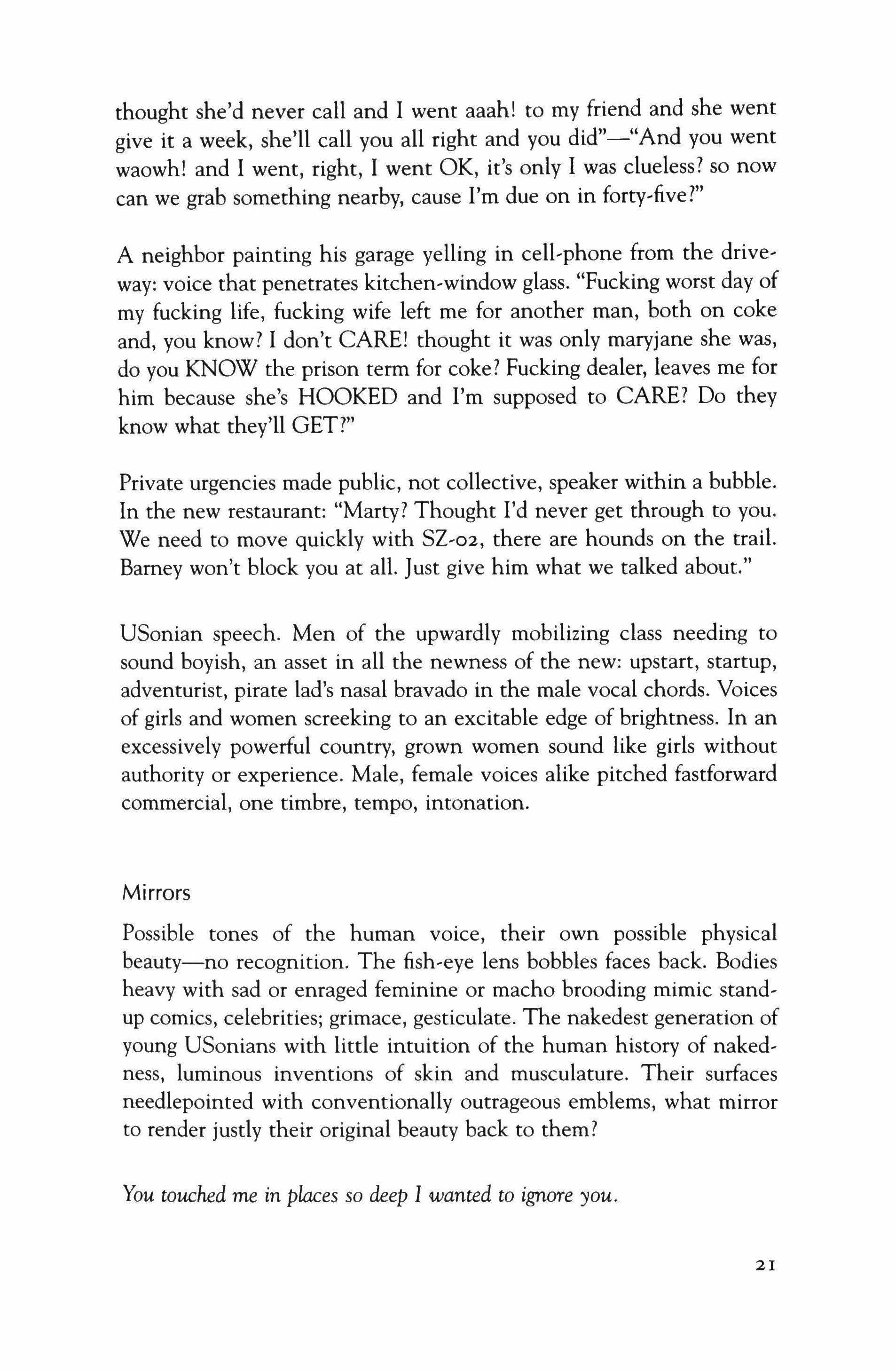
thought she'd never call and I went aaah! to my friend and she went give it a week, she'll call you all right and you did"-"And you went waowh! and I went, right, I went OK, it's only I was clueless? so now can we grab something nearby, cause I'm due on in forty-five?"
A neighbor painting his garage yelling in cell-phone from the driveway: voice that penetrates kitchen-window glass. "Fucking worst day of my fucking life, fucking wife left me for another man, both on coke and, you know? I don't CARE! thought it was only maryjane she was, do you KNOW the prison term for coke? Fucking dealer, leaves me for him because she's HOOKED and I'm supposed to CARE? Do they know what they'll GET?"
Private urgencies made public, not collective, speaker within a bubble. In the new restaurant: "Marty? Thought I'd never get through to you. We need to move quickly with SZ-02, there are hounds on the trail. Barney won't block you at all. Just give him what we talked about."
USonian speech. Men of the upwardly mobilizing class needing to sound boyish, an asset in all the newness of the new: upstart, startup, adventurist, pirate lad's nasal bravado in the male vocal chords. Voices of girls and women screeking to an excitable edge of brightness. In an excessively powerful country, grown women sound like girls without authority or experience. Male, female voices alike pitched fastforward commercial, one timbre, tempo, intonation.
Mirrors
Possible tones of the human voice, their own possible physical beauty-no recognition. The fish-eye lens bobbles faces back. Bodies heavy with sad or enraged feminine or macho brooding mimic standup comics, celebrities; grimace, gesticulate. The nakedest generation of young USonians with little intuition of the human history of nakedness, luminous inventions of skin and musculature. Their surfaces needlepointed with conventionally outrageous emblems, what mirror to render justly their original beauty back to them?
You touched me in places so deep I wanted to ignore you.
21
Artworks (I)
Painting on a gallery wall: people dwelling on opposite sides of a pane of glass. None of their eyes exchanging looks. Yellow flashes off the rug in the room and from the orchard beyond. House of people whose eyes do not meet.
White people doing and seeing no evil.
(Photograph offamily reunion, eyes on the wide-lens camera, unmeeting.) "In fact I've lived here all along."
That was them not us. We were at the time in the time of our displacement, being tom from a false integrity. We stared at the pictures in the gallery knowing they were not us, we were being driven further for something else and who knew how far and for how long and what we were to do.
Stranger
Isolation begins to form, moves in like fog on a clear afternoon. Arrives with the mail, leaves its messages on the phone machine. If you hadn't undergone this so often it could take you by surprise, but its rime-white structure is the simple blueprint of your displacement. You: who pride yourself on not giving in, keep discovering in dreams new rooms in an old house, drawing new plans: living with strangers, enough for all, wild tomato plants along the road, redness for hunger and thirst. (Unrest, too, in the house of dreams: the underworld lashing back.)
But this fog blanks echoes, blots reciprocal sounds. The padded cell of a moribund democracy, or just your individual case?
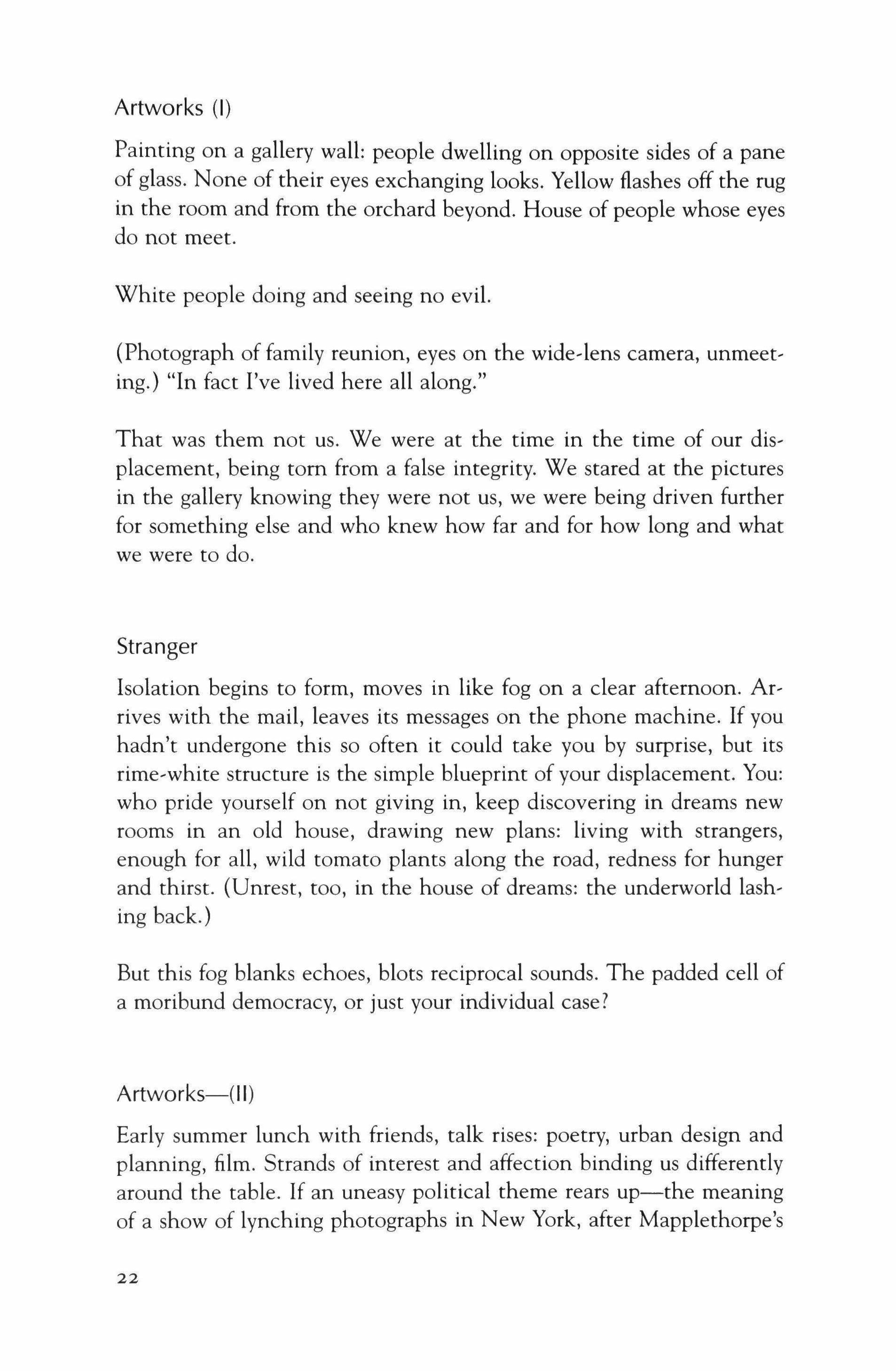
Artworks-(II)
Early summer lunch with friends, talk rises: poetry, urban design and planning, film. Strands of interest and affection binding us differently around the table. If an uneasy political theme rears up-the meaning of a show of lynching photographs in New York, after Mapplethorpe's
22
photos, of sociopathic evil inside the California prison industry-talk fades. Not a pause but: a suppression. No one is monitoring this conversation but us. We know the air is bad in here, maybe want not to push that knowledge, ask what is to be done? How to breathe? What will suffice? Draft new structures or simply be aware? If art is our only resistance, what does that make us? If we're collaborators, what's our offering to corruption-an aesthetic, anaesthetic, dye of silence, withdrawal, intellectual disgust?
This fade-out/suspension of conversation: a syndrome of the past decades? our companionate immune systems under siege, viral spread of social impotence producing social silence?
Imagine written language that walks away from human conversation. A written literature, back turned to oral traditions, estranged from music and body. So what might re-animate, re-articulate, becomes less and less available.
Incline
Dreamroad rising steeply uphill; David is driving. I see it turning into a perpendicular structure salvaged from a long metal billboard: we will have to traverse this at a ninety-degree angle, then at the top go over and down the other side. There are no exits. Around is the Mojave desert: open space. D.'s car begins to lose momentum as the incline in� creases; he tries shifting into a lower gear and gunning the engine. There is no way off this incline now, we're forced into a situation we hadn't reckoned on-a road now become something that is no road, something designated as "commercial space." I suggest rolling (ourselves in) the car down the steep dusty shoulder into the desert below, and out. For both of us, the desert isn't vacancy or fear, it's life, a million forms of witness. The false road, its cruel deception, is what we have to abandon.
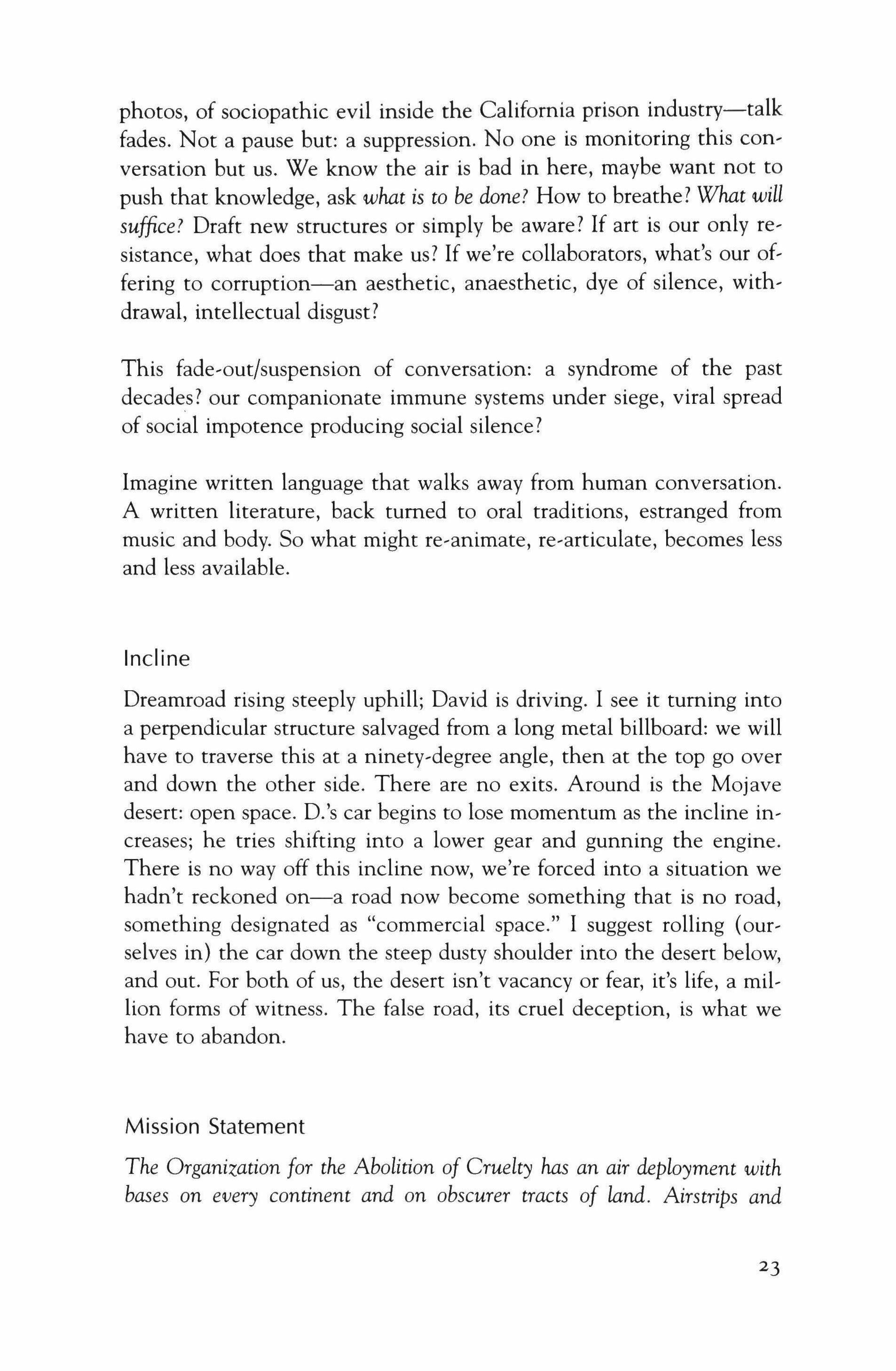
Mission Statement
The Organization for the Abolition of Cruelty has an air deployment with bases on every continent and on obscurer tracts of land. Airstrips and
23
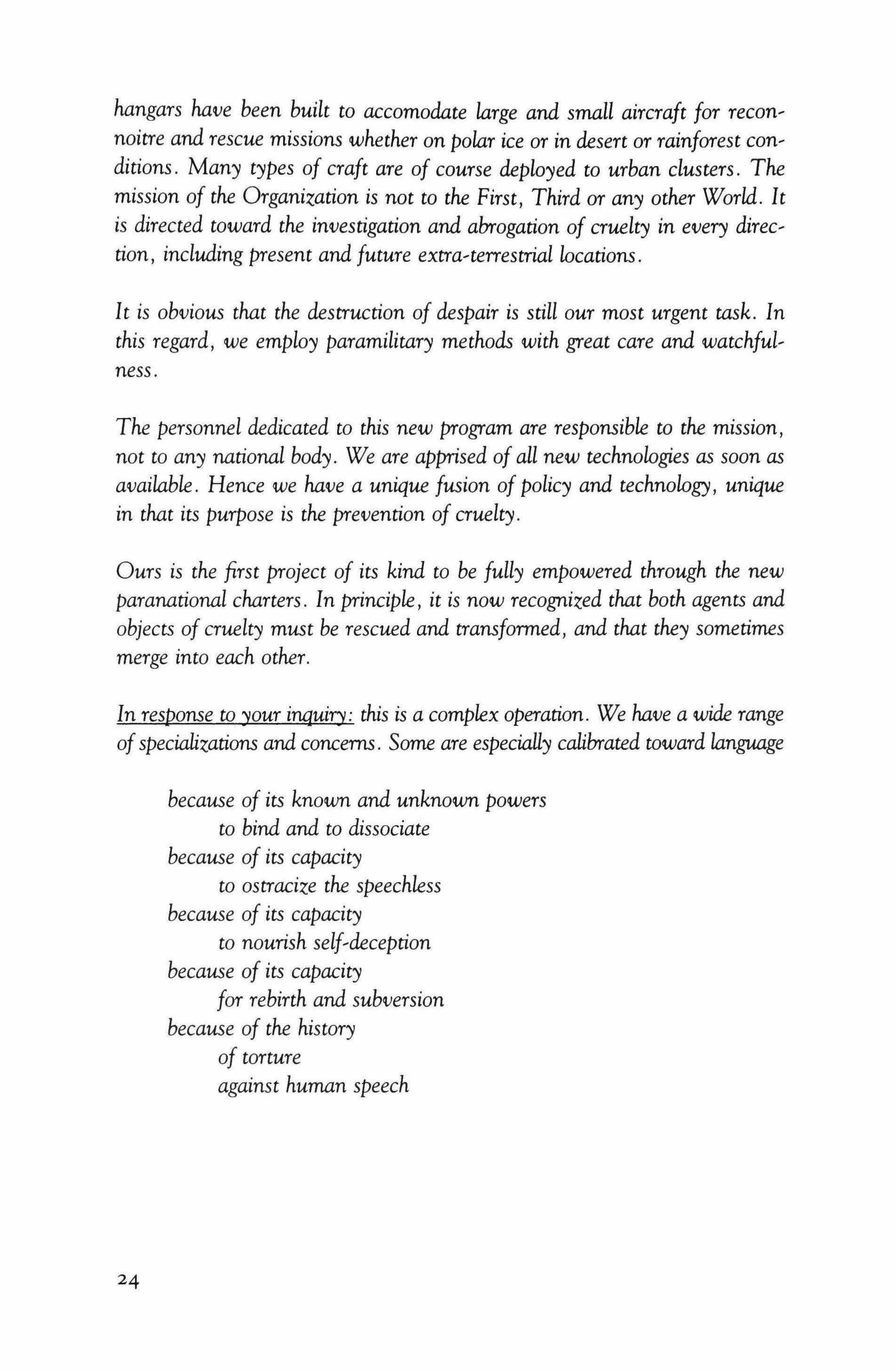
hangars have been built to accomodate large and small aircraft for reconnoitre and rescue missions whether on polar ice or in desert or rainforest con, ditions. Many types of craft are of course deployed to urban clusters. The mission of the Organization is not to the First, Third or any other World. It is directed toward the investigation and abrogation of cruelty in every direc, tion, including present and future extra,terrestriallocations.
It is obvious that the destruction of despair is still our most urgent task. In this regard, we employ paramilitary methods with great care and watchful, ness.
The personnel dedicated to this new program are responsible to the mission, not to any national body. We are apprised of all new technologies as soon as available. Hence we have a unique fusion ofpolicy and technology, unique in that its purpose is the prevention ofcruelty.
Ours is the first project of its kind to be fully empowered through the new paranational charters. In principle, it is now recognized that both agents and objects ofcruelty must be rescued and transformed, and that they sometimes merge into each other.
In response to your inquiry; this is a complex operation. We have a wide range ofspecializations and concerns. Some are especially calibrated toward language
because of its known and unknown powers to bind and to dissociate because of its capacity to ostracize the speechless because of its capacity to nourish self,deception because of its capacity for rebirth and subversion because of the history of torture against human speech
Marvin Bell View
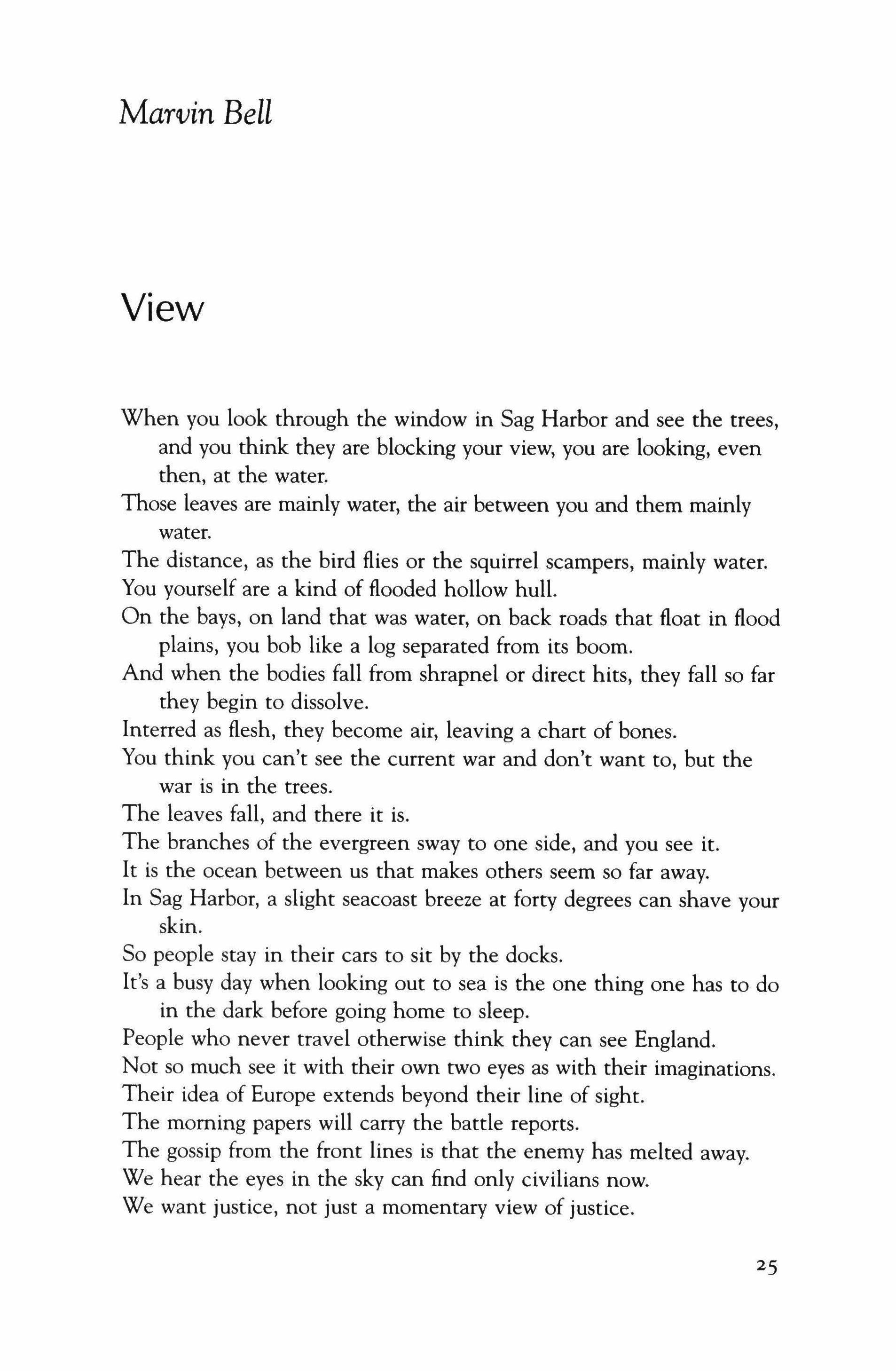
When you look through the window in Sag Harbor and see the trees, and you think they are blocking your view, you are looking, even then, at the water.
Those leaves are mainly water, the air between you and them mainly water.
The distance, as the bird flies or the squirrel scampers, mainly water.
You yourself are a kind of flooded hollow hull.
On the bays, on land that was water, on back roads that float in flood plains, you bob like a log separated from its boom.
And when the bodies fall from shrapnel or direct hits, they fall so far they begin to dissolve.
Interred as flesh, they become air, leaving a chart of bones.
You think you can't see the current war and don't want to, but the war is in the trees.
The leaves fall, and there it is.
The branches of the evergreen sway to one side, and you see it. It is the ocean between us that makes others seem so far away.
In Sag Harbor, a slight seacoast breeze at forty degrees can shave your skin.
So people stay in their cars to sit by the docks.
It's a busy day when looking out to sea is the one thing one has to do in the dark before going home to sleep.
People who never travel otherwise think they can see England.
Not so much see it with their own two eyes as with their imaginations. Their idea of Europe extends beyond their line of sight.
The morning papers will carry the battle reports.
The gossip from the front lines is that the enemy has melted away.
We hear the eyes in the sky can find only civilians now.
We want justice, not just a momentary view of justice.

A black cloud has blocked the dawn. We know it is morning by the dew and the frost on the windowpanes.
Boys Walking
Sudan, 1988

When the famine had spread as far as the shadow of a partial eclipse, the older boys began to walk. They were joined by other boys related to them by hunger, and they breathed shallow steps into the distance, believing in food because they had known once enough to eat. The bigger boys cared for the little ones because they had heard stories of the parents who were now constellations by which they set their course. Also, they had heard of the trucks whose gear-grinding dusty clamor meant cargoes of grain. It was too late to wait for crops that had thirsted to bloom and died, and soon the shadow in which they hid from the heat would slide over the horizon, leaving them in the public glare. Who cared?
This was to be another of the infamous marches, writ next to the retreat from Stalingrad, the forced trek on Bataan, Mao's thousand miles, Perry sliding to the pole, but written out of history, consigned to quartermaster logs and mortuary tables, the food that didn't travel, and the bodies found hundreds of miles from home.
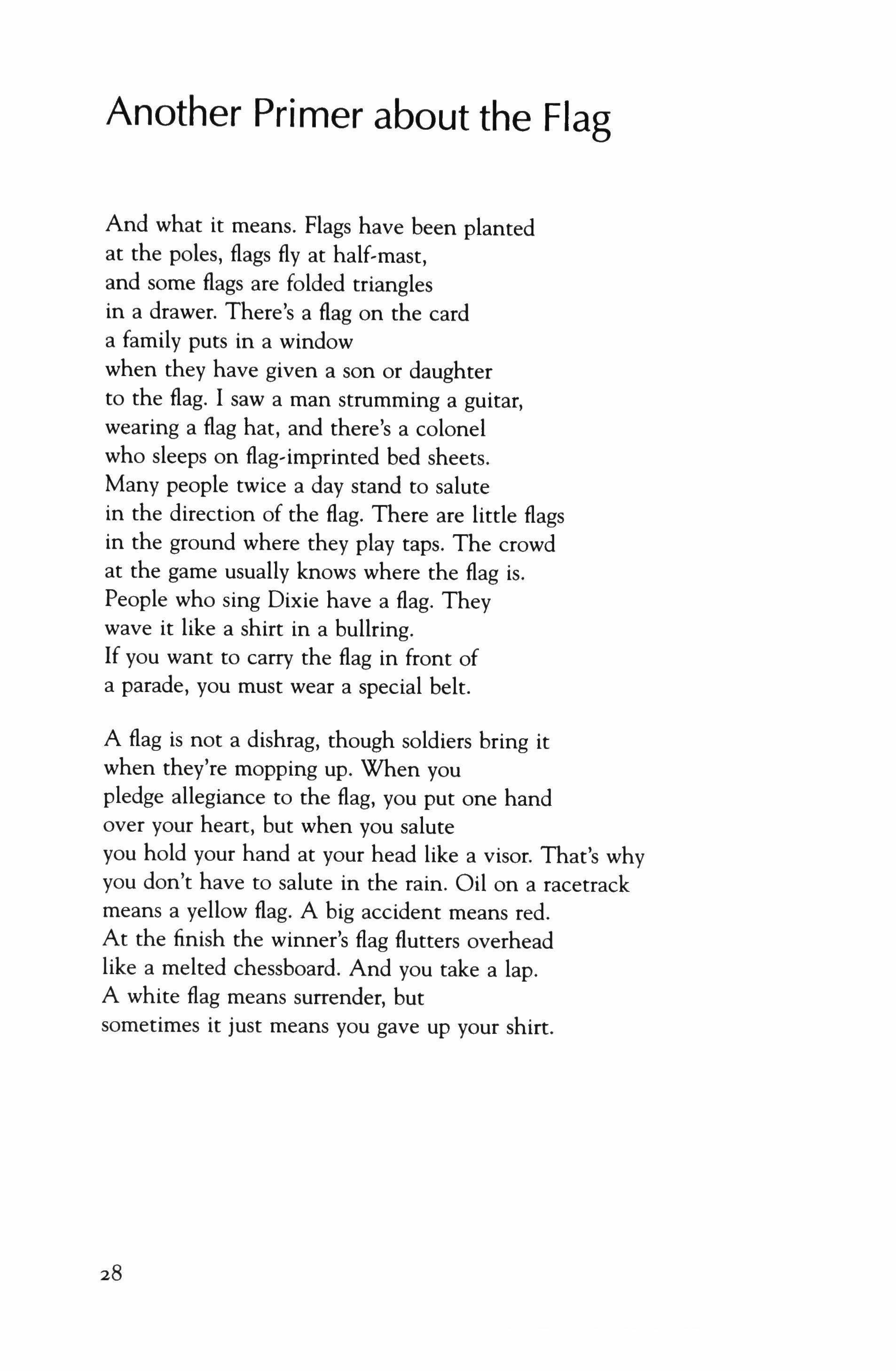
Another Primer about the Flag
And what it means. Flags have been planted at the poles, flags fly at half,mast, and some flags are folded triangles in a drawer. There's a flag on the card a family puts in a window when they have given a son or daughter to the flag. I saw a man strumming a guitar, wearing a flag hat, and there's a colonel who sleeps on flag'imprinted bed sheets. Many people twice a day stand to salute in the direction of the flag. There are little flags in the ground where they play taps. The crowd at the game usually knows where the flag is. People who sing Dixie have a flag. They wave it like a shirt in a bullring. If you want to carry the flag in front of a parade, you must wear a special belt.
A flag is not a dishrag, though soldiers bring it when they're mopping up. When you pledge allegiance to the flag, you put one hand over your heart, but when you salute you hold your hand at your head like a visor. That's why you don't have to salute in the rain. Oil on a racetrack means a yellow flag. A big accident means red. At the finish the winner's flag flutters overhead like a melted chessboard. And you take a lap. A white flag means surrender, but sometimes it just means you gave up your shirt.
Maurice Kilwein Guevara
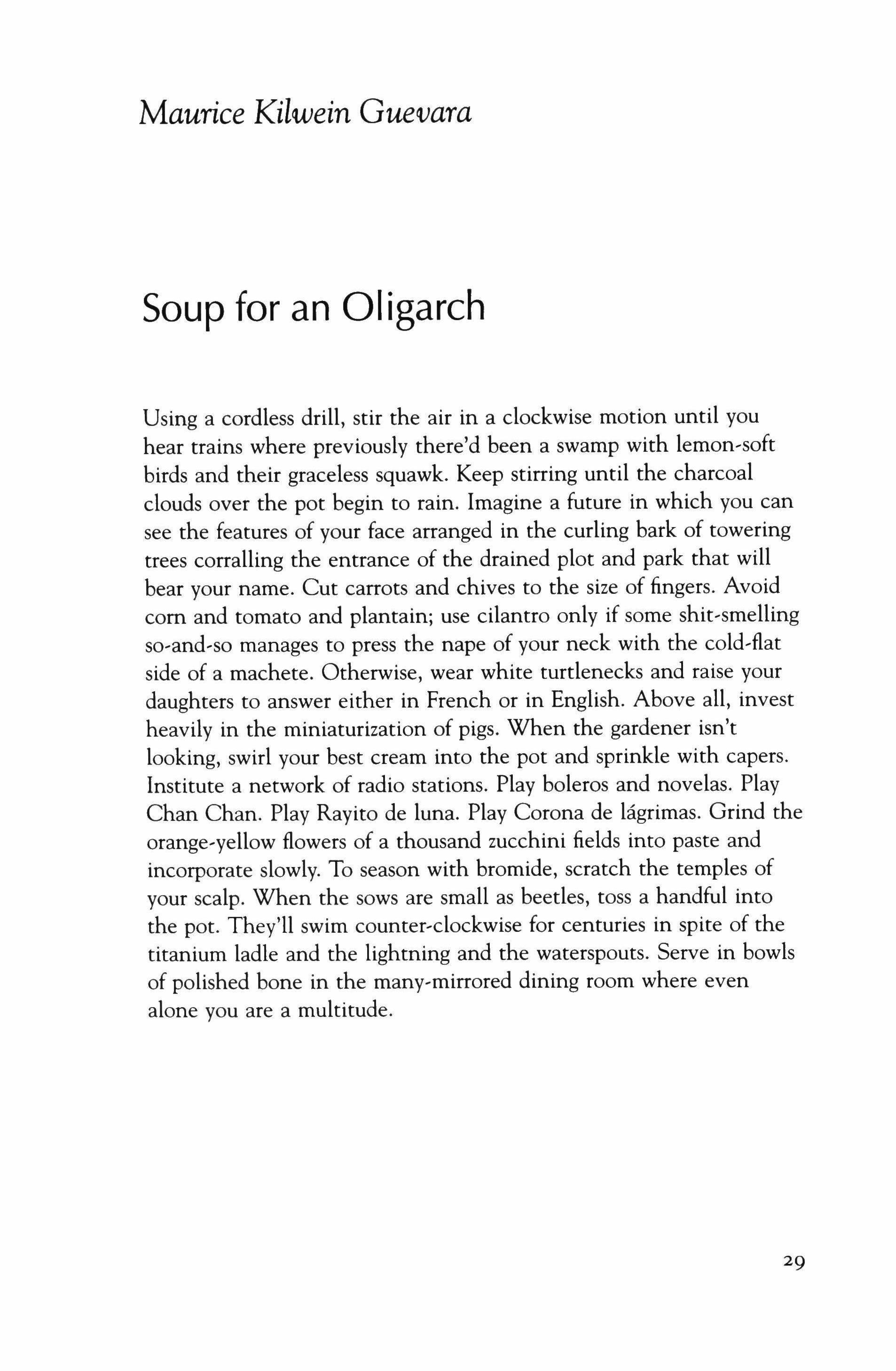
Soup for an Oligarch
Using a cordless drill, stir the air in a clockwise motion until you hear trains where previously there'd been a swamp with lemon-soft birds and their graceless squawk. Keep stirring until the charcoal clouds over the pot begin to rain. Imagine a future in which you can see the features of your face arranged in the curling bark of towering trees corralling the entrance of the drained plot and park that will bear your name. Cut carrots and chives to the size of fingers. Avoid com and tomato and plantain; use cilantro only if some shit-smelling so-and-so manages to press the nape of your neck with the cold-flat side of a machete. Otherwise, wear white turtlenecks and raise your daughters to answer either in French or in English. Above all, invest heavily in the miniaturization of pigs. When the gardener isn't looking, swirl your best cream into the pot and sprinkle with capers. Institute a network of radio stations. Play boleros and novelas. Play Chan Chan. Play Rayito de luna. Play Corona de lagrimas. Grind the orange-yellow flowers of a thousand zucchini fields into paste and incorporate slowly. To season with bromide, scratch the temples of your scalp. When the sows are small as beetles, toss a handful into the pot. They'll swim counter-clockwise for centuries in spite of the titanium ladle and the lightning and the waterspouts. Serve in bowls of polished bone in the many-mirrored dining room where even alone you are a multitude.
Cholula
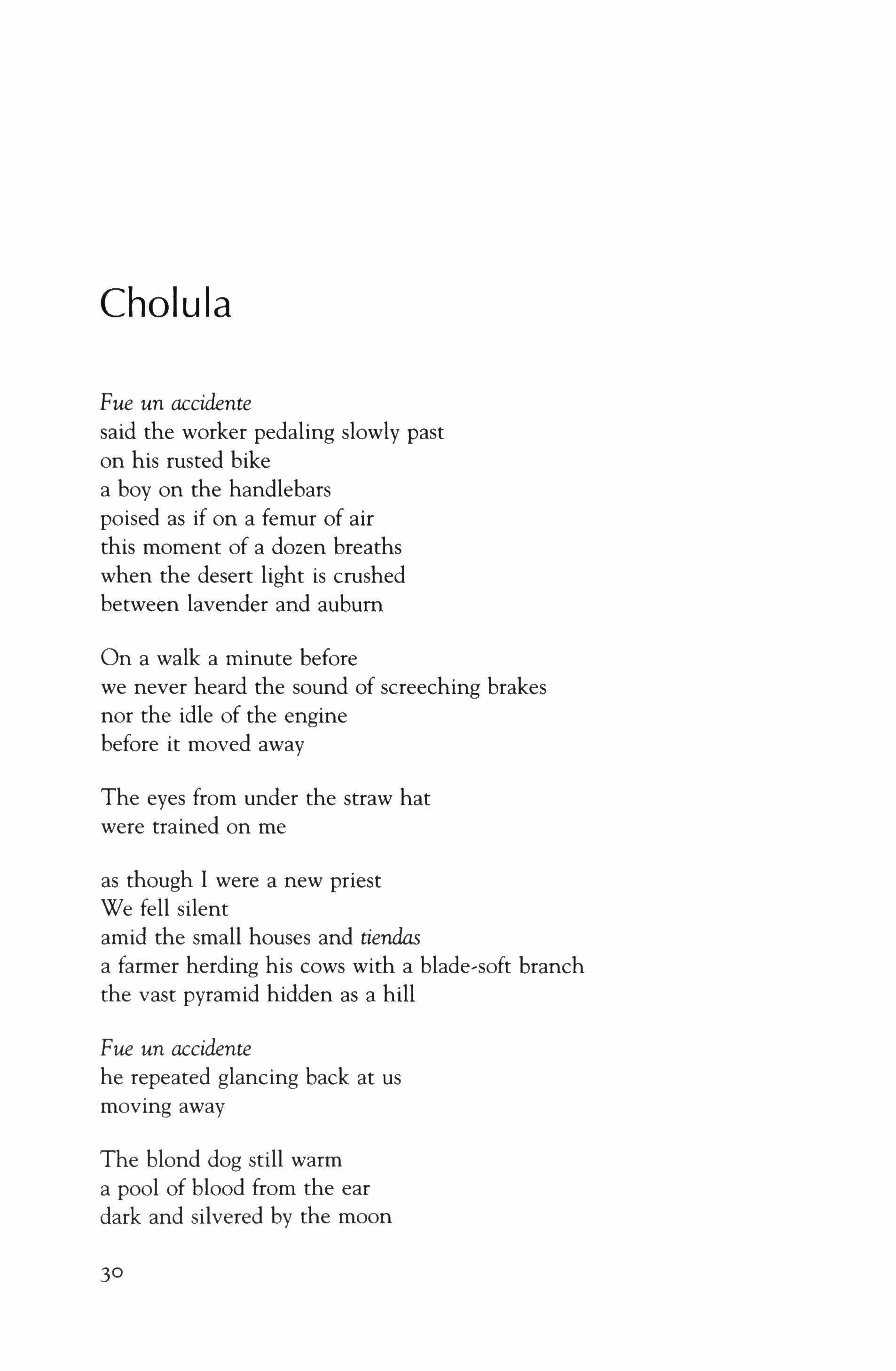
Fue un accidente
said the worker pedaling slowly past on his rusted bike a boy on the handlebars poised as if on a femur of air this moment of a dozen breaths when the desert light is crushed between lavender and auburn
On a walk a minute before we never heard the sound of screeching brakes nor the idle of the engine before it moved away
The eyes from under the straw hat were trained on me as though I were a new priest We fell silent amid the small houses and tiendas a farmer herding his cows with a blade-soft branch the vast pyramid hidden as a hill
Fue un accidente he repeated glancing back at us moving away
The blond dog still warm a pool of blood from the ear dark and silvered by the moon
30
Ralph Angel
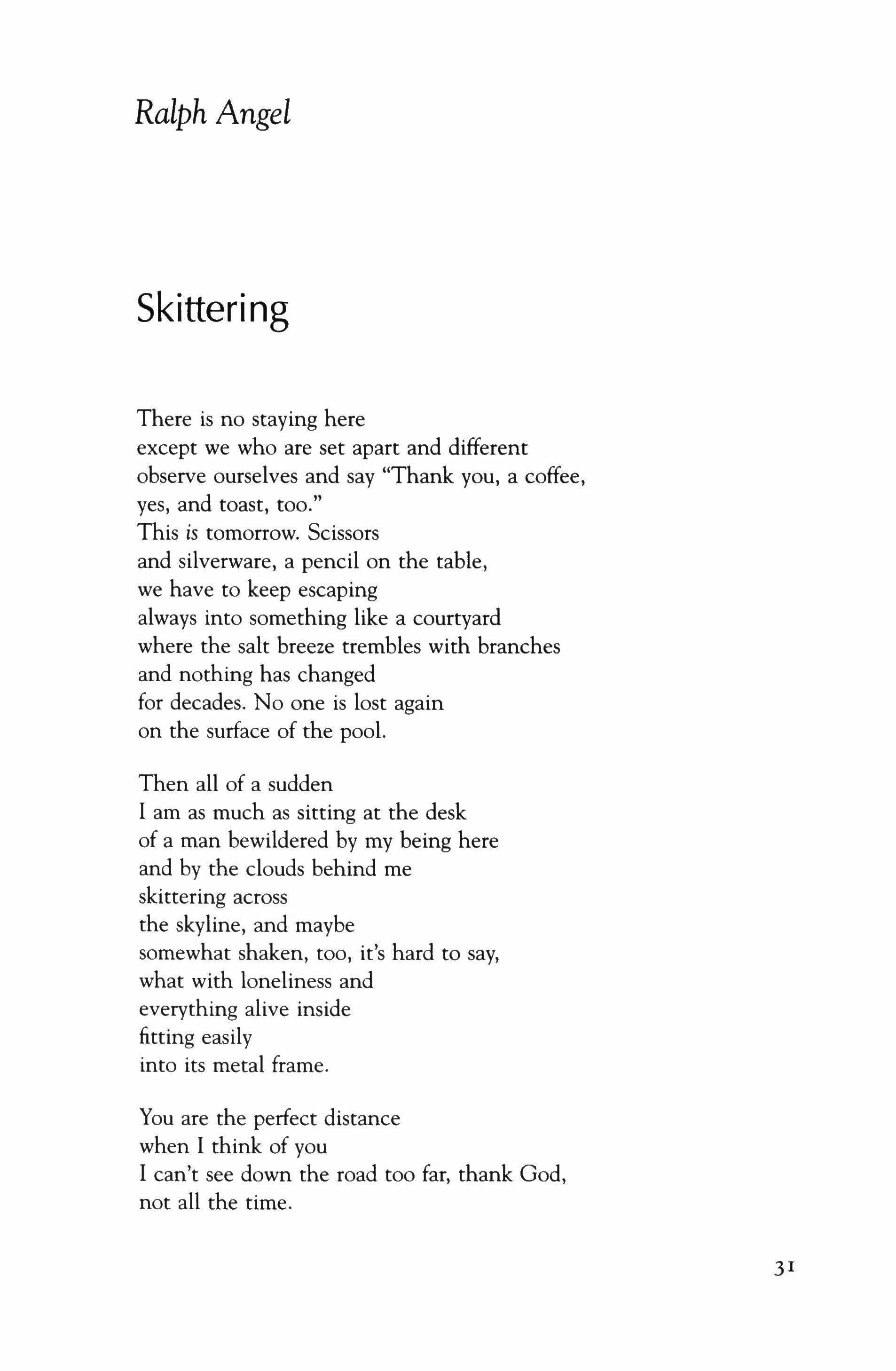
Skittering
There is no staying here except we who are set apart and different observe ourselves and say "Thank you, a coffee, yes, and toast, too." This is tomorrow. Scissors and silverware, a pencil on the table, we have to keep escaping always into something like a courtyard where the salt breeze trembles with branches and nothing has changed for decades. No one is lost again on the surface of the pool.
Then all of a sudden
I am as much as sitting at the desk of a man bewildered by my being here and by the clouds behind me skittering across the skyline, and maybe somewhat shaken, too, it's hard to say, what with loneliness and everything alive inside fitting easily into its metal frame.
You are the perfect distance when I think of you I can't see down the road too far, thank God, not all the time.
31
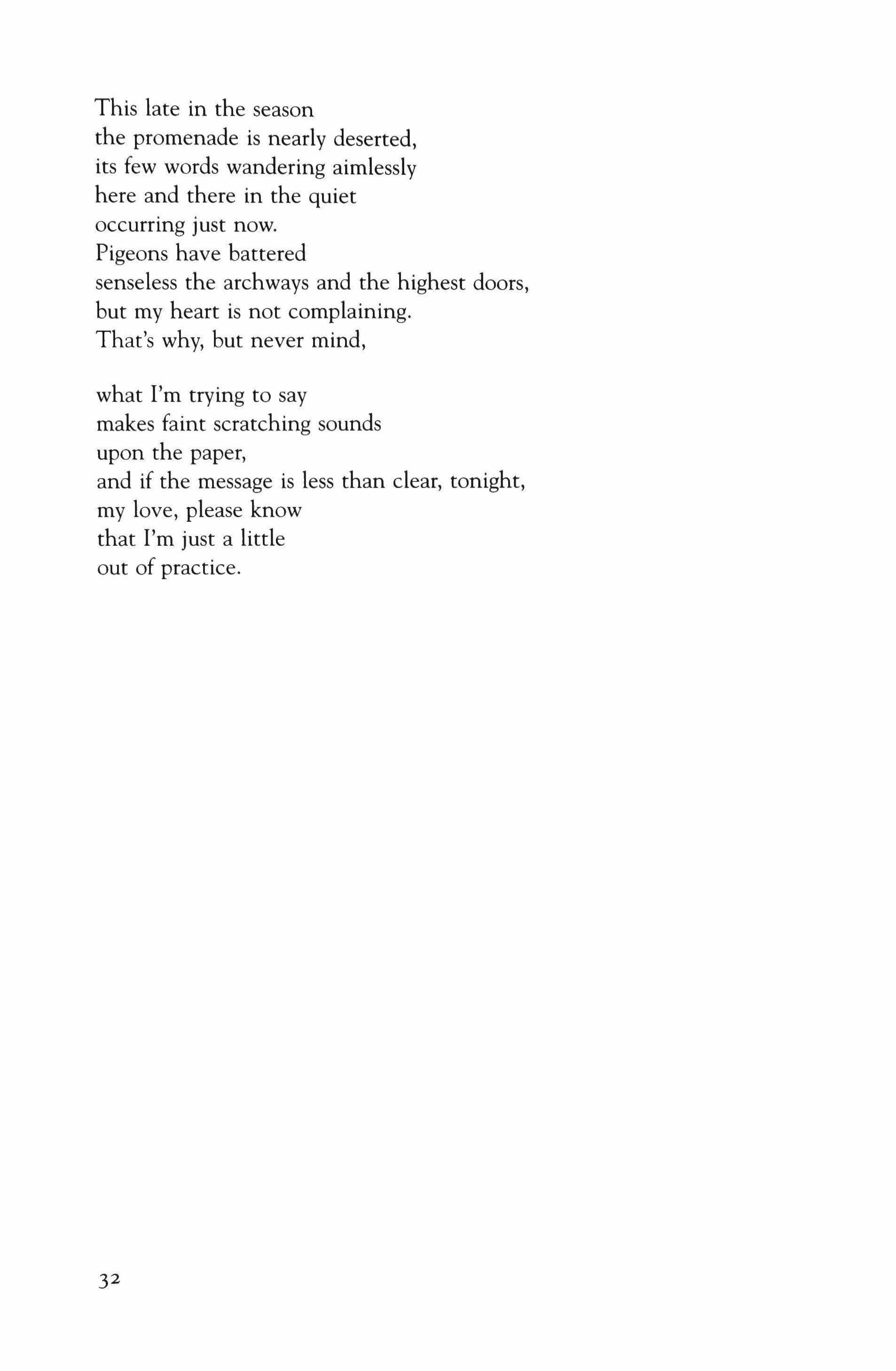
This late in the season the promenade is nearly deserted, its few words wandering aimlessly here and there in the quiet occurring just now. Pigeons have battered senseless the archways and the highest doors, but my heart is not complaining. That's why, but never mind, what I'm trying to say makes faint scratching sounds upon the paper, and if the message is less than clear, tonight, my love, please know that I'm just a little out of practice.
32
Linda Gregerson
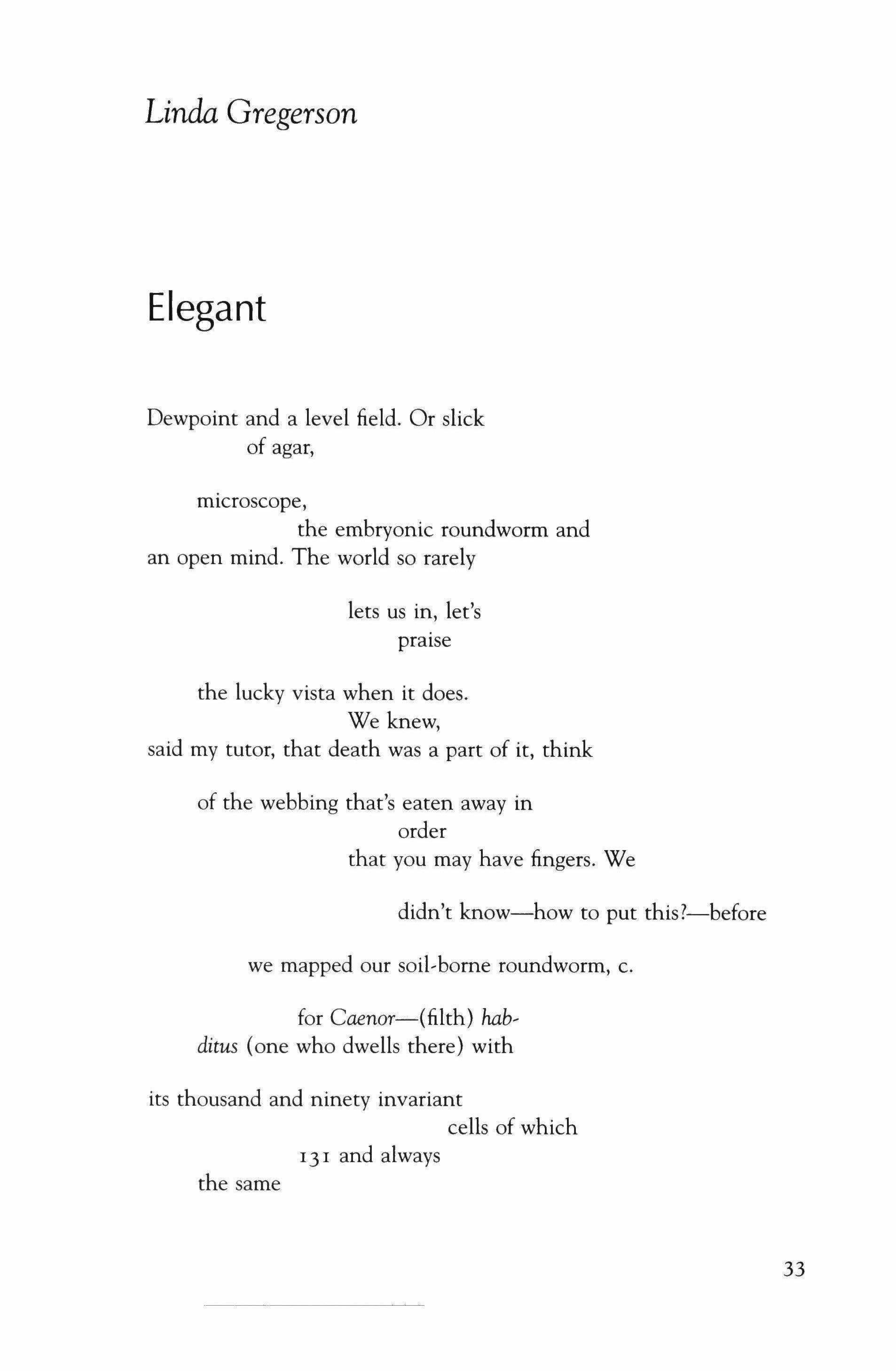
Elegant
Dewpoint and a level field. Or slick of agar, microscope, the embryonic roundworm and an open mind. The world so rarely lets us in, let's praise the lucky vista when it does. We knew, said my tutor, that death was a part of it, think of the webbing that's eaten away in order that you may have fingers. We didn't know-how to put this?-before we mapped our soil-borne roundworm, c. for Caenor-{filth) habditus (one who dwells there) with its thousand and ninety invariant cells of which 131 and always the same
33

and always in a particular sequence are programmed for extinction,
we had no idea how close to the heart of it death must be.
At first
a sort of cratered field, or granulated-see it-both the raised parts and concavities, the sculpting light, and then a sort of swelling (it's a corpse now) then engulfment (that's the sister cell) and then the disappearance (you'll remember how the lipids "lose their place").
And on our chart an x where would be daughter cells, "a fate like any other." It's
a lie, of course, the light and shadow so disposed, a friendly lie, as if as in a play: of something less congenial to the seeing eye, the microscope makes shadow and our question gains some traction and the world, though not just yet and not so seamlessly, makes sense.
34
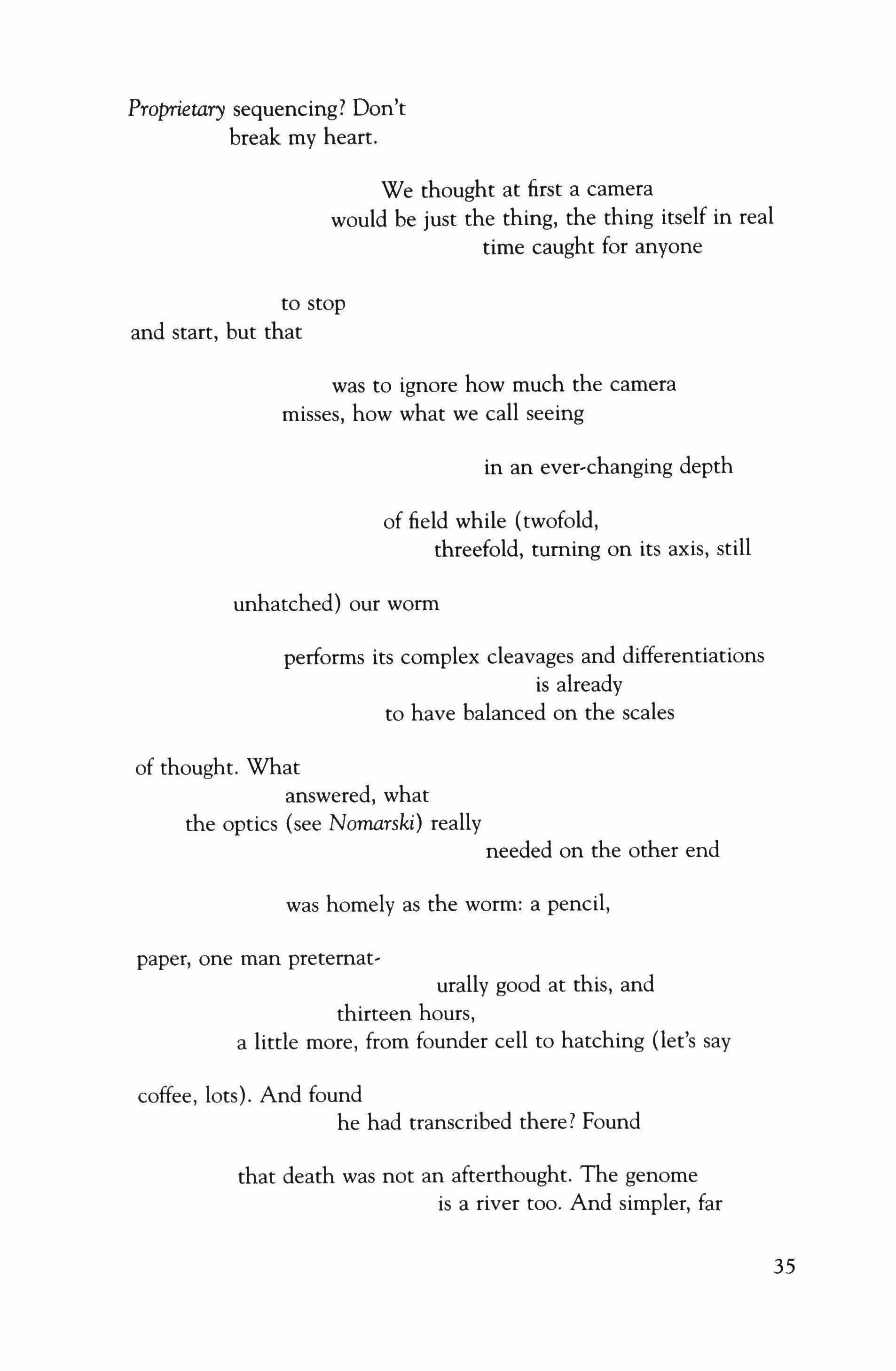
Proprietary sequencing? Don't break my heart.
We thought at first a camera would be just the thing, the thing itself in real time caught for anyone to stop and start, but that was to ignore how much the camera misses, how what we call seeing in an ever-changing depth of field while (twofold, threefold, turning on its axis, still unhatched) our worm performs its complex cleavages and differentiations is already to have balanced on the scales of thought. What answered, what the optics (see Nomarski) really needed on the other end was homely as the worm: a pencil, paper, one man preternaturally good at this, and thirteen hours, a little more, from founder cell to hatching (let's say coffee, lots). And found he had transcribed there? Found that death was not an afterthought. The genome is a river too. And simpler, far
35
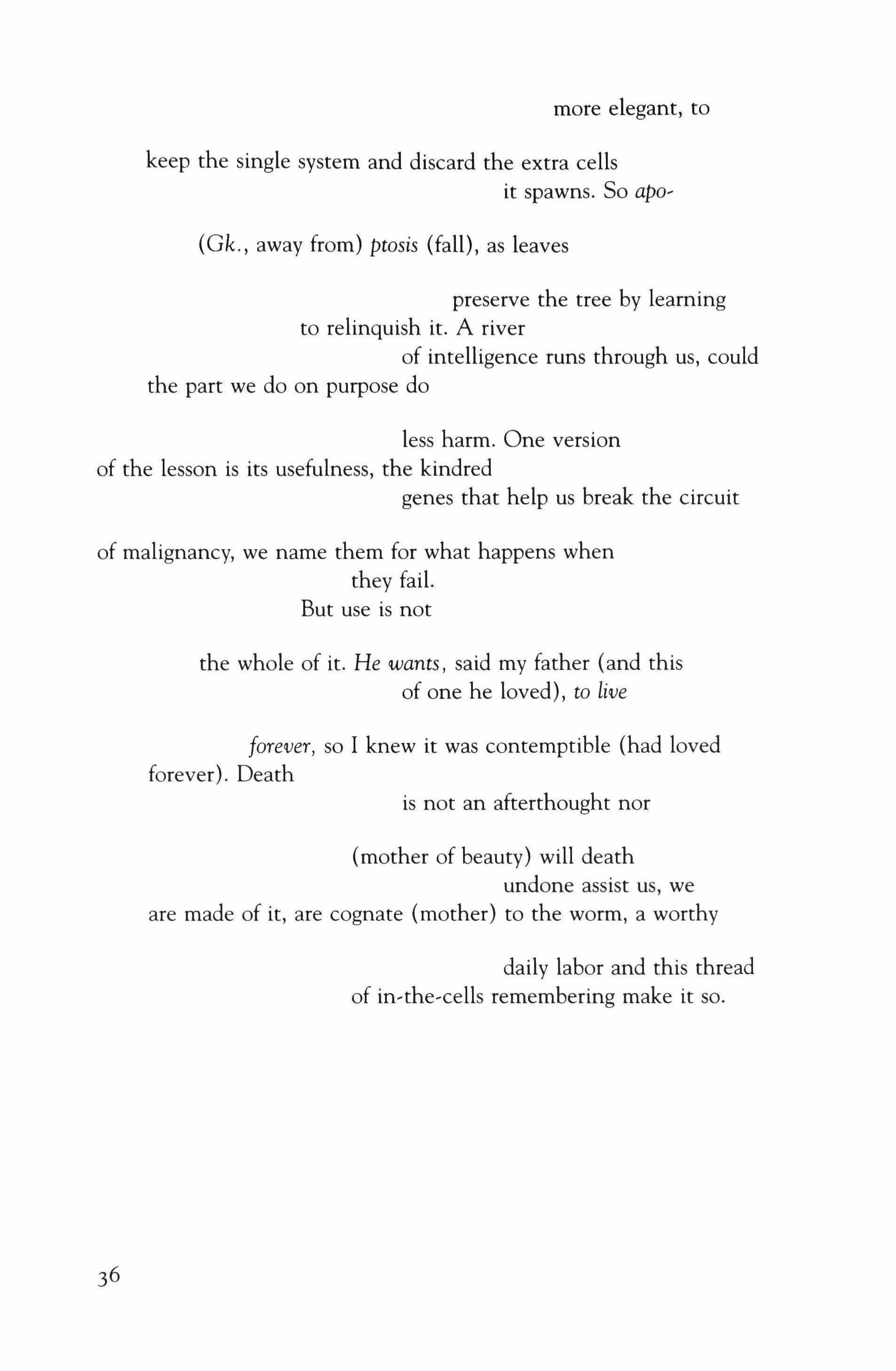
more elegant, to keep the single system and discard the extra cells it spawns. So apo(Gk., away from) ptosis (fall), as leaves
preserve the tree by learning to relinquish it. A river of intelligence runs through us, could the part we do on purpose do less harm. One version of the lesson is its usefulness, the kindred genes that help us break the circuit of malignancy, we name them for what happens when they fail. But use is not the whole of it. He wants, said my father (and this of one he loved), to live
forever, so I knew it was contemptible (had loved forever). Death is not an afterthought nor (mother of beauty) will death undone assist us, we are made of it, are cognate (mother) to the worm, a worthy daily labor and this thread of in-the-cells remembering make it so.
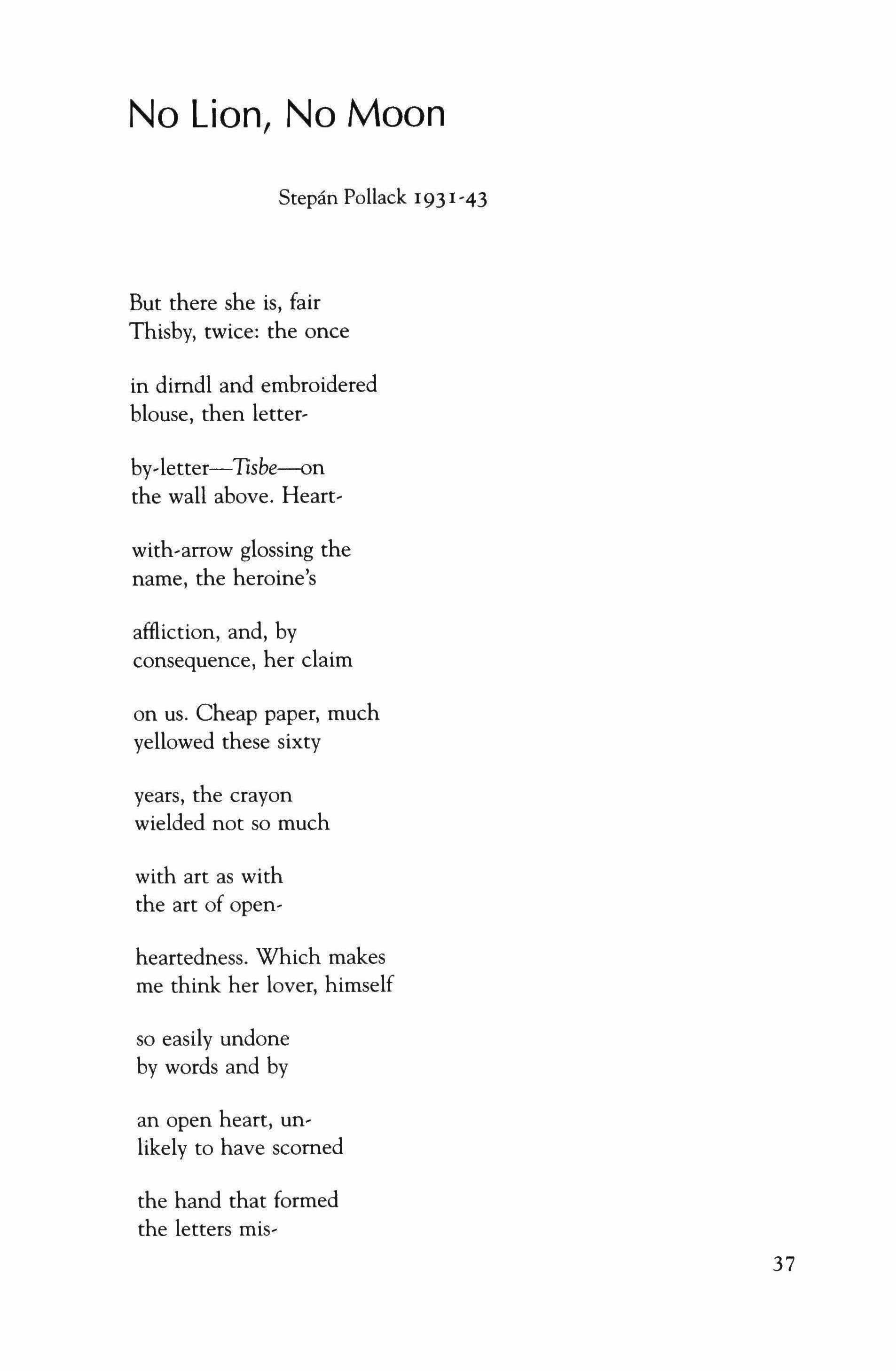
No Lion, No Moon
Stepan Pollack 1931-43
But there she is, fair Thisby, twice: the once in dirndl and embroidered blouse, then letterby-letter-Tzsbe-on the wall above. Heartwith-arrow glossing the name, the heroine's affliction, and, by consequence, her claim on us. Cheap paper, much yellowed these sixty years, the crayon wielded not so much with art as with the art of openheartedness. Which makes me think her lover, himself so easily undone by words and by an open heart, unlikely to have scorned the hand that formed the letters mis-
37

proclaiming Priam just above his head.
What's Pyramus to you, child? Or you and all Theresienstadt to Thisby?
That someone had the wherewithal to find the children crayons at all or guide them through theatricals, that someone-not just someone but the sum of them, the commonweal, inside this unfamiliar and malignant
place, this "camp"-could find the heart to care for pictures, playswithin-a-play, and injudicious lovers long before their keepers thought to use such things as camouflage (the Red Cross sent observers once) and, caring for such things, to make of them something
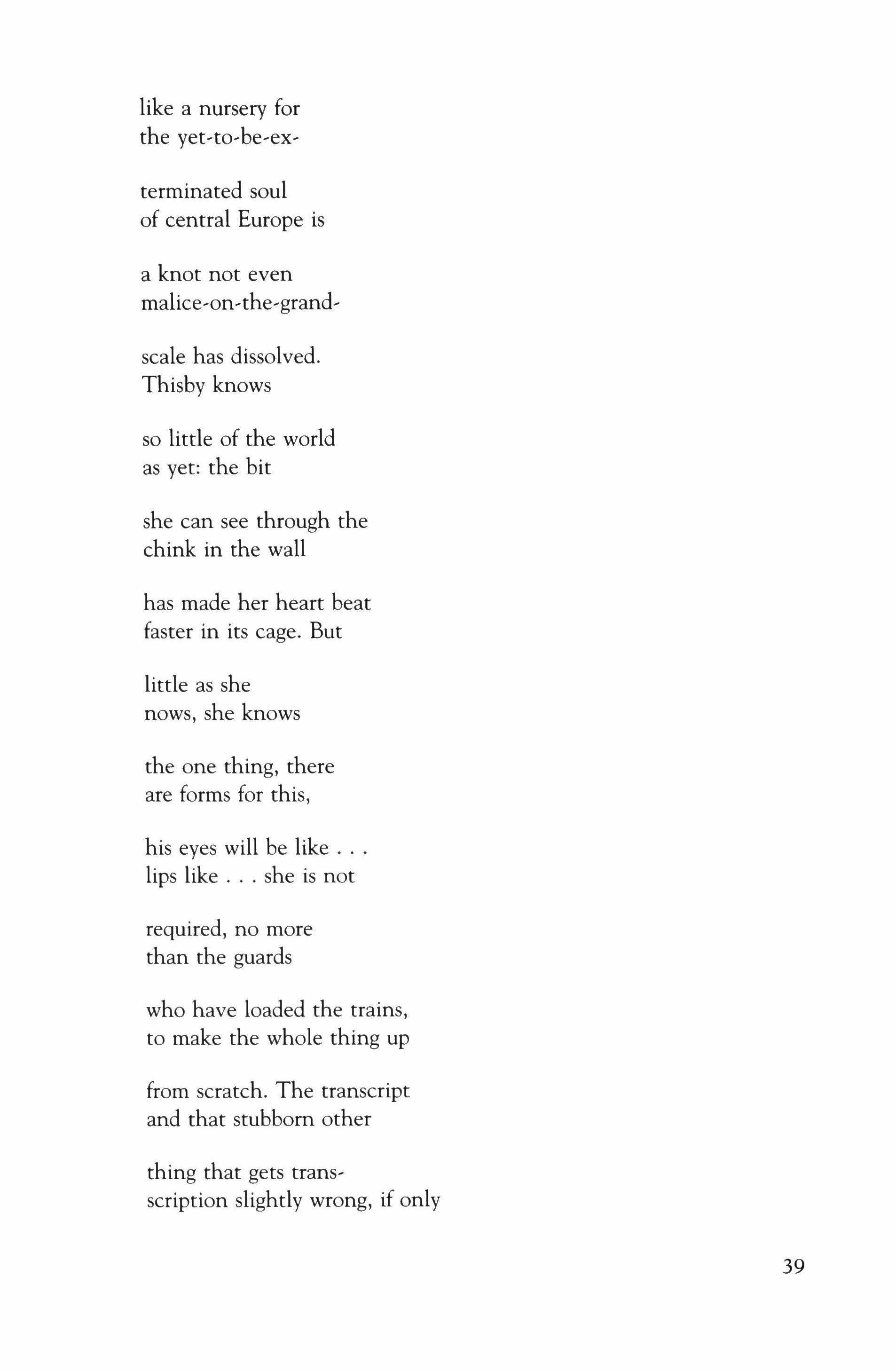
like a nursery for the yet-to-be-ex-
terminated soul of central Europe is
a knot not even malice-on-the-grandscale has dissolved. Thisby knows so little of the world as yet: the bit she can see through the chink in the wall has made her heart beat faster in its cage. But little as she nows, she knows the one thing, there are forms for this, his eyes will be like lips like she is not required, no more than the guards who have loaded the trains, to make the whole thing up from scratch. The transcript and that stubborn other thing that gets transscription slightly wrong, if only
39

rarely in our favor. Young Stepan left the lion out.
Arthur Smith

Matinee
He can't believe
This is love.
Or the same tire-rutted road home
He walked out on
Only a couple of hours ago.
Or that he doesn't mind walking
The same tire,rutted road
Home by himself. Now he can see
There is this other light, too.
In it, even the dust
Scuffed up
Can look just like
Rust on his shoes, or like suede-
And that on one side of him is a bounty of late calves
Schooling in a field,
And, on the other, a carnival of sheared cane stalks
Sizzling. Everything he looks at
Looks back-
The green fires snapping low to the ground
And the cloddish ash
41

The earth turns sweet on-the calves mewling, The blunt stalks
Steaming, the steady heat And smoke so like
His own mind smoldering With her-
What a trip, He is thinking, walking along, Reeled in.
"Comfort & Cruelty in the Saying of It"
In memoriam, Al Braselton, 1935-2002
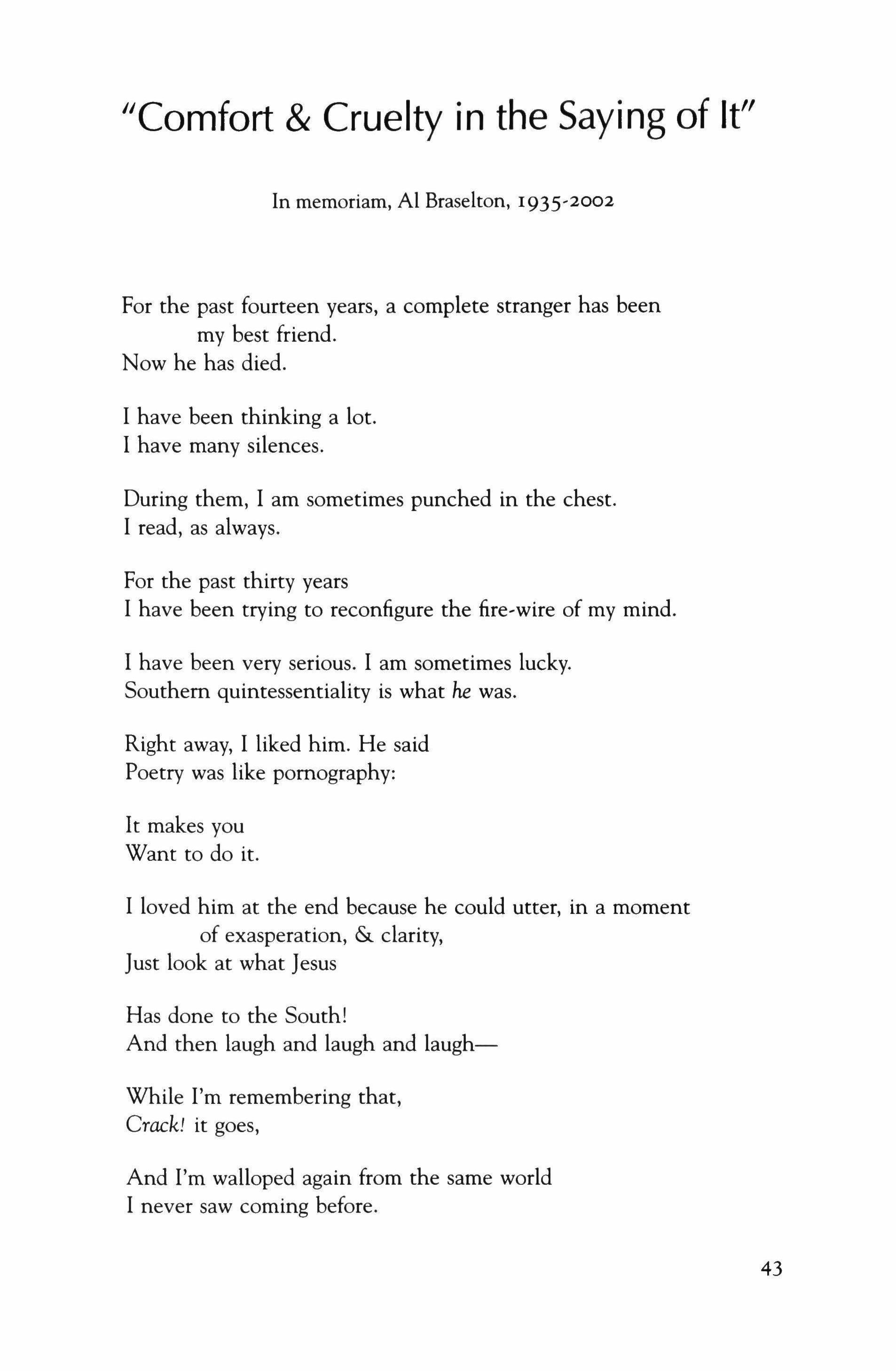
For the past fourteen years, a complete stranger has been my best friend. Now he has died.
I have been thinking a lot. I have many silences.
During them, I am sometimes punched in the chest. I read, as always.
For the past thirty years I have been trying to reconfigure the fire-wire of my mind.
I have been very serious. I am sometimes lucky. Southern quintessentiality is what he was.
Right away, I liked him. He said Poetry was like pornography:
It makes you Want to do it.
I loved him at the end because he could utter, in a moment of exasperation, & clarity, Just look at what Jesus Has done to the South! And then laugh and laugh and laugh-
While I'm remembering that, Crack! it goes,
And I'm walloped again from the same world I never saw coming before.
43
The Cardinals of Zen
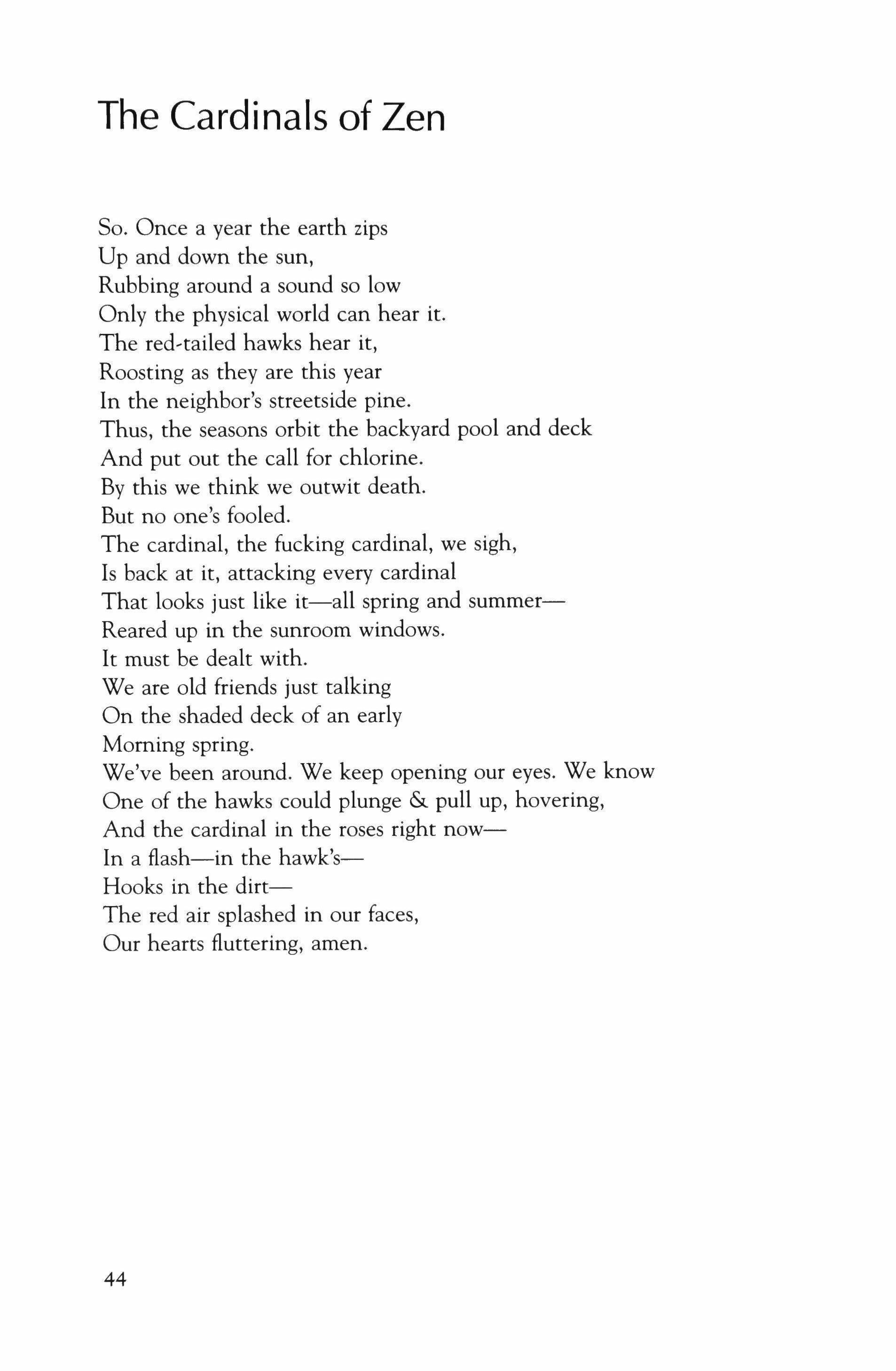
So. Once a year the earth zips Up and down the sun, Rubbing around a sound so low Only the physical world can hear it. The red-tailed hawks hear it, Roosting as they are this year In the neighbor's streetside pine. Thus, the seasons orbit the backyard pool and deck And put out the call for chlorine. By this we think we outwit death. But no one's fooled.
The cardinal, the fucking cardinal, we sigh, Is back at it, attacking every cardinal That looks just like it-all spring and summerReared up in the sunroom windows. It must be dealt with.
We are old friends just talking On the shaded deck of an early Morning spring. We've been around. We keep opening our eyes. We know One of the hawks could plunge & pull up, hovering, And the cardinal in the roses right nowIn a flash-in the hawk'sHooks in the dirt-
The red air splashed in our faces, Our hearts fluttering, amen.
44
We Have Made These Things
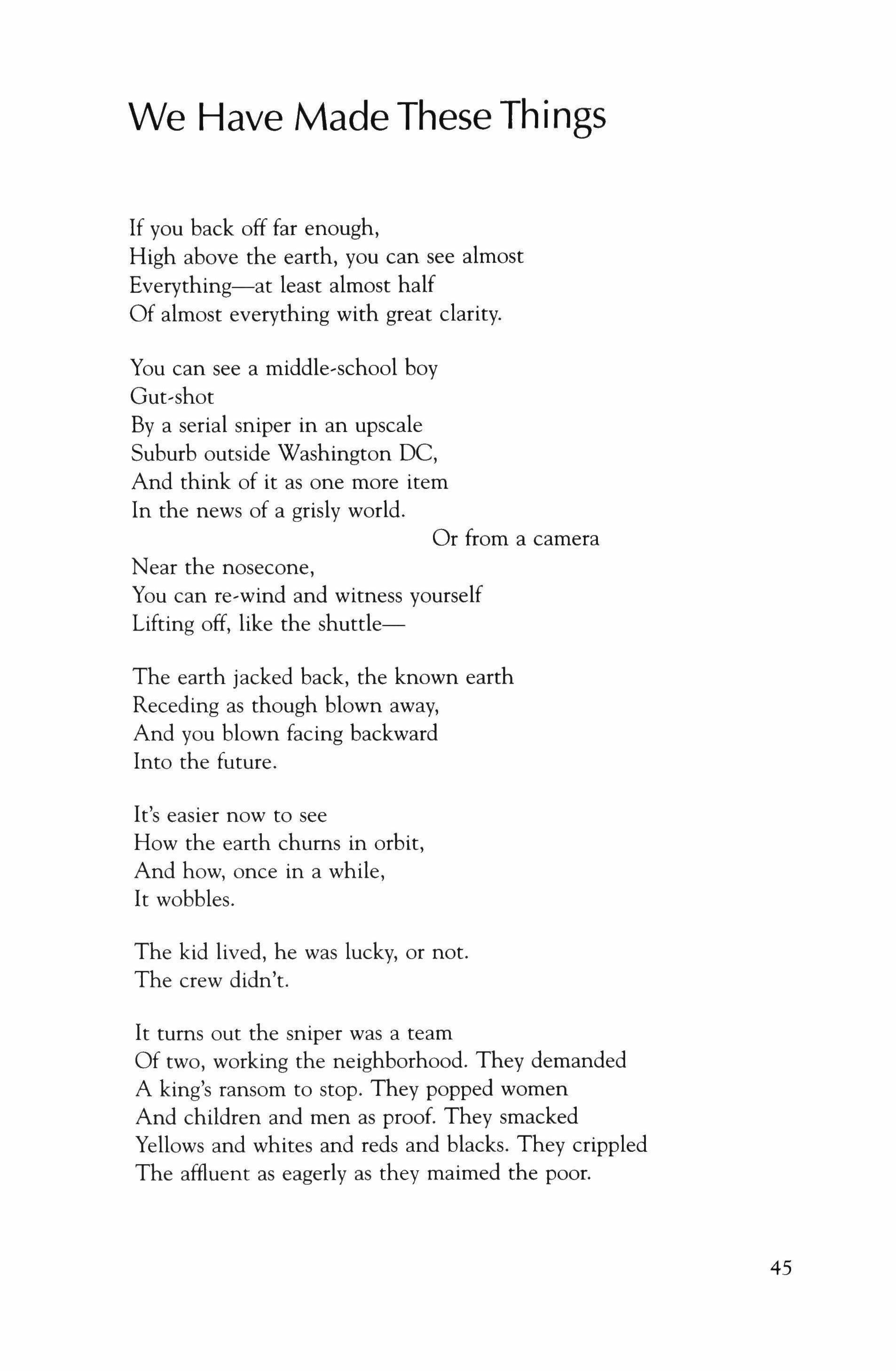
If you back off far enough, High above the earth, you can see almost Everything-at least almost half Of almost everything with great clarity.
You can see a middle-school boy Gut-shot
By a serial sniper in an upscale Suburb outside Washington DC, And think of it as one more item In the news of a grisly world. Or from a camera
Near the nosecone, You can re-wind and witness yourself Lifting off, like the shuttle-
The earth jacked back, the known earth Receding as though blown away, And you blown facing backward Into the future.
It's easier now to see How the earth chums in orbit, And how, once in a while, It wobbles.
The kid lived, he was lucky, or not. The crew didn't.
It turns out the sniper was a team Of two, working the neighborhood. They demanded A king's ransom to stop. They popped women And children and men as proof. They smacked Yellows and whites and reds and blacks. They crippled The affluent as eagerly as they maimed the poor.
45
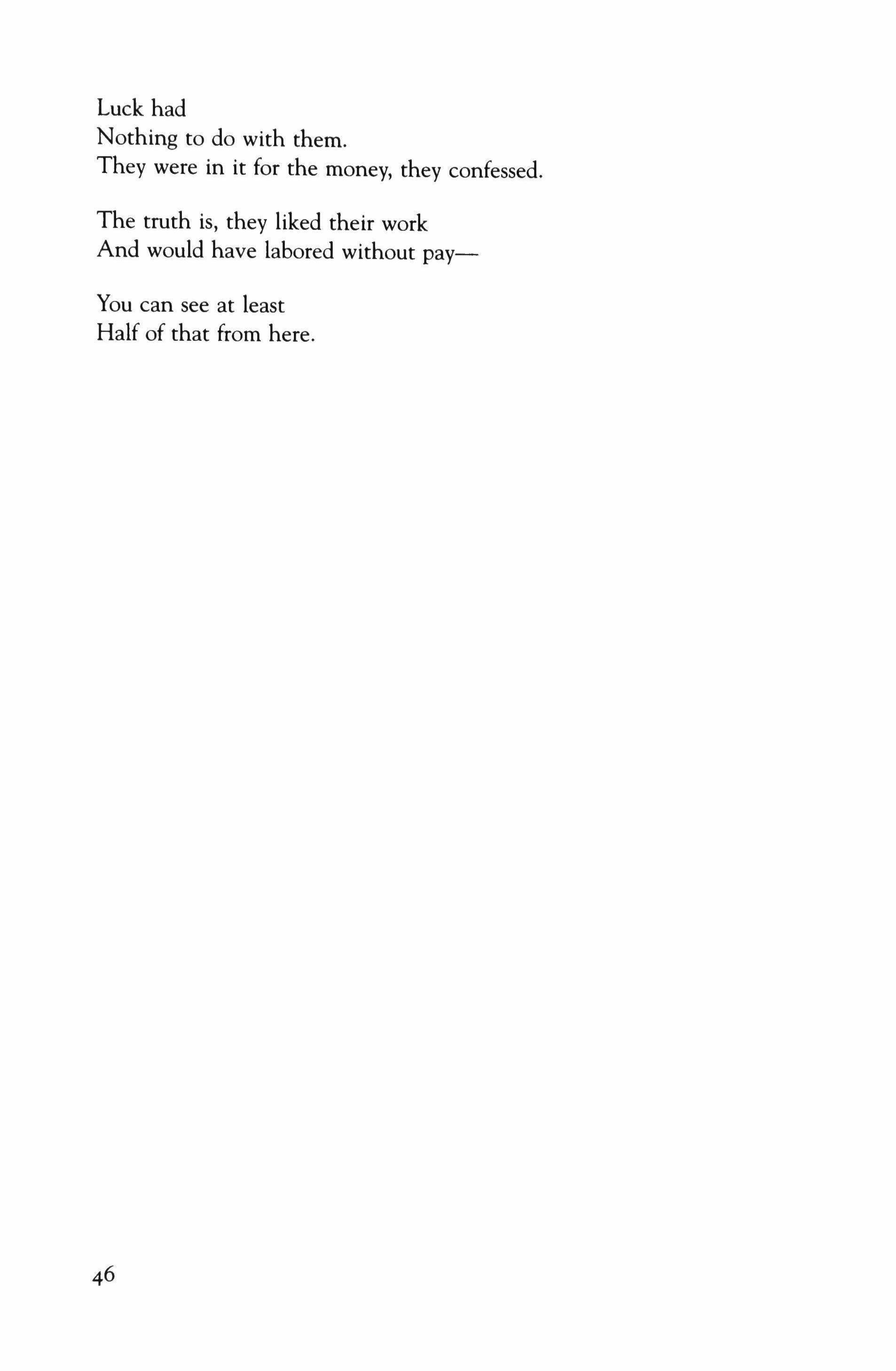
Luck had Nothing to do with them. They were in it for the money, they confessed.
The truth is, they liked their work And would have labored without pay-
You can see at least Half of that from here.
Sharon Bryan Stardust
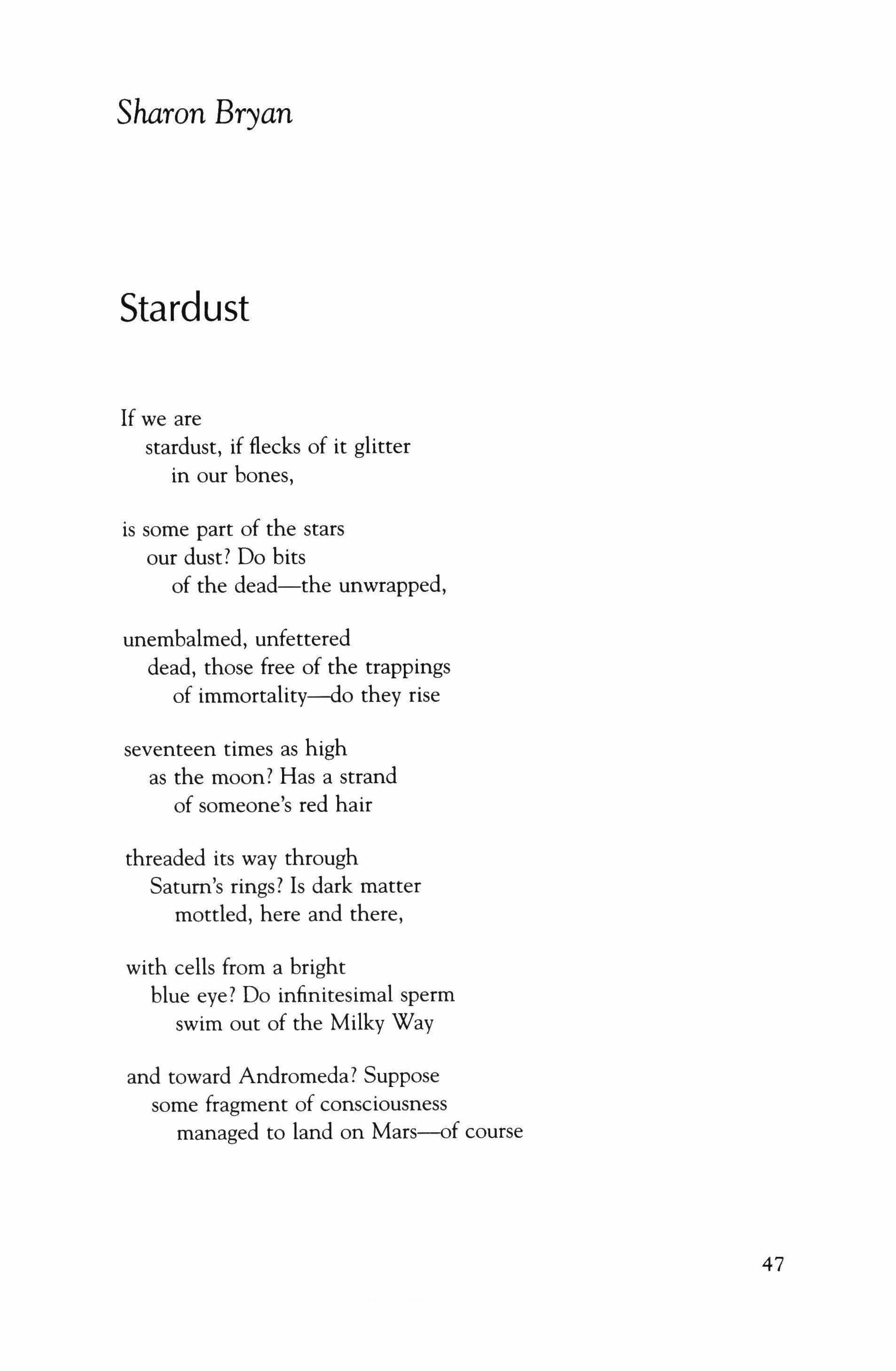
If we are stardust, if flecks of it glitter in our bones, is some part of the stars our dust? Do bits of the dead-the unwrapped, unembalmed, unfettered dead, those free of the trappings of immortality--do they rise
seventeen times as high as the moon? Has a strand of someone's red hair threaded its way through Saturn's rings? Is dark matter mottled, here and there, with cells from a bright blue eye? Do infinitesimal sperm swim out of the Milky Way and toward Andromeda? Suppose some fragment of consciousness managed to land on Mars-of course
47
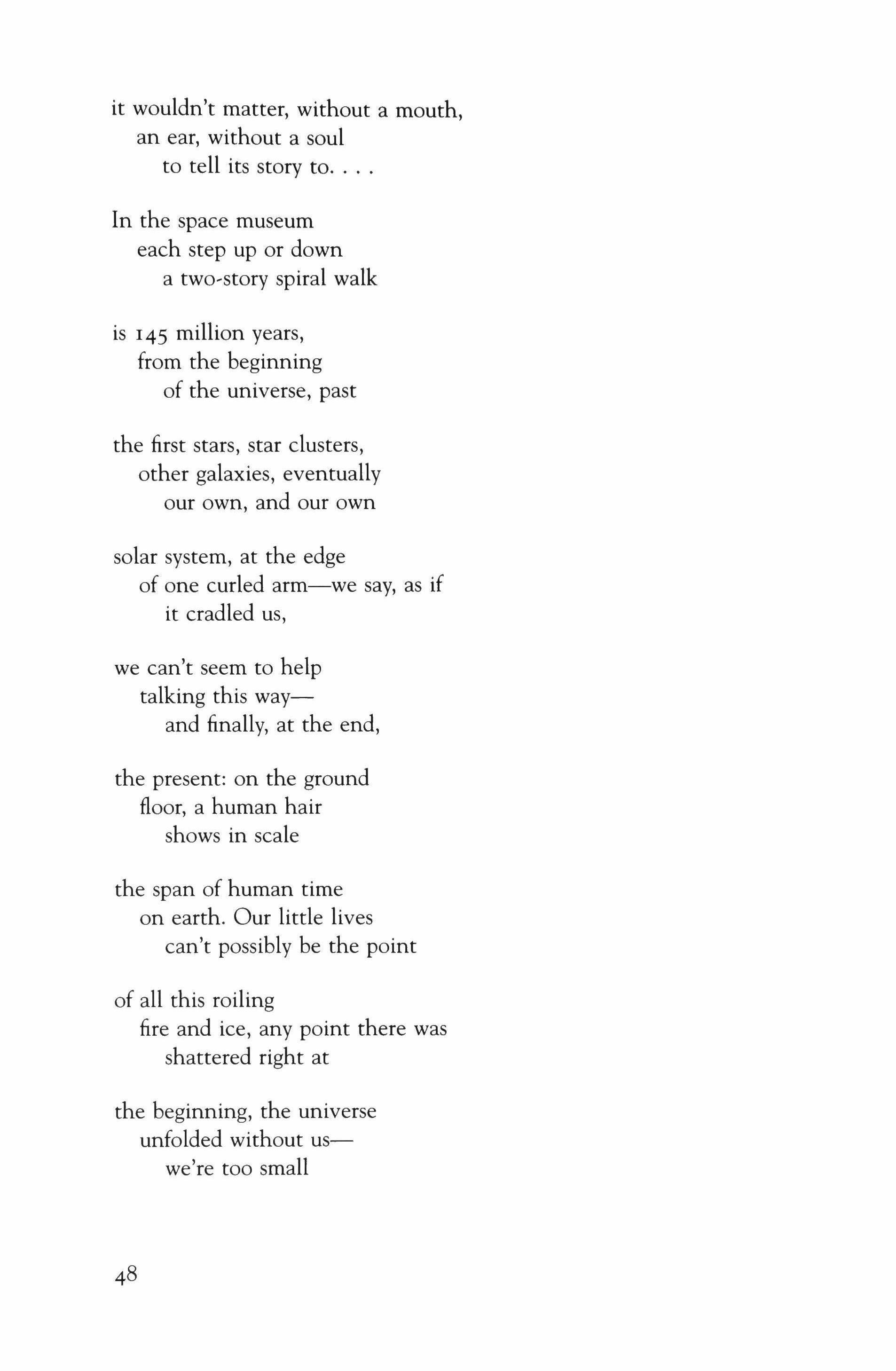
it wouldn't matter, without a mouth, an ear, without a soul to tell its story to
In the space museum each step up or down a two-story spiral walk is 145 million years, from the beginning of the universe, past the first stars, star clusters, other galaxies, eventually our own, and our own solar system, at the edge of one curled arm-we say, as if it cradled us, we can't seem to help talking this wayand finally, at the end, the present: on the ground floor, a human hair shows in scale the span of human time on earth. Our little lives can't possibly be the point of all this roiling fire and ice, any point there was shattered right at the beginning, the universe unfolded without uswe're too small
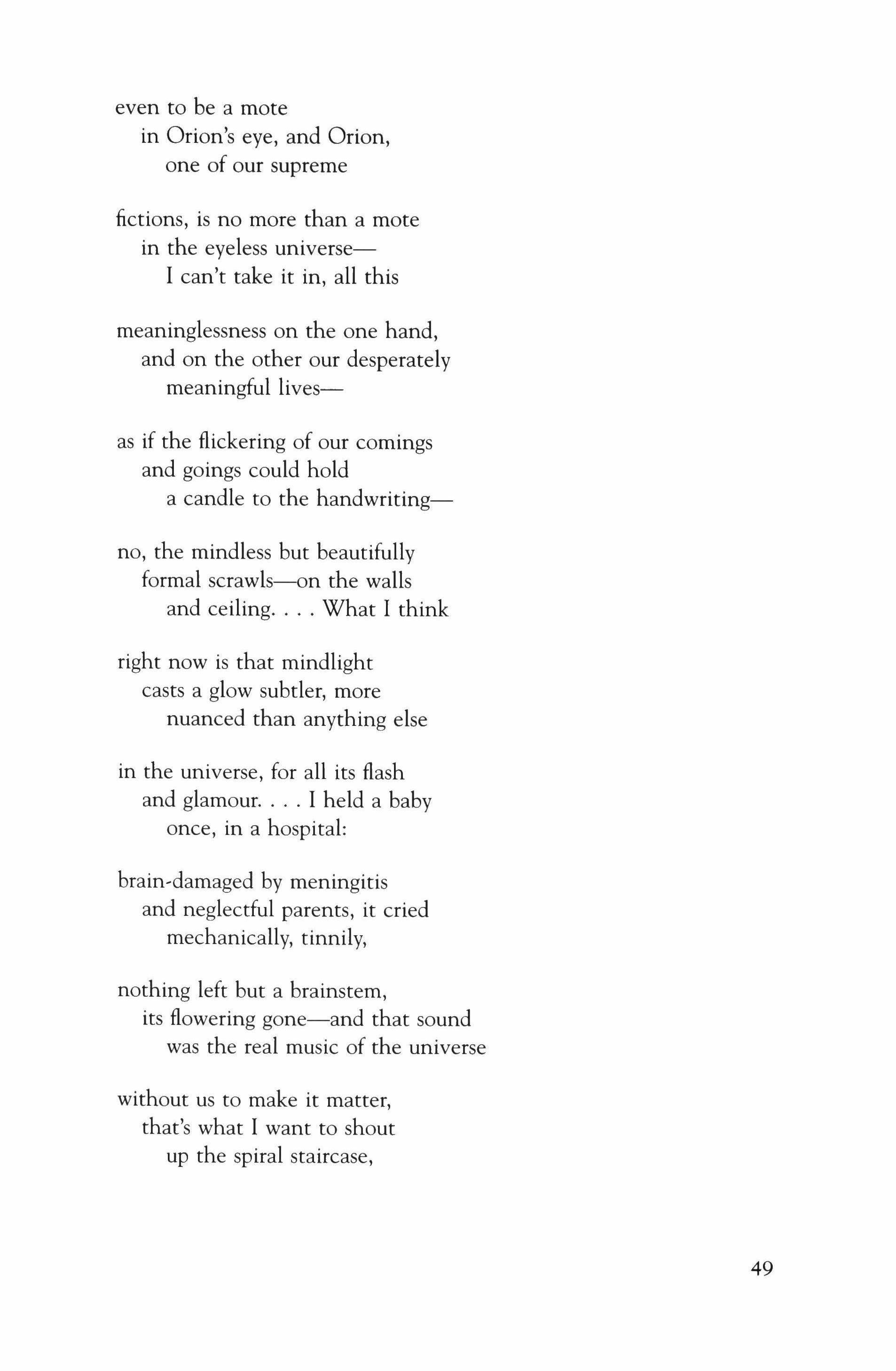
even to be a mote in Orion's eye, and Orion, one of our supreme
fictions, is no more than a mote in the eyeless universeI can't take it in, all this meaninglessness on the one hand, and on the other our desperately meaningful lives-
as if the flickering of our comings and goings could hold a candle to the handwritingno, the mindless but beautifully formal scrawls-on the walls and ceiling. What I think right now is that mindlight casts a glow subtler, more nuanced than anything else
in the universe, for all its flash and glamour. I held a baby once, in a hospital:
brain-damaged by meningitis and neglectful parents, it cried mechanically, tinnily, nothing left but a brainstem, its flowering gone-and that sound was the real music of the universe without us to make it matter, that's what I want to shout up the spiral staircase,
49

and I want my voice to carry out through the roof, past the moon and sun and stars
to the edge of space, the beginning of time, I want to say, We're coming, life is coming,
people are coming, words and music are coming, we will make something of you-but there is no you.
One of my teachers said Avoid personification, and I believe she was right: instead of seeing ourselves
wherever we look, we must see things for what they are: stardust. Soon enough
it will fill our lungsas another teacher said, So many more ways to be dead than alive.
If value is based on scarcity, we're the most valuable things in the universe, even if the universe doesn't know it. The most difficult part of writing a Shakespearean sonnet
is finding a two-line couplet that will somehow balance everything that's come before it, but mere mortals set themselves this problem in the first place,
50

and have solved it over and over, in different ways-this form
is a part of the universe passing through us like a wavea kind of kinship, a kind of love.
51
Oh Boy
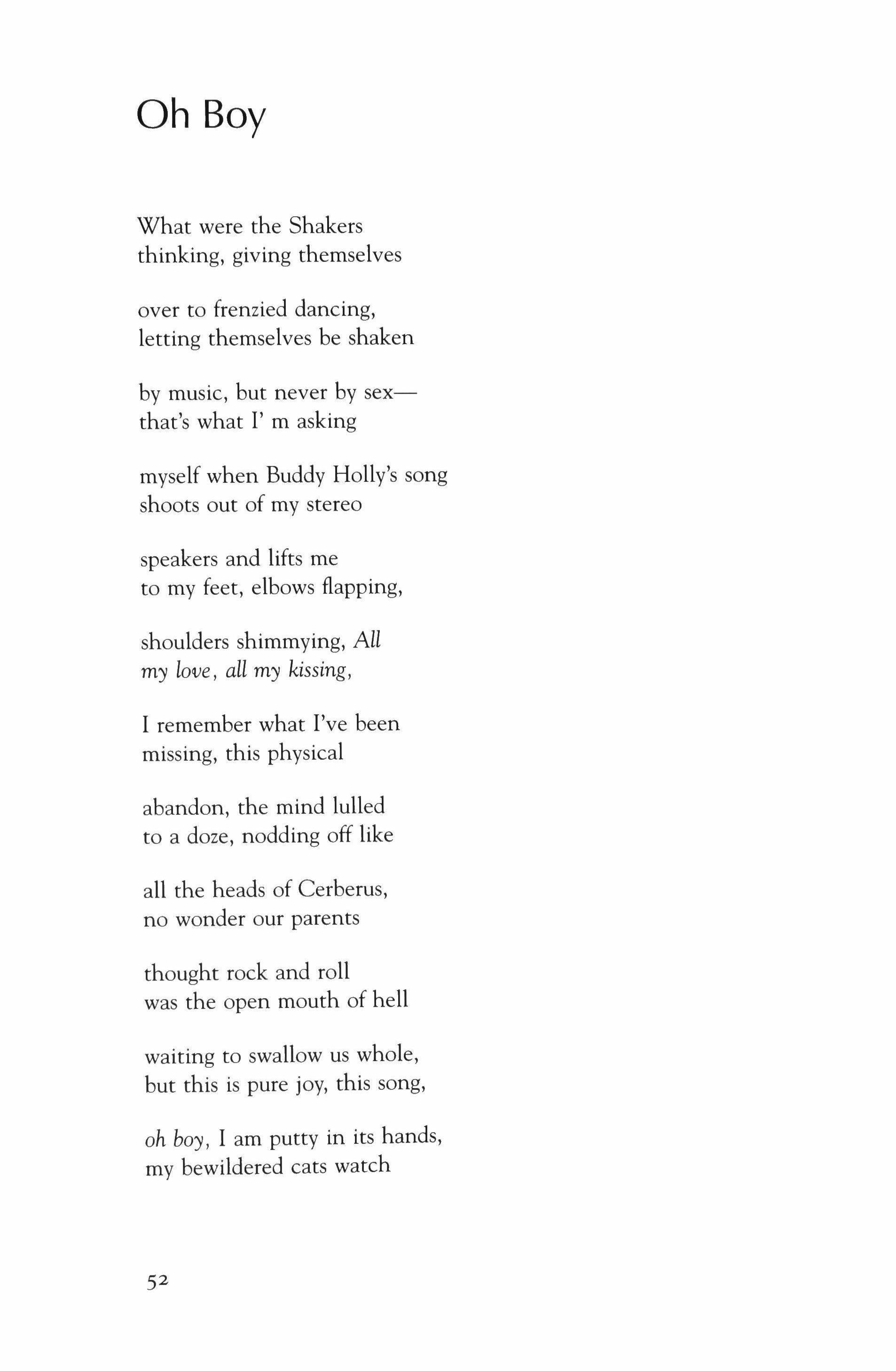
What were the Shakers thinking, giving themselves
over to frenzied dancing, letting themselves be shaken by music, but never by sexthat's what I' masking
myself when Buddy Holly's song shoots out of my stereo speakers and lifts me to my feet, elbows flapping, shoulders shimmying, All my love, all my kissing,
I remember what I've been missing, this physical abandon, the mind lulled to a doze, nodding off like all the heads of Cerberus, no wonder our parents
thought rock and roll was the open mouth of hell
waiting to swallow us whole, but this is pure joy, this song,
oh boy, I am putty in its hands, my bewildered cats watch

me get religion, I surrender completely to His Hollyness-
something I couldn't quite do in public as a teen, dying
to dance but paralyzed by shyness until I finally let myself go at a party where no one knew
I was the girl who didn't dance-my dictionary is wrong, ecstasy doesn't take me out of my body but into it, I am not beside myself, I have for glorious
minutes forgotten my cumbersome self in this divine music, shed it like a suit of clothes to step into these waves breaking all around me, just as the Shakers must have, and maybe they were right, maybe dancing like this is as good as sexI am so many plucked strings, His instrument, reduced to sympathetic vibrations that were the beginning of everything, and if my end
53
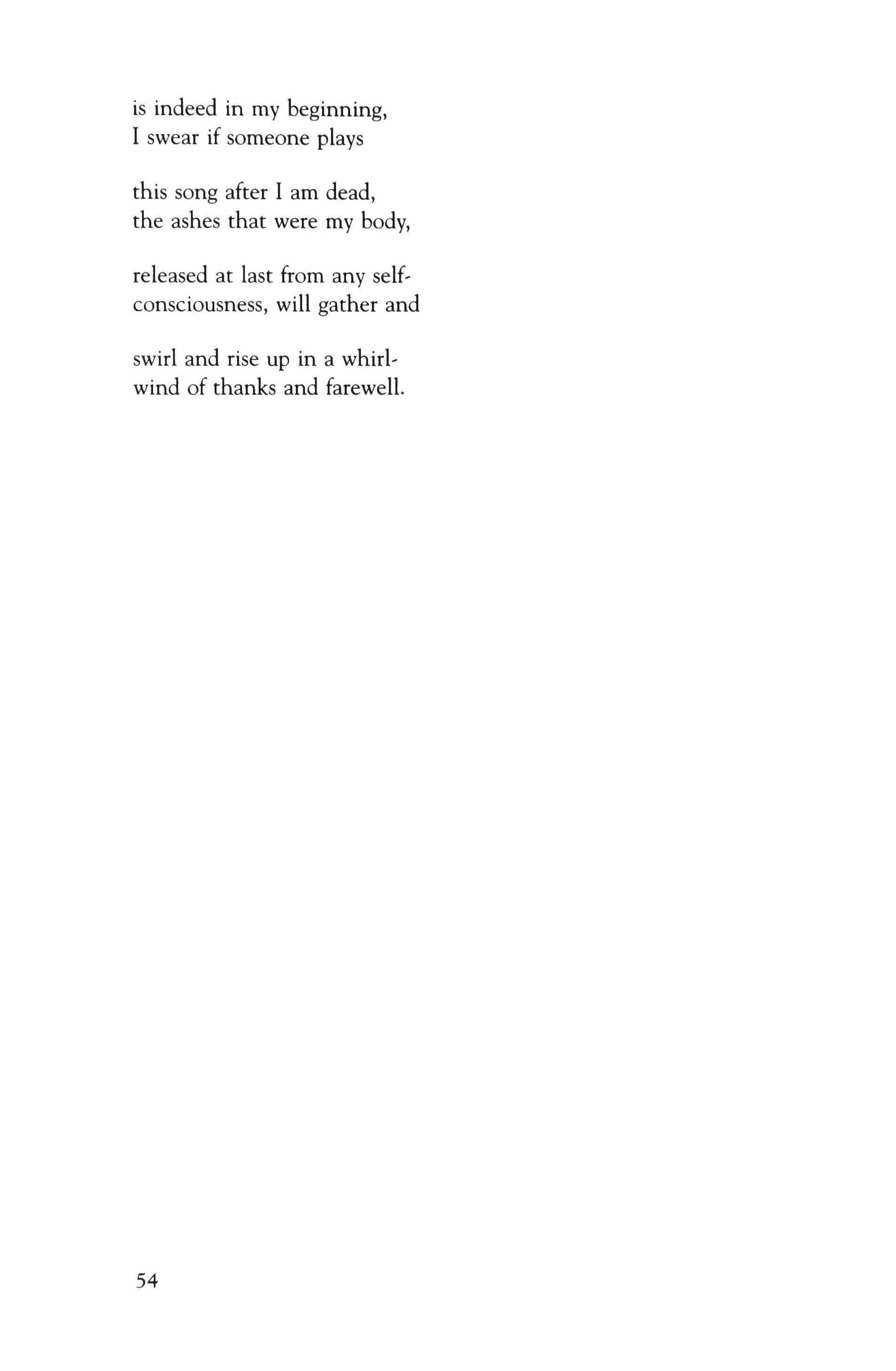
is indeed in my beginning, I swear if someone plays this song after I am dead, the ashes that were my body, released at last from any selfconsciousness, will gather and swirl and rise up in a whirlwind of thanks and farewell.
54
Campbell McGrath
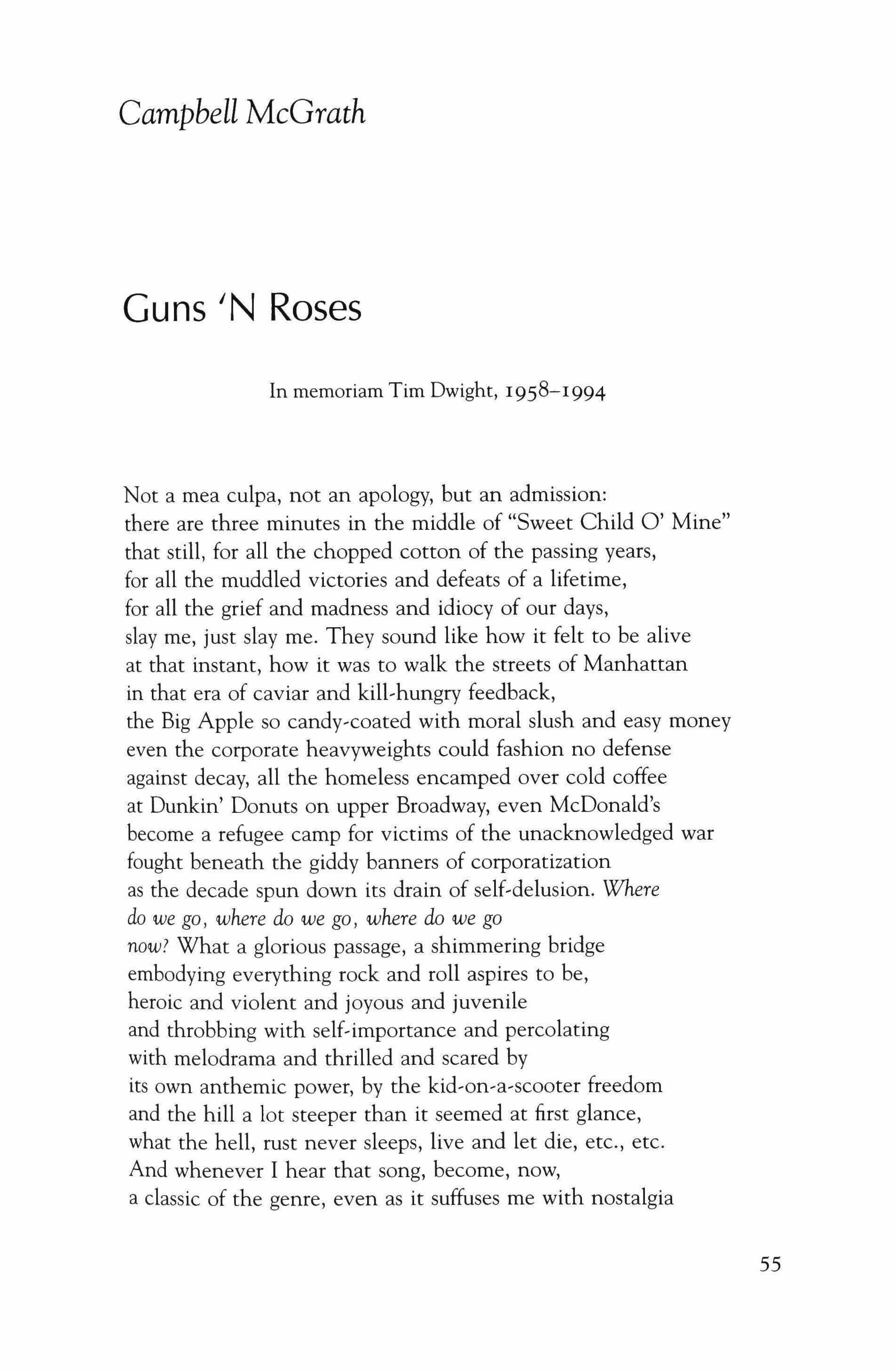
Guns
'N Roses
In memoriam Tim Dwight, 1958-1994
Not a mea culpa, not an apology, but an admission: there are three minutes in the middle of "Sweet Child 0' Mine" that still, for all the chopped cotton of the passing years, for all the muddled victories and defeats of a lifetime, for all the grief and madness and idiocy of our days, slay me, just slay me. They sound like how it felt to be alive at that instant, how it was to walk the streets of Manhattan in that era of caviar and kill-hungry feedback, the Big Apple so candy-coated with moral slush and easy money even the corporate heavyweights could fashion no defense against decay, all the homeless encamped over cold coffee at Dunkin' Donuts on upper Broadway, even McDonald's become a refugee camp for victims of the unacknowledged war fought beneath the giddy banners of corporatization as the decade spun down its drain of self-delusion. Where do we go, where do we go, where do we go now? What a glorious passage, a shimmering bridge embodying everything rock and roll aspires to be, heroic and violent and joyous and juvenile and throbbing with self-importance and percolating with melodrama and thrilled and scared by its own anthemic power, by the kid-on-a-scooter freedom and the hill a lot steeper than it seemed at first glance, what the hell, rust never sleeps, live and let die, etc., etc. And whenever I hear that song, become, now, a classic of the genre, even as it suffuses me with nostalgia
55
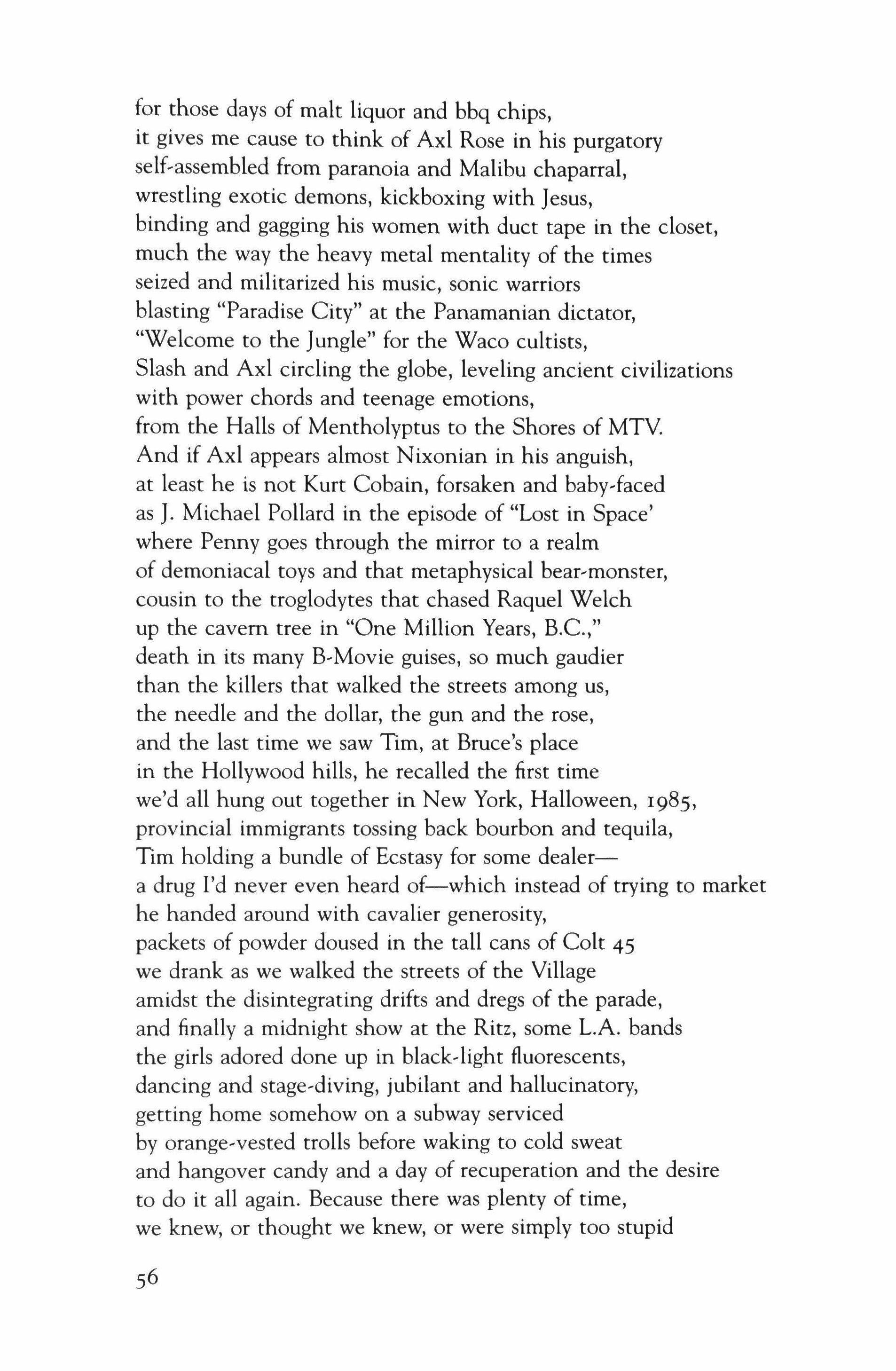
for those days of malt liquor and bbq chips, it gives me cause to think of AxI Rose in his purgatory self,assembled from paranoia and Malibu chaparral, wrestling exotic demons, kickboxing with Jesus, binding and gagging his women with duct tape in the closet, much the way the heavy metal mentality of the times seized and militarized his music, sonic warriors blasting "Paradise City" at the Panamanian dictator, "Welcome to the Jungle" for the Waco cultists, Slash and Axl circling the globe, leveling ancient civilizations with power chords and teenage emotions, from the Halls of Mentholyptus to the Shores of MTV. And ifAxl appears almost Nixonian in his anguish, at least he is not Kurt Cobain, forsaken and baby-faced as J. Michael Pollard in the episode of "Lost in Space' where Penny goes through the mirror to a realm of demoniacal toys and that metaphysical bear'monster, cousin to the troglodytes that chased Raquel Welch up the cavern tree in "One Million Years, B.C.," death in its many B,Movie guises, so much gaudier than the killers that walked the streets among us, the needle and the dollar, the gun and the rose, and the last time we saw Tim, at Bruce's place in the Hollywood hills, he recalled the first time we'd all hung out together in New York, Halloween, 1985, provincial immigrants tossing back bourbon and tequila, Tim holding a bundle of Ecstasy for some dealera drug I'd never even heard of-which instead of trying to market he handed around with cavalier generosity, packets of powder doused in the tall cans of Colt 45 we drank as we walked the streets of the Village amidst the disintegrating drifts and dregs of the parade, and finally a midnight show at the Ritz, some L.A. bands the girls adored done up in black,light tluorescents, dancing and stage-diving, jubilant and hallucinatory, getting home somehow on a subway serviced by orange'vested trolls before waking to cold sweat and hangover candy and a day of recuperation and the desire to do it all again. Because there was plenty of time, we knew, or thought we knew, or were simply too stupid
56
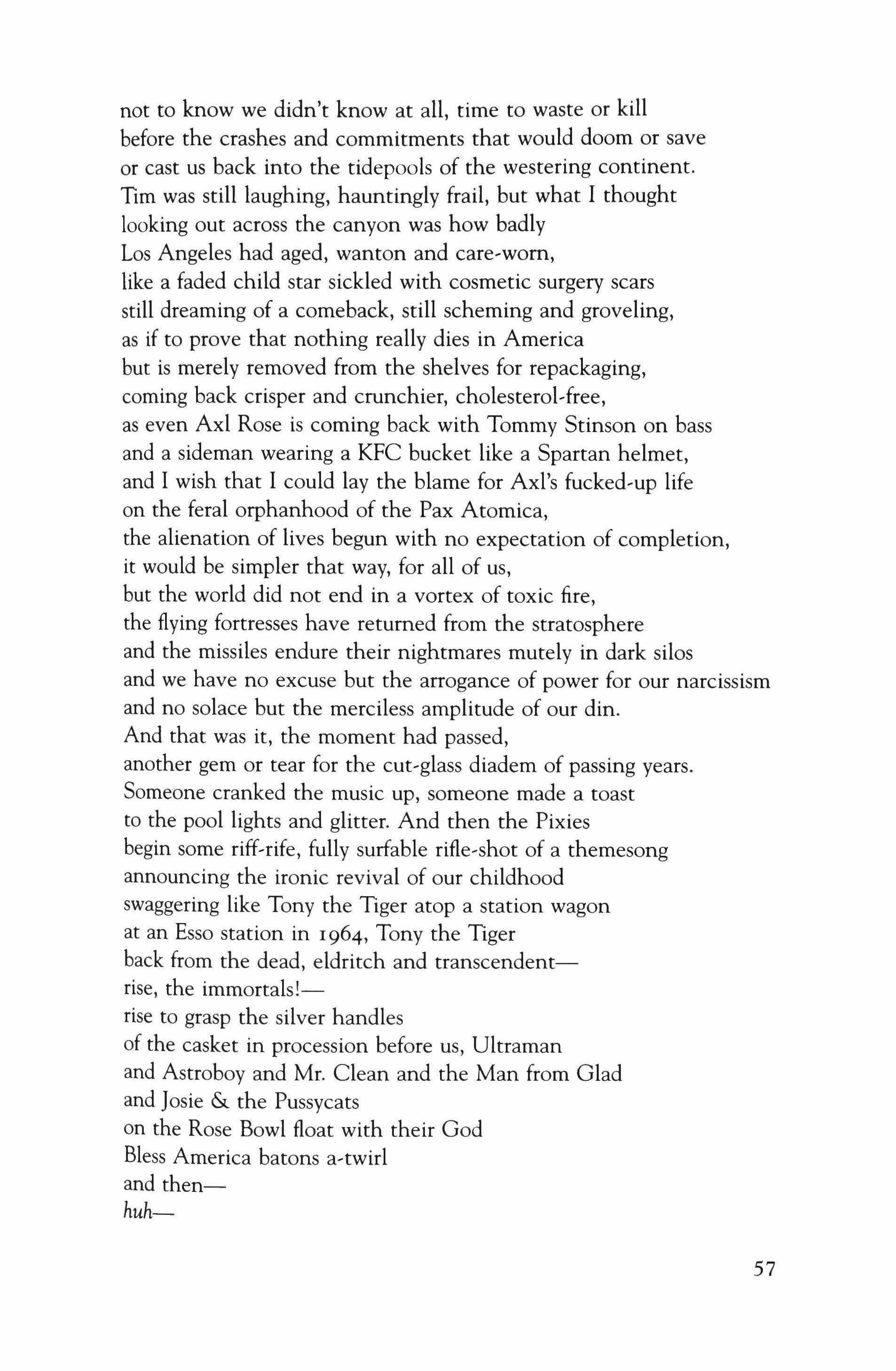
not to know we didn't know at all, time to waste or kill before the crashes and commitments that would doom or save or cast us back into the tidepools of the westering continent. Tim was still laughing, hauntingly frail, but what I thought looking out across the canyon was how badly Los Angeles had aged, wanton and care'worn, like a faded child star sickled with cosmetic surgery scars still dreaming of a comeback, still scheming and groveling, as if to prove that nothing really dies in America but is merely removed from the shelves for repackaging, coming back crisper and crunchier, cholesterol-free, as even Axl Rose is coming back with Tommy Stinson on bass and a sideman wearing a KFC bucket like a Spartan helmet, and I wish that I could lay the blame for Axl's fucked-up life on the feral orphanhood of the Pax Atomica, the alienation of lives begun with no expectation of completion, it would be simpler that way, for all of us, but the world did not end in a vortex of toxic fire, the flying fortresses have returned from the stratosphere and the missiles endure their nightmares mutely in dark silos and we have no excuse but the arrogance of power for our narcissism and no solace but the merciless amplitude of our din. And that was it, the moment had passed, another gem or tear for the cut-glass diadem of passing years. Someone cranked the music up, someone made a toast to the pool lights and glitter. And then the Pixies begin some riff-rife, fully surfable rifle-shot of a themesong announcing the ironic revival of our childhood swaggering like Tony the Tiger atop a station wagon at an Esso station in 1964, Tony the Tiger back from the dead, eldritch and transcendentrise, the immortals!rise to grasp the silver handles of the casket in procession before us, Ultraman and Astroboy and Mr. Clean and the Man from Glad and Josie & the Pussycats on the Rose Bowl float with their God Bless America batons a-twirl and thenhuh-
57

cue the horns, take it down, break it all apart and start from nothing to garb our nakedness with sheets of beaten gold, cozen us with grieving blossoms, anoint us with honey in the dry riverbed, and tell me, o great devourer, o master of thorns and ashes, where do we go now?
58
Michelle Boisseau

Inkling
When I'm doodling an ink pathway in my usual style, I'm bound to end with intermarried squares, a mazy Renaissance garden where a hostage princess can pine contentedly. A moving pen is memory's wormhole. This morning inking up a page's corner, I land in some remote moment where rafts of numbers have been wrecked on the slate sea. An armada of arithmetic was sent out against me. And at the big desk on the horizon, the rising thunderhead of Sister Robertsshe's wiry, I guess, and wears specs, but her face is blank and blanker the faces of forty others I weathered eight years with. Details have been sifted down to a red shirt up aisle, scarred toe of a shoe of the kid who sits beside me. With these sufficient snatches, I resurrect what matters to me,
59
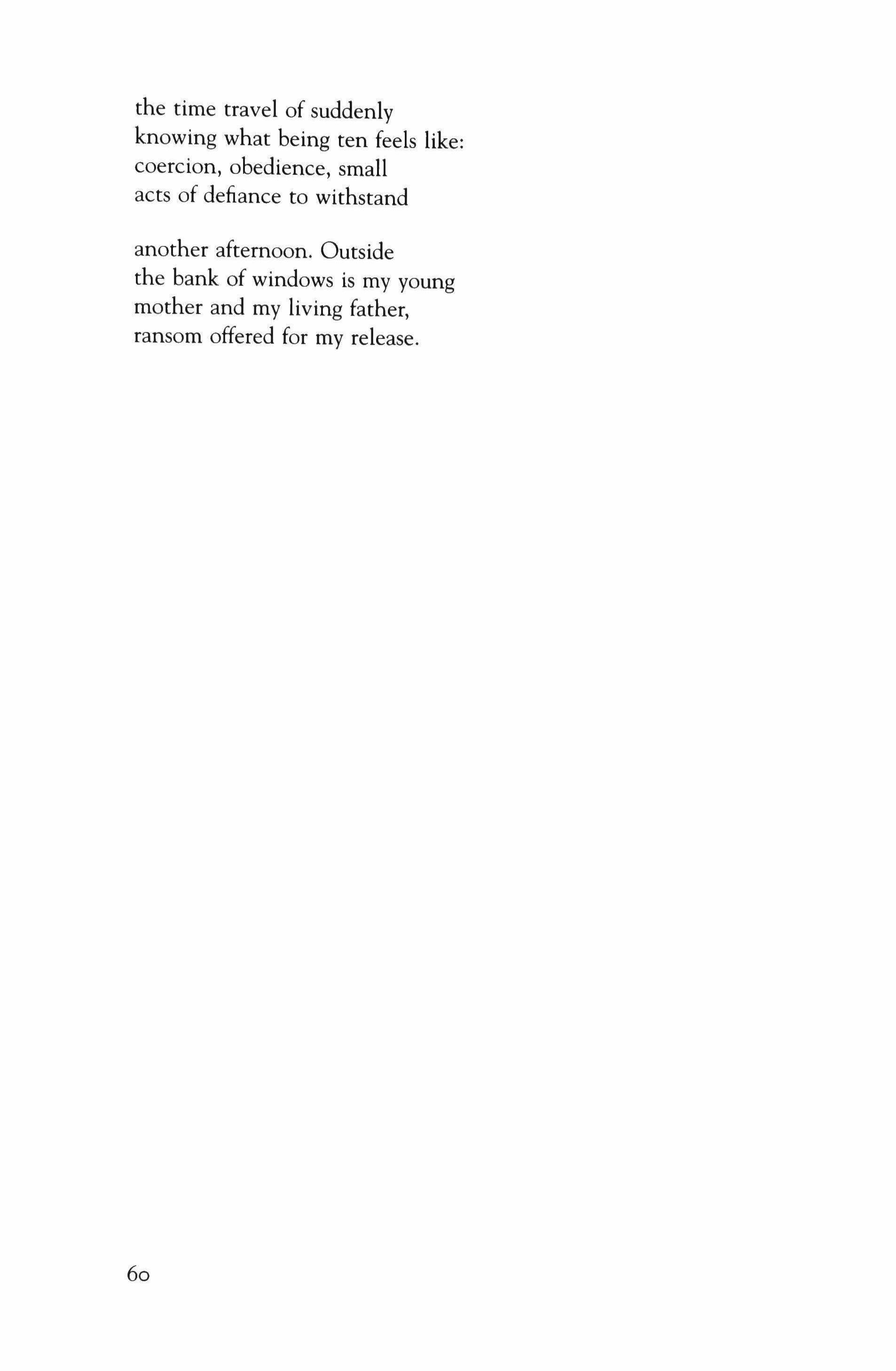
the time travel of suddenly knowing what being ten feels like: coercion, obedience, small acts of defiance to withstand another afternoon. Outside the bank of windows is my young mother and my living father, ransom offered for my release.
60
Dorothy Barresi

Small Casket
Each night I check my living sleeping son to ascertain his safety. Is he still here? Is his face soaked with radiance from dreaming's hard work?
And hard work my compulsion to see, rising, that he sleeps in dream's seed bed, oyster bed, hourly, safely, and not, like the daughter of a woman just south of here, stolen beyond a mother's seeing: that mother, the unlucky one, who tiptoed home late from the honky-tonk beach bar Fast Dances, and, lest she wake the house,
did not check to see if her sweet girl still slept in her frilled four-poster, no, but taken, and the perfect girl-body put to horrible use in a neighbor's rec. room next door.
61
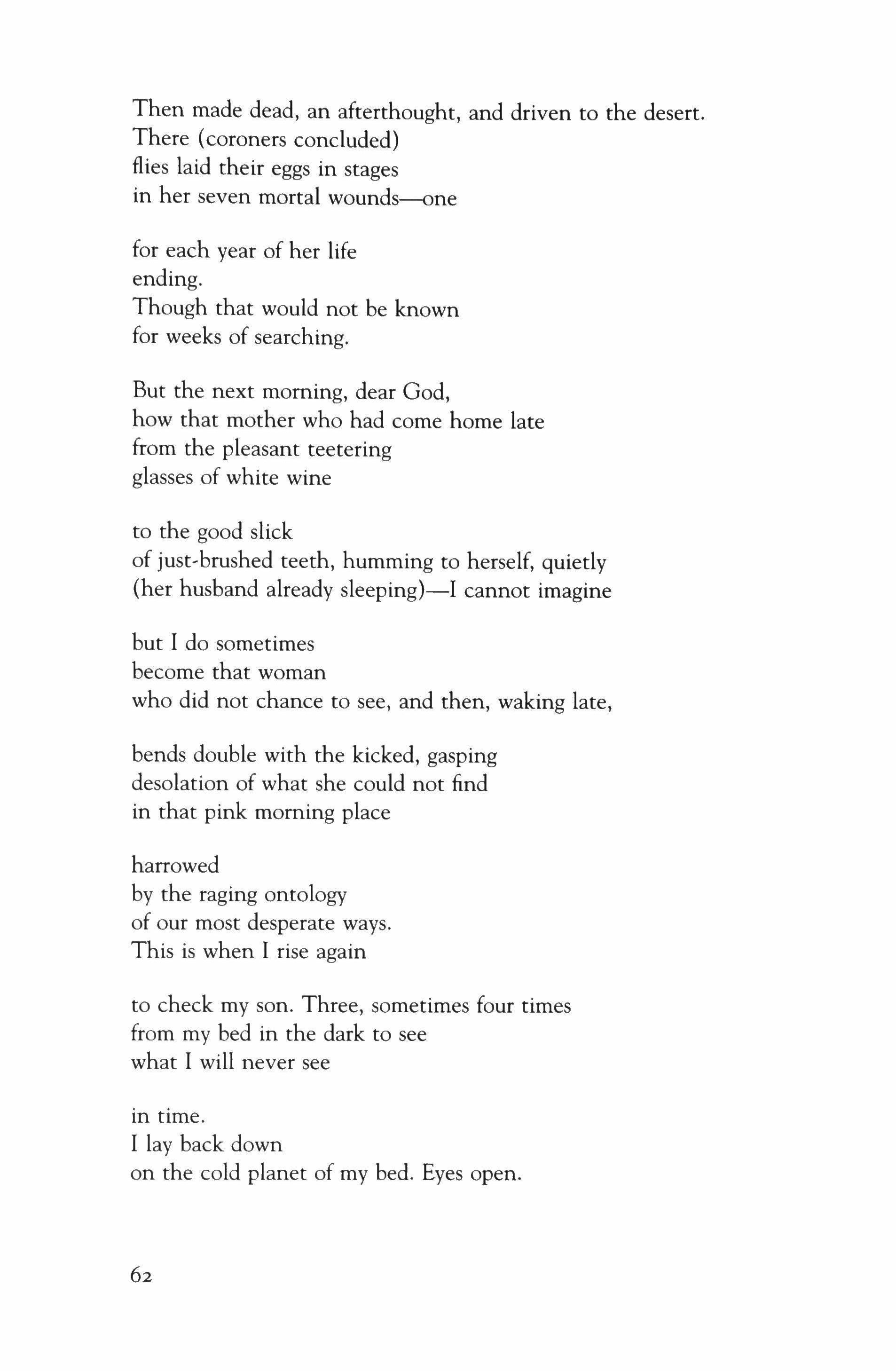
Then made dead, an afterthought, and driven to the desert. There (coroners concluded) flies laid their eggs in stages in her seven mortal wounds-one for each year of her life ending.
Though that would not be known for weeks of searching.
But the next morning, dear God, how that mother who had come home late from the pleasant teetering glasses of white wine to the good slick of just-brushed teeth, humming to herself, quietly {her husband already sleeping)-I cannot imagine but I do sometimes become that woman who did not chance to see, and then, waking late,
bends double with the kicked, gasping desolation of what she could not find in that pink morning place harrowed by the raging ontology of our most desperate ways. This is when I rise again to check my son. Three, sometimes four times from my bed in the dark to see what I will never see in time. I lay back down on the cold planet of my bed. Eyes open.
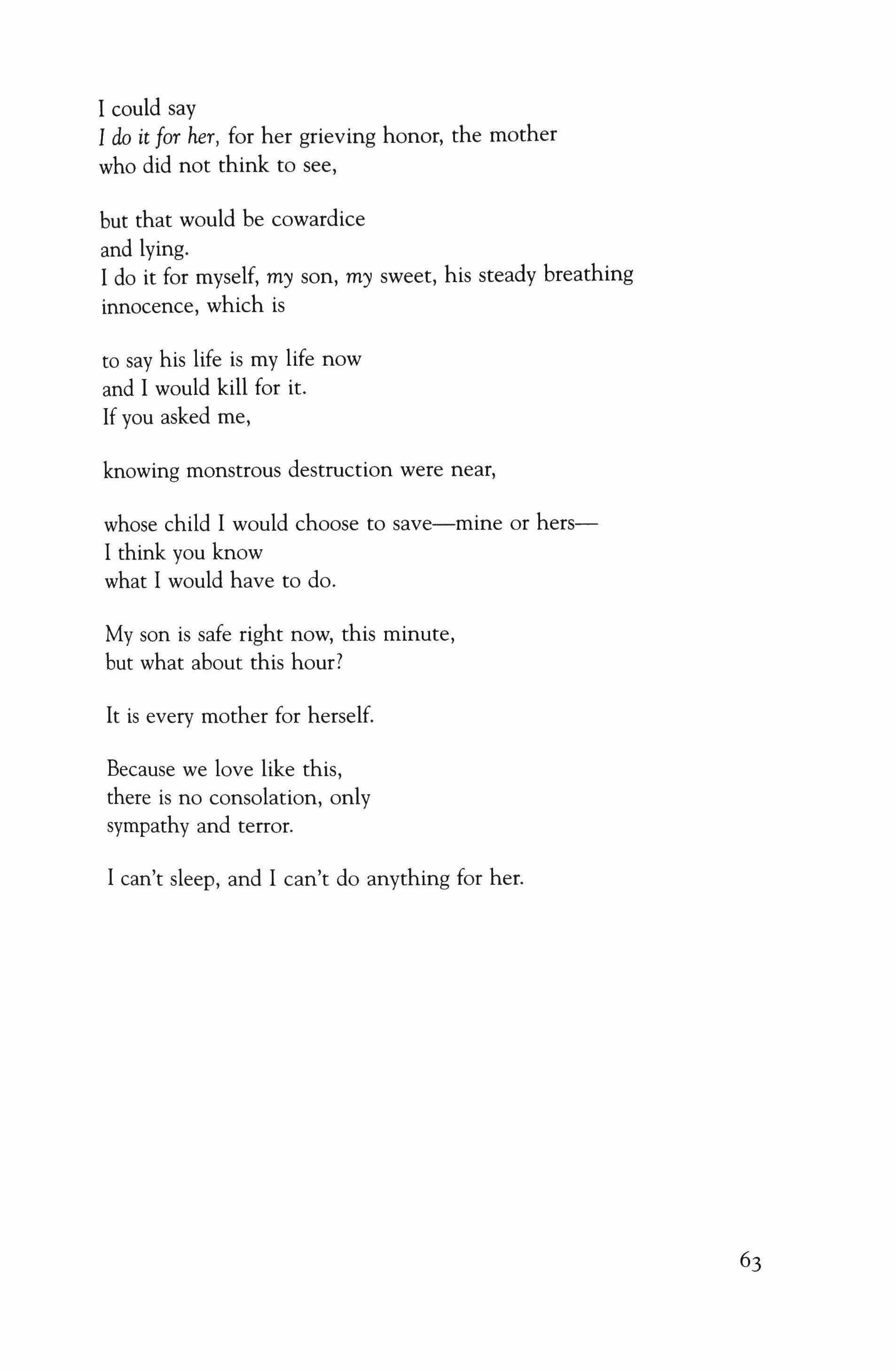
I could say I do it for her, for her grieving honor, the mother who did not think to see, but that would be cowardice and lying.
I do it for myself, my son, my sweet, his steady breathing innocence, which is
to say his life is my life now and I would kill for it. If you asked me, knowing monstrous destruction were near, whose child I would choose to save-mine or hers
I think you know what I would have to do.
My son is safe right now, this minute, but what about this hour?
It is every mother for herself.
Because we love like this, there is no consolation, only sympathy and terror.
I can't sleep, and I can't do anything for her.
Face Lift, One

"I would be rigged higher then, like a schooner setting sail for the land of spices.
I would be twice,risen dough.
I would melt neither in the mouth nor the hand.
Minutest of holdings, at each temple a bee-stung angel crawling up to my sparking scalp. My smile very nearly erect.
Landslide, icefall, spindrift, peak. Summiting,
I would not be a woman but a beginning, trapezed by upward-seeming circumstance. Take the pinecone weights off the cuckoo chin.
Activate the muscles of my dark concern: vanity, this season, in Purgatory, New York and Milan, everyone is sporting bandages!
(though no one can keep our feet, like dumb mud cattle, from sinking in).
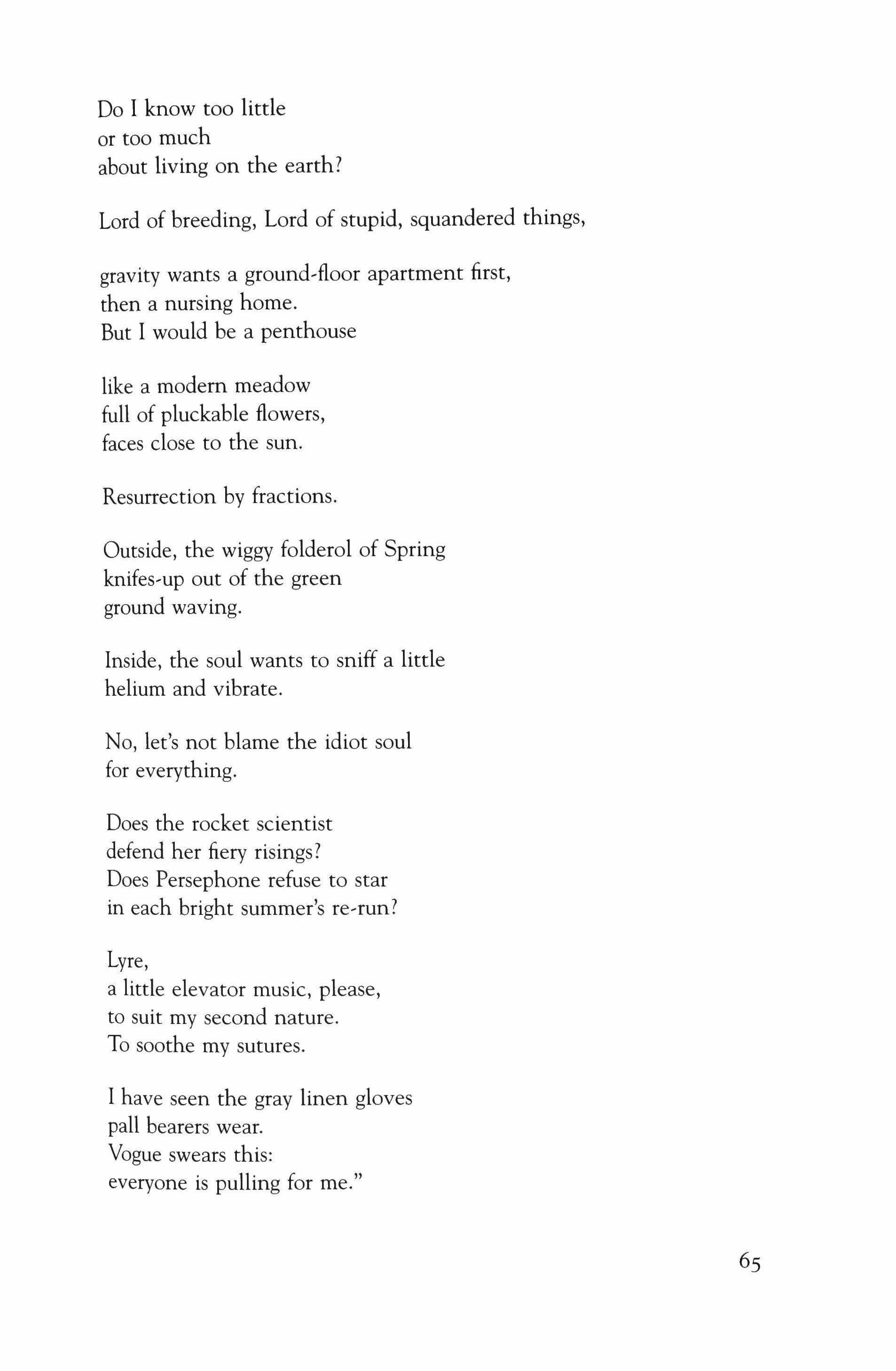
Do I know too little or too much about living on the earth?
Lord of breeding, Lord of stupid, squandered things,
gravity wants a ground-floor apartment first, then a nursing home. But I would be a penthouse
like a modem meadow full of pluckable flowers, faces close to the sun.
Resurrection by fractions.
Outside, the wiggy folderol of Spring knifes-up out of the green ground waving.
Inside, the soul wants to sniff a little helium and vibrate.
No, let's not blame the idiot soul for everything. Does the rocket scientist defend her fiery risings? Does Persephone refuse to star in each bright summer's re-run?
Lyre, a little elevator music, please, to suit my second nature. To soothe my sutures.
I have seen the gray linen gloves pall bearers wear. Vogue swears this: everyone is pulling for me."
65
Blue Distances, Northern California
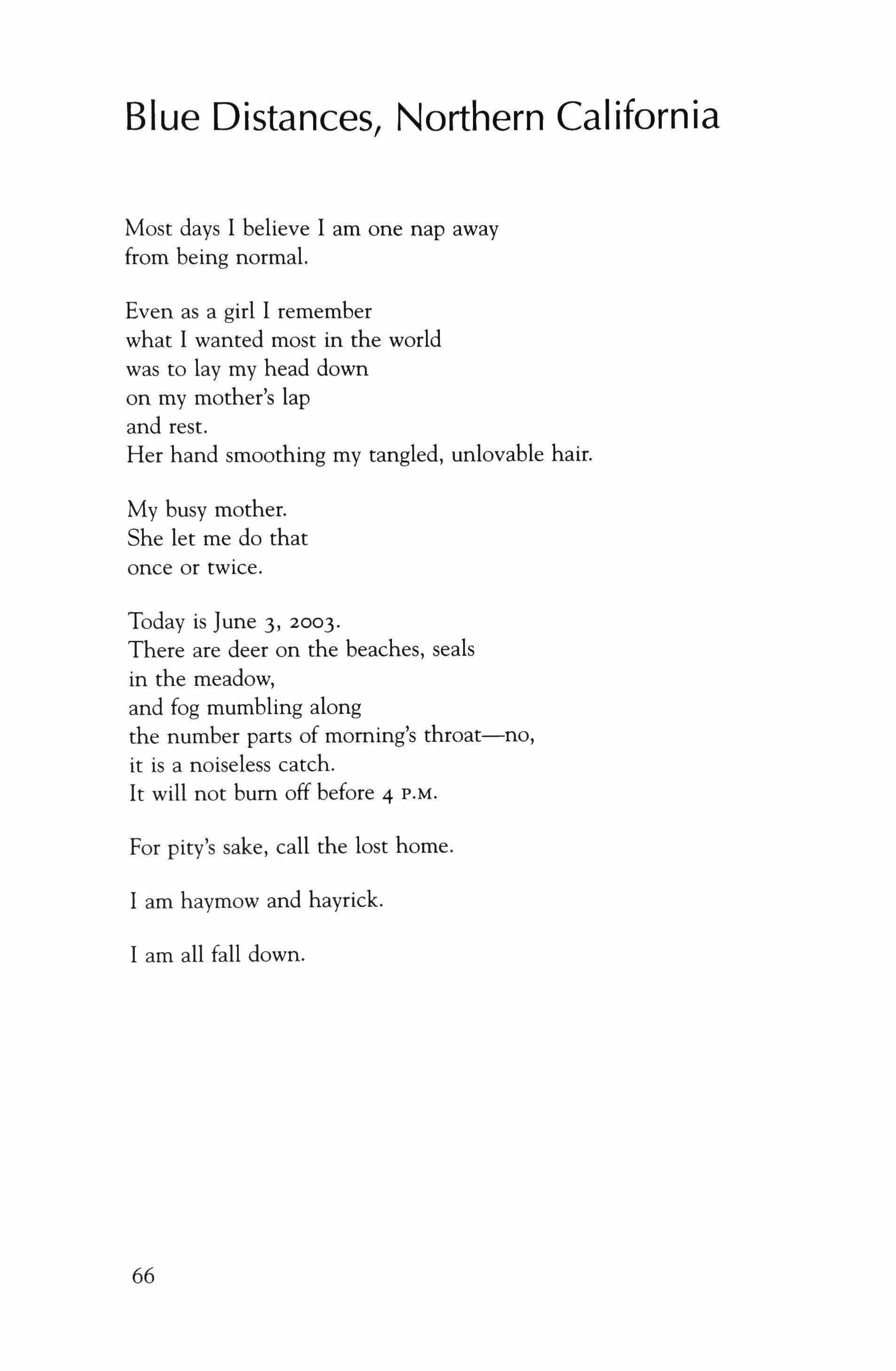
Most days I believe I am one nap away from being normal.
Even as a girl I remember what I wanted most in the world was to lay my head down on my mother's lap and rest.
Her hand smoothing my tangled, unlovable hair.
My busy mother. She let me do that once or twice.
Today is June 3, 2003· There are deer on the beaches, seals in the meadow, and fog mumbling along the number parts of morning's throat-no, it is a noiseless catch. It will not bum off before 4 P.M.
For pity's sake, call the lost home.
I am haymow and hayrick.
I am all fall down.
66
Mary Ruefle

Sermonette
for Carol Haerer
The woman who said to dig into the whiteness to find the ultimate illusion is dead. I didn't know her but you know the moment when women become girls-we shared that single cell. The life of the soul is a funny, funny thing, it's a wonder we don't all roll ourselves into scrolls go into the Qumrun Caves & wait it out in clay. One day I will become fully human but at this moment (7 A.M. alive) I sincerely doubt it. She must have said many other things, but none so dark as the whiteness. The whiteness waits in the darkness, but is not really there. I am going to wash my hair. It took twelve jurors twenty minutes to determine the truth. Boys just stumble upon it. But she spent her life living there.
Hope
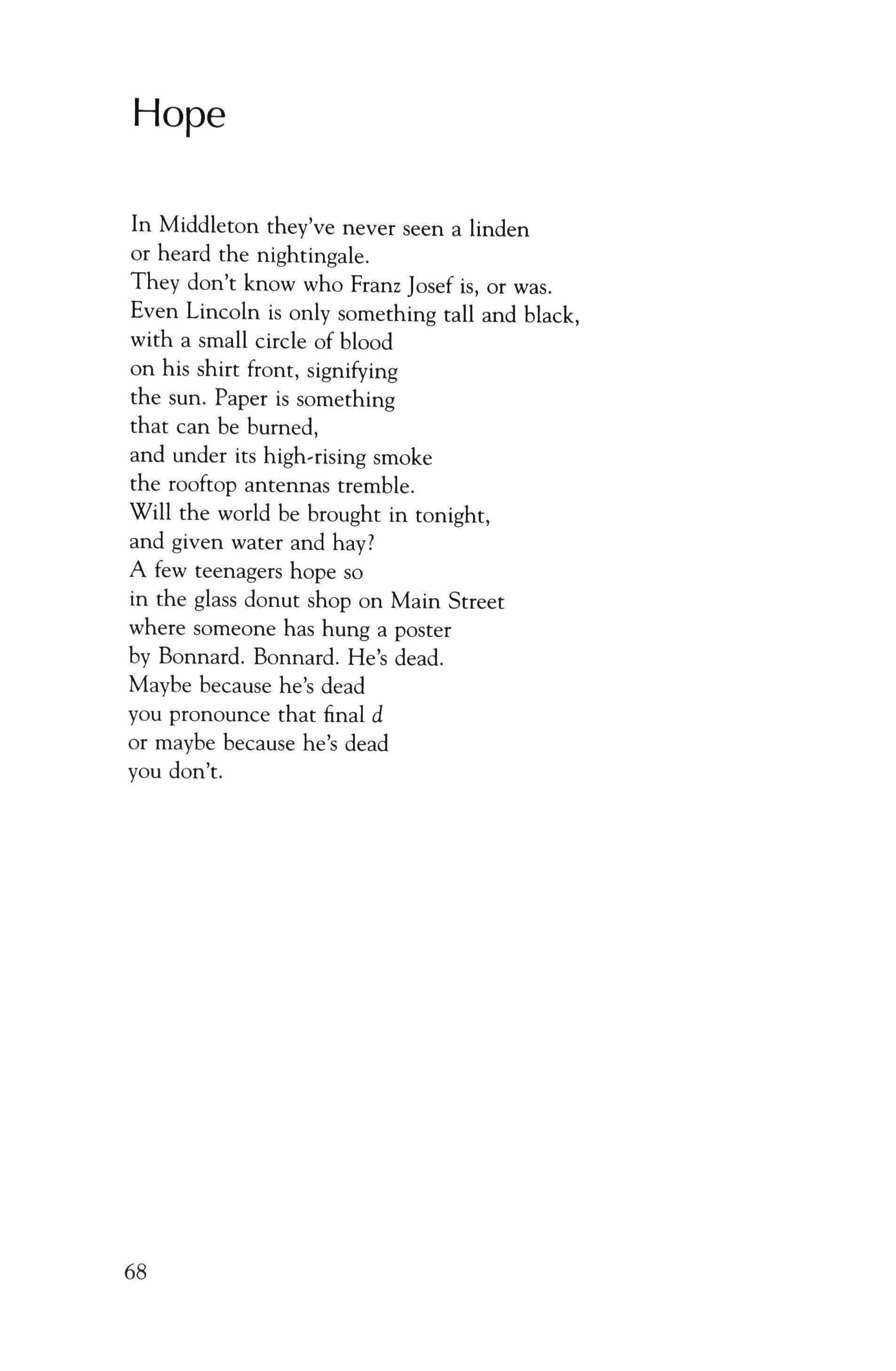
In Middleton they've never seen a linden or heard the nightingale. They don't know who Franz Josef is, or was. Even Lincoln is only something tall and black, with a small circle of blood on his shirt front, signifying the sun. Paper is something that can be burned, and under its high-rising smoke the rooftop antennas tremble. Will the world be brought in tonight, and given water and hay?
A few teenagers hope so in the glass donut shop on Main Street where someone has hung a poster by Bonnard. Bonnard. He's dead. Maybe because he's dead you pronounce that final d or maybe because he's dead you don't.
68
o Canada
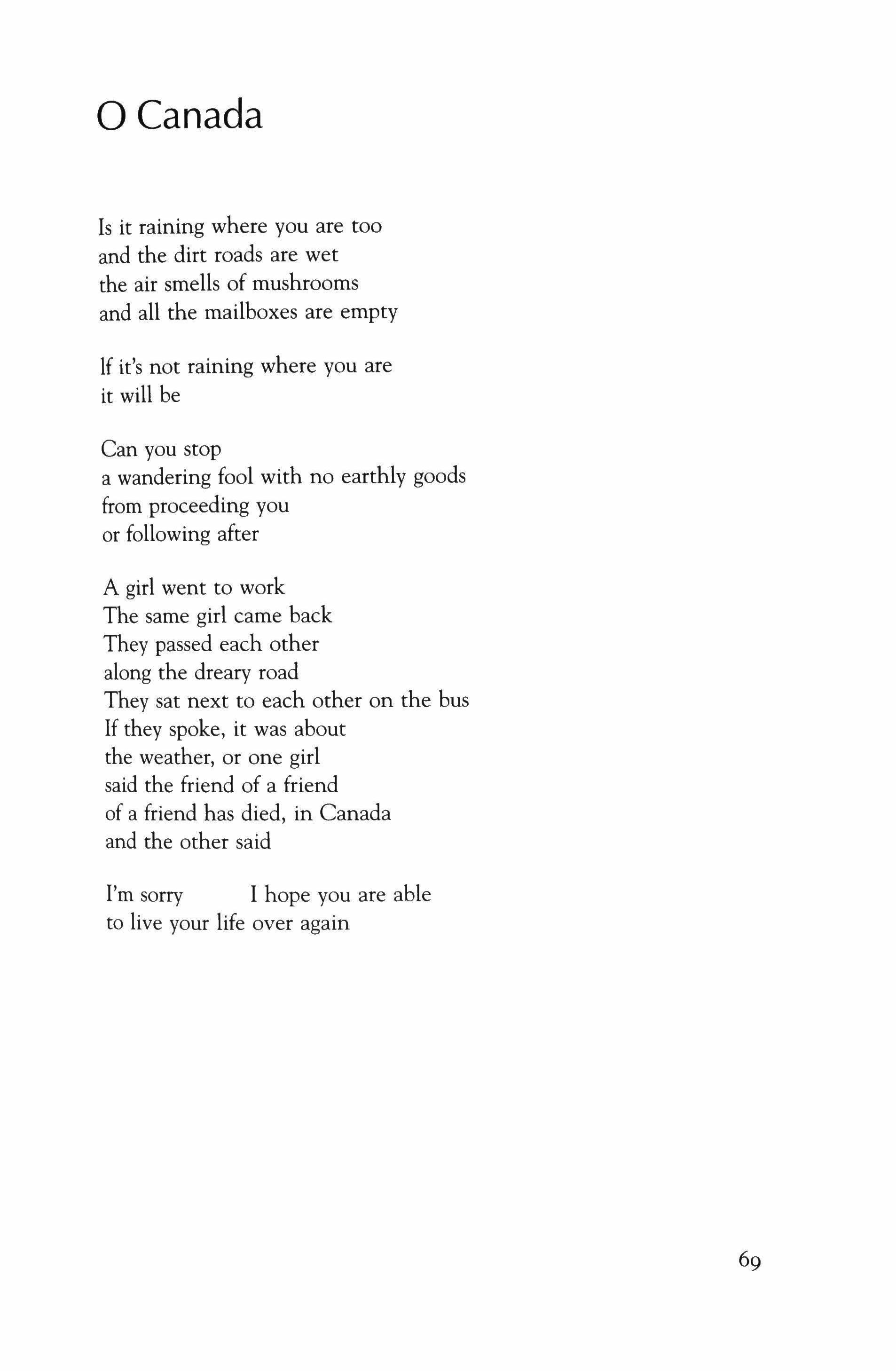
Is it raining where you are too and the dirt roads are wet the air smells of mushrooms and all the mailboxes are empty
If it's not raining where you are it will be
Can you stop a wandering fool with no earthly goods from proceeding you or following after A girl went to work The same girl came back They passed each other along the dreary road They sat next to each other on the bus If they spoke, it was about the weather, or one girl said the friend of a friend of a friend has died, in Canada and the other said
I'm sorry I hope you are able to live your life over again
BeautifuI Day
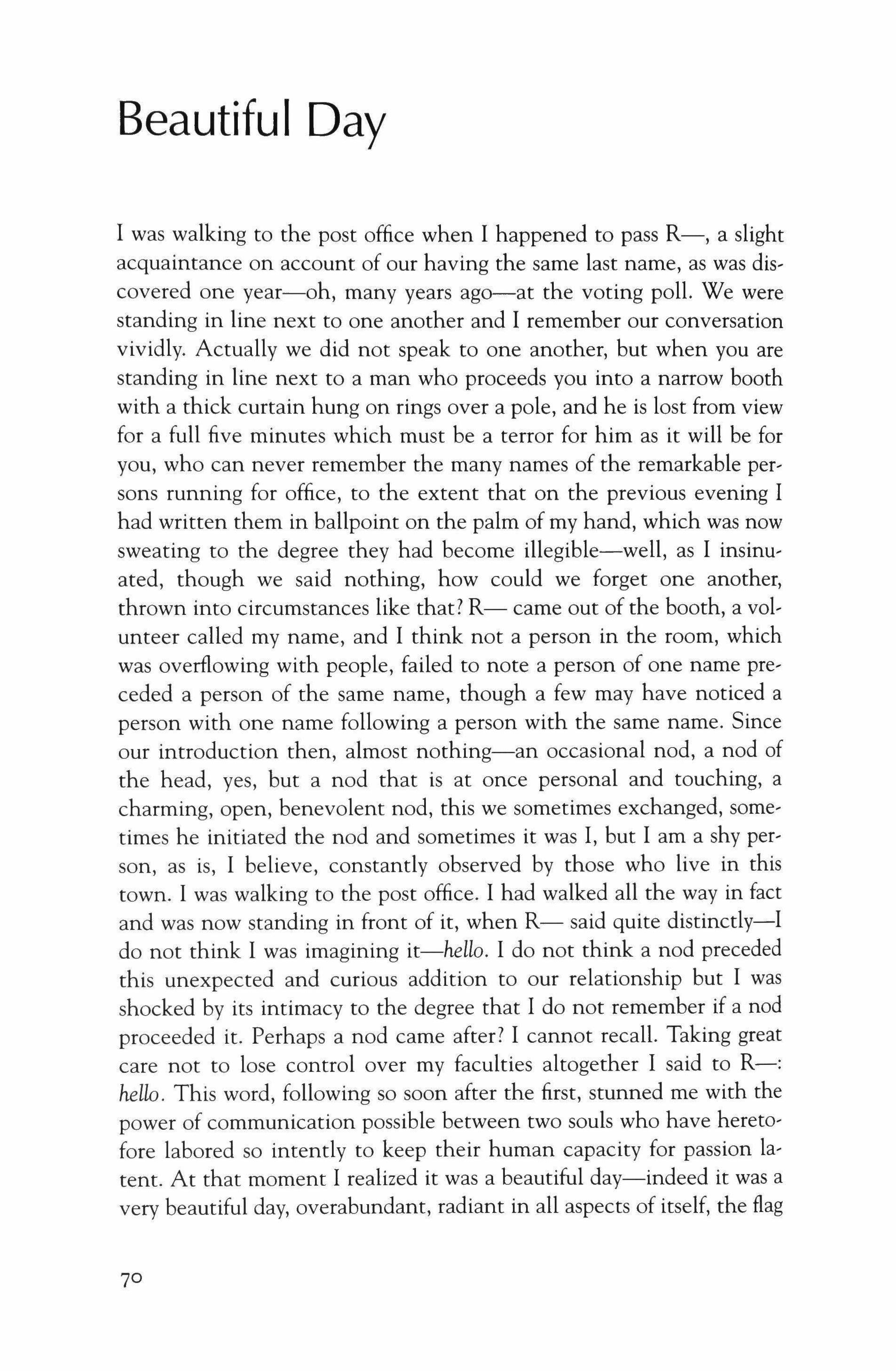
I was walking to the post office when I happened to pass R-, a slight acquaintance on account of our having the same last name, as was discovered one year-oh, many years ago-at the voting poll. We were standing in line next to one another and I remember our conversation vividly. Actually we did not speak to one another, but when you are standing in line next to a man who proceeds you into a narrow booth with a thick curtain hung on rings over a pole, and he is lost from view for a full five minutes which must be a terror for him as it will be for you, who can never remember the many names of the remarkable persons running for office, to the extent that on the previous evening I had written them in ballpoint on the palm of my hand, which was now sweating to the degree they had become illegible-well, as I insinuated, though we said nothing, how could we forget one another, thrown into circumstances like that? R- came out of the booth, a volunteer called my name, and I think not a person in the room, which was overflowing with people, failed to note a person of one name preceded a person of the same name, though a few may have noticed a person with one name following a person with the same name. Since our introduction then, almost nothing-an occasional nod, a nod of the head, yes, but a nod that is at once personal and touching, a charming, open, benevolent nod, this we sometimes exchanged, sometimes he initiated the nod and sometimes it was I, but I am a shy person, as is, I believe, constantly observed by those who live in this town. I was walking to the post office. I had walked all the way in fact and was now standing in front of it, when R- said quite distinctly-I do not think I was imagining it-hello. I do not think a nod preceded this unexpected and curious addition to our relationship but I was shocked by its intimacy to the degree that I do not remember if a nod proceeded it. Perhaps a nod came after? I cannot recall. Taking great care not to lose control over my faculties altogether I said to R-: hello. This word, following so soon after the first, stunned me with the power of communication possible between two souls who have heretofore labored so intently to keep their human capacity for passion latent. At that moment I realized it was a beautiful day-indeed it was a very beautiful day, overabundant, radiant in all aspects of itself, the flag
70

flying like a certificate of rapturous appreciation for the clouds, which were sailing directly overhead across a clear blue sky, and in the window boxes attached to the brick facade of the building pert crocuses stood in a bright array, it seemed to me they were like responsive ears, alert to whatever R- or I might venture to say next: perhaps it was on account of this fantasy that I hesitated, I hesitated to speak what I felt and say what I knew to be true: it is a beautiful day. But would such a confession, I asked myself in my hesitation, be too prompt, too rash, coming so soon after the two hellos, which had already fallen in such rapid progression that R- might, like myself, be quaking from an inability to keep up with all that had already happened? Might R- feel I was pushing the day forward at an alarming and unjust rate, even if part of its undeniable beauty was that very quickening? These thoughts and more like them prevented the spontaneous expression I should have liked so much to make before R- was gone. R- did not hesitate, that is for certain- he sailed like a cloud into the post office, nod or no nod (why wasn't I paying more attention?) and I was stuck fast by the crocuses, the flag unfurled over us all, when the decision came over me to begin my way home, immediately and with brio, that I might lose no further step with the day, which was beautiful, and with the future which had shown itself to be quick but kind, allowing me these little moments to catch up with it, and keep pace with it when I could.
71
Creche
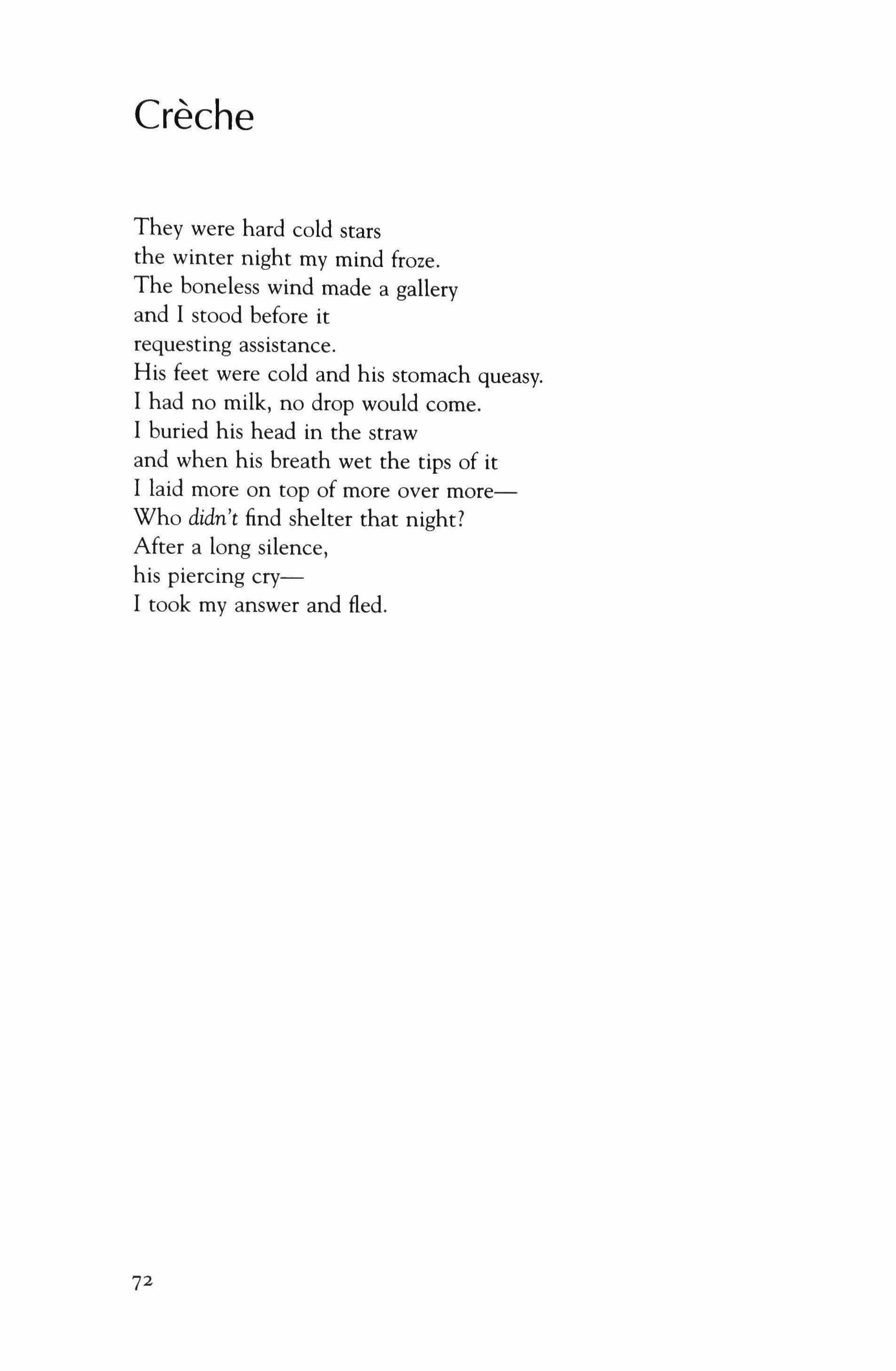
They were hard cold stars the winter night my mind froze. The boneless wind made a gallery and I stood before it requesting assistance. His feet were cold and his stomach queasy. I had no milk, no drop would come. I buried his head in the straw and when his breath wet the tips of it I laid more on top of more over moreWho didn't find shelter that night?
After a long silence, his piercing cryI took my answer and fled.
Norman Dubie

The Fish Cypher of Michel de Nostradam
The virgin's breast with milk leaving it lit by a fire of sticks is what the King admits to seeing seconds before his horse's steps minced the bone-yellow lint of the spring air.
It lifts his helmet's visor to limits, a golden spear halving the eye's landscapea valley of cypress flagging the night beyond the green toxic jelly of the dyer's ponds.
Peasants dressed in woolen sock struggling past the aqueduct shoulder a painting of hilltop monasteries burning in snow.
The air so cold that it snaps like the leg of a horse weighted with sacks of souring meats and gold.
The falling moon shrieks at us. An elder dyer's son nailed to a tree by the landlord.
73

A ship out on the green sea bobs under its flag of plague.
All of the meek neighborhoods emptying, the children memorizing with their voices the coarse alarms. A comet
crossed above the old caves, below the nests and skulls that crown the pasturage.
The one god of the kingdom dressed in a blacksmith's apron eats even his beard and cheese with cruelty. He sweats both salt and snowflakes.
The aching ropes of the plague ship mock the young woman in the shepherd's hut who is giving birth to twins, one alive-
one not. The Muslim butcher coughs twice, spraying a blood of dubious origin across the open eyes of a sunken sow's head-
the wife, never superstitious, thinks that even in future worlds, this husband must be recognized for an absorbed master
of the business of business. Abundant fear now lifted like mirrors everywhere in the town, and we must see the darker prophecies as a simple choosing of something over something else.
74
The Pendulum
 after Phillip K. Dick
after Phillip K. Dick
Though not human, the dead language of the insect is Latin. I've martyred myself here in their suburbs so as to observe them. No, not the insects, Martha.
The mowed lawn under a cold rain though, is breathtaking. It is the odor of a tall flowering bean-guano on our planet- its brilliant waistcoat of azure tar. A neurotic plant, one ate our sister the very day of my birth.
Understood as very meaningful, it was our sister's unlikely death that found me shunned, sent to this Earth as a witness with none of the Messenger's privileges.
It is a hell state, Martha.
By contrast, our older brother, Guillaume Postel, brought the first Coptic alphabet to France. He was showered with gifts like the one-eyed bureaucrats of Lyra.
By example, when the cousin, Messenger Frumence, died at the age of I 18, he was living among the desert fathers of Wadi Natrun. Two lions, smoke and honey-colored, dug furiously for much of the winter night so the Saint Messenger would enjoy a burial before first light.
75

Or, Saint Jerome, once was fed chunks of very red watermelon by large crows that were garrulous.
But, Martha, I will die at 54. In a barbarous township of late zoth Century North America. A thorazine drip backing up into my blue shoulder. Some dull white-haired nurse will not report how she lost a rectal thermometer deep within my bowels.
They believe in little, but are oddly heroic. They will eliminate themselves, save two communities in Ethiopia, through the manufacture of toxins: weaponry, agriculture, energy, medicine, and a class of plastics that is the only unique product of their global culture.
This cynical vegetal psyche overwhelms me.
But they do have something that resembles our moonrise they call music. I'm often transfixed by it. Yes, Martha, they do, as you say, resemble giraffes in the very way that a brick resembles an egg.
I do envy you your solitudes.
It has added something very precise to your speculations about life in all its forms. Tell Father that feeding the blue grass to the caterpillars has made for an unusual silk. Tell them all that I am sorry for my birth, that the guano plant ate all but your tinted spectacles. Tell them
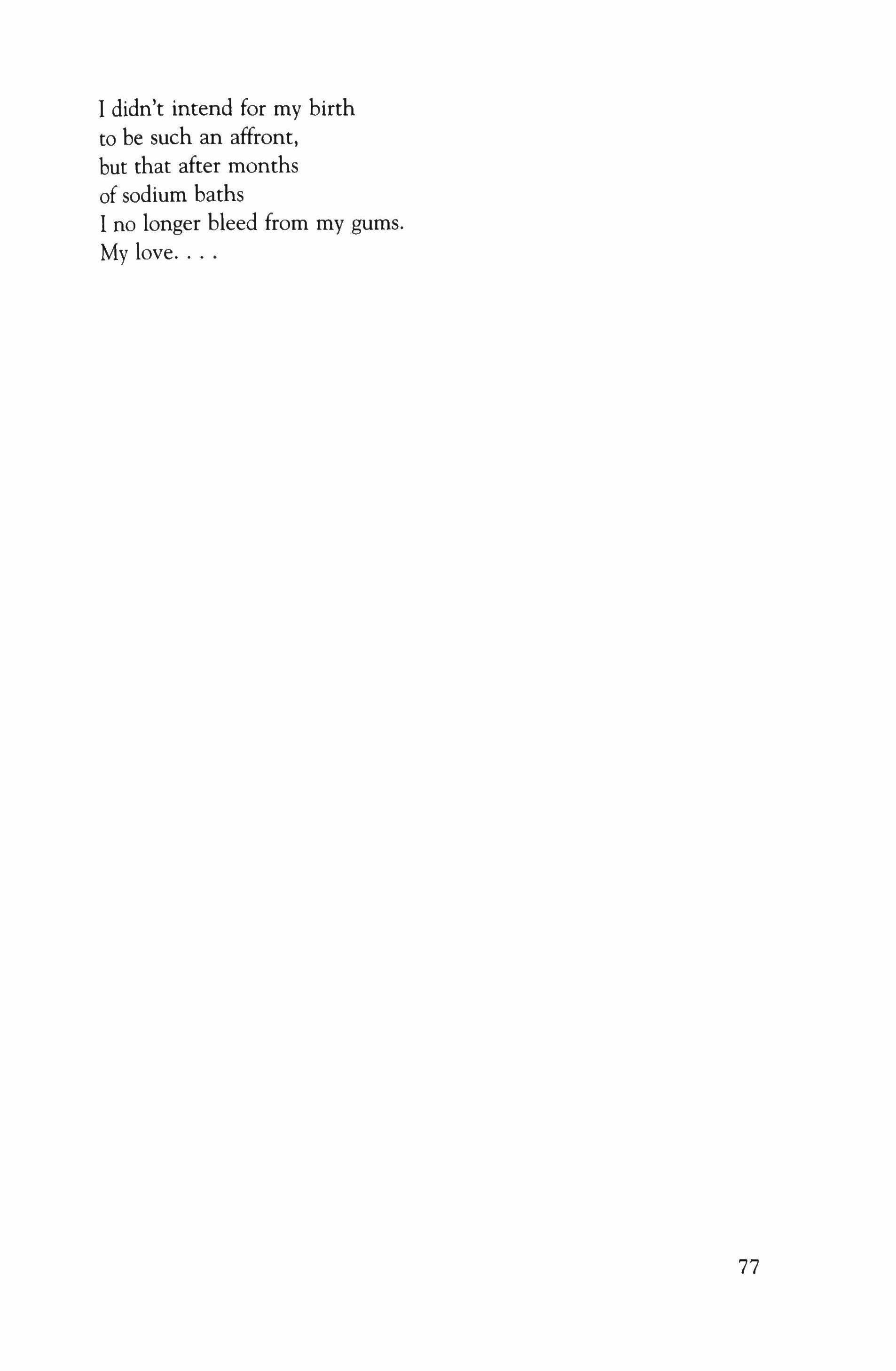
I didn't intend for my birth to be such an affront, but that after months of sodium baths
I no longer bleed from my gums. My love
77
David Wojahn
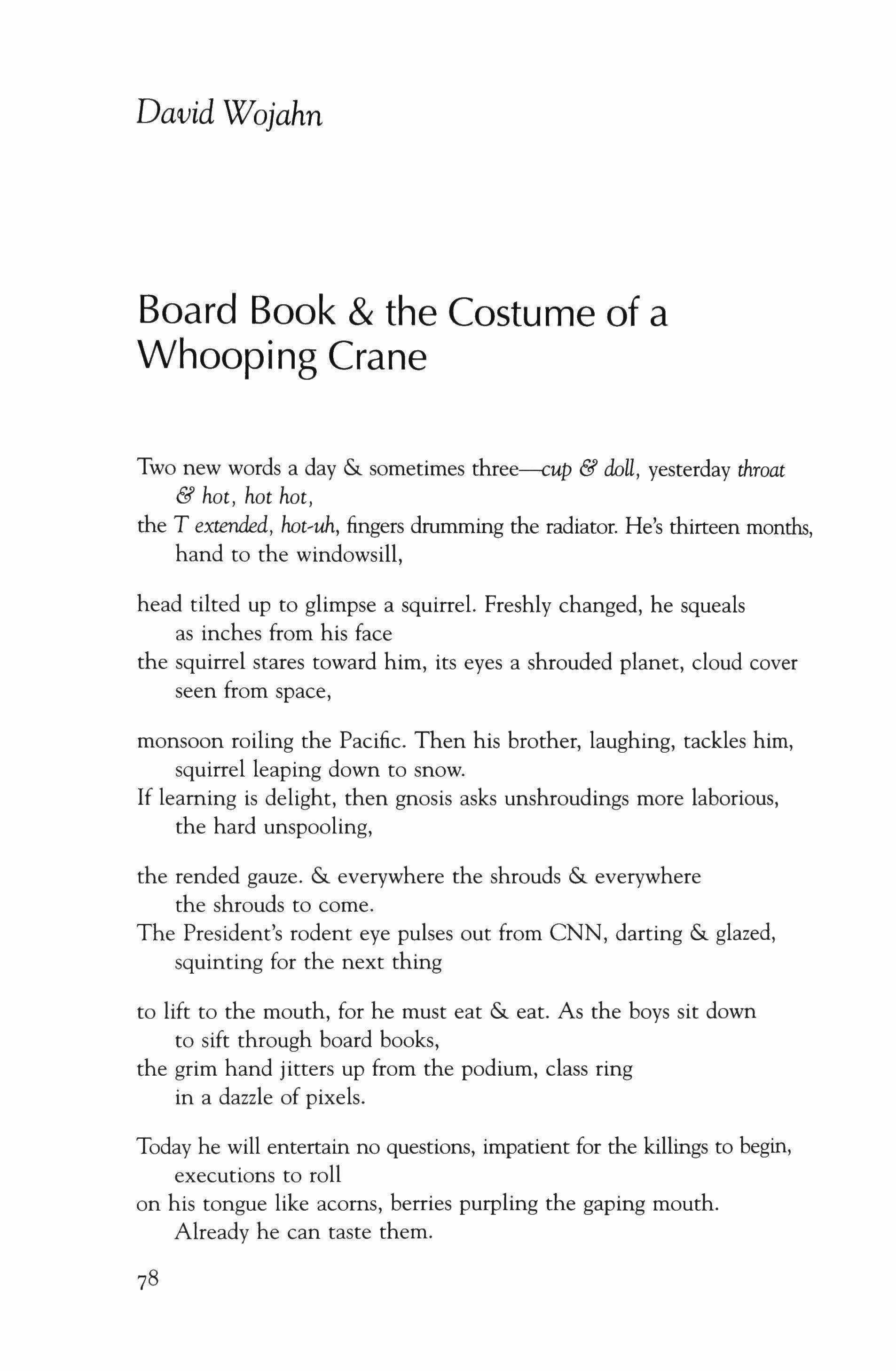
Board Book & the Costume of a
Whooping Crane
Two new words a day & sometimes three-cup & doll, yesterday throat & hot, hot hot, the T extended, hot�uh, fingers drumming the radiator. He's thirteen months, hand to the windowsill, head tilted up to glimpse a squirrel. Freshly changed, he squeals as inches from his face the squirrel stares toward him, its eyes a shrouded planet, cloud cover seen from space,
monsoon roiling the Pacific. Then his brother, laughing, tackles him, squirrel leaping down to snow.
If learning is delight, then gnosis asks unshroudings more laborious, the hard unspooling,
the rended gauze. & everywhere the shrouds & everywhere the shrouds to come.
The President's rodent eye pulses out from CNN, darting & glazed, squinting for the next thing
to lift to the mouth, for he must eat & eat. As the boys sit down to sift through board books, the grim hand jitters up from the podium, class ring in a dazzle of pixels.
Today he will entertain no questions, impatient for the killings to begin, executions to roll on his tongue like acorns, berries purpling the gaping mouth. Already he can taste them.
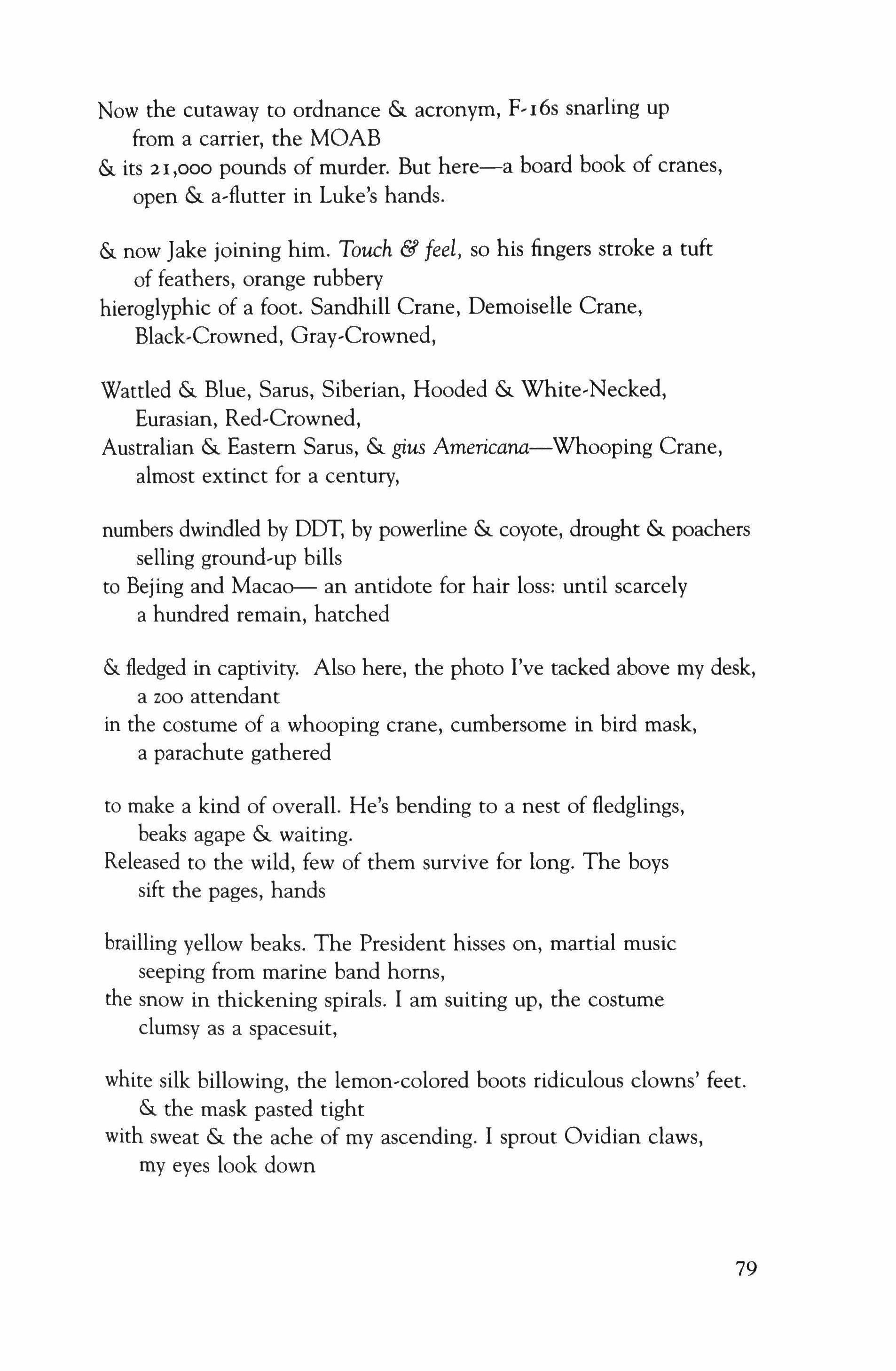
Now the cutaway to ordnance & acronym, F-I6s snarling up from a carrier, the MOAB & its 2 I ,000 pounds of murder. But here-a board book of cranes, open & a-flutter in Luke's hands.
& now Jake joining him. Touch & feel, so his fingers stroke a tuft of feathers, orange rubbery hieroglyphic of a foot. Sandhill Crane, Demoiselle Crane, Black-Crowned, Gray-Crowned,
Wattled & Blue, Sarus, Siberian, Hooded & White-Necked, Eurasian, Red-Crowned, Australian & Eastern Sarus, & gius Americana-Whooping Crane, almost extinct for a century,
numbers dwindled by DDT, by powerline & coyote, drought & poachers selling ground-up bills to Bejing and Macao--- an antidote for hair loss: until scarcely a hundred remain, hatched & fledged in captivity. Also here, the photo I've tacked above my desk, a zoo attendant in the costume of a whooping crane, cumbersome in bird mask, a parachute gathered
to make a kind of overall. He's bending to a nest of fledglings, beaks agape & waiting.
Released to the wild, few of them survive for long. The boys sift the pages, hands
brailling yellow beaks. The President hisses on, martial music seeping from marine band horns, the snow in thickening spirals. I am suiting up, the costume clumsy as a spacesuit,
white silk billowing, the lemon-colored boots ridiculous clowns' feet. & the mask pasted tight with sweat & the ache of my ascending. I sprout Ovidian claws, my eyes look down
79
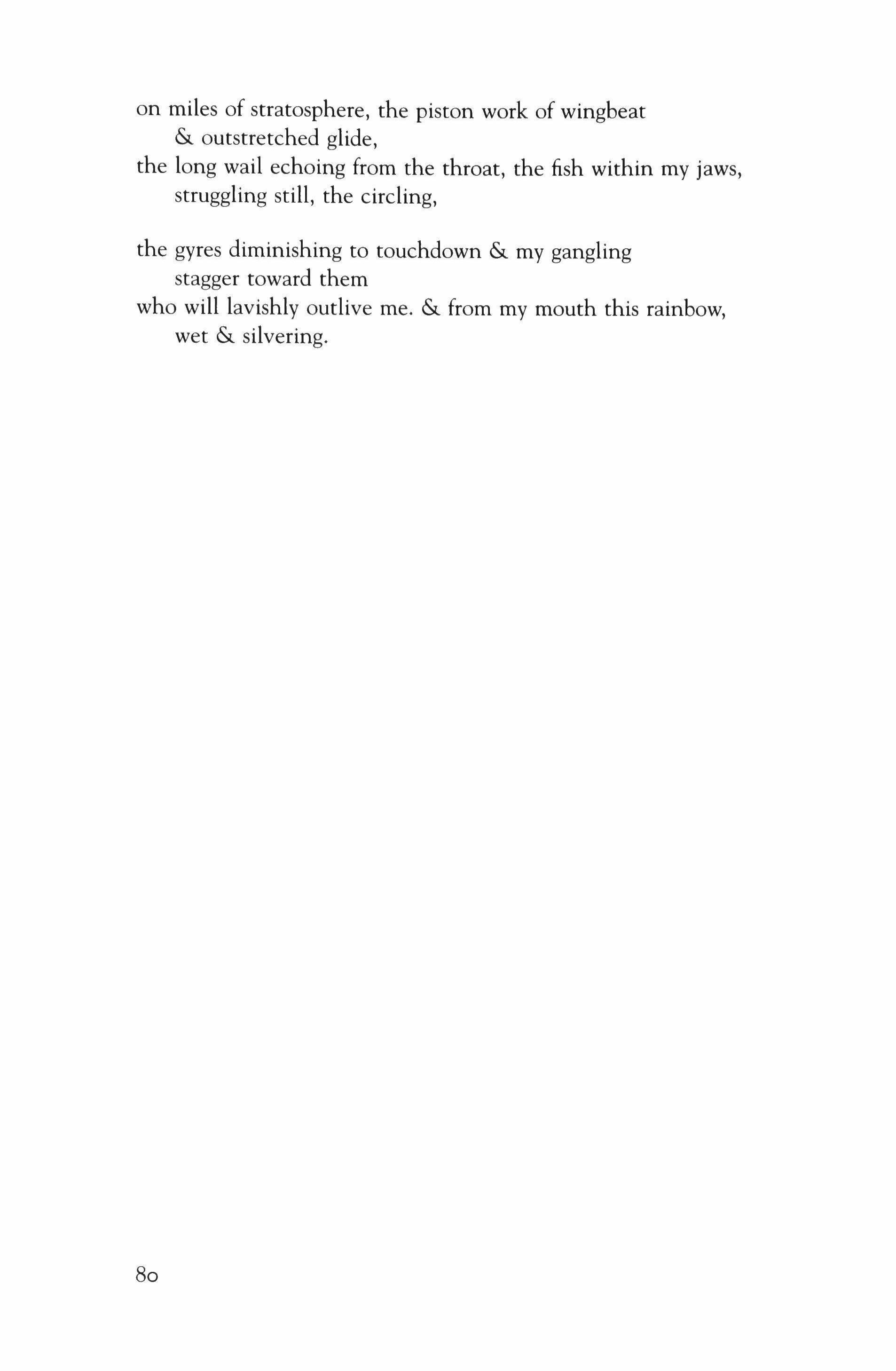
on miles of stratosphere, the piston work of wingbeat & outstretched glide, the long wail echoing from the throat, the fish within my jaws, struggling still, the circling, the gyres diminishing to touchdown & my gangling stagger toward them who will lavishly outlive me. & from my mouth this rainbow, wet & silvering.
80
Reginald Shepherd

For My Mother in Lieu of Mourning
It takes a thing so long to be true. I don't want my dead back, not any more, dreaming they're just in hiding. The body stiffens into I'm awake, chilled by a window left open all night. Dust grays
the screen, truncates the run-down view of strip mall loading dock and idling delivery truck fumes: unseasonable cold, no birds, everything gets dirty fast. Then memory becomes rain
after days of overcast, wet panes blur into blind clouds learning to let go. Too accurate a memory is the cure for dreams, however mind and music might wish otherwise. Your body of brackish water,
black, opaque, impossible to see through to the bottom, swim across to shore: I've been drowning in my sleep too long, when will I stop comparing you? Today
my hands discover distance, the heart I imagined I had: this lying signifier settled from time to time by ghosts. The words return in single file, repeat themselves: sleep and snow, moon and salt, cold and uninhabited: my heart's healed over under ice and parable. Would you have frozen in these lines? You were their possibility: now love will find another shape. You left me here
81
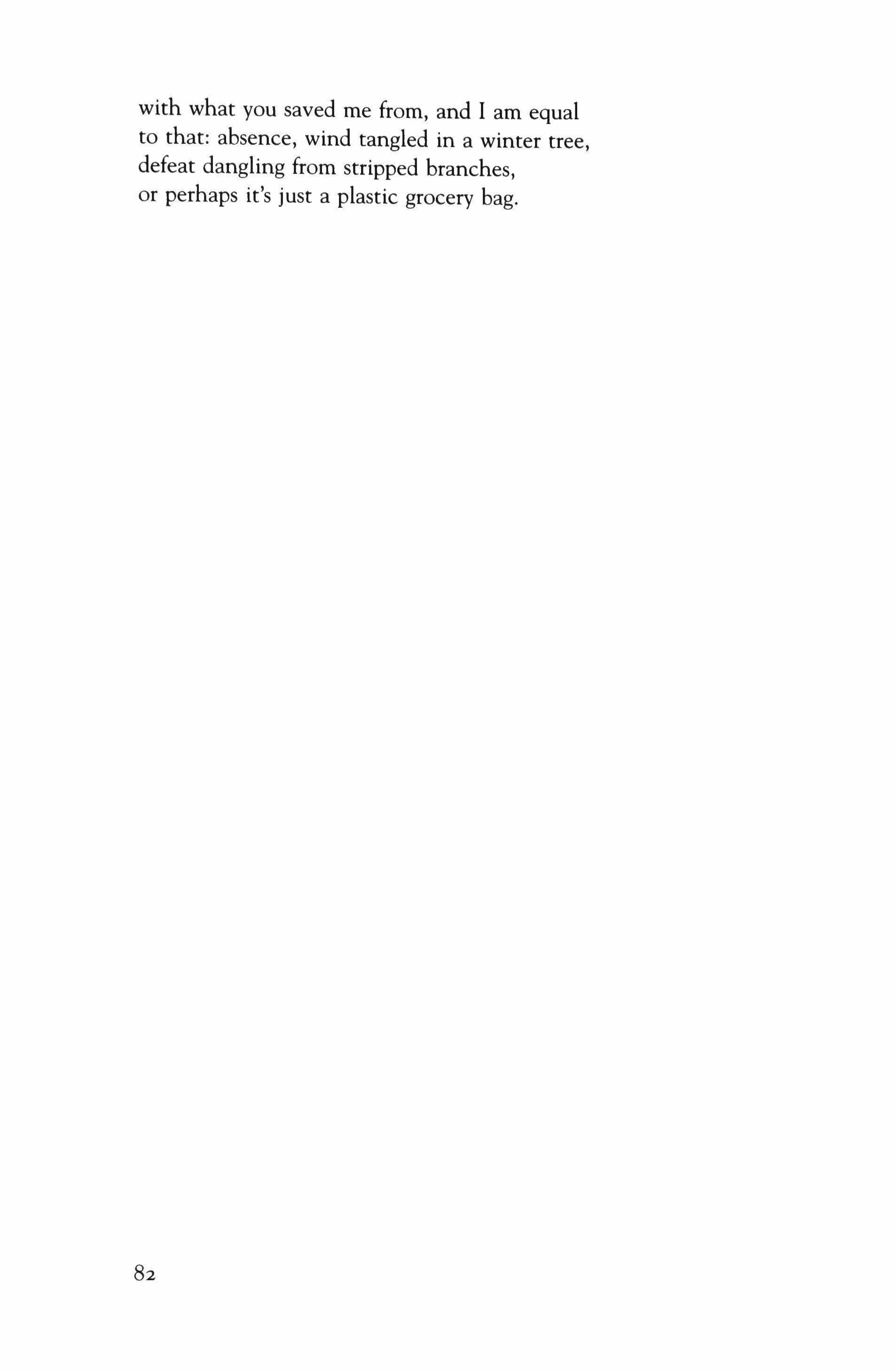
with what you saved me from, and I am equal to that: absence, wind tangled in a winter tree, defeat dangling from stripped branches, or perhaps it's just a plastic grocery bag.
Dust

We were born in dust and return to dust (stars a coagulation of dust particles, planets too; dust dims the Milky Way's expanse), and in between we're dust, and what is that? Beggar's velvet, house moss, slut's wool, so many appellations for the minuscule. Skin flakes, rock flecks, tree
bark, paint from cars and bicycles and vinyl siding, lampshade fibers, ant legs, brick shards, tire shreds, and sweater lint, the soot from backyard barbecues. Volcanic ash and rotting leaves, polar bear fur fragments (black bears, too, and grizzlies), scales from the wings
of butterflies and facets of houseflies' eyes. Limestone, gypsum, feldspar, rusting iron, salt, and quartz, worn down to something you'd inhale, that abrades the nostrils, scars the lungs. All that sand happening in the atmosphere, winding between the layers. It can down a plane. Nitrogen, aluminum, chromium, more soot. Bees' yellow and black plush, diatoms and fungal spores (hundreds of species riding air currents from Africa to the Caribbean); viruses, pollen, bacteria of all
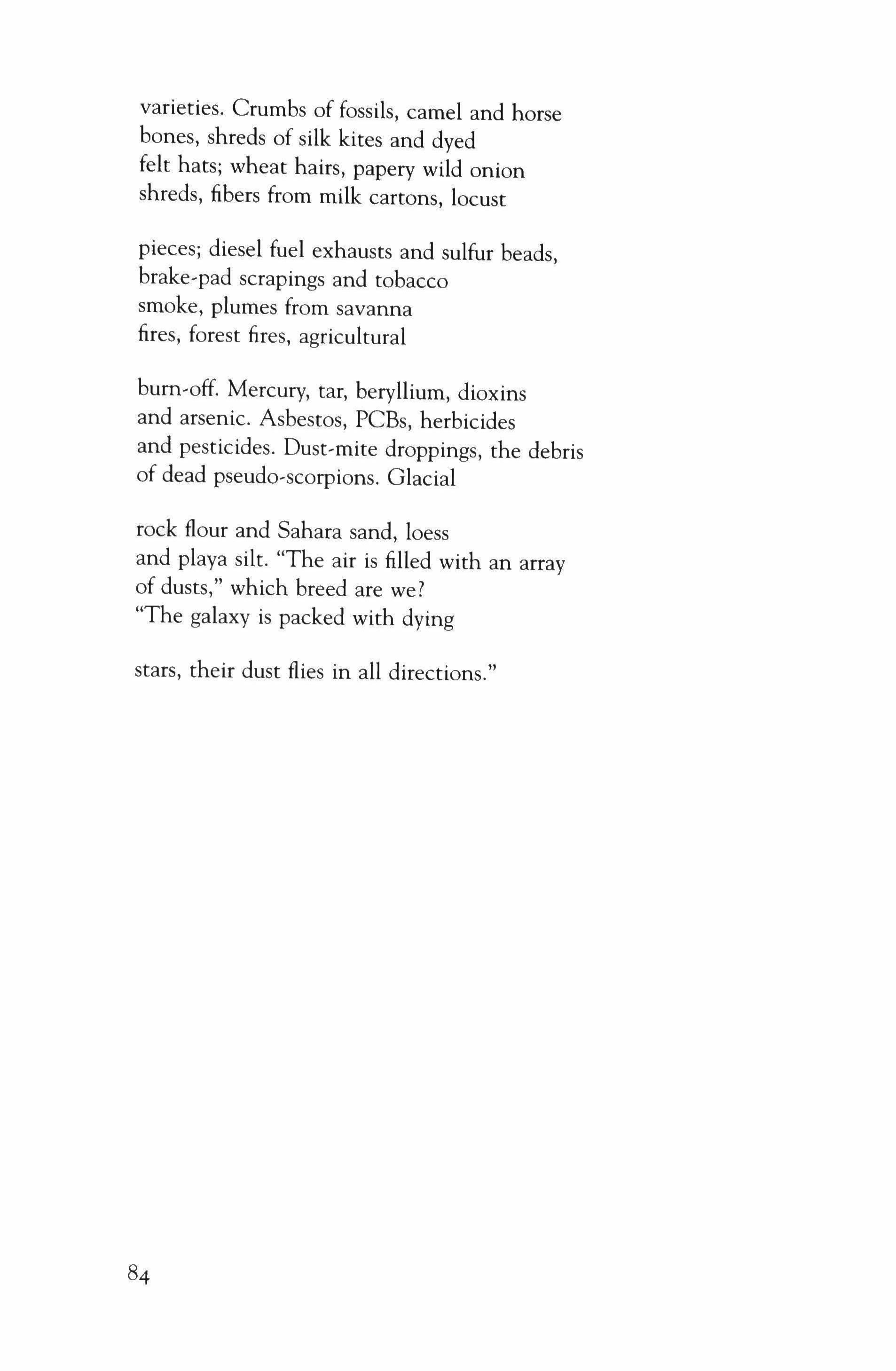
varieties. Crumbs of fossils, camel and horse bones, shreds of silk kites and dyed felt hats; wheat hairs, papery wild onion shreds, fibers from milk cartons, locust
pieces; diesel fuel exhausts and sulfur beads, brake-pad scrapings and tobacco smoke, plumes from savanna fires, forest fires, agricultural
burn-off. Mercury, tar, beryllium, dioxins and arsenic. Asbestos, PCBs, herbicides and pesticides. Dust-mite droppings, the debris of dead pseudo-scorpions. Glacial
rock flour and Sahara sand, loess and playa silt. "The air is filled with an array of dusts," which breed are we?
"The galaxy is packed with dying
stars, their dust flies in all directions."
Pamela Stewart
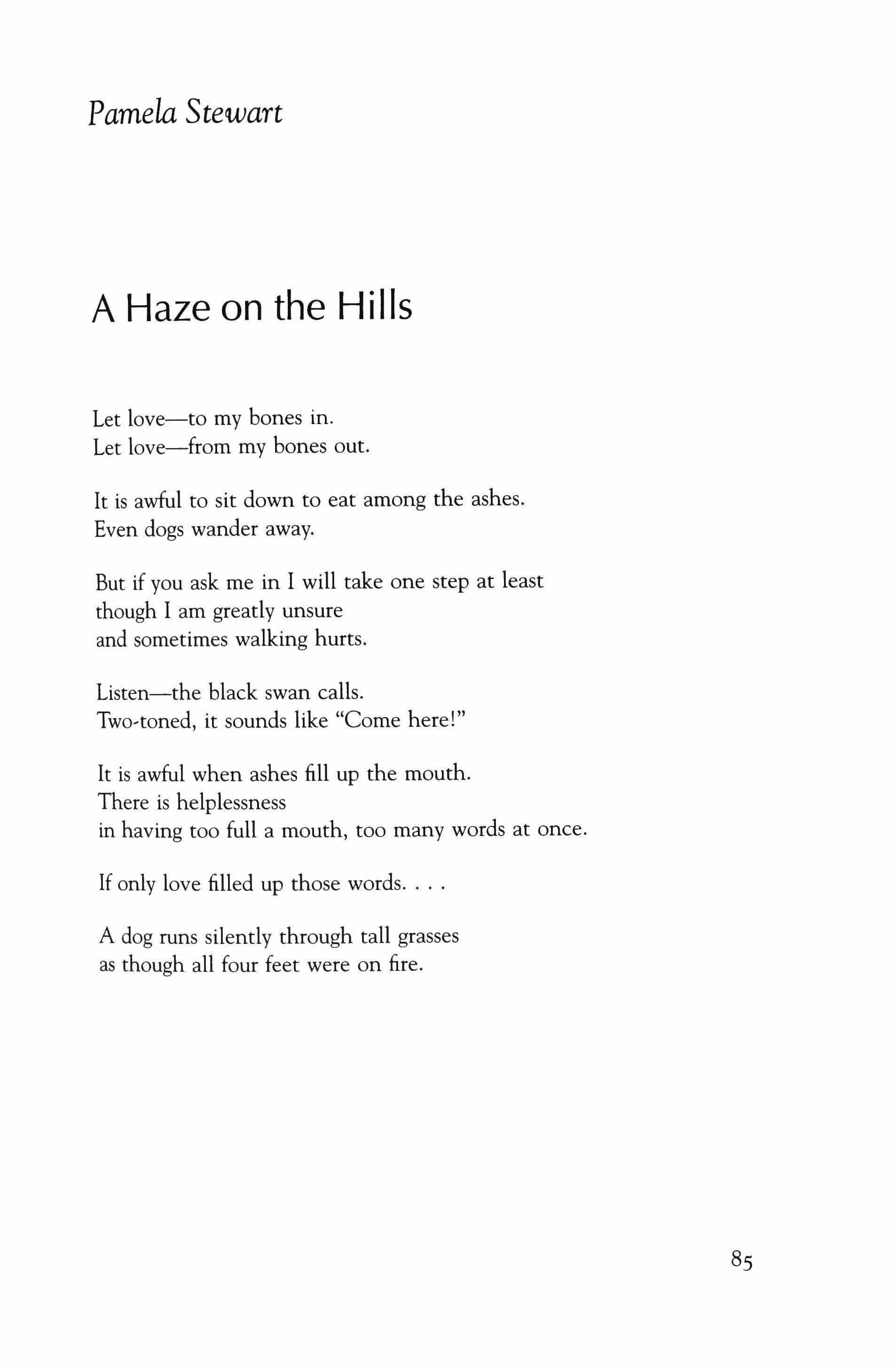
A Haze on the Hills
Let love-to my bones in. Let love-from my bones out.
It is awful to sit down to eat among the ashes. Even dogs wander away.
But if you ask me in I will take one step at least though I am greatly unsure and sometimes walking hurts.
Listen-the black swan calls. Two-toned, it sounds like "Come here!"
It is awful when ashes fill up the mouth. There is helplessness in having too full a mouth, too many words at once.
If only love filled up those words
A dog runs silently through tall grasses as though all four feet were on fire.
85
Page by Page
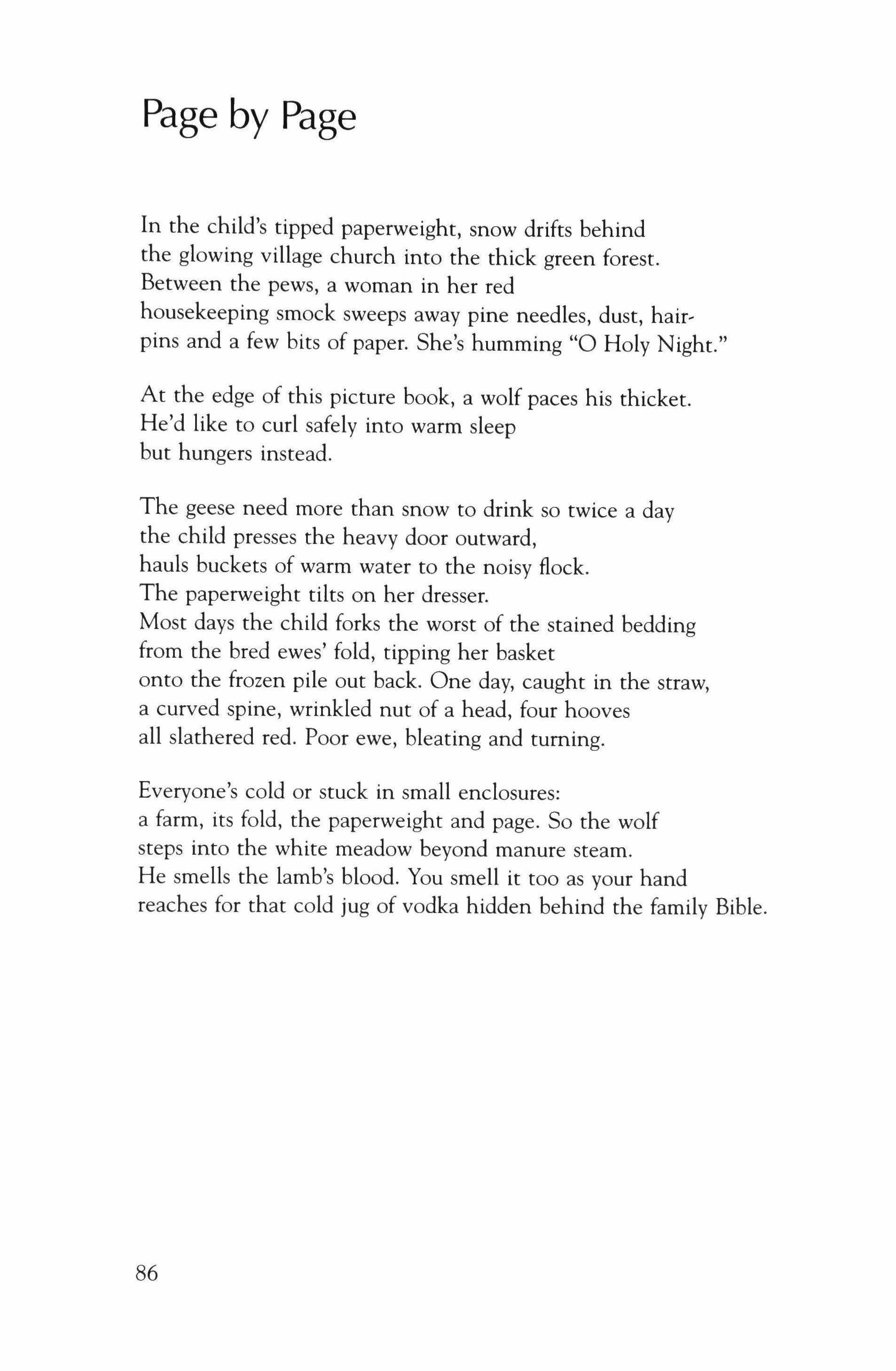
In the child's tipped paperweight, snow drifts behind the glowing village church into the thick green forest. Between the pews, a woman in her red housekeeping smock sweeps away pine needles, dust, hairpins and a few bits of paper. She's humming "0 Holy Night."
At the edge of this picture book, a wolf paces his thicket. He'd like to curl safely into warm sleep but hungers instead.
The geese need more than snow to drink so twice a day the child presses the heavy door outward, hauls buckets of warm water to the noisy flock. The paperweight tilts on her dresser. Most days the child forks the worst of the stained bedding from the bred ewes' fold, tipping her basket onto the frozen pile out back. One day, caught in the straw, a curved spine, wrinkled nut of a head, four hooves all slathered red. Poor ewe, bleating and turning.
Everyone's cold or stuck in small enclosures: a farm, its fold, the paperweight and page. So the wolf steps into the white meadow beyond manure steam. He smells the lamb's blood. You smell it too as your hand reaches for that cold jug of vodka hidden behind the family Bible.
86
My Grandmother Told Me
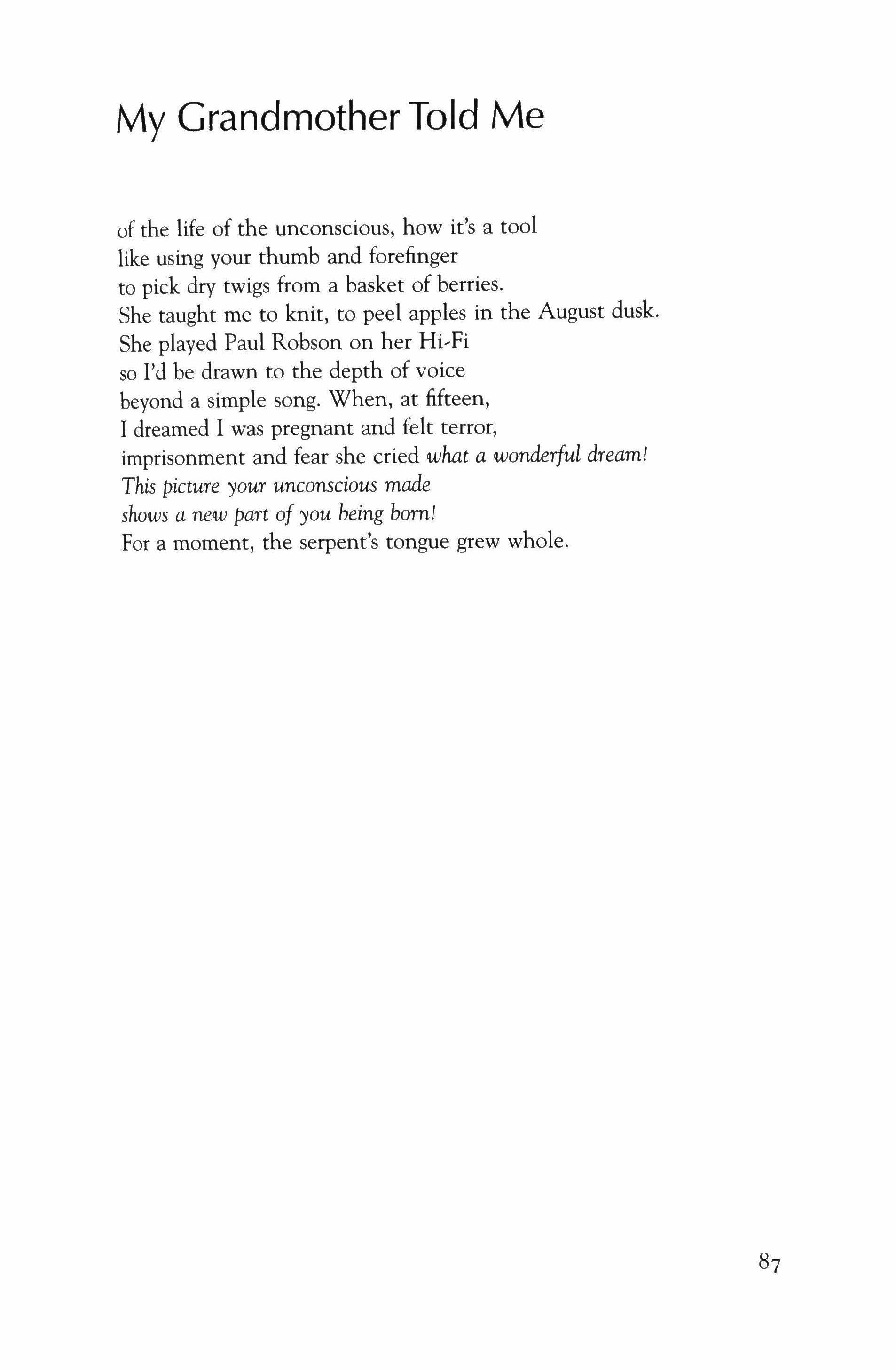
of the life of the unconscious, how it's a tool like using your thumb and forefinger to pick dry twigs from a basket of berries. She taught me to knit, to peel apples in the August dusk. She played Paul Robson on her Hi-Fi so I'd be drawn to the depth of voice beyond a simple song. When, at fifteen, I dreamed I was pregnant and felt terror, imprisonment and fear she cried what a wonderful dream! This picture your unconscious made shows a new part of you being born! For a moment, the serpent's tongue grew whole.
James D'Agostino
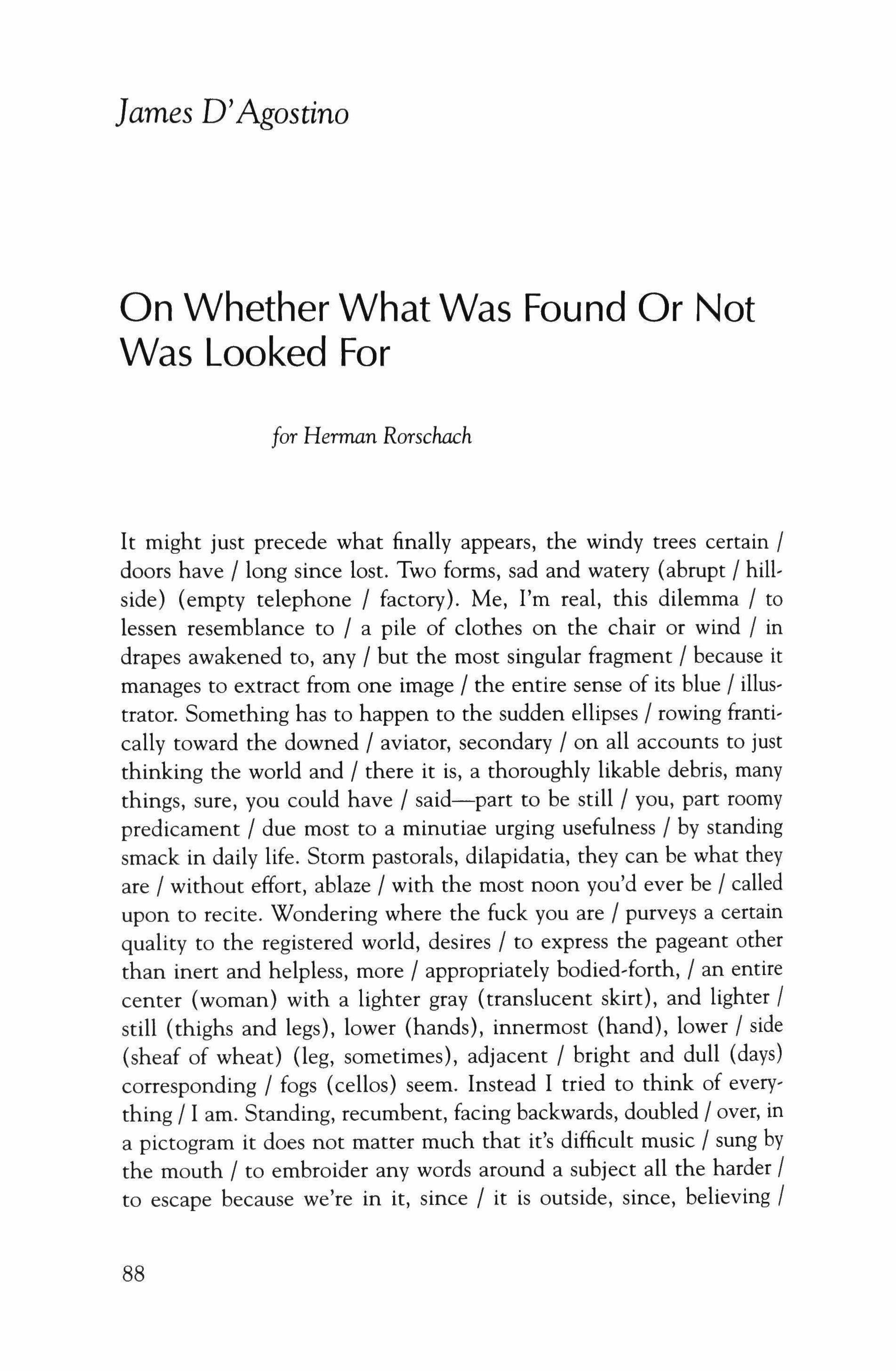
On Whether What Was Found Or Not Was Looked For
for Herman Rorschach
It might just precede what finally appears, the windy trees certain I doors have / long since lost. Two forms, sad and watery (abrupt / hillside) (empty telephone / factory). Me, I'm real, this dilemma / to lessen resemblance to / a pile of clothes on the chair or wind / in drapes awakened to, any / but the most singular fragment I because it manages to extract from one image / the entire sense of its blue / illustrator. Something has to happen to the sudden ellipses / rowing frantically toward the downed / aviator, secondary / on all accounts to just thinking the world and / there it is, a thoroughly likable debris, many things, sure, you could have / said-part to be still / you, part roomy predicament / due most to a minutiae urging usefulness / by standing smack in daily life. Storm pastorals, dilapidatia, they can be what they are / without effort, ablaze / with the most noon you'd ever be / called upon to recite. Wondering where the fuck you are / purveys a certain quality to the registered world, desires / to express the pageant other than inert and helpless, more / appropriately bodied-forth, / an entire center (woman) with a lighter gray (translucent skirt), and lighter I still (thighs and legs), lower (hands), innermost (hand), lower / side (sheaf of wheat) (leg, sometimes), adjacent / bright and dull (days) corresponding / fogs (cellos) seem. Instead I tried to think of everything / I am. Standing, recumbent, facing backwards, doubled / over, in a pictogram it does not matter much that it's difficult music / sung by the mouth / to embroider any words around a subject all the harder I to escape because we're in it, since / it is outside, since, believing I
88
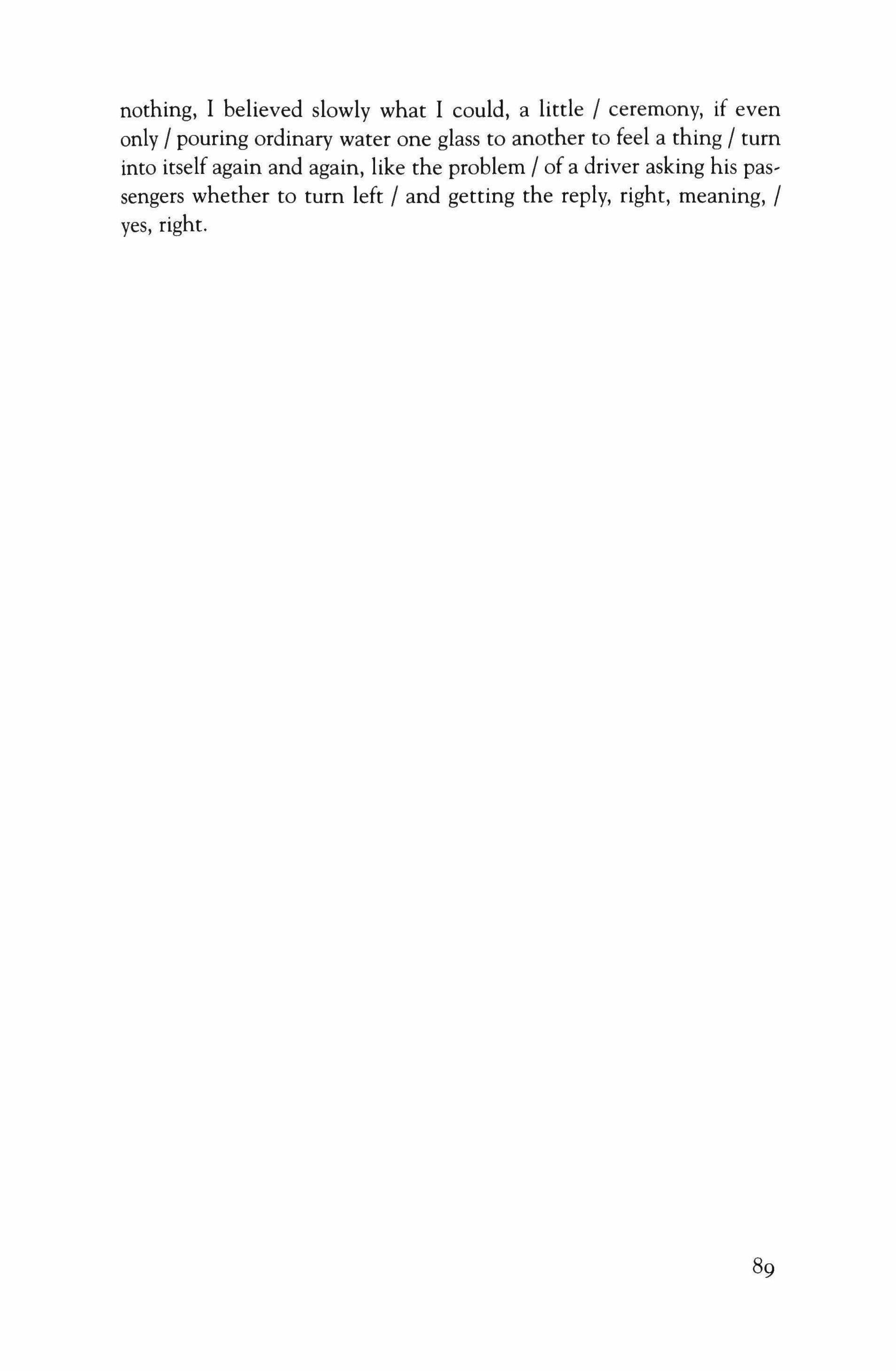
nothing, I believed slowly what I could, a little / ceremony, if even only / pouring ordinary water one glass to another to feel a thing / tum into itself again and again, like the problem / of a driver asking his passengers whether to tum left / and getting the reply, right, meaning, / yes, right.
How You Knew You Were Naked
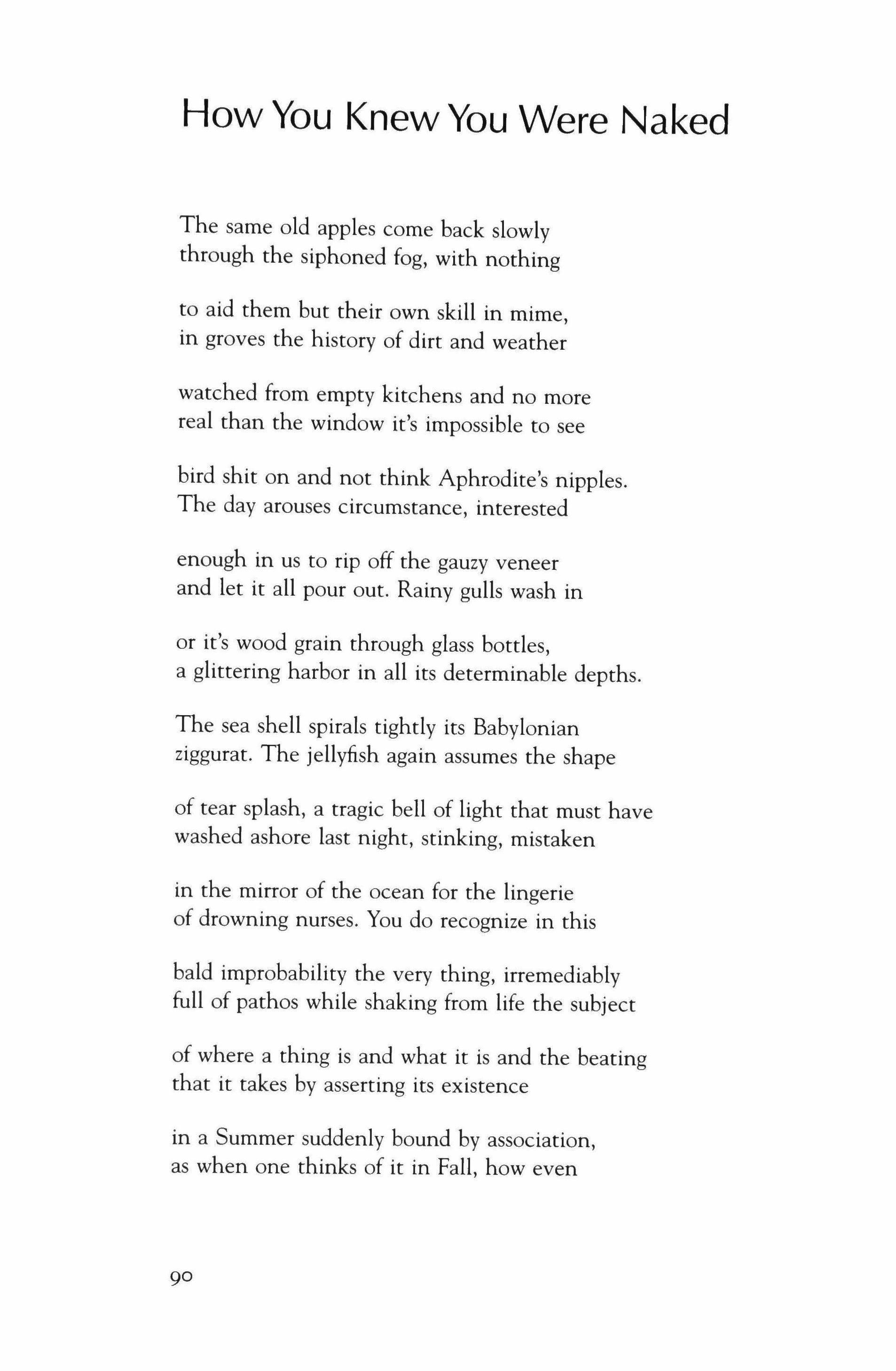
The same old apples come back slowly through the siphoned fog, with nothing to aid them but their own skill in mime, in groves the history of dirt and weather
watched from empty kitchens and no more real than the window it's impossible to see
bird shit on and not think Aphrodite's nipples. The day arouses circumstance, interested enough in us to rip off the gauzy veneer and let it all pour out. Rainy gulls wash in or it's wood grain through glass bottles, a glittering harbor in all its determinable depths.
The sea shell spirals tightly its Babylonian ziggurat. The jellyfish again assumes the shape of tear splash, a tragic bell of light that must have washed ashore last night, stinking, mistaken in the mirror of the ocean for the lingerie of drowning nurses. You do recognize in this bald improbability the very thing, irremediably full of pathos while shaking from life the subject of where a thing is and what it is and the beating that it takes by asserting its existence in a Summer suddenly bound by association, as when one thinks of it in Fall, how even
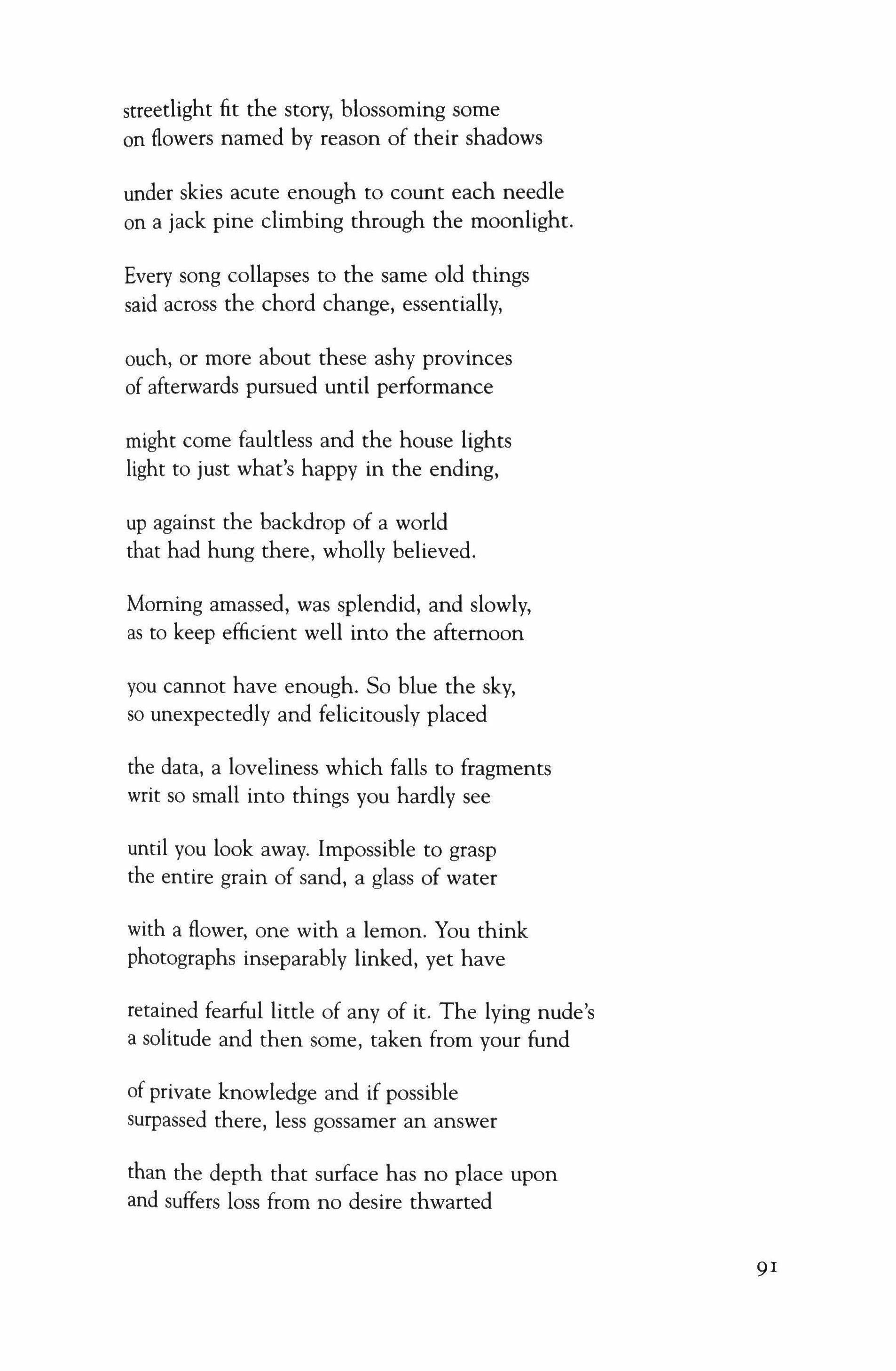
streetlight fit the story, blossoming some on flowers named by reason of their shadows
under skies acute enough to count each needle on a jack pine climbing through the moonlight.
Every song collapses to the same old things said across the chord change, essentially,
ouch, or more about these ashy provinces of afterwards pursued until performance might come faultless and the house lights light to just what's happy in the ending, up against the backdrop of a world that had hung there, wholly believed.
Morning amassed, was splendid, and slowly, as to keep efficient well into the afternoon
you cannot have enough. So blue the sky, so unexpectedly and felicitously placed
the data, a loveliness which falls to fragments writ so small into things you hardly see until you look away. Impossible to grasp the entire grain of sand, a glass of water with a flower, one with a lemon. You think photographs inseparably linked, yet have retained fearful little of any of it. The lying nude's a solitude and then some, taken from your fund of private knowledge and if possible surpassed there, less gossamer an answer than the depth that surface has no place upon and suffers loss from no desire thwarted
91

or trouble spelled to secure what's never really said without some damage to expression.
Years and years of days got out of bed and wanted to write down colors in the sea
and much else besides, so loved when you took it in your hands or reached out to a little starlight
sifted through a later arbor loved also when it rained, when paradise at last had let us in and let us at each other. A woman brushes grass from the back of a man, must have lowered herself onto him on lawns that so soon after take away the shapes they've made, affixing form to matter so it matters the two of them have both evolved from water
to look into for a time and then try to speak of as the radiant body of how to stand the heart's fall
into bone distance, as morticians say, the way to differentiate all faces viz. that they will be so
much the more of all lines drawn one point to another and no less forceful than any description of lovers one could hold in harmony with the general drift that draws its numinous impact not from ghosts, but the world as it is, where perfect means exactly what it always has, that you could call it this.
92
Jack Myers
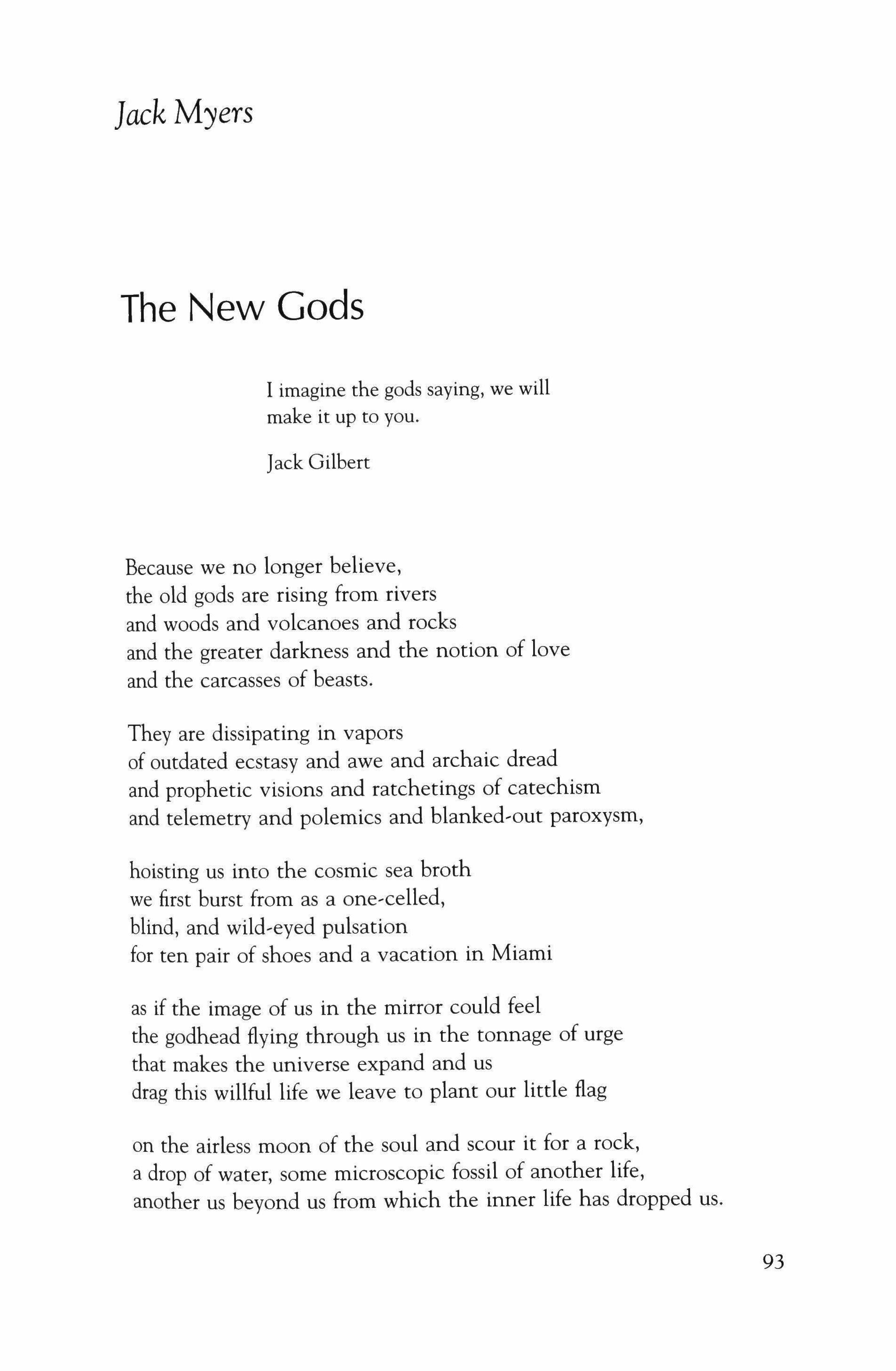
The New Gods
I imagine the gods saying, we will make it up to you.
Jack Gilbert
Because we no longer believe, the old gods are rising from rivers and woods and volcanoes and rocks and the greater darkness and the notion of love and the carcasses of beasts.
They are dissipating in vapors of outdated ecstasy and awe and archaic dread and prophetic visions and ratchetings of catechism and telemetry and polemics and blanked-out paroxysm,
hoisting us into the cosmic sea broth we first burst from as a one-celled, blind, and wild-eyed pulsation for ten pair of shoes and a vacation in Miami
as if the image of us in the mirror could feel the godhead flying through us in the tonnage of urge that makes the universe expand and us drag this willful life we leave to plant our little flag
on the airless moon of the soul and scour it for a rock, a drop of water, some microscopic fossil of another life, another us beyond us from which the inner life has dropped us.
93
Picturing Happiness
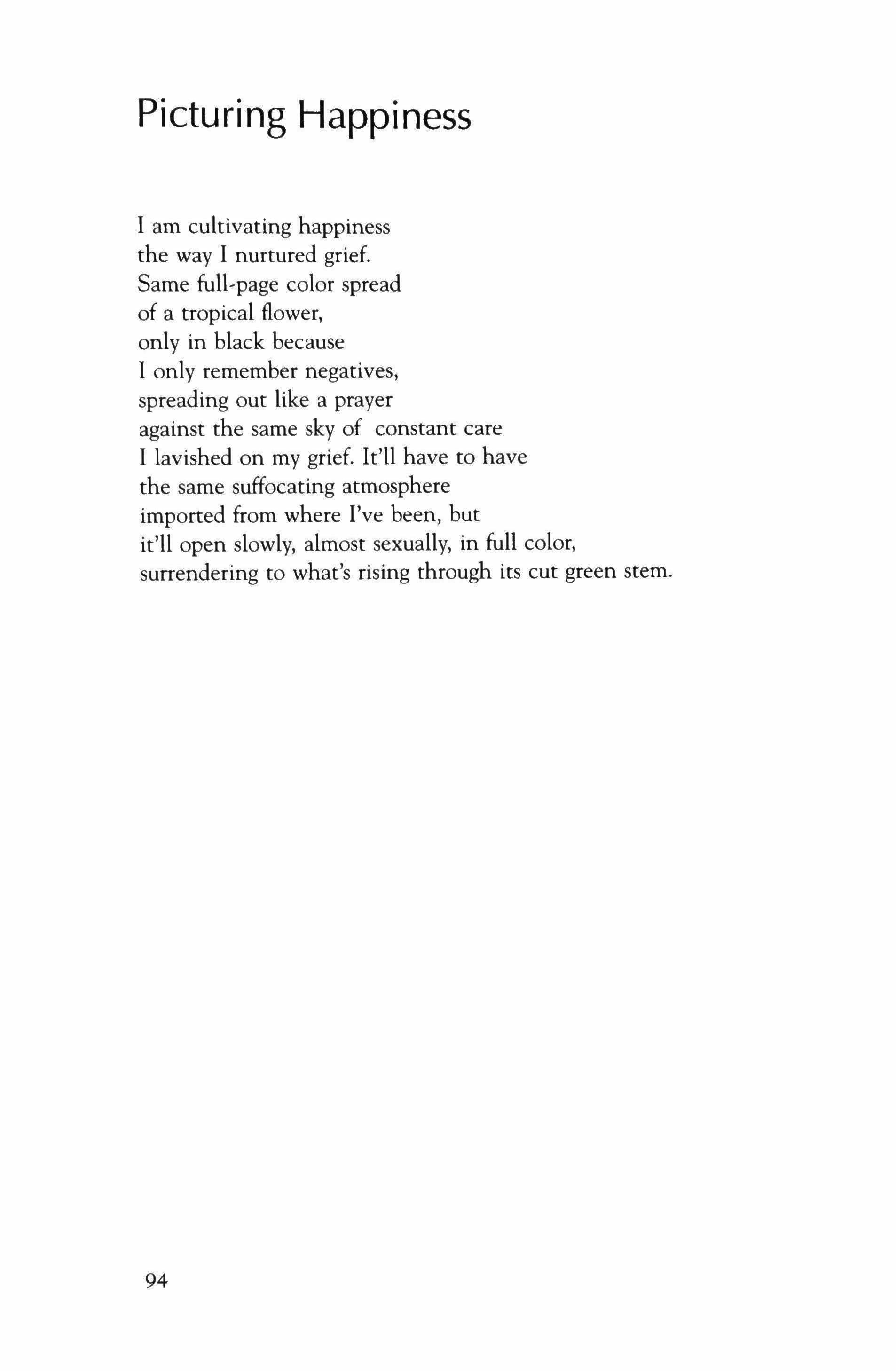
I am cultivating happiness the way I nurtured grief. Same full-page color spread of a tropical flower, only in black because I only remember negatives, spreading out like a prayer against the same sky of constant care I lavished on my grief. It'll have to have the same suffocating atmosphere imported from where I've been, but it'll open slowly, almost sexually, in full color, surrendering to what's rising through its cut green stem.
94
J. Allyn Rosser
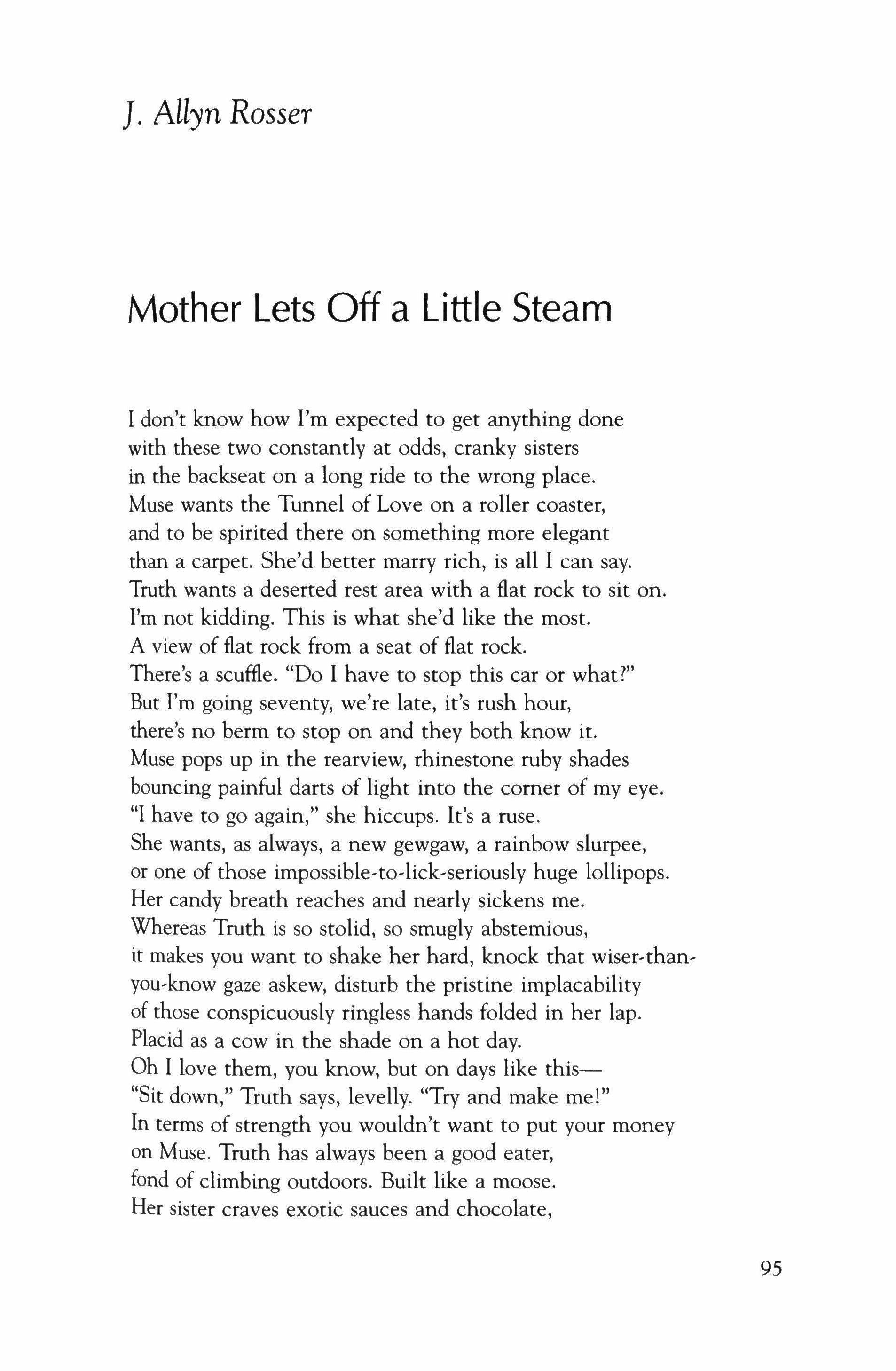
Mother Lets Off a Little Steam
I don't know how I'm expected to get anything done with these two constantly at odds, cranky sisters in the backseat on a long ride to the wrong place. Muse wants the Tunnel of Love on a roller coaster, and to be spirited there on something more elegant than a carpet. She'd better marry rich, is all I can say. Truth wants a deserted rest area with a flat rock to sit on. I'm not kidding. This is what she'd like the most. A view of flat rock from a seat of flat rock. There's a scuffle. "Do I have to stop this car or what?"
But I'm going seventy, we're late, it's rush hour, there's no berm to stop on and they both know it. Muse pops up in the rearview, rhinestone ruby shades bouncing painful darts of light into the comer of my eye. "I have to go again," she hiccups. It's a ruse. She wants, as always, a new gewgaw, a rainbow slurpee, or one of those impossible-to-lick-seriously huge lollipops. Her candy breath reaches and nearly sickens me. Whereas Truth is so stolid, so smugly abstemious, it makes you want to shake her hard, knock that wiser-thanyou-know gaze askew, disturb the pristine implacability of those conspicuously ringless hands folded in her lap. Placid as a cow in the shade on a hot day. Oh I love them, you know, but on days like this"Sit down," Truth says, levelly. "Try and make me!" In terms of strength you wouldn't want to put your money on Muse. Truth has always been a good eater, fond of climbing outdoors. Built like a moose.
Her sister craves exotic sauces and chocolate,
95
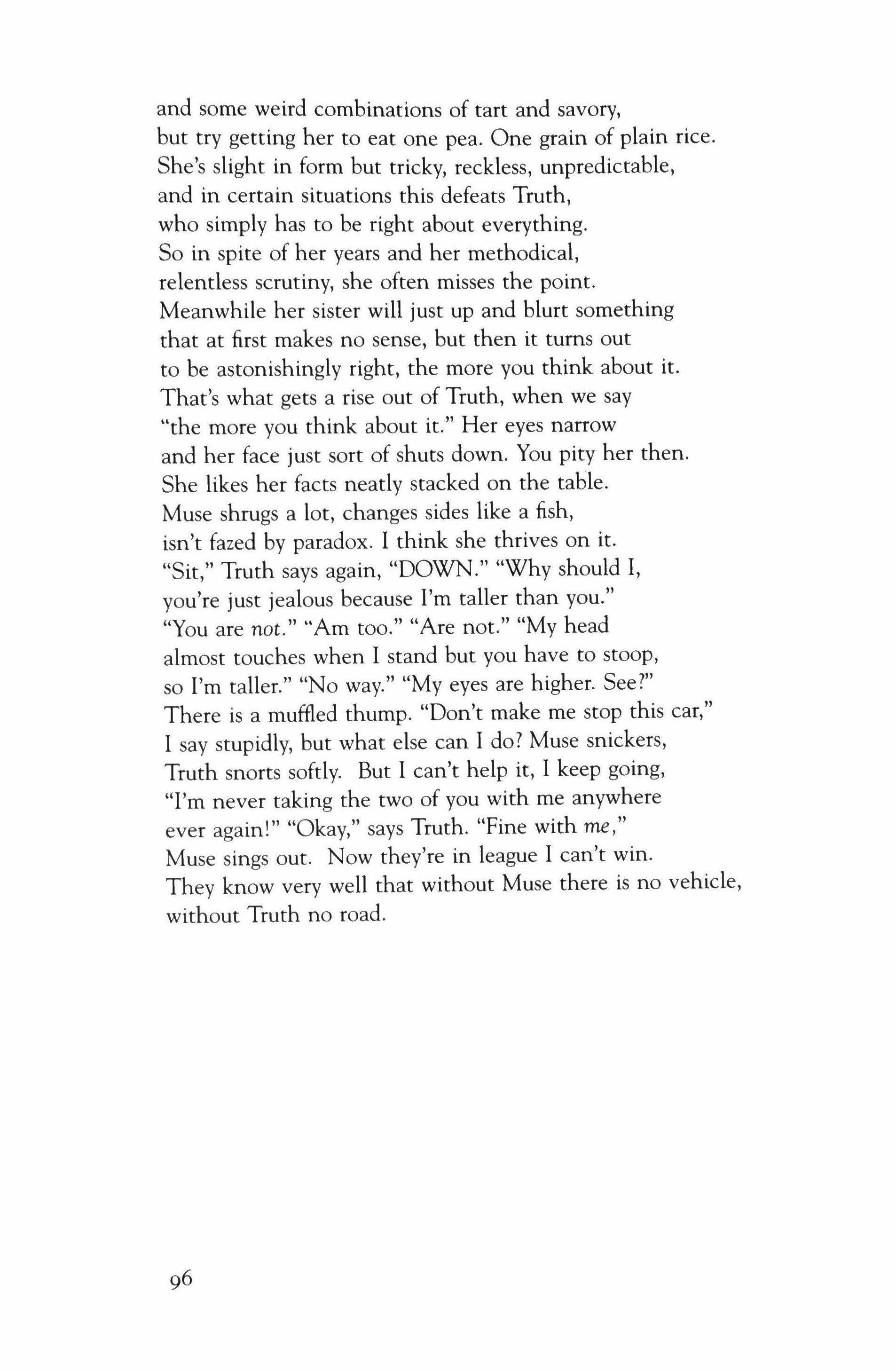
and some weird combinations of tart and savory, but try getting her to eat one pea. One grain of plain rice. She's slight in form but tricky, reckless, unpredictable, and in certain situations this defeats Truth, who simply has to be right about everything. So in spite of her years and her methodical, relentless scrutiny, she often misses the point. Meanwhile her sister will just up and blurt something that at first makes no sense, but then it turns out to be astonishingly right, the more you think about it. That's what gets a rise out of Truth, when we say "the more you think about it." Her eyes narrow and her face just sort of shuts down. You pity her then. She likes her facts neatly stacked on the table. Muse shrugs a lot, changes sides like a fish, isn't fazed by paradox. I think she thrives on it. "Sit," Truth says again, "DOWN." "Why should I, you're just jealous because I'm taller than you." "You are nat." "Am too." "Are not." "My head almost touches when I stand but you have to stoop, so I'm taller." "No way." "My eyes are higher. See?"
There is a muffled thump. "Don't make me stop this car," I say stupidly, but what else can I do? Muse snickers, Truth snorts softly. But I can't help it, I keep going, "I'm never taking the two of you with me anywhere ever again!" "Okay," says Truth. "Fine with me," Muse sings out. Now they're in league I can't win. They know very well that without Muse there is no vehicle, without Truth no road.
What's My Line
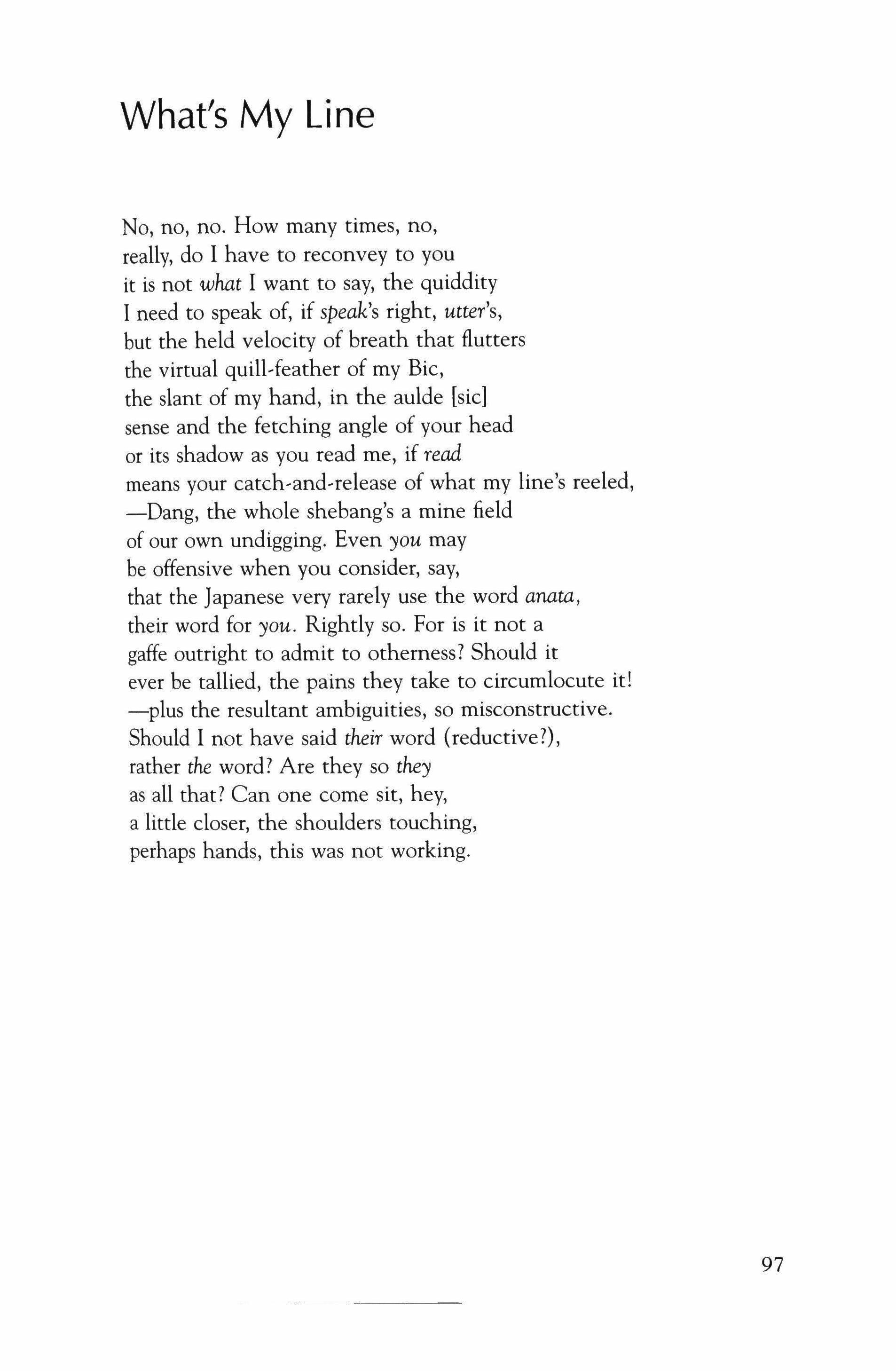
No, no, no. How many times, no, really, do I have to reconvey to you it is not what I want to say, the quiddity I need to speak of, if speak's right, utter's, but the held velocity of breath that flutters the virtual quill-feather of my Bic, the slant of my hand, in the aulde [sic] sense and the fetching angle of your head or its shadow as you read me, if read means your catch-and-release of what my line's reeled, -Dang, the whole shebang's a mine field of our own undigging. Even you may be offensive when you consider, say, that the Japanese very rarely use the word anata, their word for you. Rightly so. For is it not a gaffe outright to admit to otherness? Should it ever be tallied, the pains they take to circumlocute it! -plus the resultant ambiguities, so misconstructive. Should I not have said their word (reductive?), rather the word? Are they so they as all that? Can one come sit, hey, a little closer, the shoulders touching, perhaps hands, this was not working.
97
Jaime Saenz
Translated from the Spanish by Forrest Gander and Kent Johnson
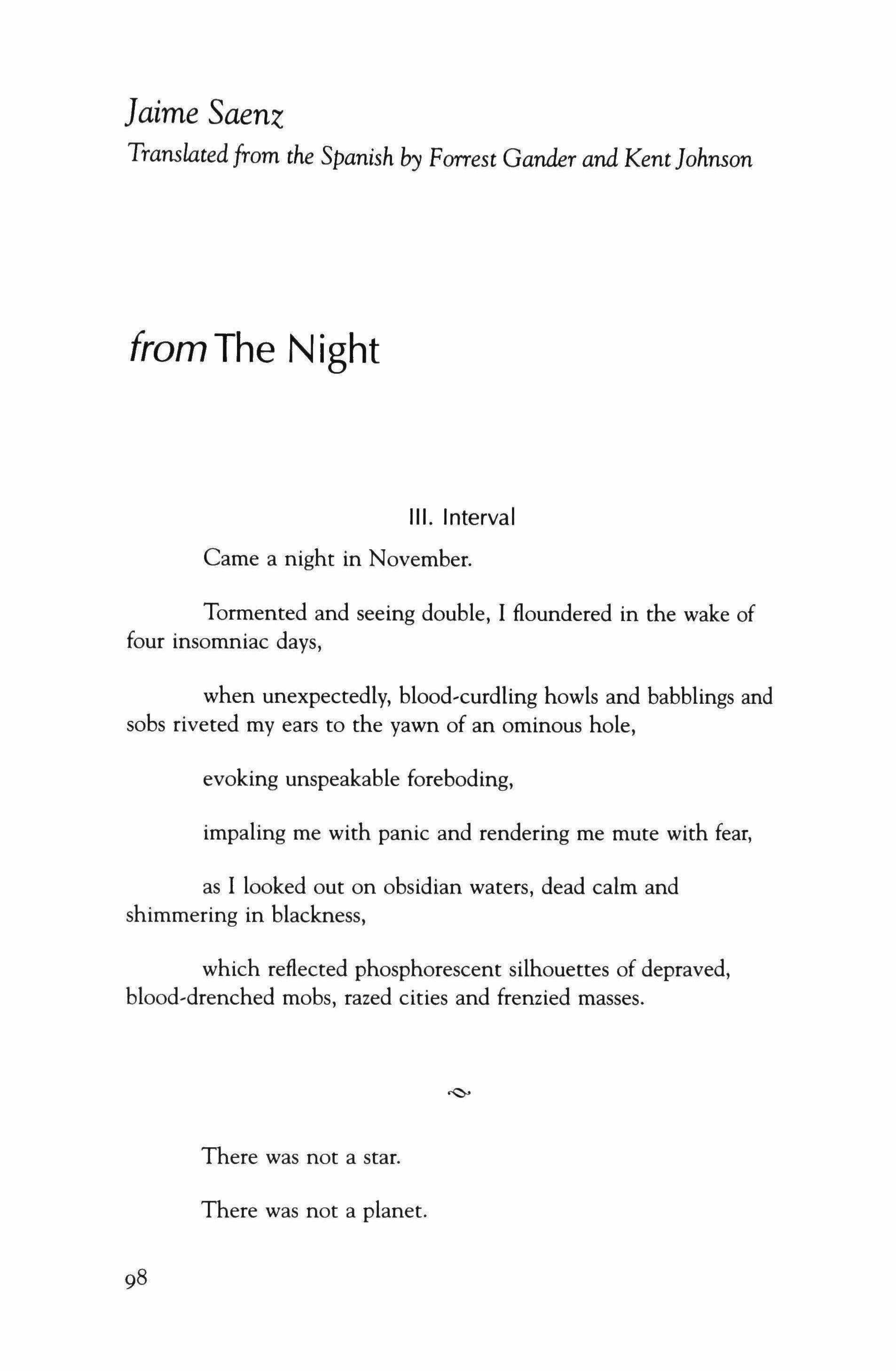
from The Night
III. Interval
Carne a night in November.
Tormented and seeing double, I floundered in the wake of four insomniac days,
when unexpectedly, blood-curdling howls and babblings and sobs riveted my ears to the yawn of an ominous hole,
evoking unspeakable foreboding,
impaling me with panic and rendering me mute with fear,
as I looked out on obsidian waters, dead calm and shimmering in blackness,
which reflected phosphorescent silhouettes of depraved, blood-drenched mobs, razed cities and frenzied masses.
There was not a star.
There was not a planet.

There was no firmament-the sky smudged with gloom.
Nevertheless, in the north, the city's light glowered in a cloud, and cracked the thick mantle of shadow.
And oddly, at the comer of the General Hospital, on Avenue Miraflores, an absolute and total darkness reigned; and this darkness was otherworldly, a darkness never seen before.
And people congregated around it, though keeping their distance; and transfixed by the umbrae, they shot each other dire, speaking looks.
-and then a panic spread.
In fact, to the mounting terror of the populace, the grave event poured itself into many long days; and only after a whole week did the light snap on again.
Shortly after the bizarre event-which henceforth would be called The Curse of the Comer-
brutal and spectacular disasters rained down on the populace.
Not a soul could explain the weirdness going down every day; and it was increasingly hard to control the tumultuous mobs, who flung themselves chaotically into the streets.
At the very apex of the day, the sun would blank out, and the whole city sink in a sea of shadows.
Fantastic concussions rang out from the pit of the earth, and by and by a funereal silence took hold.
Lots of people, crazed with dread of the unknown, hung themselves.
99

Men and women, children and the aged, set fire to buildings for the sake of light,
and then they leaped into the flames, roasted alive.
After a while, inexplicably, the sun would emerge blazing its insane brilliance, and with this, the frenzy and madness surged to an uncontrollable pitch.
And so on, day after day.
Now a light ensheathing, now a dark insaning, as a poet, in an ode to the catastrophe, put it.
Either the heat was deadly and infernal, or the cold plummeted to one hundred and fifty below,
freezing multitudes to the boulevards, statues of flesh and bone.
So things went, and by and by, the dark ones, monstrous and huge, with savage, menacing intensity, with bells in their ears, and with hands white as snow, appeared in the streets; and from the get-go they set in motion a general pall that spilled past the bounds of paroxysm.
The fact is, these dark ones cruised along without glancing at anyone, arrogant as lords and cold-hearted, riding strange machines with spheres for wheels, rolling along at fabulous speeds, emitting malevolent, charged vibrations.
And when the darkness gathered, these machines shot out brilliant, paralyzing beams, and roared so viciously, people were driven to madness and death.
100
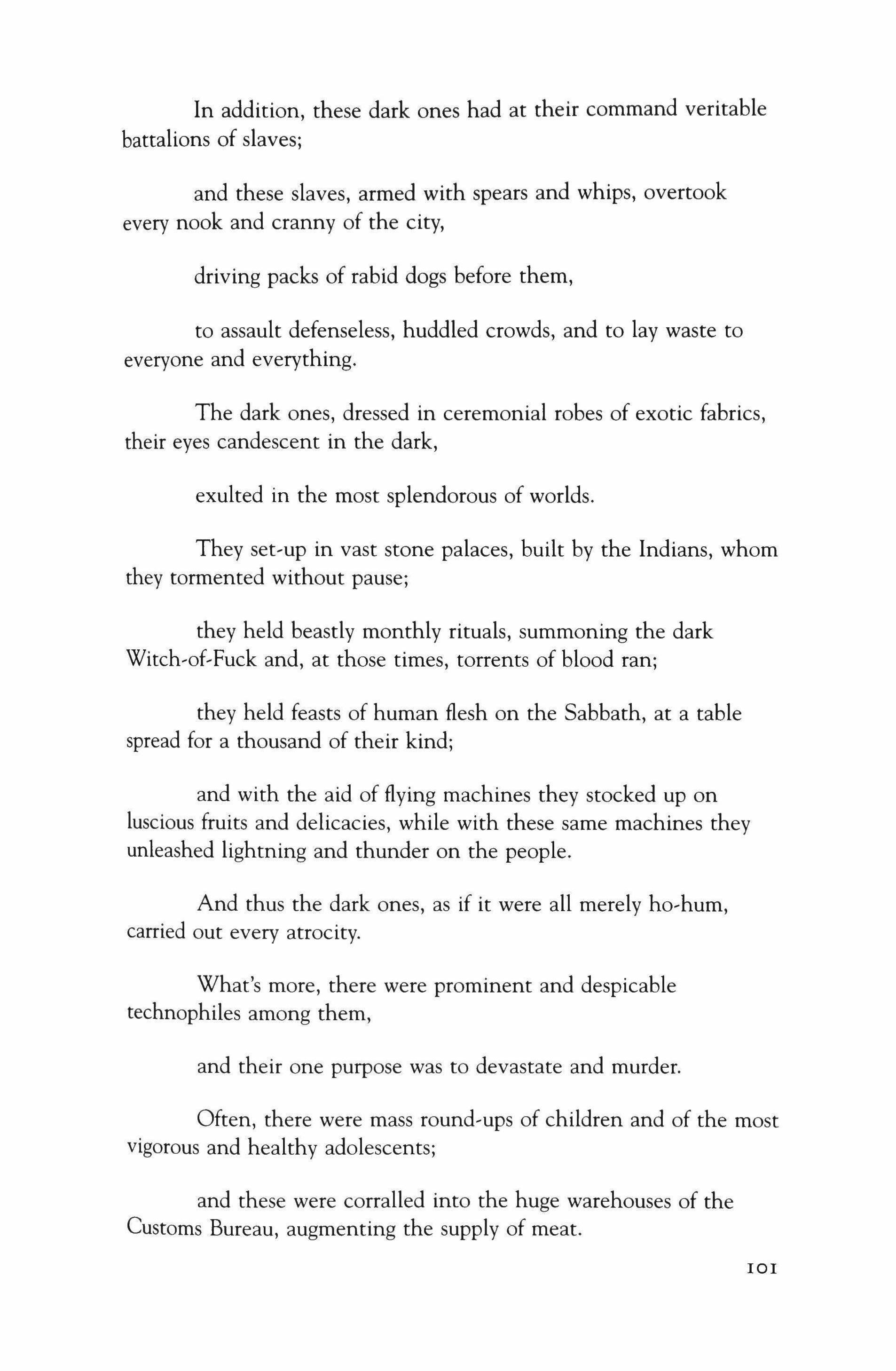
In addition, these dark ones had at their command veritable battalions of slaves;
and these slaves, armed with spears and whips, overtook every nook and cranny of the city,
driving packs of rabid dogs before them, to assault defenseless, huddled crowds, and to lay waste to everyone and everything.
The dark ones, dressed in ceremonial robes of exotic fabrics, their eyes candescent in the dark, exulted in the most splendorous of worlds.
They set-up in vast stone palaces, built by the Indians, whom they tormented without pause;
they held beastly monthly rituals, summoning the dark Witch,of,Fuck and, at those times, torrents of blood ran;
they held feasts of human flesh on the Sabbath, at a table spread for a thousand of their kind;
and with the aid of flying machines they stocked up on luscious fruits and delicacies, while with these same machines they unleashed lightning and thunder on the people.
And thus the dark ones, as if it were all merely ho-hum, carried out every atrocity.
What's more, there were prominent and despicable technophiles among them, and their one purpose was to devastate and murder.
Often, there were mass round,ups of children and of the most vigorous and healthy adolescents;
and these were corralled into the huge warehouses of the Customs Bureau, augmenting the supply of meat.
101
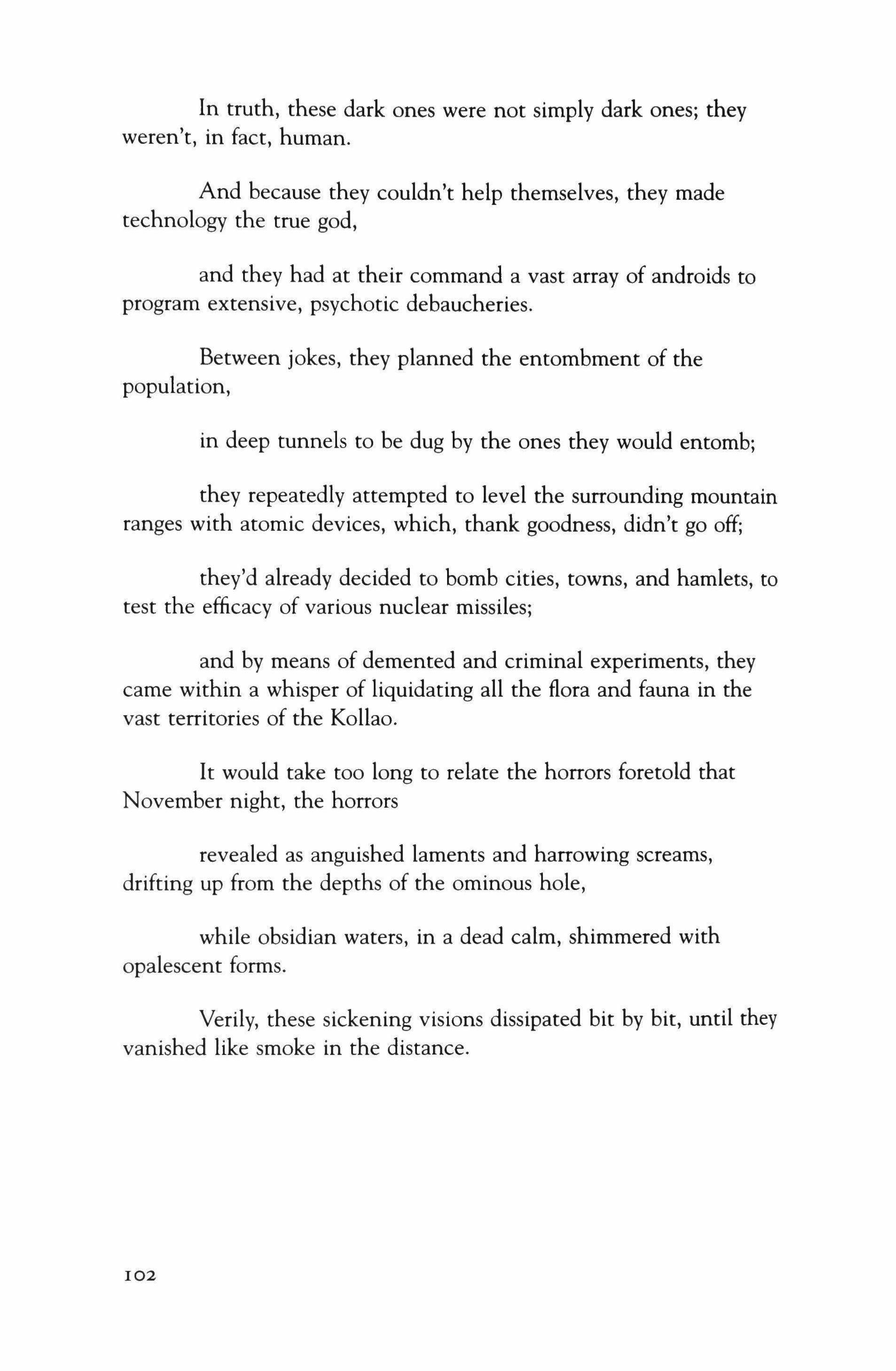
In truth, these dark ones were not simply dark ones; they weren't, in fact, human.
And because they couldn't help themselves, they made technology the true god, and they had at their command a vast array of androids to program extensive, psychotic debaucheries.
Between jokes, they planned the entombment of the population, in deep tunnels to be dug by the ones they would entomb; they repeatedly attempted to level the surrounding mountain ranges with atomic devices, which, thank goodness, didn't go off; they'd already decided to bomb cities, towns, and hamlets, to test the efficacy of various nuclear missiles; and by means of demented and criminal experiments, they came within a whisper of liquidating all the flora and fauna in the vast territories of the Kollao.
It would take too long to relate the horrors foretold that November night, the horrors revealed as anguished laments and harrowing screams, drifting up from the depths of the ominous hole, while obsidian waters, in a dead calm, shimmered with opalescent forms.
Verily, these sickening visions dissipated bit by bit, until they vanished like smoke in the distance.
102
Alfonso D'Aquino
Translated from the Spanish by James Ryang
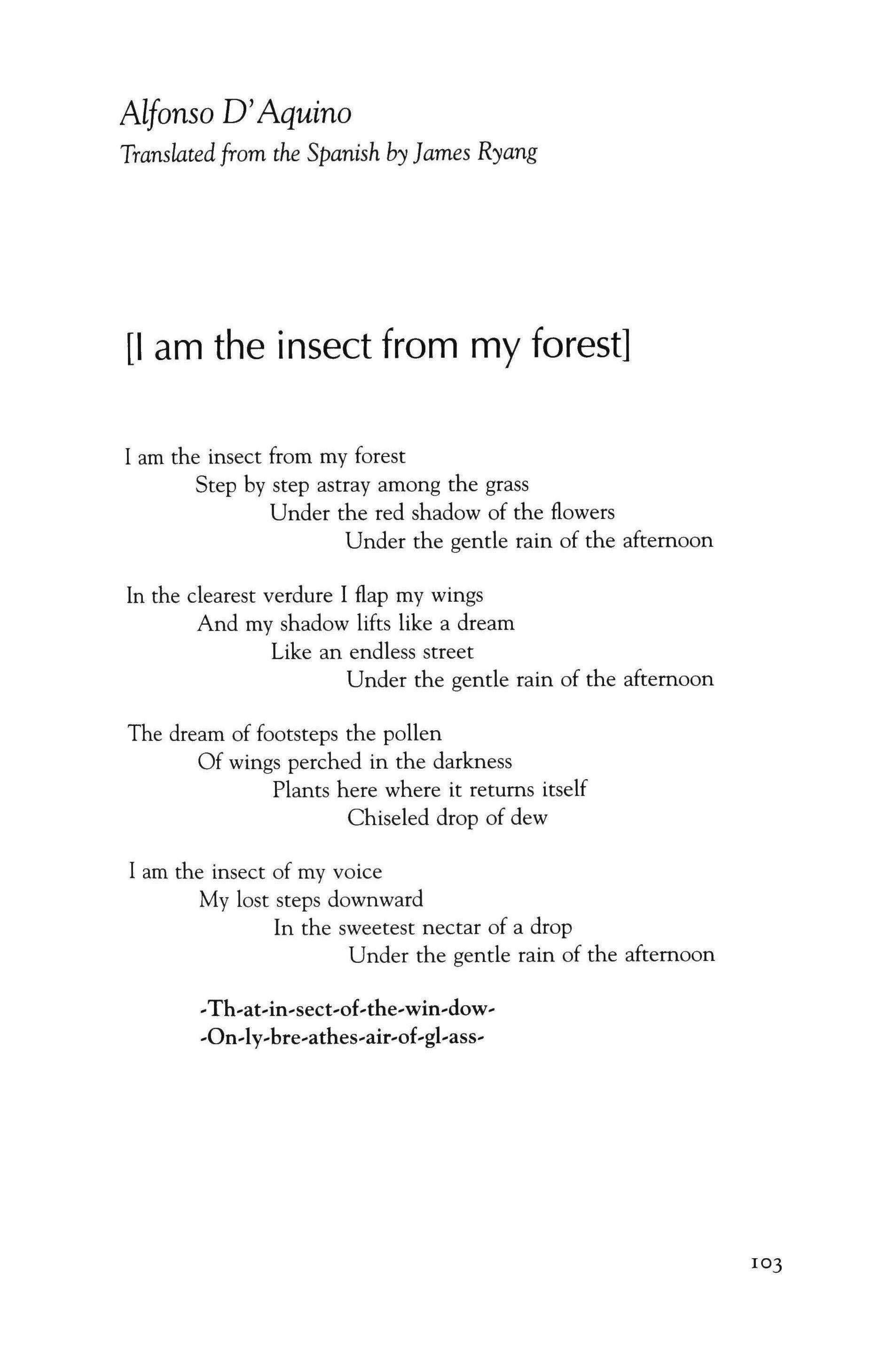
[I am the insect from my forest]
I am the insect from my forest
Step by step astray among the grass
Under the red shadow of the flowers
Under the gentle rain of the afternoon
In the clearest verdure I flap my wings
And my shadow lifts like a dream
Like an endless street
Under the gentle rain of the afternoon
The dream of footsteps the pollen
Of wings perched in the darkness
Plants here where it returns itself
Chiseled drop of dew
I am the insect of my voice
My lost steps downward
In the sweetest nectar of a drop
Under the gentle rain of the afternoon
- Th-at-in-sect-of-the-win-dow-On-lv-bre-athes-air-of-gl-ass-
103
[The sun opens its lips and tells us]
The sun opens its lips and tells us
Violet shadow of the fig tree
Aquamarine the blood of the wolves
Navy blue the gray bouquets
Green bottles with red lips
Violent yellow the iris of the cats
Sweet orange the light at noon
White,hot the tongue of the birds
Are these pure colors painting by themselves?
Under the dwelling purple blue of the birds
Pure dull gray smoke 100% "Acrid gold"
Powdered coffee with milk
Infamous black
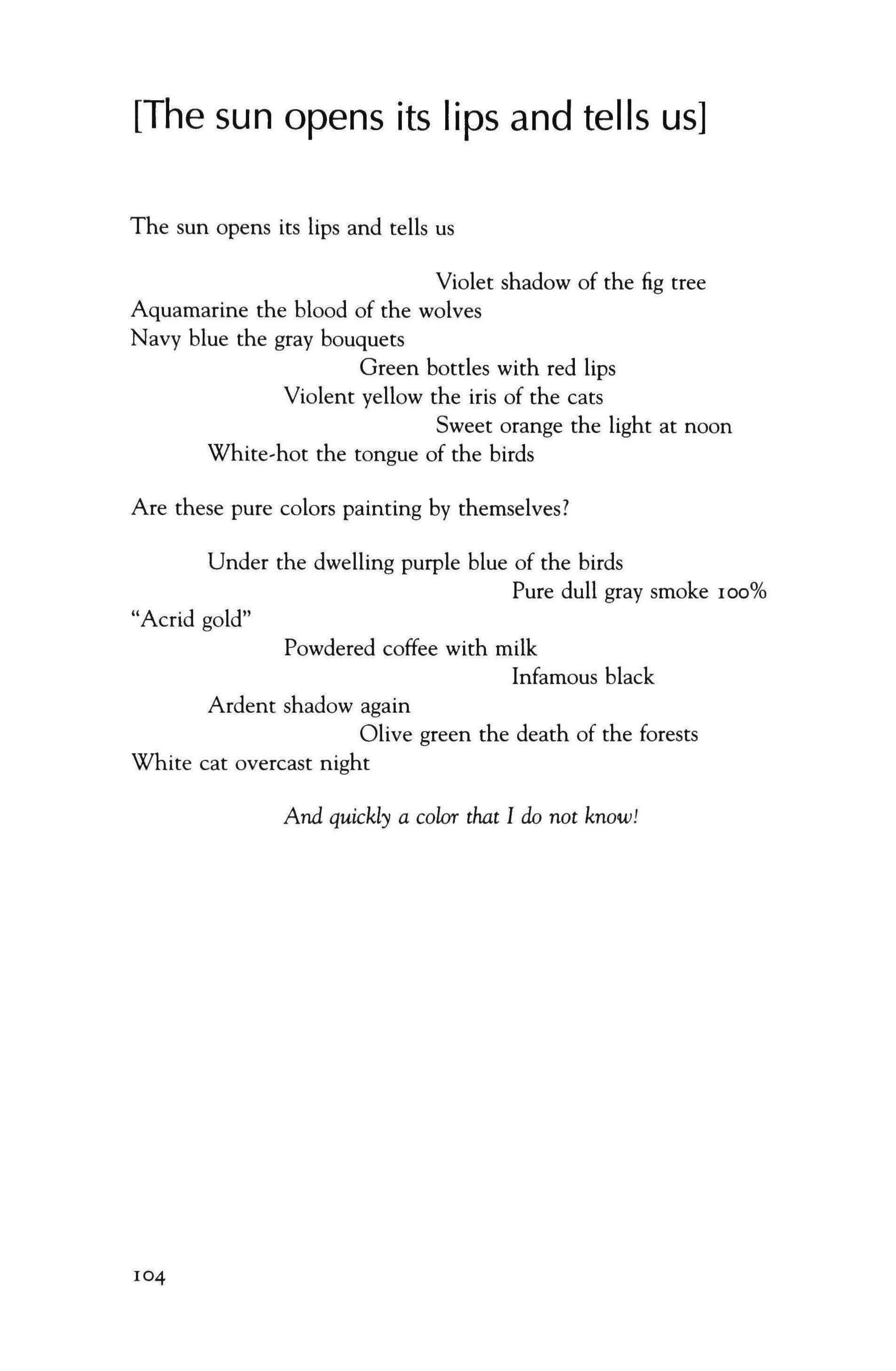
Ardent shadow again
Olive green the death of the forests
White cat overcast night
And quickly a color that I do not know!
104
Robin Behn
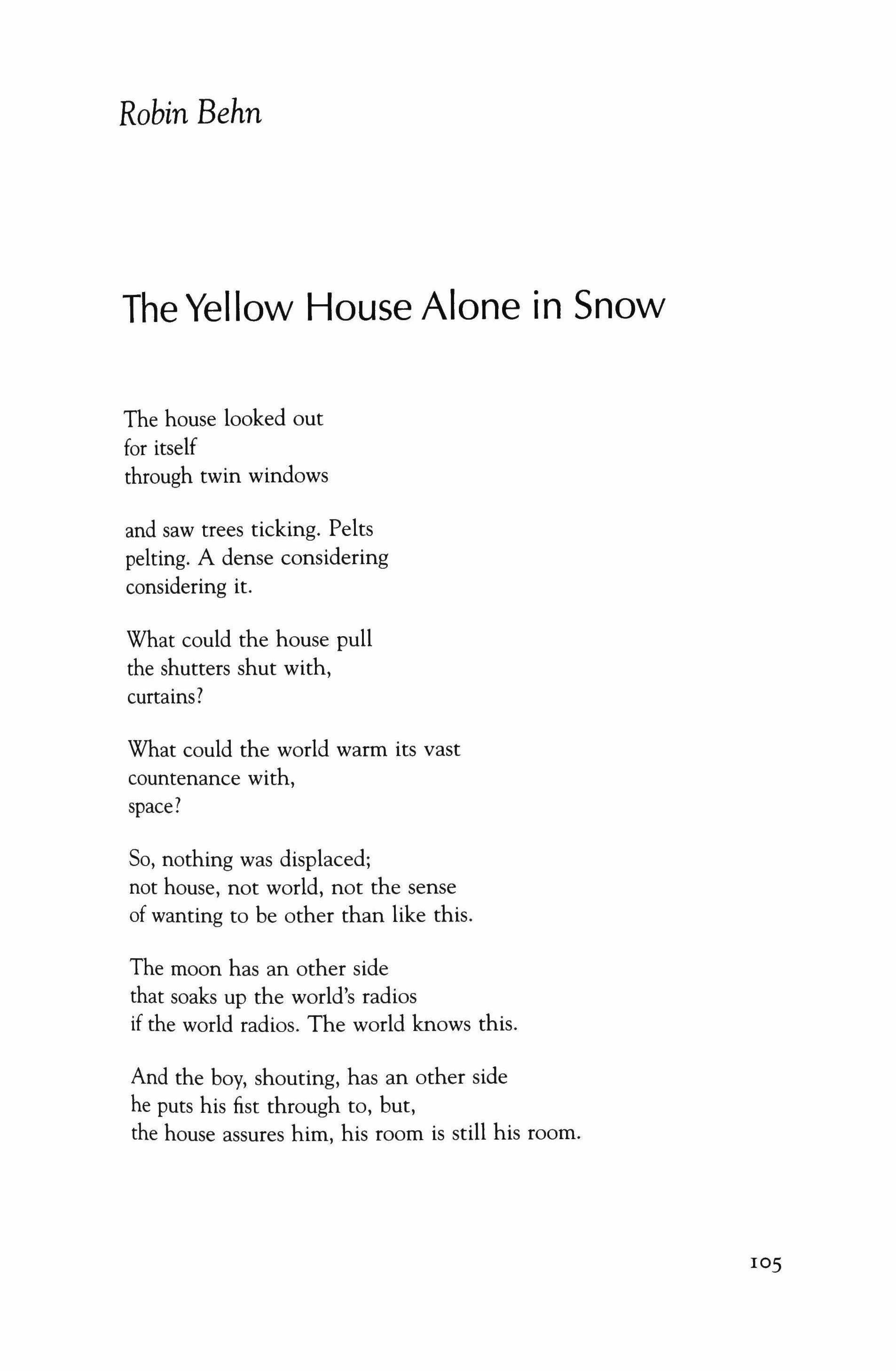
The Yellow House Alone in Snow
The house looked out for itself through twin windows and saw trees ticking. Pelts pelting. A dense considering considering it.
What could the house pull the shutters shut with, curtains?
What could the world warm its vast countenance with, space?
So, nothing was displaced; not house, not world, not the sense of wanting to be other than like this.
The moon has an other side that soaks up the world's radios if the world radios. The world knows this.
And the boy, shouting, has an other side he puts his fist through to, but, the house assures him, his room is still his room.
105
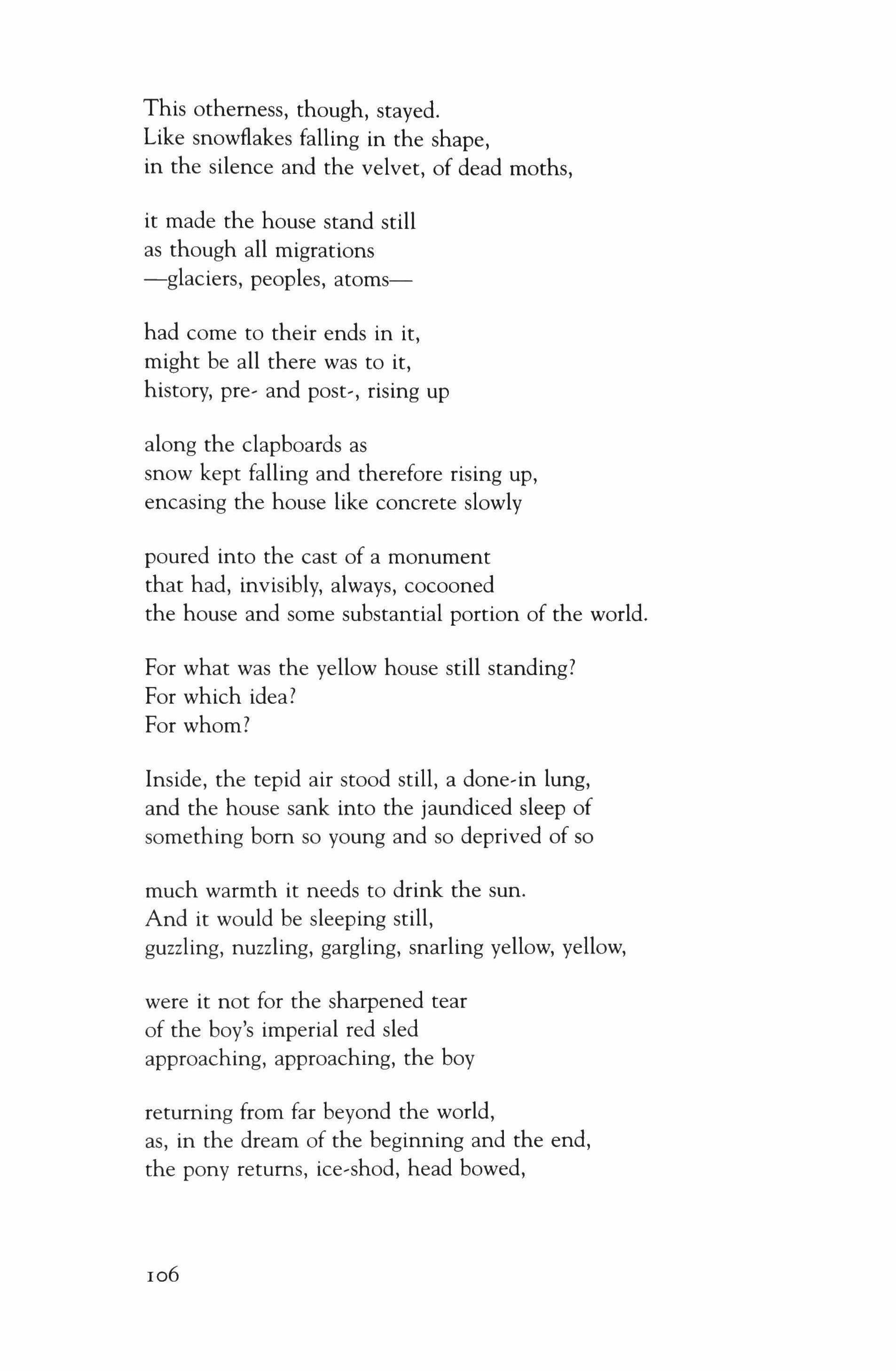
This otherness, though, stayed. Like snowflakes falling in the shape, in the silence and the velvet, of dead moths, it made the house stand still as though all migrations -glaciers, peoples, atomshad come to their ends in it, might be all there was to it, history, pre- and post-, rising up along the clapboards as snow kept falling and therefore rising up, encasing the house like concrete slowly poured into the cast of a monument that had, invisibly, always, cocooned the house and some substantial portion of the world.
For what was the yellow house still standing? For which idea? For whom?
Inside, the tepid air stood still, a done-in lung, and the house sank into the jaundiced sleep of something born so young and so deprived of so much warmth it needs to drink the sun. And it would be sleeping still, guzzling, nuzzling, gargling, snarling yellow, yellow, were it not for the sharpened tear of the boy's imperial red sled approaching, approaching, the boy returning from far beyond the world, as, in the dream of the beginning and the end, the pony returns, ice-shod, head bowed,
106

glittering with tiny bells that stay tiny as he approaches, almost grown up now, pulling at the rope to drag
two knives through snow, excising a swath in his wake as long as the path through a life to the planet of infinite and undisturbed forgiveness of nothing toward nothing in the face of yellow, spectral nothing which is the land and landscape and the cape Something wears, flourishing, turning Its back upon us with a flourish in the snorting eye of red, the laughing eye of yellow, for warmth and further flourishing, and for us to walk upon, to dance across the gutter upon, because we are regal, and the house, from which the seeing comes which is also the thing which sees, the does which is the is, is yellow, and is flourishing.
107
Pursuit of the Yellow House
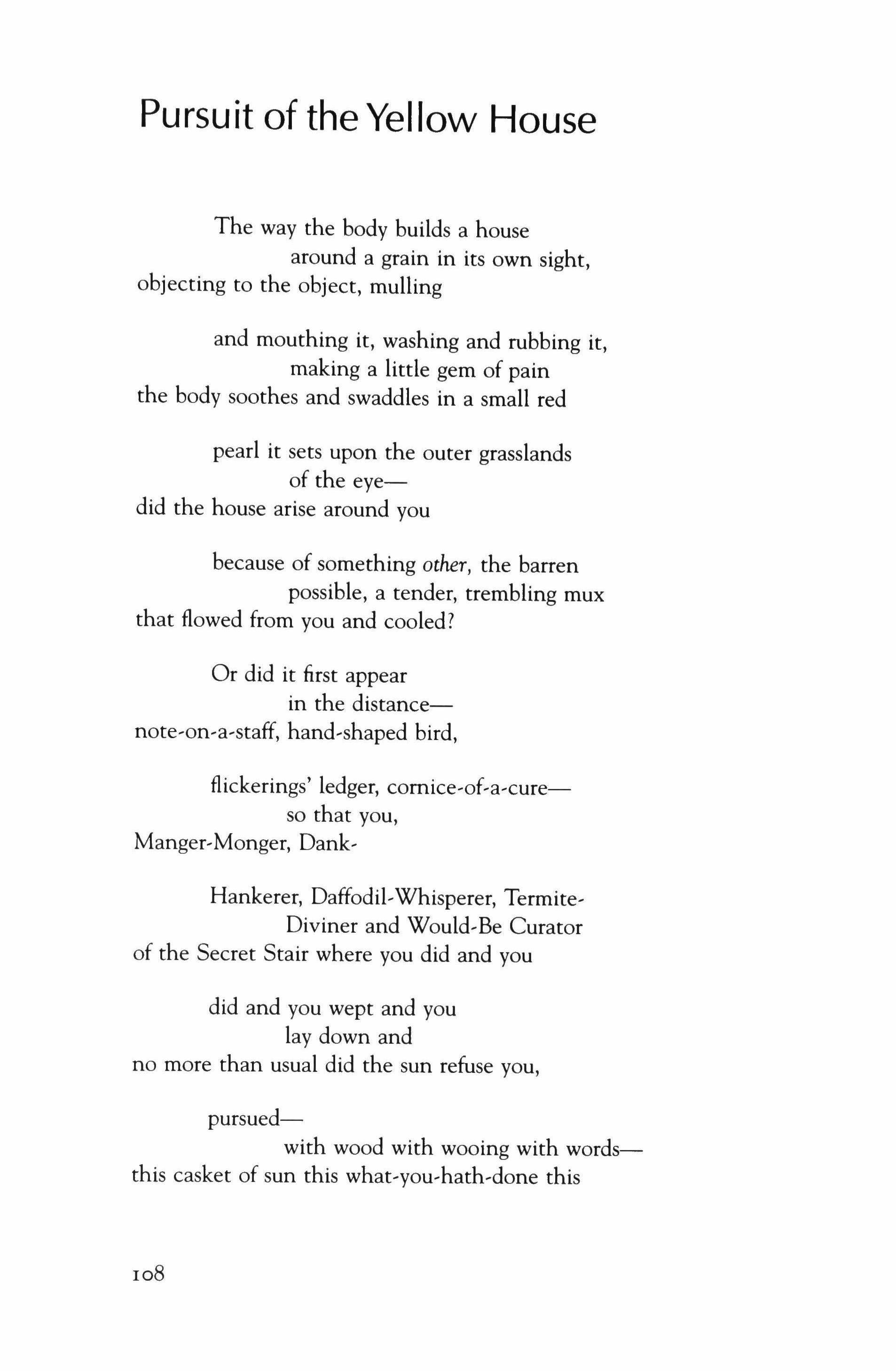
The way the body builds a house around a grain in its own sight, objecting to the object, mulling and mouthing it, washing and rubbing it, making a little gem of pain the body soothes and swaddles in a small red
pearl it sets upon the outer grasslands of the eyedid the house arise around you because of something other, the barren possible, a tender, trembling mux that flowed from you and cooled?
Or did it first appear in the distancenote-on-a-staff, hand-shaped bird,
flickerings' ledger, comice-of-a-cure-eso that you, Manger-Monger, Dank-
Hankerer, Daffodil-Whisperer, TermiteDiviner and Would�Be Curator of the Secret Stair where you did and you did and you wept and you lay down and no more than usual did the sun refuse you, pursuedwith wood with wooing with wordsthis casket of sun this what-you-hath-done this
108
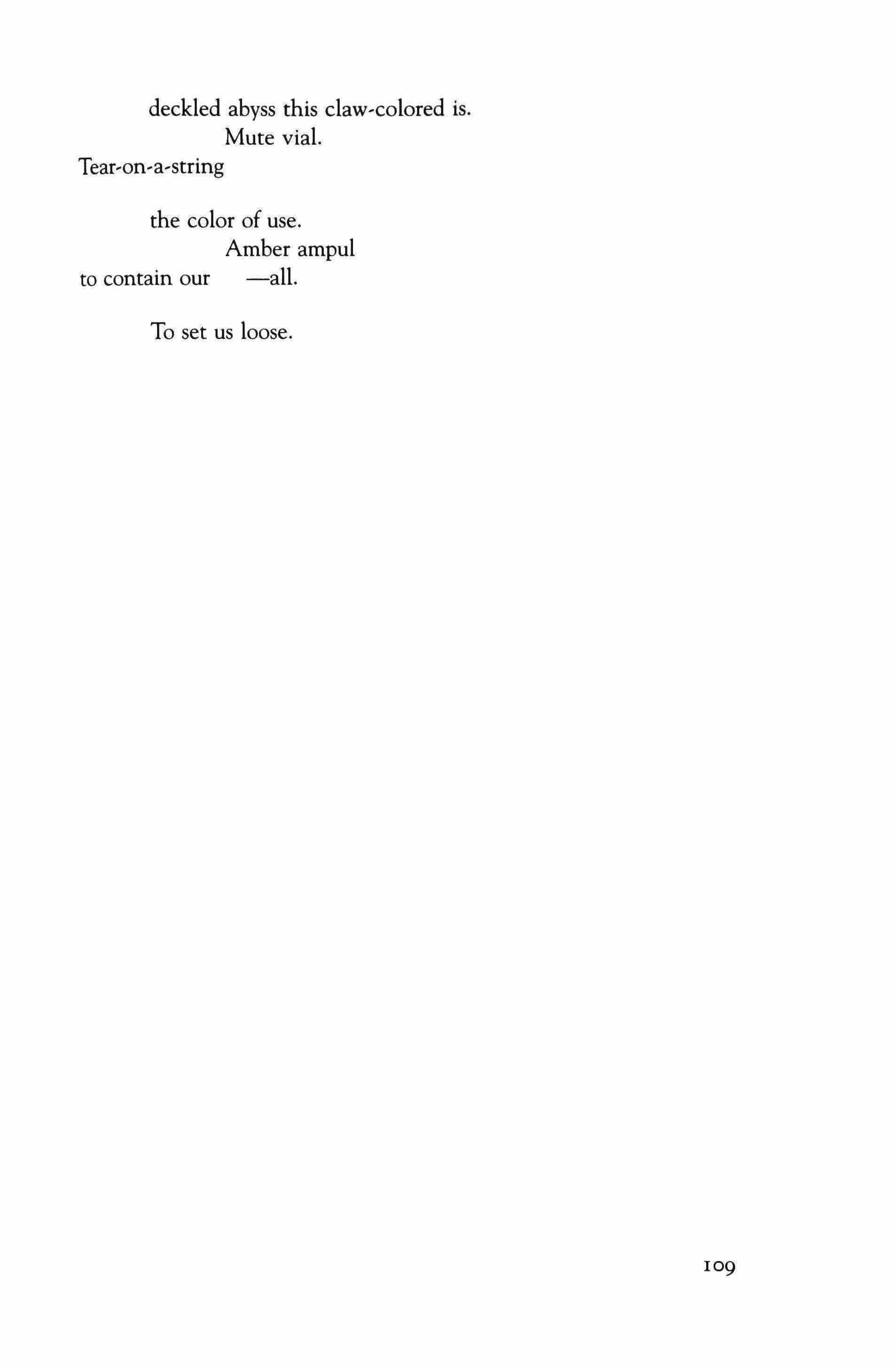
deckled abyss this claw-colored is. Mute vial.
Tear-on-a-string the color of use.
Amber ampul to contain our -all.
To set us loose.
109
Linda Bierds
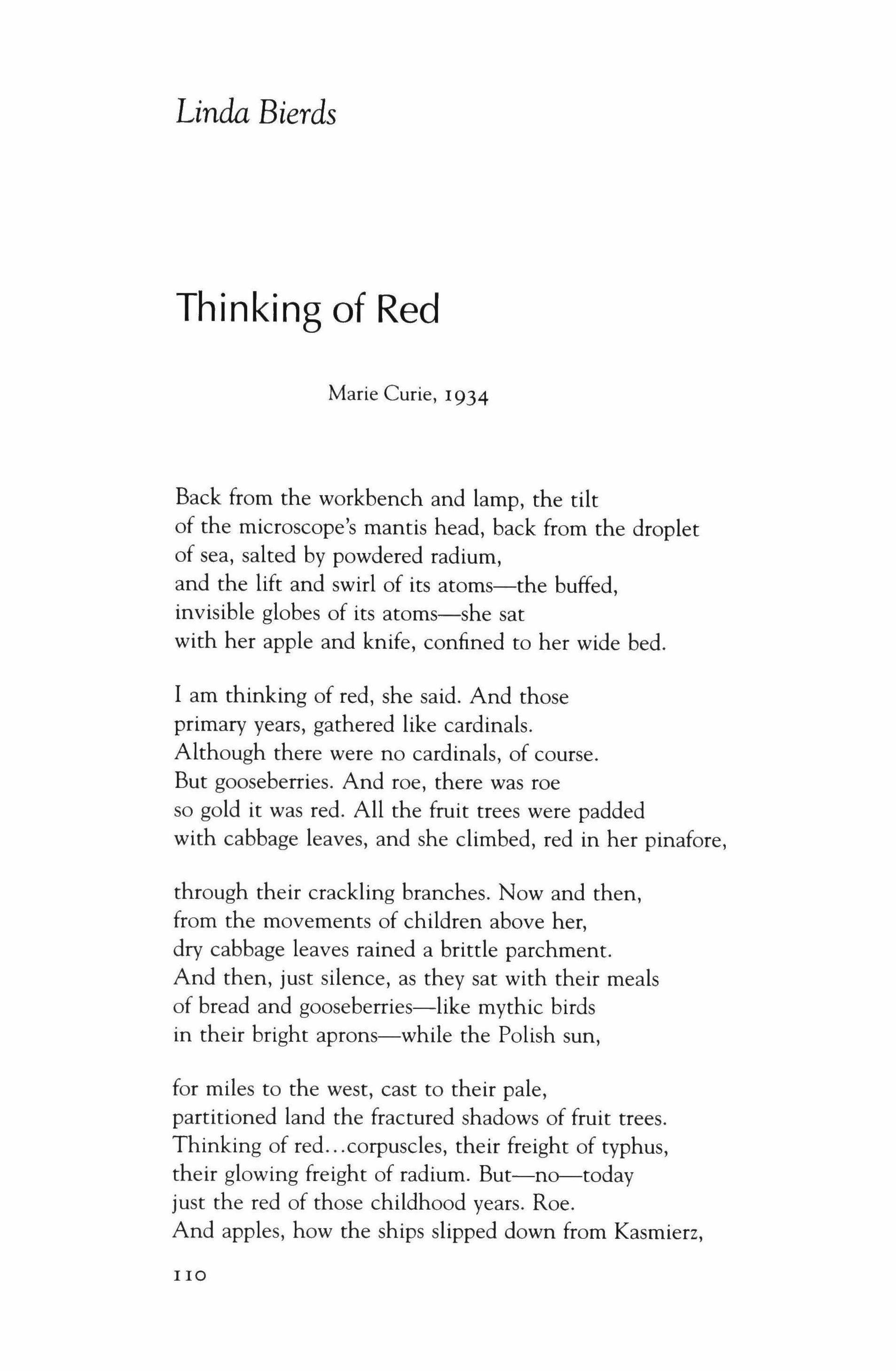
Thinking of Red
Marie Curie, 1934
Back from the workbench and lamp, the tilt of the microscope's mantis head, back from the droplet of sea, salted by powdered radium, and the lift and swirl of its atoms-the buffed, invisible globes of its atoms-she sat with her apple and knife, confined to her wide bed.
I am thinking of red, she said. And those primary years, gathered like cardinals. Although there were no cardinals, of course. But gooseberries. And roe, there was roe so gold it was red. All the fruit trees were padded with cabbage leaves, and she climbed, red in her pinafore,
through their crackling branches. Now and then, from the movements of children above her, dry cabbage leaves rained a brittle parchment. And then, just silence, as they sat with their meals of bread and gooseberries-like mythic birds in their bright aprons-while the Polish sun, for miles to the west, cast to their pale, partitioned land the fractured shadows of fruit trees. Thinking of red corpuscles, their freight of typhus, their glowing freight of radium. But-no---today just the red of those childhood years. Roe. And apples, how the ships slipped down from Kasmierz,
110
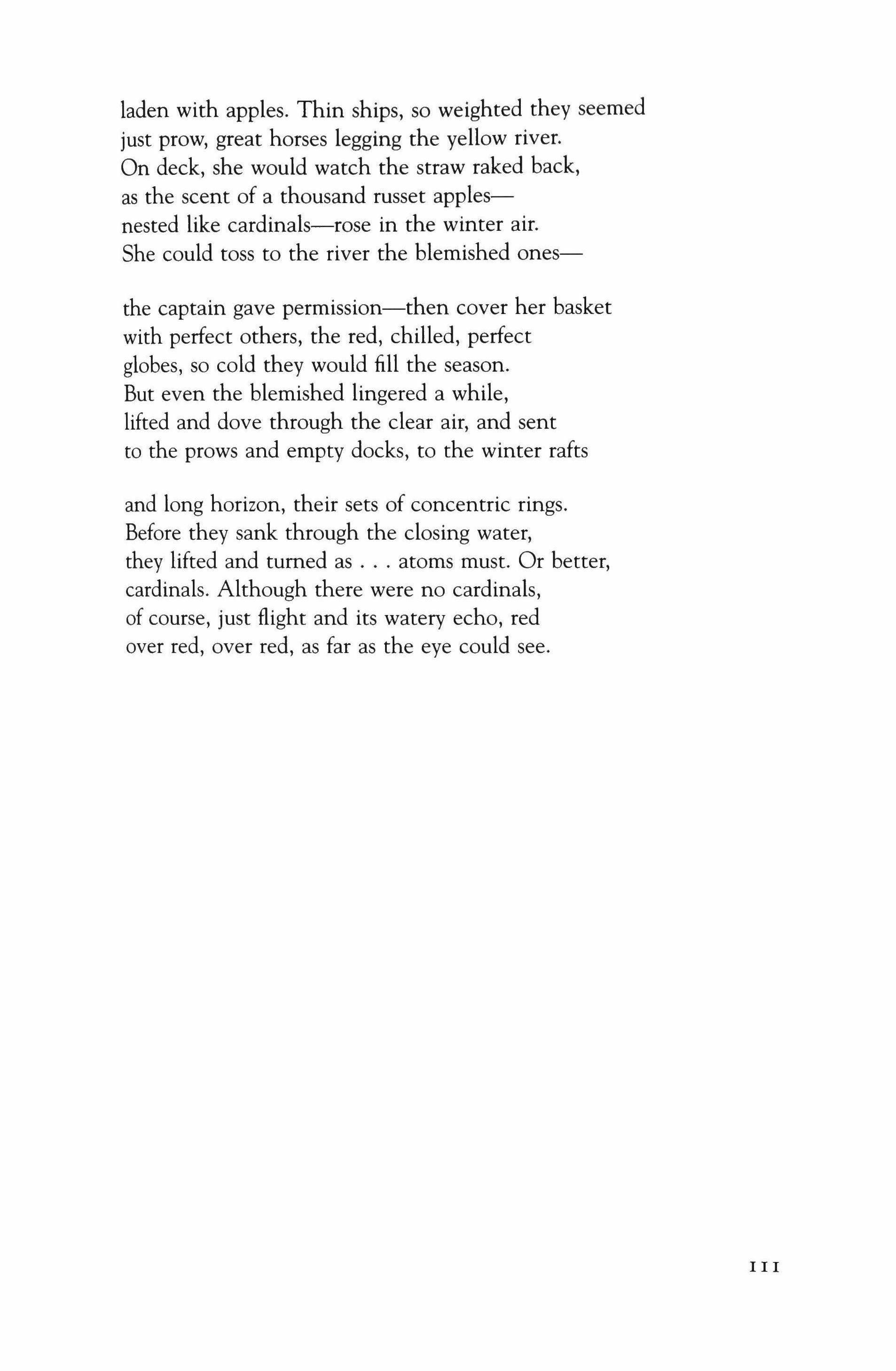
laden with apples. Thin ships, so weighted they seemed just prow, great horses legging the yellow river. On deck, she would watch the straw raked back, as the scent of a thousand russet applesnested like cardinals-rose in the winter air. She could toss to the river the blemished ones-
the captain gave permission-then cover her basket with perfect others, the red, chilled, perfect globes, so cold they would fill the season. But even the blemished lingered a while, lifted and dove through the clear air, and sent to the prows and empty docks, to the winter rafts
and long horizon, their sets of concentric rings. Before they sank through the closing water, they lifted and turned as atoms must. Or better, cardinals. Although there were no cardinals, of course, just flight and its watery echo, red over red, over red, as far as the eye could see.
III
Stroke
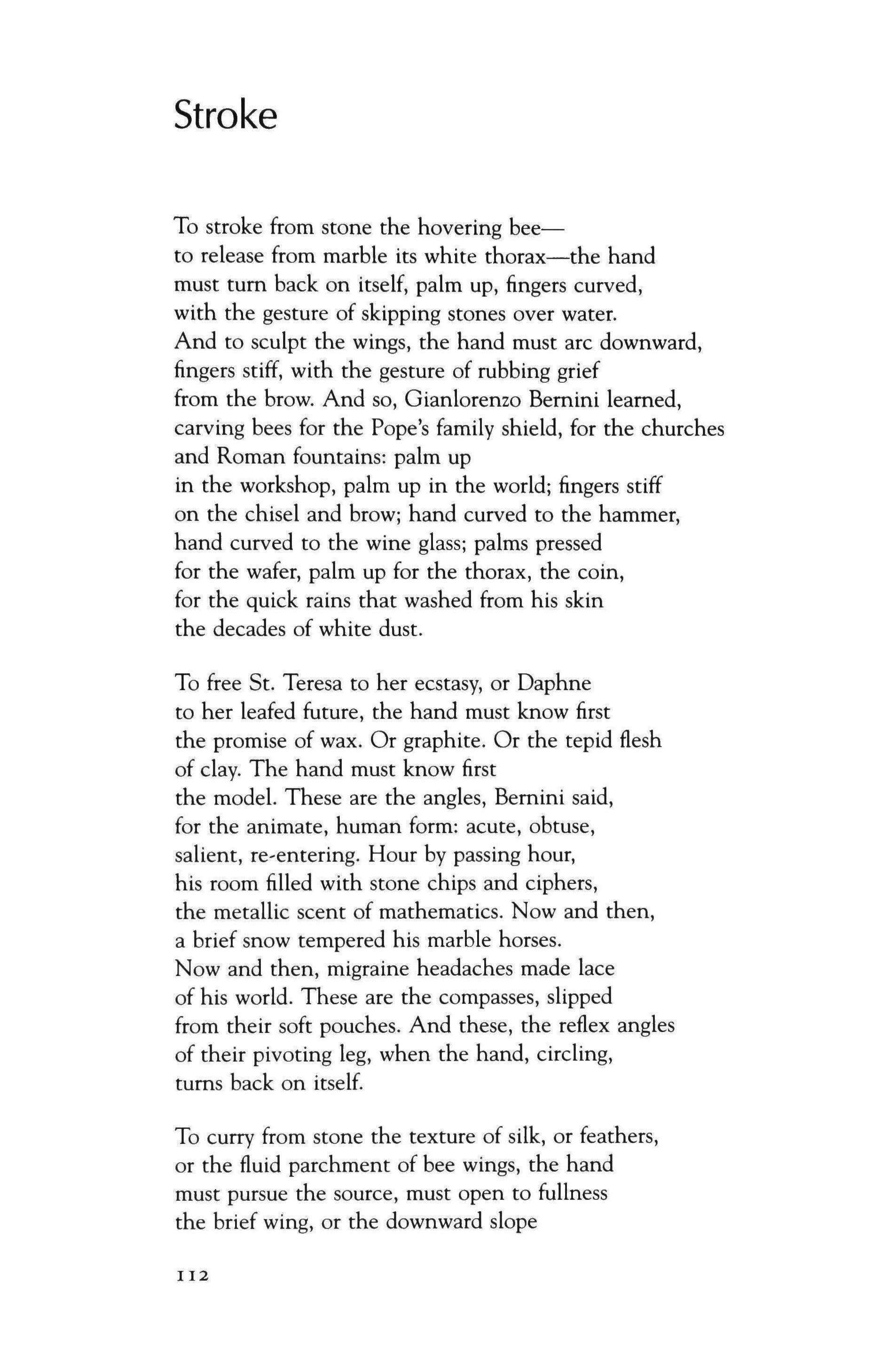
To stroke from stone the hovering beeto release from marble its white thorax-the hand must tum back on itself, palm up, fingers curved, with the gesture of skipping stones over water. And to sculpt the wings, the hand must arc downward, fingers stiff, with the gesture of rubbing grief from the brow. And so, Gianlorenzo Bernini learned, carving bees for the Pope's family shield, for the churches and Roman fountains: palm up in the workshop, palm up in the world; fingers stiff on the chisel and brow; hand curved to the hammer, hand curved to the wine glass; palms pressed for the wafer, palm up for the thorax, the coin, for the quick rains that washed from his skin the decades of white dust.
To free St. Teresa to her ecstasy, or Daphne to her leafed future, the hand must know first the promise of wax. Or graphite. Or the tepid flesh of clay. The hand must know first the model. These are the angles, Bernini said, for the animate, human form: acute, obtuse, salient, re-entering. Hour by passing hour, his room filled with stone chips and ciphers, the metallic scent of mathematics. Now and then, a brief snow tempered his marble horses. Now and then, migraine headaches made lace of his world. These are the compasses, slipped from their soft pouches. And these, the reflex angles of their pivoting leg, when the hand, circling, turns back on itself.
To curry from stone the texture of silk, or feathers, or the fluid parchment of bee wings, the hand must pursue the source, must open to fullness the brief wing, or the downward slope
112
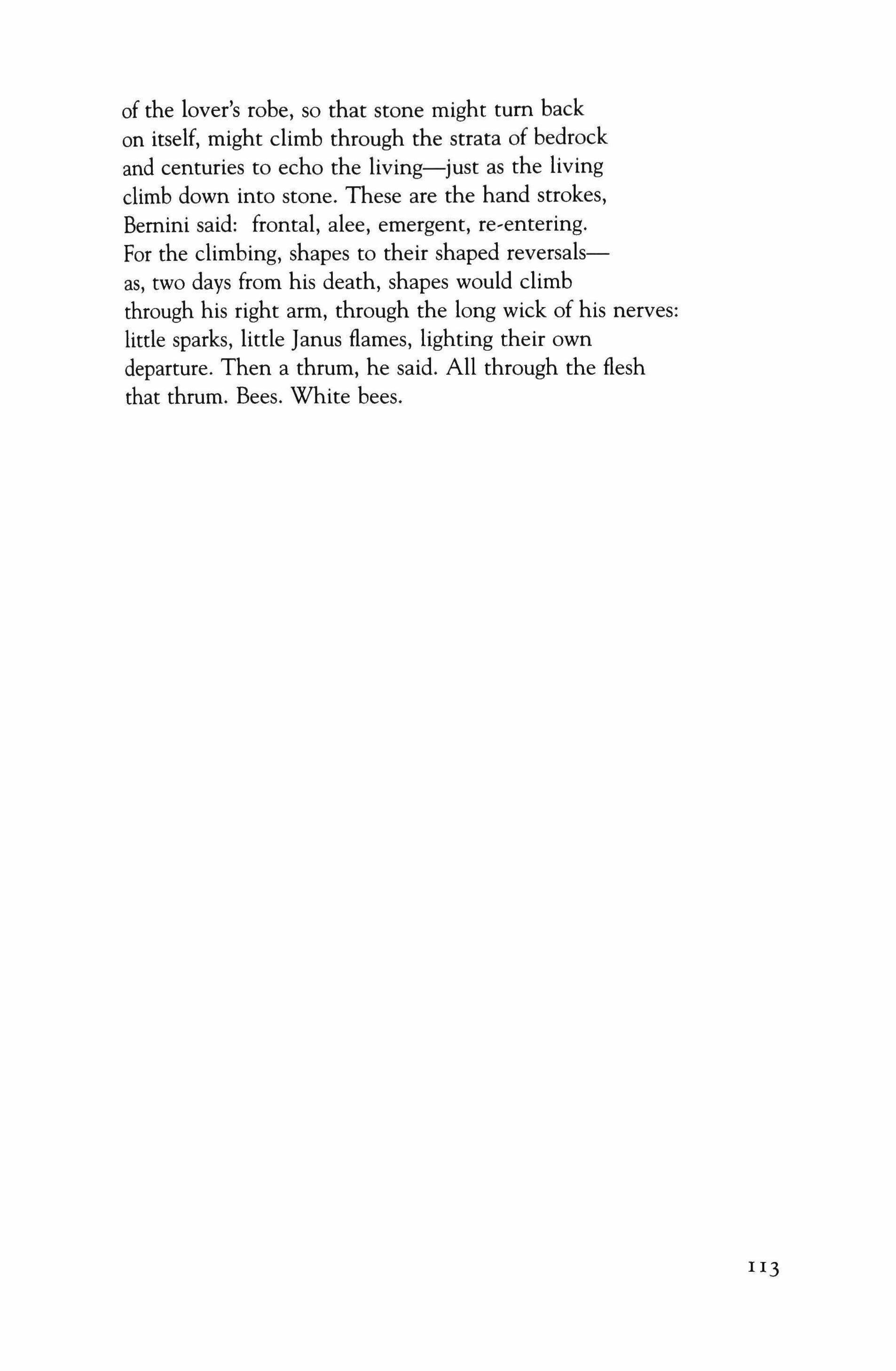
of the lover's robe, so that stone might tum back on itself, might climb through the strata of bedrock and centuries to echo the living-just as the living climb down into stone. These are the hand strokes, Bernini said: frontal, alee, emergent, re-entering. For the climbing, shapes to their shaped reversalsas, two days from his death, shapes would climb through his right arm, through the long wick of his nerves: little sparks, little Janus flames, lighting their own departure. Then a thrum, he said. All through the flesh that thrum. Bees. White bees.
II3
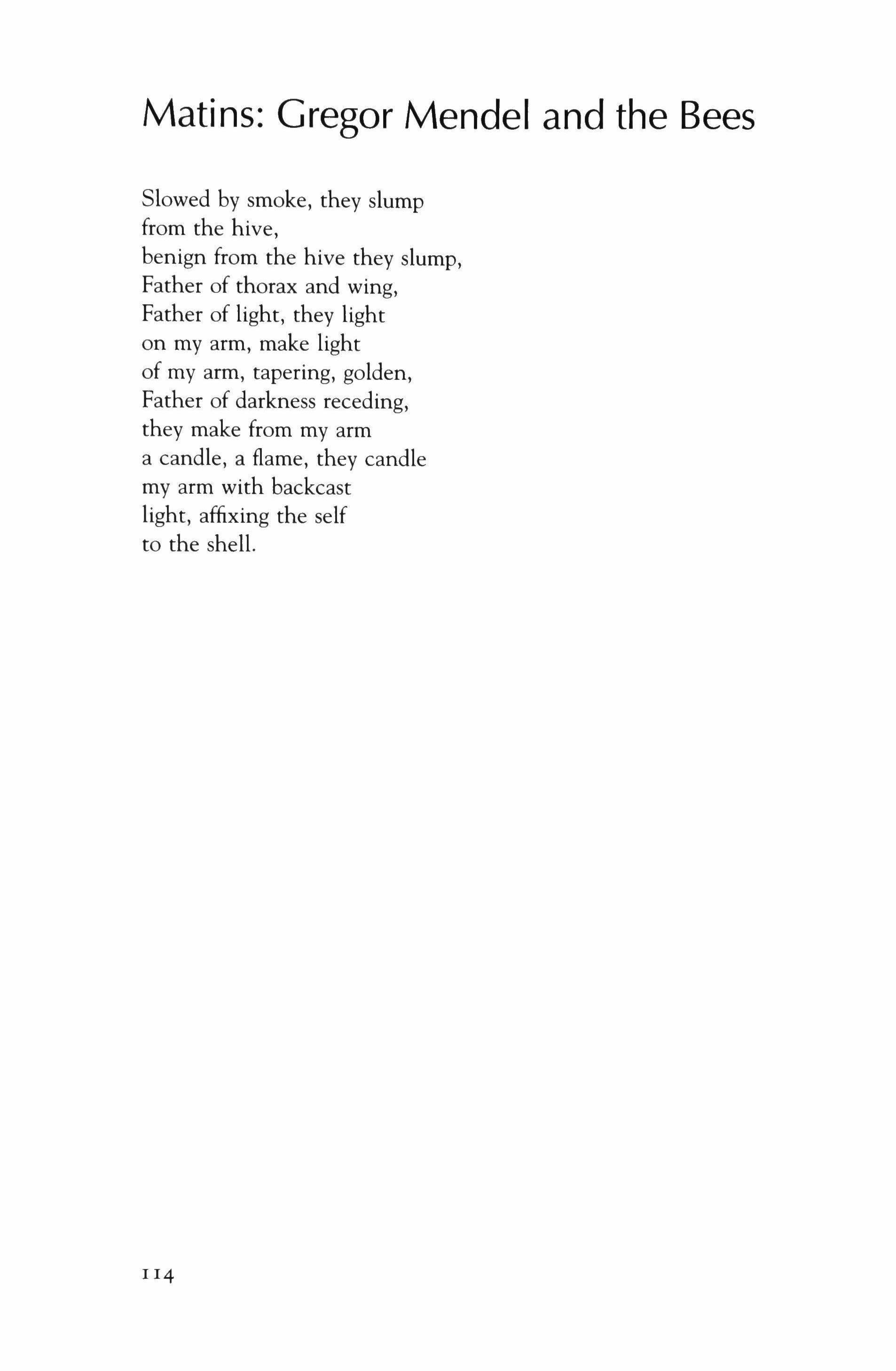
Matins: Gregor Mendel and the Bees
Slowed by smoke, they slump from the hive, benign from the hive they slump, Father of thorax and wing, Father of light, they light on my arm, make light of my arm, tapering, golden, Father of darkness receding, they make from my arm a candle, a flame, they candle my arm with backcast light, affixing the self to the shell.
114
Stanley Plumly
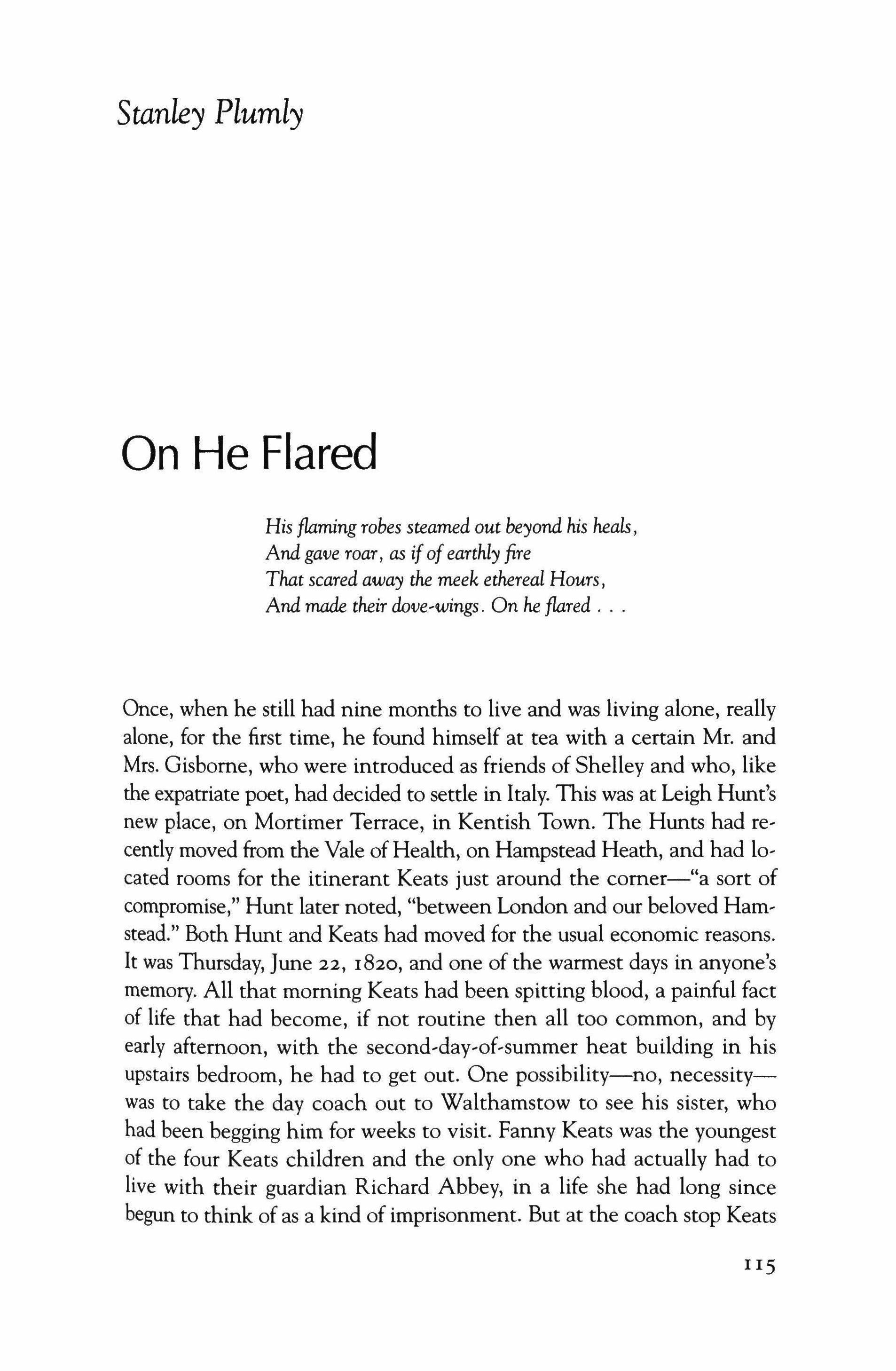
On He Flared
His flaming robes steamed out beyond his heals, And gave roar, as ifofearthly fire
That scared away the meek ethereal Hours, And made their dove,wings. On he flared
Once, when he still had nine months to live and was living alone, really alone, for the first time, he found himself at tea with a certain Mr. and Mrs. Gisborne, who were introduced as friends of Shelley and who, like the expatriate poet, had decided to settle in Italy. This was at Leigh Hunt's new place, on Mortimer Terrace, in Kentish Town. The Hunts had recently moved from the Vale of Health, on Hampstead Heath, and had 10' cated rooms for the itinerant Keats just around the comer-"a sort of compromise," Hunt later noted, "between London and our beloved Ham, stead." Both Hunt and Keats had moved for the usual economic reasons. It was Thursday, June 22, 1820, and one of the warmest days in anyone's memory. All that morning Keats had been spitting blood, a painful fact of life that had become, if not routine then all too common, and by early afternoon, with the second-day-of-summer heat building in his upstairs bedroom, he had to get out. One possibility-no, necessitywas to take the day coach out to Walthamstow to see his sister, who had been begging him for weeks to visit. Fanny Keats was the youngest of the four Keats children and the only one who had actually had to live with their guardian Richard Abbey, in a life she had long since begun to think of as a kind of imprisonment. But at the coach stop Keats
115
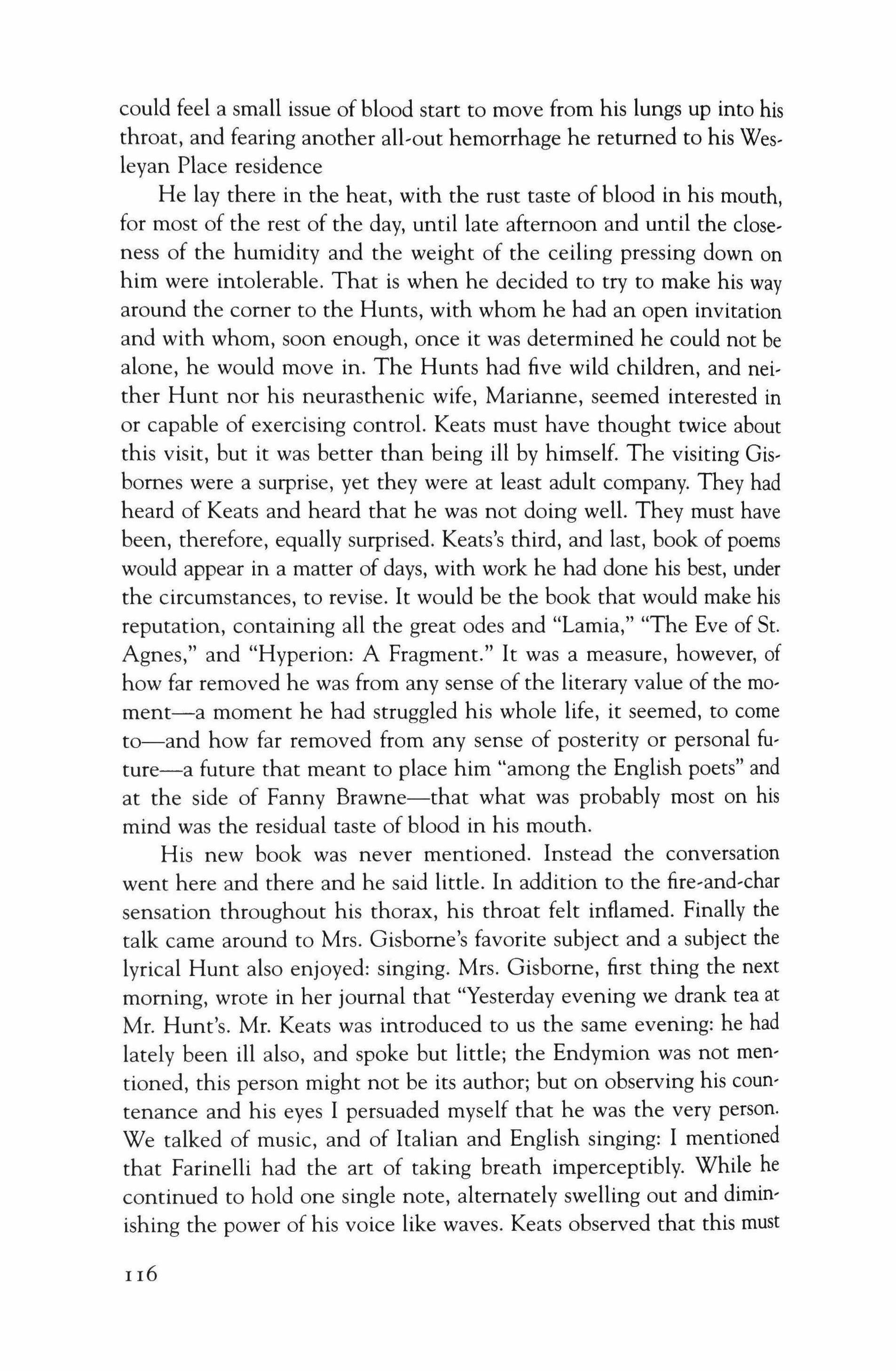
could feel a small issue of blood start to move from his lungs up into his throat, and fearing another all-out hemorrhage he returned to his Wesleyan Place residence
He lay there in the heat, with the rust taste of blood in his mouth, for most of the rest of the day, until late afternoon and until the closeness of the humidity and the weight of the ceiling pressing down on him were intolerable. That is when he decided to try to make his way around the comer to the Hunts, with whom he had an open invitation and with whom, soon enough, once it was determined he could not be alone, he would move in. The Hunts had five wild children, and neither Hunt nor his neurasthenic wife, Marianne, seemed interested in or capable of exercising control. Keats must have thought twice about this visit, but it was better than being ill by himself. The visiting Gisbornes were a surprise, yet they were at least adult company. They had heard of Keats and heard that he was not doing well. They must have been, therefore, equally surprised. Keats's third, and last, book of poems would appear in a matter of days, with work he had done his best, under the circumstances, to revise. It would be the book that would make his reputation, containing all the great odes and "Lamia," "The Eve of St. Agnes," and "Hyperion: A Fragment." It was a measure, however, of how far removed he was from any sense of the literary value of the moment-a moment he had struggled his whole life, it seemed, to come to-and how far removed from any sense of posterity or personal future-a future that meant to place him "among the English poets" and at the side of Fanny Brawne-that what was probably most on his mind was the residual taste of blood in his mouth.
His new book was never mentioned. Instead the conversation went here and there and he said little. In addition to the fire-and-char sensation throughout his thorax, his throat felt inflamed. Finally the talk came around to Mrs. Gisborne's favorite subject and a subject the lyrical Hunt also enjoyed: singing. Mrs. Gisborne, first thing the next morning, wrote in her journal that "Yesterday evening we drank tea at Mr. Hunt's. Mr. Keats was introduced to us the same evening: he had lately been ill also, and spoke but little; the Endymion was not mentioned, this person might not be its author; but on observing his countenance and his eyes I persuaded myself that he was the very person. We talked of music, and of Italian and English singing: I mentioned that Farinelli had the art of taking breath imperceptibly. While he continued to hold one single note, alternately swelling out and diminishing the power of his voice like waves. Keats observed that this must
116

in some degree be painful to the hearer, as when a diver descends into the hidden depths of the sea you feel an apprehension lest he may never rise again. These may not be his exact words as he spoke in a low tone."
Keats likely hardly pronounced the words at all-they must have come out of his mouth almost involuntarily, considering the narrative of the day so far. That night, back in the isolation of his rooms, which still felt airtight even with the windows open, he had his second major pulmonary attack. This time, unlike the winter hemorrhage at Wentworth Place, the blood was coagulate and dark and boiled in his throat in such a way he was afraid he might suffocate, or drown. The convulsions, which came in waves, seemed to shake his very heart loose from its foundations. He survived the night, though more than ever "under sentence of death from Dr. Lamb." 2
Mrs. Gisborne, with her polite but objective eye, added as a postscript to her journal entry that Keats looked "emaciated"-from the Latin einacuuus, meaning to waste away, which, in the early nineteenth century, meant consumption. The wasting diseases covered just about every form of slow death, including various cancers and syphilis, ulcers and bronchitis, depression and generic nervous disorders. It was not until the I84os-decades after Keats's death-that consumption and the symptoms of tuberculosis became synonymous, though the tubercle bacillus itself was not identified until I882. The emaciation usually registered at first in the face. Mrs. Gisborne, new on the scene, could see in the ghost face of Keats the consequence of a year or more of wasting, while it might have been less obvious to someone seeing Keats on a more or less daily basis. Even so, in his worst moments, when the blood seemed literally to drain from his look, friends like Joseph Severn, who had drawn and painted Keats more than once, and Charles Brown, who had drawn him best, were concerned at his alternately flushed and blanched appearance. They had been concerned for some time. As early as the autumn before Keats's last summer in London, Severn had noted that he "seemed well neither in mind nor body."
And as early as the summer before the encounter with the Gisbornes, the summer "o'er-brimmed," the summer of I8I9, between the great spring odes and the great ode "To Autumn," Charles Brown, in his famous accurate rendering of Keats's right profile with a full pugilist's fist tucked at the cheek, captures something of the fatigue that was already
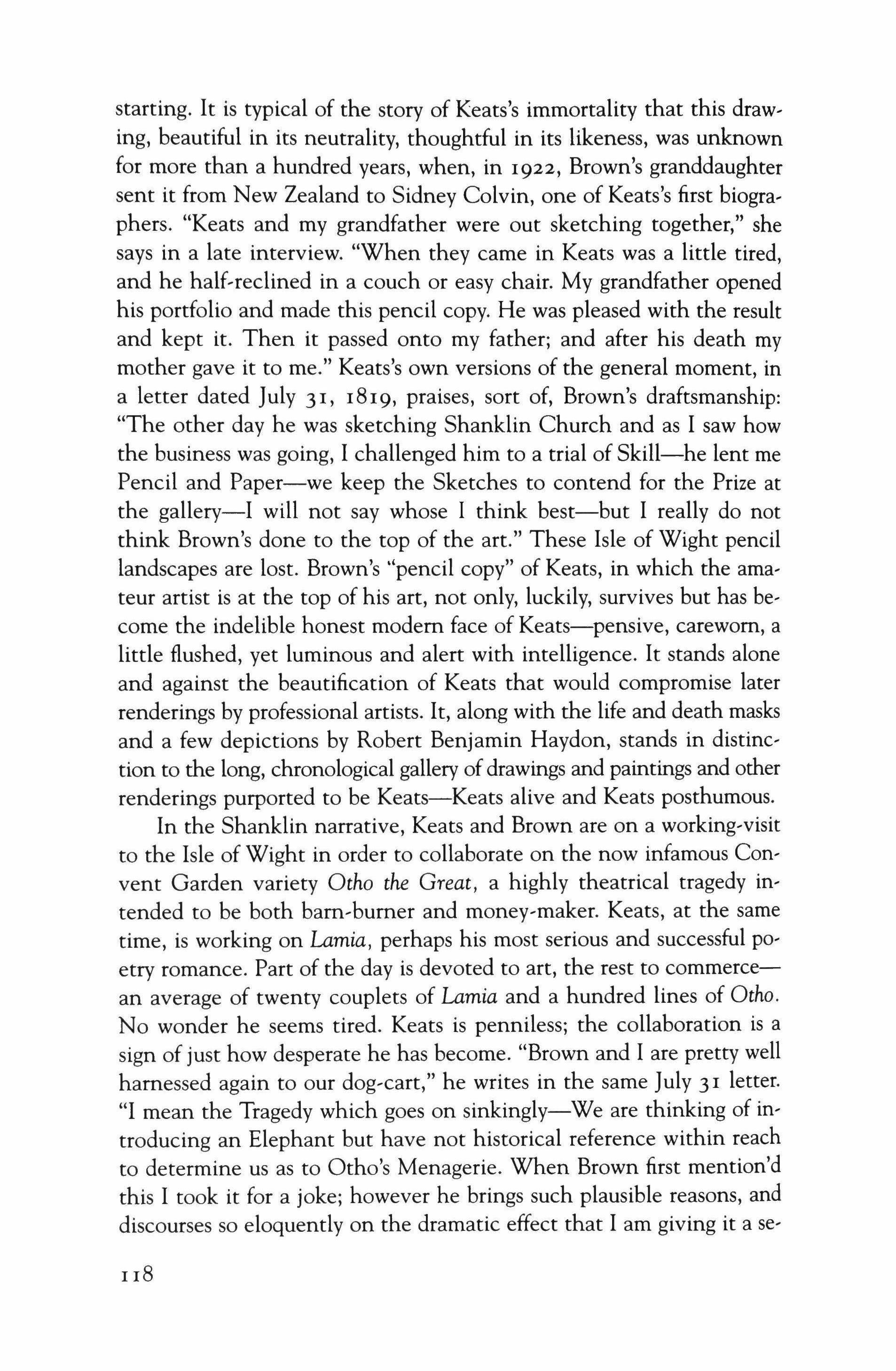
starting. It is typical of the story of Keats's immortality that this drawing, beautiful in its neutrality, thoughtful in its likeness, was unknown for more than a hundred years, when, in 1922, Brown's granddaughter sent it from New Zealand to Sidney Colvin, one of Keats's first biographers. "Keats and my grandfather were out sketching together," she says in a late interview. "When they came in Keats was a little tired, and he half-reclined in a couch or easy chair. My grandfather opened his portfolio and made this pencil copy. He was pleased with the result and kept it. Then it passed onto my father; and after his death my mother gave it to me." Keats's own versions of the general moment, in a letter dated July 31, 1819, praises, sort of, Brown's draftsmanship: "The other day he was sketching Shanklin Church and as I saw how the business was going, I challenged him to a trial of Skill-he lent me Pencil and Paper-we keep the Sketches to contend for the Prize at the gallery-I will not say whose I think best-but I really do not think Brown's done to the top of the art." These Isle of Wight pencil landscapes are lost. Brown's "pencil copy" of Keats, in which the amateur artist is at the top of his art, not only, luckily, survives but has become the indelible honest modem face of Keats-pensive, careworn, a little flushed, yet luminous and alert with intelligence. It stands alone and against the beautification of Keats that would compromise later renderings by professional artists. It, along with the life and death masks and a few depictions by Robert Benjamin Haydon, stands in distinction to the long, chronological gallery ofdrawings and paintings and other renderings purported to be Keats-Keats alive and Keats posthumous. In the Shanklin narrative, Keats and Brown are on a working-visit to the Isle of Wight in order to collaborate on the now infamous Convent Garden variety Otho the Great, a highly theatrical tragedy intended to be both bam-burner and money-maker, Keats, at the same time, is working on Lamia, perhaps his most serious and successful poetry romance. Part of the day is devoted to art, the rest to commercean average of twenty couplets of Lamia and a hundred lines of Otho. No wonder he seems tired. Keats is penniless; the collaboration is a sign of just how desperate he has become. "Brown and I are pretty well harnessed again to our dog-cart," he writes in the same July 31 letter. "I mean the Tragedy which goes on sinkingly-We are thinking of introducing an Elephant but have not historical reference within reach to determine us as to Otho's Menagerie. When Brown first mention'd this I took it for a joke; however he brings such plausible reasons, and discourses so eloquently on the dramatic effect that I am giving it a se-
118
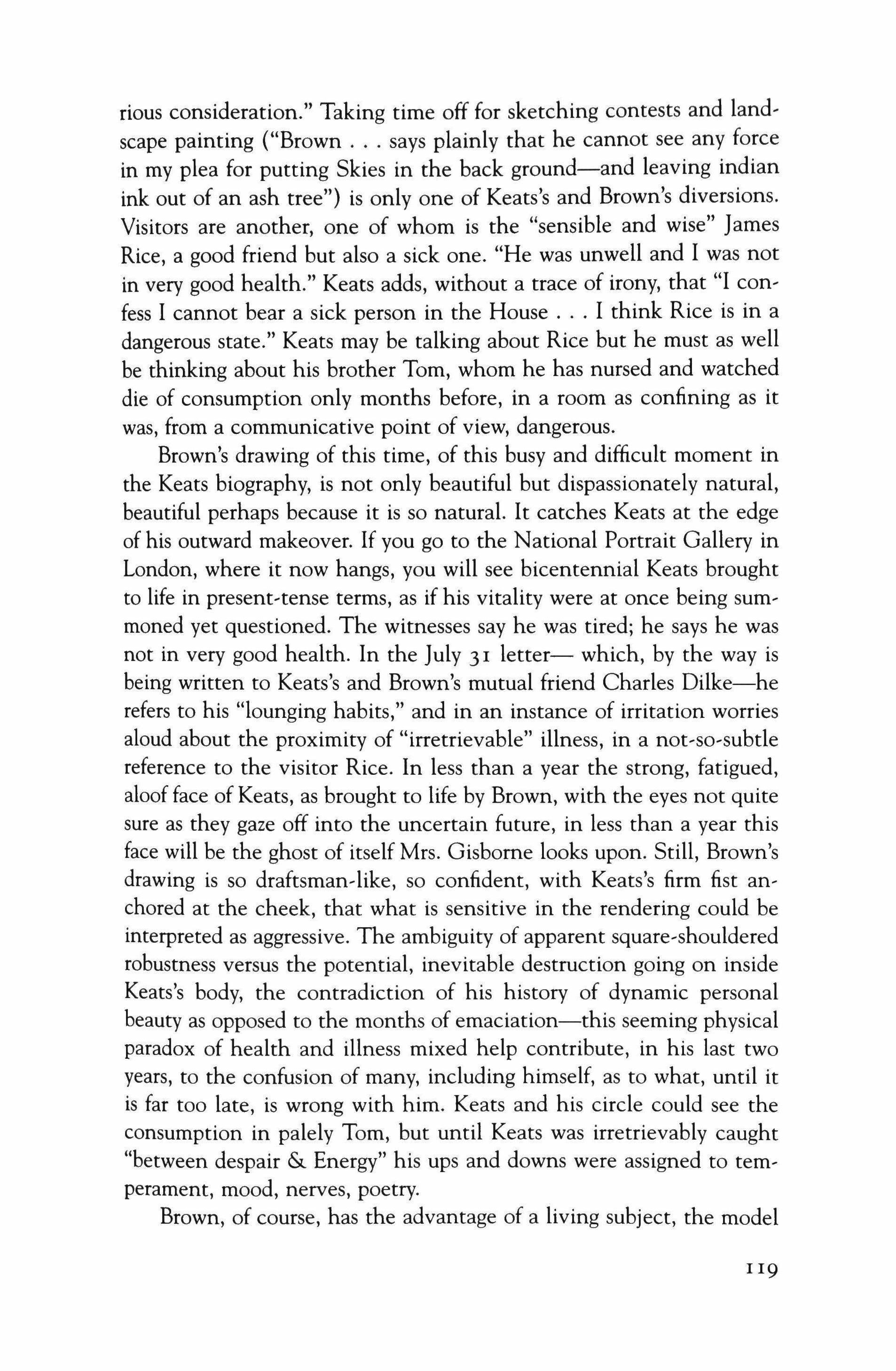
rious consideration." Taking time off for sketching contests and landscape painting {"Brown says plainly that he cannot see any force in my plea for putting Skies in the back ground-and leaving indian ink out of an ash tree"} is only one of Keats's and Brown's diversions. Visitors are another, one of whom is the "sensible and wise" James Rice, a good friend but also a sick one. "He was unwell and I was not in very good health." Keats adds, without a trace of irony, that "I confess I cannot bear a sick person in the House I think Rice is in a dangerous state." Keats may be talking about Rice but he must as well be thinking about his brother Tom, whom he has nursed and watched die of consumption only months before, in a room as confining as it was, from a communicative point of view, dangerous.
Brown's drawing of this time, of this busy and difficult moment in the Keats biography, is not only beautiful but dispassionately natural, beautiful perhaps because it is so natural. It catches Keats at the edge of his outward makeover. If you go to the National Portrait Gallery in London, where it now hangs, you will see bicentennial Keats brought to life in present-tense terms, as if his vitality were at once being summoned yet questioned. The witnesses say he was tired; he says he was not in very good health. In the July 3 I letter- which, by the way is being written to Keats's and Brown's mutual friend Charles Dilke-he refers to his "lounging habits," and in an instance of irritation worries aloud about the proximity of "irretrievable" illness, in a not-so-subtle reference to the visitor Rice. In less than a year the strong, fatigued, aloof face of Keats, as brought to life by Brown, with the eyes not quite sure as they gaze off into the uncertain future, in less than a year this face will be the ghost of itself Mrs. Gisbome looks upon. Still, Brown's drawing is so draftsman-like, so confident, with Keats's firm fist anchored at the cheek, that what is sensitive in the rendering could be interpreted as aggressive. The ambiguity of apparent square-shouldered robustness versus the potential, inevitable destruction going on inside Keats's body, the contradiction of his history of dynamic personal beauty as opposed to the months of emaciation-this seeming physical paradox of health and illness mixed help contribute, in his last two years, to the confusion of many, including himself, as to what, until it is far too late, is wrong with him. Keats and his circle could see the consumption in palely Tom, but until Keats was irretrievably caught "between despair & Energy" his ups and downs were assigned to ternperament, mood, nerves, poetry.
Brown, of course, has the advantage of a living subject, the model
119
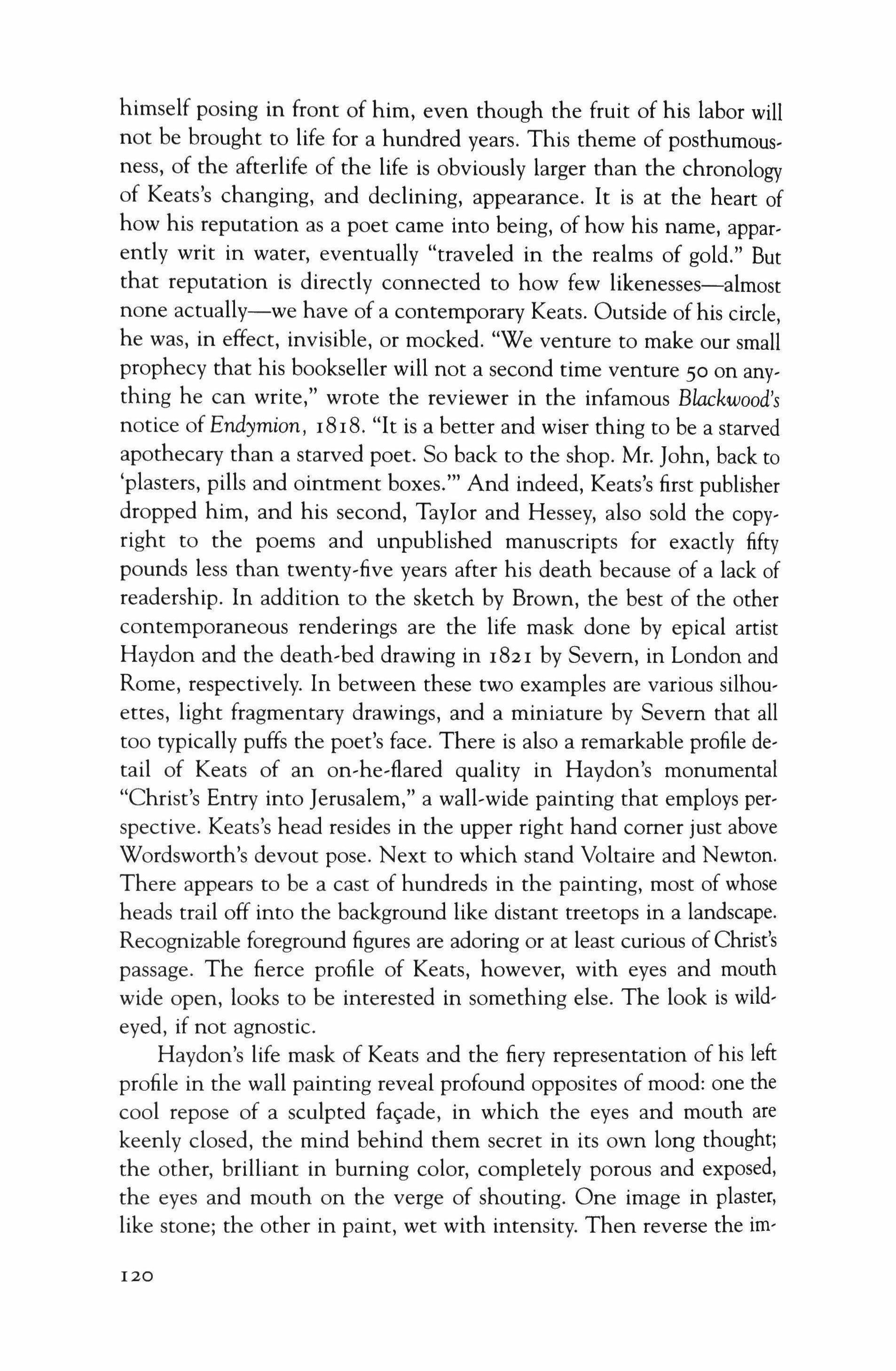
himself posing in front of him, even though the fruit of his labor will not be brought to life for a hundred years. This theme of posthumousness, of the afterlife of the life is obviously larger than the chronology of Keats's changing, and declining, appearance. It is at the heart of how his reputation as a poet came into being, of how his name, apparently writ in water, eventually "traveled in the realms of gold." But that reputation is directly connected to how few likenesses-almost none actually-we have of a contemporary Keats. Outside of his circle, he was, in effect, invisible, or mocked. "We venture to make our small prophecy that his bookseller will not a second time venture 50 on anything he can write," wrote the reviewer in the infamous Blackwood's notice of Endymion, 1818. "It is a better and wiser thing to be a starved apothecary than a starved poet. So back to the shop. Mr. John, back to 'plasters, pills and ointment boxes.'" And indeed, Keats's first publisher dropped him, and his second, Taylor and Hessey, also sold the copyright to the poems and unpublished manuscripts for exactly fifty pounds less than twenty-five years after his death because of a lack of readership. In addition to the sketch by Brown, the best of the other contemporaneous renderings are the life mask done by epical artist Haydon and the death-bed drawing in 1821 by Severn, in London and Rome, respectively. In between these two examples are various silhouettes, light fragmentary drawings, and a miniature by Severn that all too typically puffs the poet's face. There is also a remarkable profile detail of Keats of an on-he-flared quality in Haydon's monumental "Christ's Entry into Jerusalem," a wall-wide painting that employs perspective. Keats's head resides in the upper right hand comer just above Wordsworth's devout pose. Next to which stand Voltaire and Newton. There appears to be a cast of hundreds in the painting, most of whose heads trail off into the background like distant treetops in a landscape. Recognizable foreground figures are adoring or at least curious of Christ's passage. The fierce profile of Keats, however, with eyes and mouth wide open, looks to be interested in something else. The look is wildeyed, if not agnostic.
Haydon's life mask of Keats and the fiery representation of his left profile in the wall painting reveal profound opposites of mood: one the cool repose of a sculpted facade, in which the eyes and mouth are keenly closed, the mind behind them secret in its own long thought; the other, brilliant in burning color, completely porous and exposed, the eyes and mouth on the verge of shouting. One image in plaster, like stone; the other in paint, wet with intensity. Then reverse the im-
120
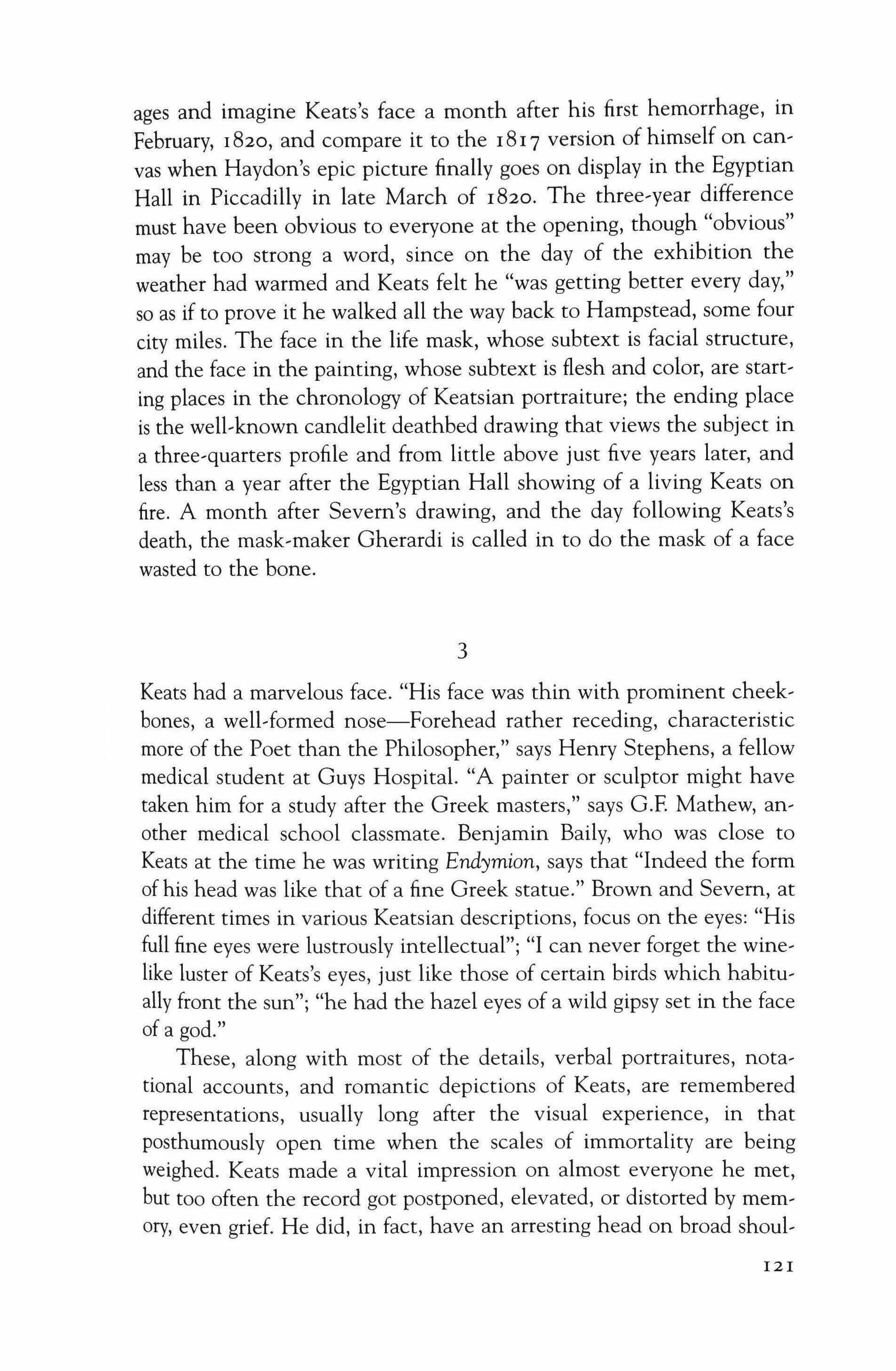
ages and imagine Keats's face a month after his first hemorrhage, in February, 1820, and compare it to the 1817 version of himself on canvas when Haydon's epic picture finally goes on display in the Egyptian Hall in Piccadilly in late March of 1820. The three-year difference must have been obvious to everyone at the opening, though "obvious" may be too strong a word, since on the day of the exhibition the weather had warmed and Keats felt he "was getting better every day," so as if to prove it he walked all the way back to Hampstead, some four city miles. The face in the life mask, whose subtext is facial structure, and the face in the painting, whose subtext is flesh and color, are starting places in the chronology of Keatsian portraiture; the ending place is the well-known candlelit deathbed drawing that views the subject in a three-quarters profile and from little above just five years later, and less than a year after the Egyptian Hall showing of a living Keats on fire. A month after Severn's drawing, and the day following Keats's death, the mask-maker Gherardi is called in to do the mask of a face wasted to the bone.
3
Keats had a marvelous face. "His face was thin with prominent cheekbones, a well-formed nose-Forehead rather receding, characteristic more of the Poet than the Philosopher," says Henry Stephens, a fellow medical student at Guys Hospital. "A painter or sculptor might have taken him for a study after the Greek masters," says G.F. Mathew, another medical school classmate. Benjamin Baily, who was close to Keats at the time he was writing Endymion, says that "Indeed the form of his head was like that of a fine Greek statue." Brown and Severn, at different times in various Keatsian descriptions, focus on the eyes: "His full fine eyes were lustrously intellectual"; "I can never forget the winelike luster of Keats's eyes, just like those of certain birds which habitually front the sun"; "he had the hazel eyes of a wild gipsy set in the face of a god."
These, along with most of the details, verbal portraitures, notational accounts, and romantic depictions of Keats, are remembered representations, usually long after the visual experience, in that posthumously open time when the scales of immortality are being weighed. Keats made a vital impression on almost everyone he met, but too often the record got postponed, elevated, or distorted by memory, even grief. He did, in fact, have an arresting head on broad shoul121

ders, a face of dynamic yet sensitive features, and a carriage that suggested a military bearing. His light eyes must have seemed like sources of light, his auburn hair golden. He had a temper and a keen sense of justice, qualities that must have underscored his intensity as well as his warmth. He gave off an energy much larger than his size, which was, by measure, a flat sixty and a half inches.
Such impressions reinforce the value of Brown's Shaklin drawing and Haydon's studio life mask and painted profile; they help flesh out the mortal record, the singular moment. They not only render but enhance the life at hand, and evoke the "high-rnmdedness," the "terrier courage," so many of his early friends speak of. Keats's younger brother George, some while after his death, writes of him as a hero: "John's eyes moistened and his lip quivered at the relation of any tale of generosity of benevolence or noble daring or at sights of loveliness or distress-he had no fears of self thro interference in the quarrels of others, he would at all hazards, without calculating his power to defend, or his reward for the deed, defend the oppressed." Memoir memory, however, is no substitute for the living picture, the eidetic image of Keats at rest or in motion, whether at the beginning, with Haydon's renderings, at the midpoint, with Brown's, or at the close of his life with Severn's first-hand study of the final days in Rome. Severn's journal prose sets the scene that has been replayed in every biography since the middle of the nineteenth century. "He remained quiet to the end, which made the death-summons more terrible He died with the most perfect ease. He seemed to go to sleep. On the 23rd, Friday, at half past four, the approach of death came on. 'Severn-I-lift me up, for I am dying. I shall die easy. Don't be frightened! Thank god it has come.' I lifted him up in my arms, and the phlegm seemed boiling in his throat. This increased until eleven at night, when he gradually sank into death, so quiet, that I still thought he slept." Somewhere in those empty, sleepless hours between late night and the hour before dawn, Severn did his charcoal drawing of the slightly propped head of Keats, a rendering remarkable enough on its own but made infinitely more so when compared to Severn's other, and later, attempts to create a Keats from memory.
One key to the drawing, whose original hangs in the Keats-Shelley Museum in Rome, is that it is not immediately clear Keats is sleeping or in fact has passed. The ambiguity, by Severn's own testimony, serves the power of the moment. Keats is certainly dying, but the event of it has been so extended in time, through months and months of
122
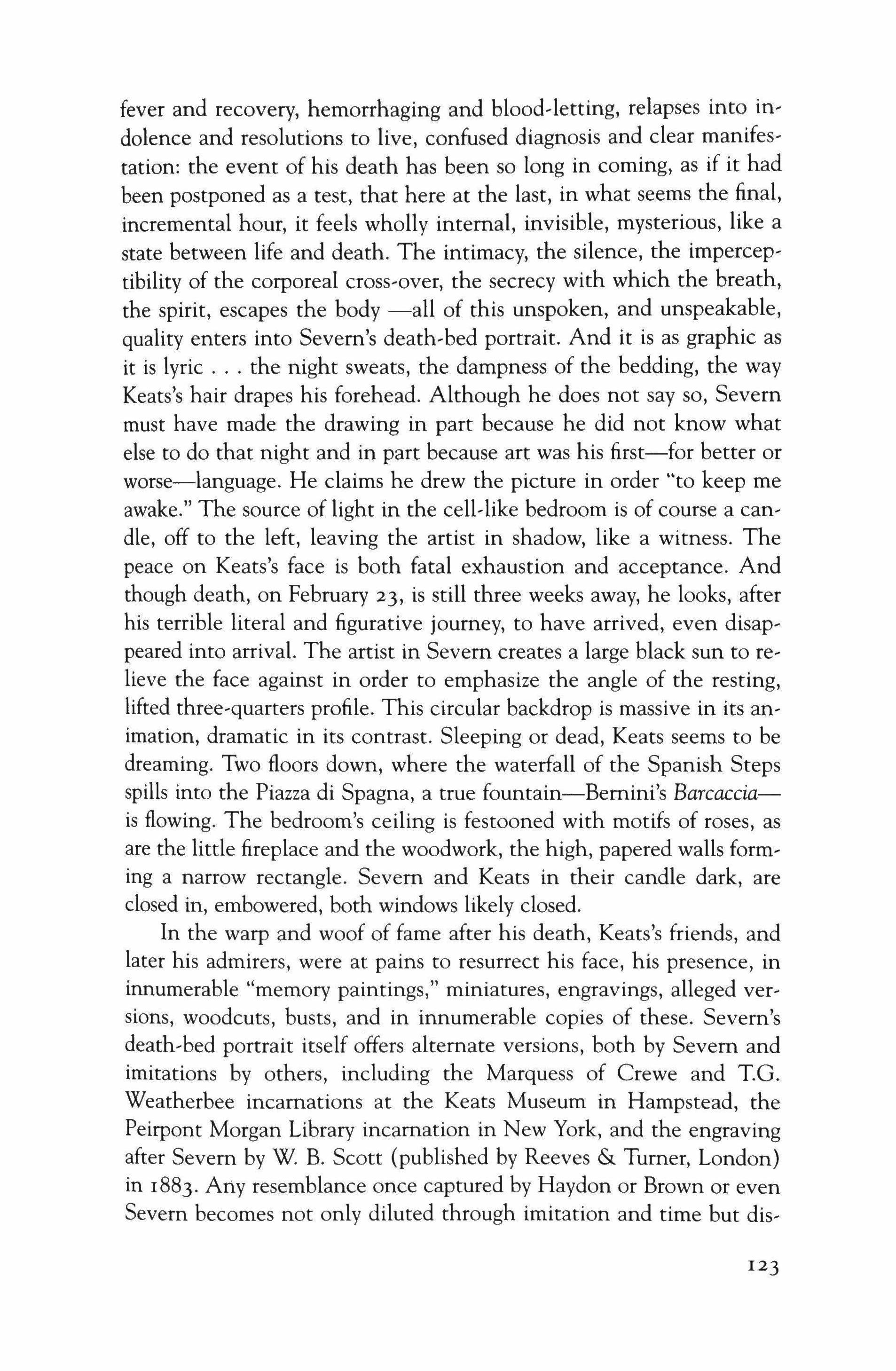
fever and recovery, hemorrhaging and blood,letting, relapses into in' dolence and resolutions to live, confused diagnosis and clear manifestation: the event of his death has been so long in coming, as if it had been postponed as a test, that here at the last, in what seems the final, incremental hour, it feels wholly internal, invisible, mysterious, like a state between life and death. The intimacy, the silence, the imperceptibility of the corporeal cross-over, the secrecy with which the breath, the spirit, escapes the body -all of this unspoken, and unspeakable, quality enters into Severn's death-bed portrait. And it is as graphic as it is lyric the night sweats, the dampness of the bedding, the way Keats's hair drapes his forehead. Although he does not say so, Severn must have made the drawing in part because he did not know what else to do that night and in part because art was his first-for better or worse-language. He claims he drew the picture in order "to keep me awake." The source of light in the cell,like bedroom is of course a can' dle, off to the left, leaving the artist in shadow, like a witness. The peace on Keats's face is both fatal exhaustion and acceptance. And though death, on February 23, is still three weeks away, he looks, after his terrible literal and figurative journey, to have arrived, even disappeared into arrival. The artist in Severn creates a large black sun to relieve the face against in order to emphasize the angle of the resting, lifted three-quarters profile. This circular backdrop is massive in its animation, dramatic in its contrast. Sleeping or dead, Keats seems to be dreaming. Two floors down, where the waterfall of the Spanish Steps spills into the Piazza di Spagna, a true fountain-Bernini's Barcacciais flowing. The bedroom's ceiling is festooned with motifs of roses, as are the little fireplace and the woodwork, the high, papered walls form, ing a narrow rectangle. Severn and Keats in their candle dark, are closed in, embowered, both windows likely closed.
In the warp and woof of fame after his death, Keats's friends, and later his admirers, were at pains to resurrect his face, his presence, in innumerable "memory paintings," miniatures, engravings, alleged versions, woodcuts, busts, and in innumerable copies of these. Severn's death-bed portrait itself offers alternate versions, both by Severn and imitations by others, including the Marquess of Crewe and T.O. Weatherbee incarnations at the Keats Museum in Hampstead, the Peirpont Morgan Library incarnation in New York, and the engraving after Severn by W. B. Scott {published by Reeves & Turner, London} in 1883. Arty resemblance once captured by Haydon or Brown or even Severn becomes not only diluted through imitation and time but dis,
123

torted by assumption. This, in fact, is more true of the living Keats than the dying Keats. Death demands a certain reality; the life of the individual, though, invites projection. Keats's posthumous face, therefore, becomes more and more anonymous under a palimpsest of erasure and approximation, intention and attenuation, so that by the end of the nineteenth century it is not so much Keats who is being represented in the Mary Newton "portrait" and the Edmund Sullivan engraving or the George Henry Harlow Lawrence School portrait and the W. L. Culls or H. Davidson engraving of Severn's so-called "Lost Portrait" as it is an idealization of the sensitive, dew-eyed poet. Generic and saleable, an imposed Victorianized idea of what a poet should look like. The various heads and busts of Keats, leading well into the twentieth century, achieved by such artists as Patrick MacDowell, Sidney Waugh, Anne Whitney, and Malvina Hoffman, are no less problematic if sometimes more effective: in some hands Keats looks like a child, in others a man well past Keats's twenty-five years. Each of them, like the posthumous drawings, etchings, and paintings, perpetuates an immortalized, generalized Keats.
There is no substitute for the living model nor alternative to talent. Sometimes even a good artist reads into his subject. Compare, for example, the several engravings based on the now lost chalk drawing sketched from life by William Hilton in 1819 in Keats's publisher's office. Severn, Hilton's contemporary and competitor, never liked the "sneaking fellow" it made of Keats's honest face. Since we do not have the original drawing to collaborate, we have to rely on the imitatorsCharles Wass, F. Croll, and P. Kramer-whose versions are consistent one to the other but totally out of sync with the eventual portrait Hilton completed some ten years later. The engravings give Keats a precise and pretty look, a Byronic lordly elegance he never had nor wished to. Hilton's painting, which hangs like an official portrait in London's National Portrait Gallery, shows a studious, thinker Keats, chin resting in his left hand anchored to a table with a wise book opened doubtless to poetry. Keats's fair face is untouched by disease or mood or sorrow. It not only disresembles the engraved copies of Hilton's original sketch, it parodies, through boyish innocence, the living, vital renderings of Haydon, Brown, and the deathwatch of Severn. Curious that Hilton's pose is identical to Severn's inferior miniature of Keats, executed as early as 1818 and itself imitated by Severn and others. Once again, Keats, as a visual memory, becomes a rumor of himself, passed along into immortality through central casting.
124
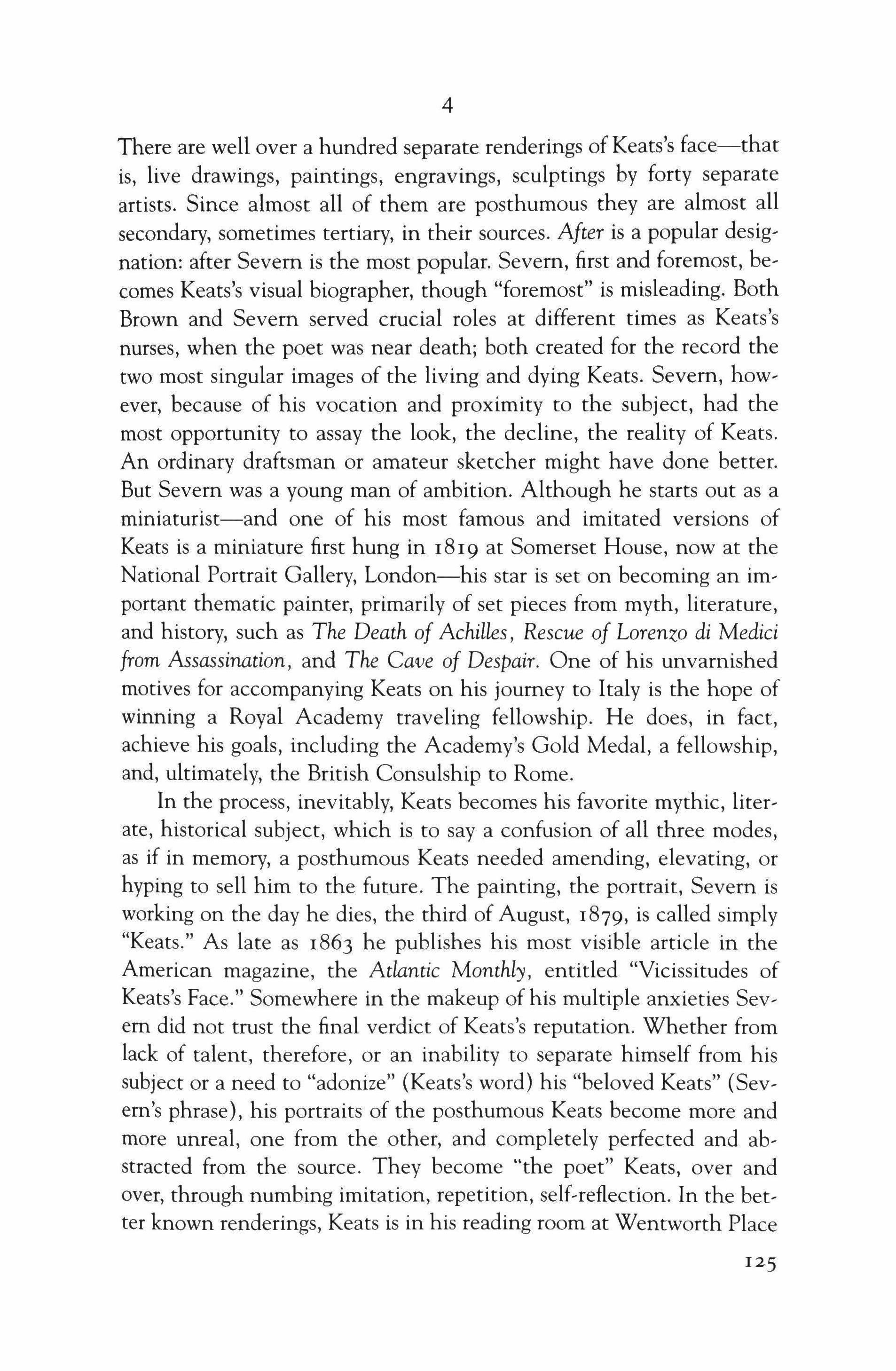
There are well over a hundred separate renderings of Keats's face-that is, live drawings, paintings, engravings, sculptings by forty separate artists. Since almost all of them are posthumous they are almost all secondary, sometimes tertiary, in their sources. After is a popular designation: after Severn is the most popular. Severn, first and foremost, be' comes Keats's visual biographer, though "foremost" is misleading. Both Brown and Severn served crucial roles at different times as Keats's nurses, when the poet was near death; both created for the record the two most singular images of the living and dying Keats. Severn, how, ever, because of his vocation and proximity to the subject, had the most opportunity to assay the look, the decline, the reality of Keats. An ordinary draftsman or amateur sketcher might have done better. But Severn was a young man of ambition. Although he starts out as a miniaturist-and one of his most famous and imitated versions of Keats is a miniature first hung in 1819 at Somerset House, now at the National Portrait Gallery, London-his star is set on becoming an important thematic painter, primarily of set pieces from myth, literature, and history, such as The Death of Achilles, Rescue of Lorenzo di Medici from Assassination, and The Cave of Despair. One of his unvarnished motives for accompanying Keats on his journey to Italy is the hope of winning a Royal Academy traveling fellowship. He does, in fact, achieve his goals, including the Academy's Gold Medal, a fellowship, and, ultimately, the British Consulship to Rome.
In the process, inevitably, Keats becomes his favorite mythic, liter, ate, historical subject, which is to say a confusion of all three modes, as if in memory, a posthumous Keats needed amending, elevating, or hyping to sell him to the future. The painting, the portrait, Severn is working on the day he dies, the third of August, 1879, is called simply "Keats." As late as 1863 he publishes his most visible article in the American magazine, the Atlantic Monthly, entitled "Vicissitudes of Keats's Face." Somewhere in the makeup of his multiple anxieties Sevem did not trust the final verdict of Keats's reputation. Whether from lack of talent, therefore, or an inability to separate himself from his subject or a need to "adonize" (Keats's word) his "beloved Keats" (Sevem's phrase), his portraits of the posthumous Keats become more and more unreal, one from the other, and completely perfected and abstracted from the source. They become "the poet" Keats, over and over, through numbing imitation, repetition, self,reflection. In the bet, ter known renderings, Keats is in his reading room at Wentworth Place
4
125
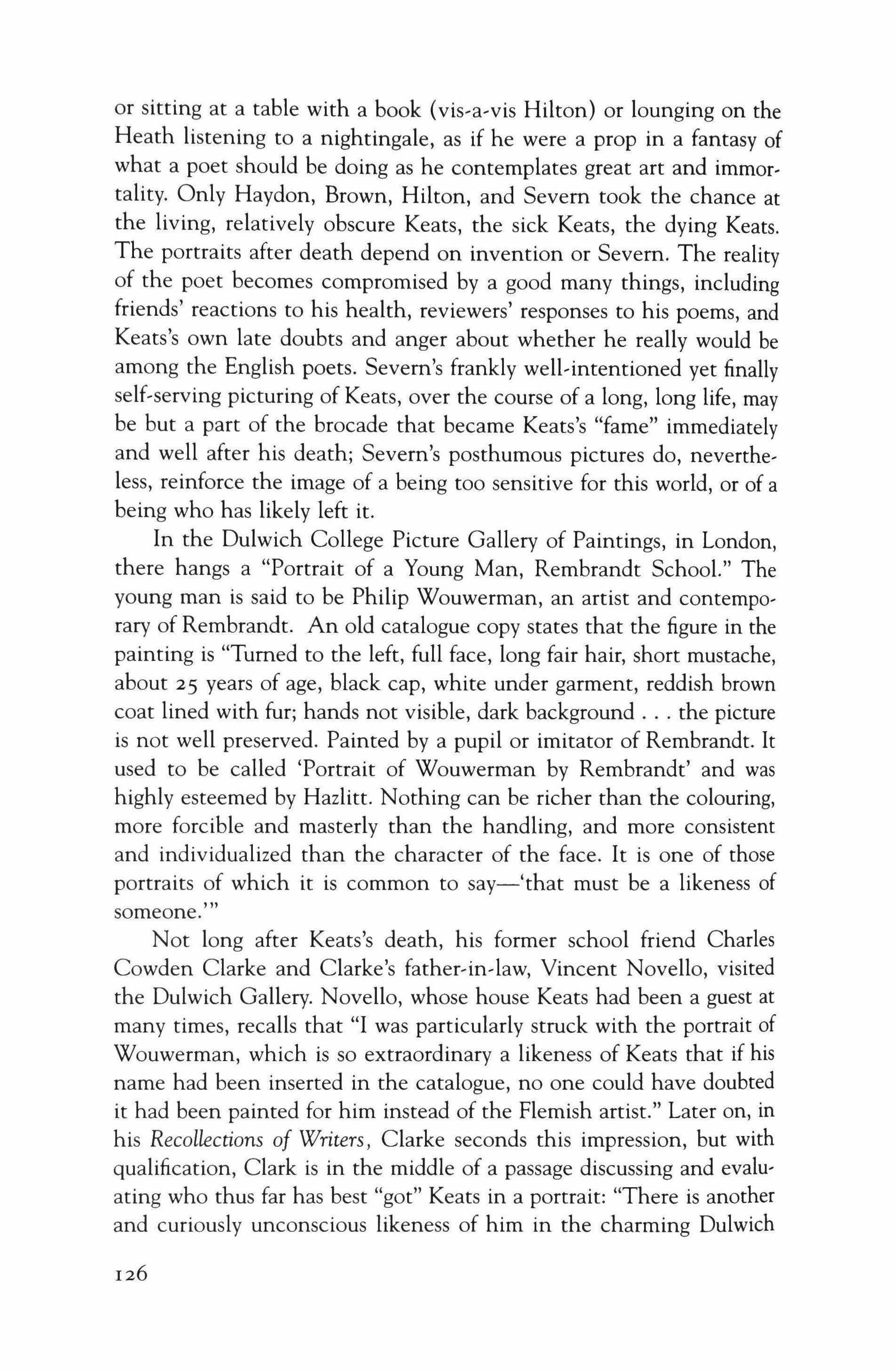
or sitting at a table with a book (vis-a-vis Hilton) or lounging on the Heath listening to a nightingale, as if he were a prop in a fantasy of what a poet should be doing as he contemplates great art and immortality. Only Haydon, Brown, Hilton, and Severn took the chance at the living, relatively obscure Keats, the sick Keats, the dying Keats. The portraits after death depend on invention or Severn. The reality of the poet becomes compromised by a good many things, including friends' reactions to his health, reviewers' responses to his poems, and Keats's own late doubts and anger about whether he really would be among the English poets. Severn's frankly well-intentioned yet finally self-serving picturing of Keats, over the course of a long, long life, may be but a part of the brocade that became Keats's "fame" immediately and well after his death; Severn's posthumous pictures do, nevertheless, reinforce the image of a being too sensitive for this world, or of a being who has likely left it.
In the Dulwich College Picture Gallery of Paintings, in London, there hangs a "Portrait of a Young Man, Rembrandt School." The young man is said to be Philip Wouwerman, an artist and contemporary of Rembrandt. An old catalogue copy states that the figure in the painting is "Turned to the left, full face, long fair hair, short mustache, about 25 years of age, black cap, white under garment, reddish brown coat lined with fur; hands not visible, dark background the picture is not well preserved. Painted by a pupil or imitator of Rembrandt. It used to be called 'Portrait of Wouwerman by Rembrandt' and was highly esteemed by Hazlitt. Nothing can be richer than the colouring, more forcible and masterly than the handling, and more consistent and individualized than the character of the face. It is one of those portraits of which it is common to say-'that must be a likeness of someone.'"
Not long after Keats's death, his former school friend Charles Cowden Clarke and Clarke's father-in-law, Vincent Novello, visited the Dulwich Gallery. Novello, whose house Keats had been a guest at many times, recalls that "I was particularly struck with the portrait of Wouwerman, which is so extraordinary a likeness of Keats that if his name had been inserted in the catalogue, no one could have doubted it had been painted for him instead of the Flemish artist." Later on, in his Recollections of Writers, Clarke seconds this impression, but with qualification, Clark is in the middle of a passage discussing and evaluating who thus far has best "got" Keats in a portrait: "There is another and curiously unconscious likeness of him in the charming Dulwich
126
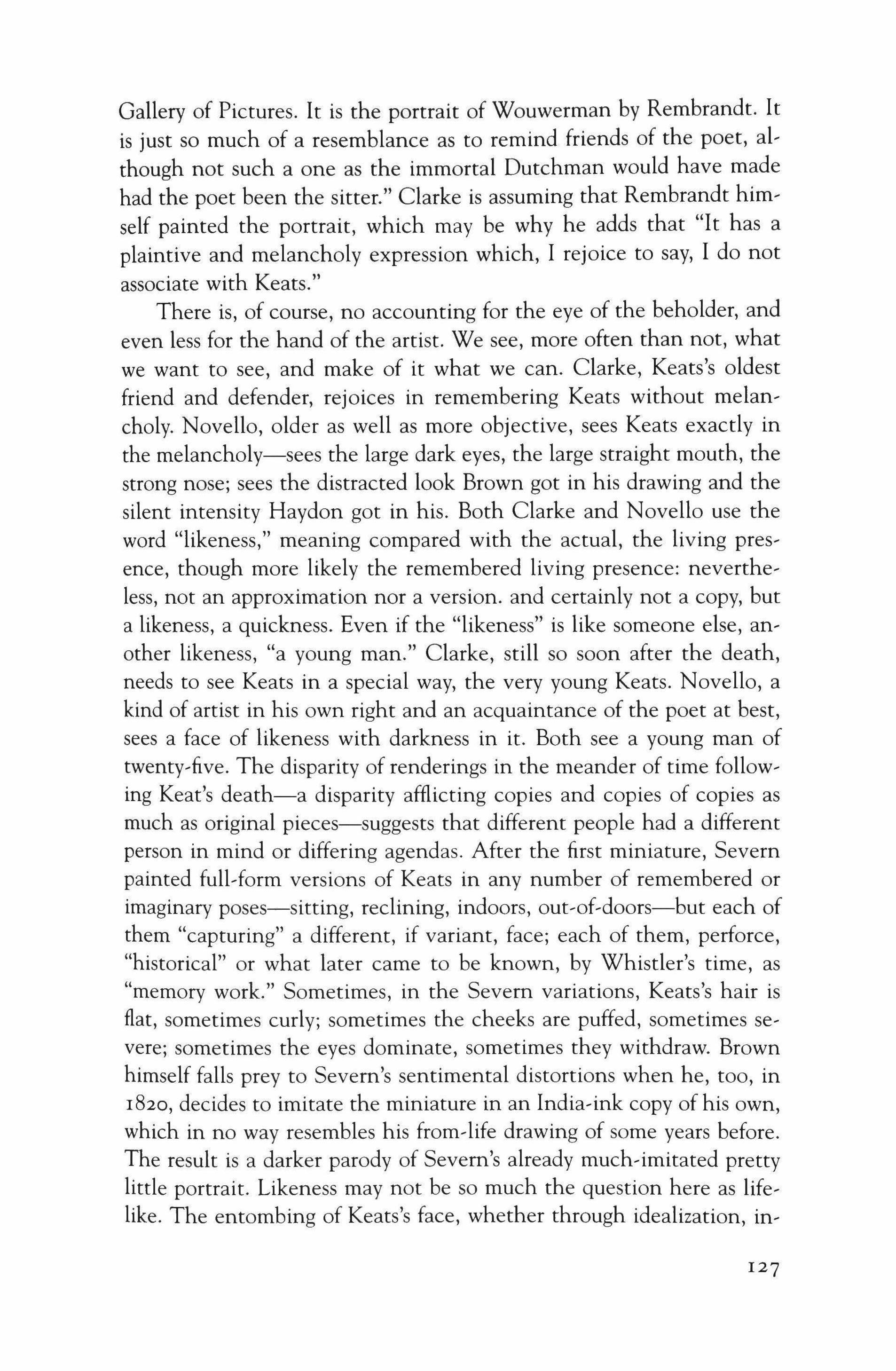
Gallery of Pictures. It is the portrait of Wouwerman by Rembrandt. It is just so much of a resemblance as to remind friends of the poet, although not such a one as the immortal Dutchman would have made had the poet been the sitter." Clarke is assuming that Rembrandt himself painted the portrait, which may be why he adds that "It has a plaintive and melancholy expression which, I rejoice to say, I do not associate with Keats."
There is, of course, no accounting for the eye of the beholder, and even less for the hand of the artist. We see, more often than not, what we want to see, and make of it what we can. Clarke, Keats's oldest friend and defender, rejoices in remembering Keats without melancholy. Novello, older as well as more objective, sees Keats exactly in the melancholy-sees the large dark eyes, the large straight mouth, the strong nose; sees the distracted look Brown got in his drawing and the silent intensity Haydon got in his. Both Clarke and Novello use the word "likeness," meaning compared with the actual, the living presence, though more likely the remembered living presence: nevertheless, not an approximation nor a version. and certainly not a copy, but a likeness, a quickness. Even if the "likeness" is like someone else, another likeness, "a young man." Clarke, still so soon after the death, needs to see Keats in a special way, the very young Keats. Novello, a kind of artist in his own right and an acquaintance of the poet at best, sees a face of likeness with darkness in it. Both see a young man of twenty-five. The disparity of renderings in the meander of time following Keat's death-a disparity afflicting copies and copies of copies as much as original pieces-suggests that different people had a different person in mind or differing agendas. After the first miniature, Severn painted full-form versions of Keats in any number of remembered or imaginary poses-sitting, reclining, indoors, out-of-doors-but each of them "capturing" a different, if variant, face; each of them, perforce, "historical" or what later came to be known, by Whistler's time, as "memory work." Sometimes, in the Severn variations, Keats's hair is flat, sometimes curly; sometimes the cheeks are puffed, sometimes severe; sometimes the eyes dominate, sometimes they withdraw. Brown himself falls prey to Severn's sentimental distortions when he, too, in 1820, decides to imitate the miniature in an India-ink copy of his own, which in no way resembles his from-life drawing of some years before. The result is a darker parody of Severn's already much-imitated pretty little portrait. Likeness may not be so much the question here as lifelike. The entombing of Keats's face, whether through idealization, in-
127
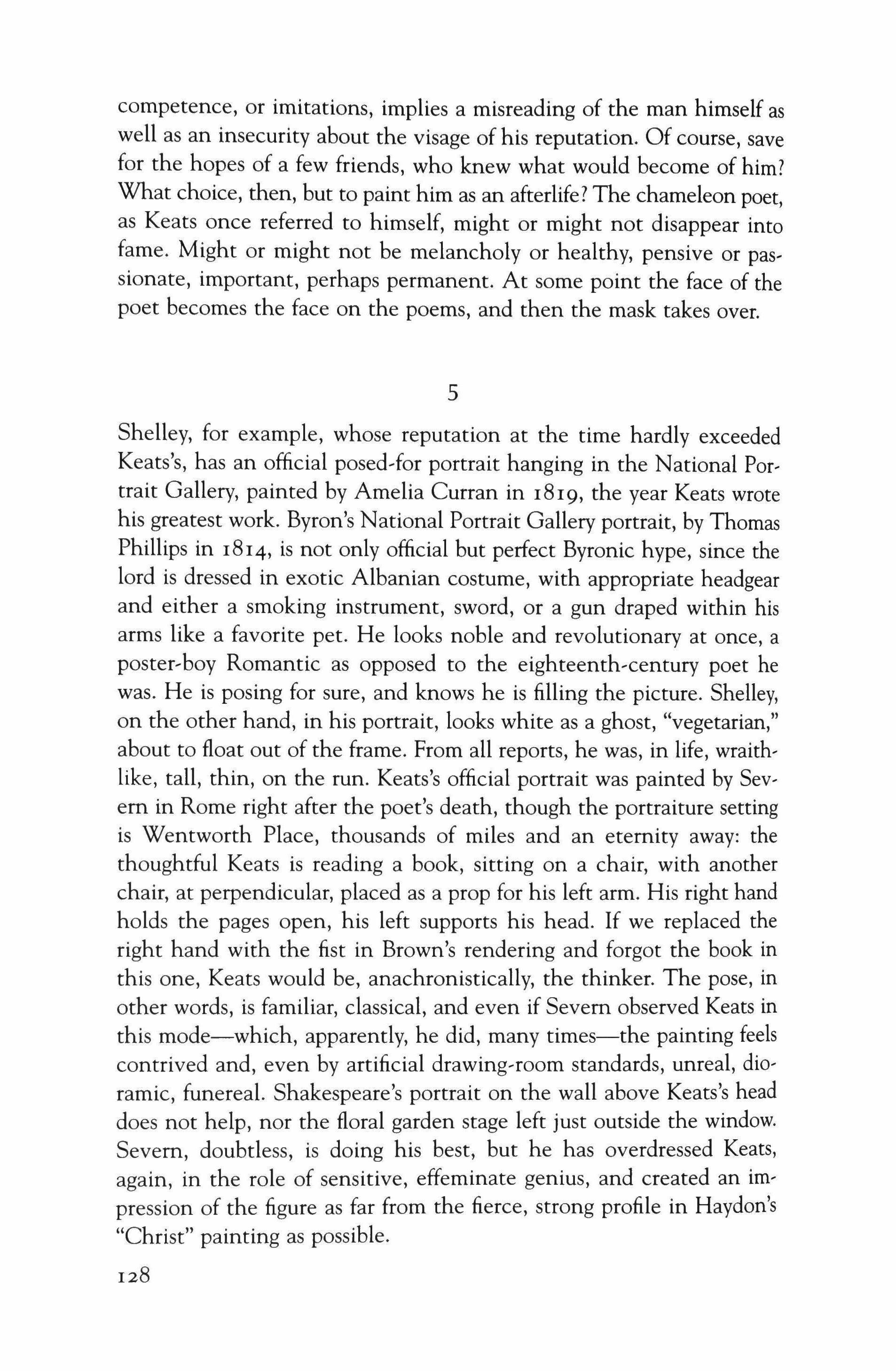
competence, or imitations, implies a misreading of the man himself as well as an insecurity about the visage of his reputation. Of course, save for the hopes of a few friends, who knew what would become of him? What choice, then, but to paint him as an afterlife? The chameleon poet, as Keats once referred to himself, might or might not disappear into fame. Might or might not be melancholy or healthy, pensive or passionate, important, perhaps permanent. At some point the face of the poet becomes the face on the poems, and then the mask takes over.
5
Shelley, for example, whose reputation at the time hardly exceeded Keats's, has an official posed-for portrait hanging in the National Portrait Gallery, painted by Amelia Curran in 1819, the year Keats wrote his greatest work. Byron's National Portrait Gallery portrait, by Thomas Phillips in 1814, is not only official but perfect Byronic hype, since the lord is dressed in exotic Albanian costume, with appropriate headgear and either a smoking instrument, sword, or a gun draped within his arms like a favorite pet. He looks noble and revolutionary at once, a poster-boy Romantic as opposed to the eighteenth-century poet he was. He is posing for sure, and knows he is filling the picture. Shelley, on the other hand, in his portrait, looks white as a ghost, "vegetarian," about to float out of the frame. From all reports, he was, in life, wraithlike, tall, thin, on the run. Keats's official portrait was painted by Severn in Rome right after the poet's death, though the portraiture setting is Wentworth Place, thousands of miles and an eternity away: the thoughtful Keats is reading a book, sitting on a chair, with another chair, at perpendicular, placed as a prop for his left arm. His right hand holds the pages open, his left supports his head. If we replaced the right hand with the fist in Brown's rendering and forgot the book in this one, Keats would be, anachronistically, the thinker. The pose, in other words, is familiar, classical, and even if Severn observed Keats in this mode-which, apparently, he did, many times-the painting feels contrived and, even by artificial drawing-room standards, unreal, dioramie, funereal. Shakespeare's portrait on the wall above Keats's head does not help, nor the floral garden stage left just outside the window. Severn, doubtless, is doing his best, but he has overdressed Keats, again, in the role of sensitive, effeminate genius, and created an impression of the figure as far from the fierce, strong profile in Haydon's "Christ" painting as possible.
128

Wordsworth and Coleridge, as first generation Romantics, naturally receive the best on-site attention, as compared to their young counterparts. Among the living portraits of Wordsworth, the 1805 and 1818 drawings by Eldrige and Haydon, respectively, stand out, as well as sittings by Richard Carruthers {I 8 I 7} and Wordsworth's friend George Beaumont. What is impressive about Wordsworth's face in all of his poses is the consistency with which, from artist to artist, youth to age, the Wordsworth look comes through: the clarity and conviction of the gaze, the Nordic majesty of the brow, the hauteur of greatness in the bearing-whether at rest or standing, the poet of Lyrical Ballads and the posthumous Prelude is present and aware of himself. These are portraits without apology, as is the very first painting of Wordsworth, in 1798, by William Shuter, with the nose and the forehead prominent, which can be found now in the Wordsworth Collection at Cornell. Washington Allston's 1814 portrait of Coleridge {which, like the Edridge Wordsworth, is part of the Granger Collection} may make the poetphilosopher look like a president-Allston is American-yet it does, as art, reveal the white-haired, jowled, heavy, full-faced aging Coleridge who will not write poetry again and whose single-mindedness will be to attempt to remember, as Biographia, everything. Coleridge has a small piece of paper in his left hand, as if it were a note of permission. Coleridge is imposing, dignified, but on the edge. Just eight years earlier, in Rome, Allston paints an incredibly younger Coleridge, same bright, big face, same expression with hair as dark as a crow's wing. Thomas Phillips' William Blake (uncompromising at age fifty) and Alexander Nasmyth's Robert Bums (expectant at age twentyeight) are no less accurate.
The living Keats, however, remains a figure in the landscape, a face in the crowd. His present-tense portraits are accidents of timing, performed by friends on the spur of the moment. What they offer in vitality and intimacy they lose in the planned patience of detailed study. For all his quick-take preliminary drawing, Haydon's left profile of the fiery Keats in Christ's Entry into Jerusalem is blessed with a sense of spontaneity over accuracy, perspective over close-up. For all its feeling for the moment, Brown's 1819 right-side profile pencil sketch is only that, a sketch. By the time posterity's schedule calls for an old-fashioned, full-fledged portrait of Keats it is too late-too late to supercede memory, impression, invention, intention. Keats had once said that he had no use for poetry with "palpable designs" on the reader; he would have certainly had no use for portraits with palpable designs on the
129
viewer, particularly in the projection of his own face. Thus in his posthumous portraits Keats either resembles the effeminate innocent the bad reviews kill, the poverty overwhelms, the disease ravages, the "poor Keats" cast in soft focus, or he turns into the ideal handsome poet no mere mortal harm can come to. At the close of the "Indolence" ode, he writes that "I would not be dieted with praise, / A petlamb in a sentimental farce!" There is something unnecessarily compensatory in the general artistic attitude toward Keats after his death: he needed to appear, apparently, either as a victim or valiant. And since he was unavailable to correct or give realism to such an attitude, artists tended to paint, draw, sculpt the myth, the easier story. Severn, for all his virtues as a friend, facilitated, for the remainder of his long life, the poeticism of the poor Keats.
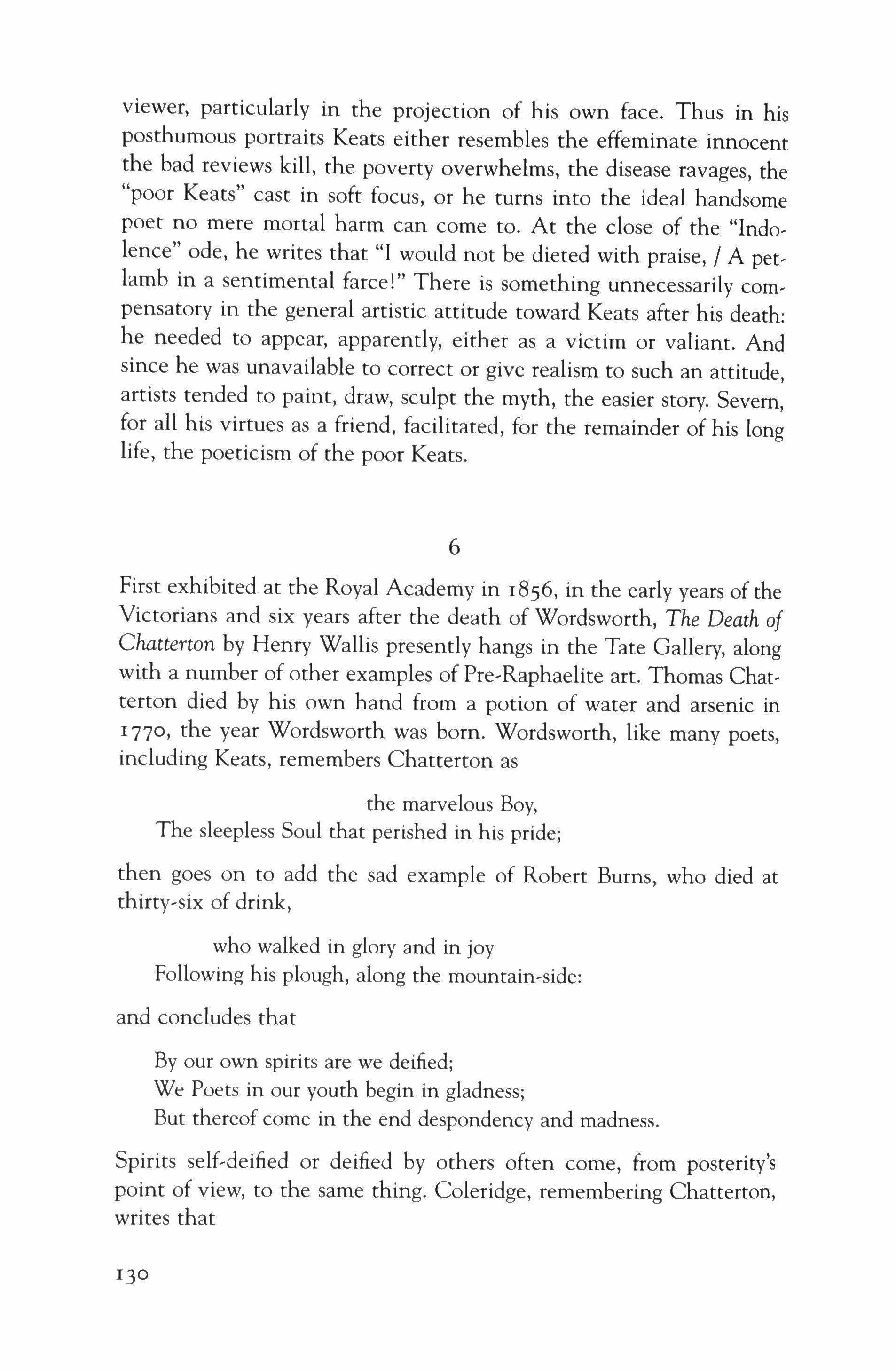
6
First exhibited at the Royal Academy in 1856, in the early years of the Victorians and six years after the death of Wordsworth, The Death of Chatterton by Henry Wallis presently hangs in the Tate Gallery, along with a number of other examples of Pre-Raphaelite art. Thomas Chatterton died by his own hand from a potion of water and arsenic in 1770, the year Wordsworth was born. Wordsworth, like many poets, including Keats, remembers Chatterton as the marvelous Boy, The sleepless Soul that perished in his pride; then goes on to add the sad example of Robert Burns, who died at thirty-six of drink, who walked in glory and in joy
Following his plough, along the mountain-side: and concludes that
By our own spirits are we deified; We Poets in our youth begin in gladness; But thereof come in the end despondency and madness.
Spirits self-deified or deified by others often come, from posterity's point of view, to the same thing. Coleridge, remembering Chatterton, writes that
130
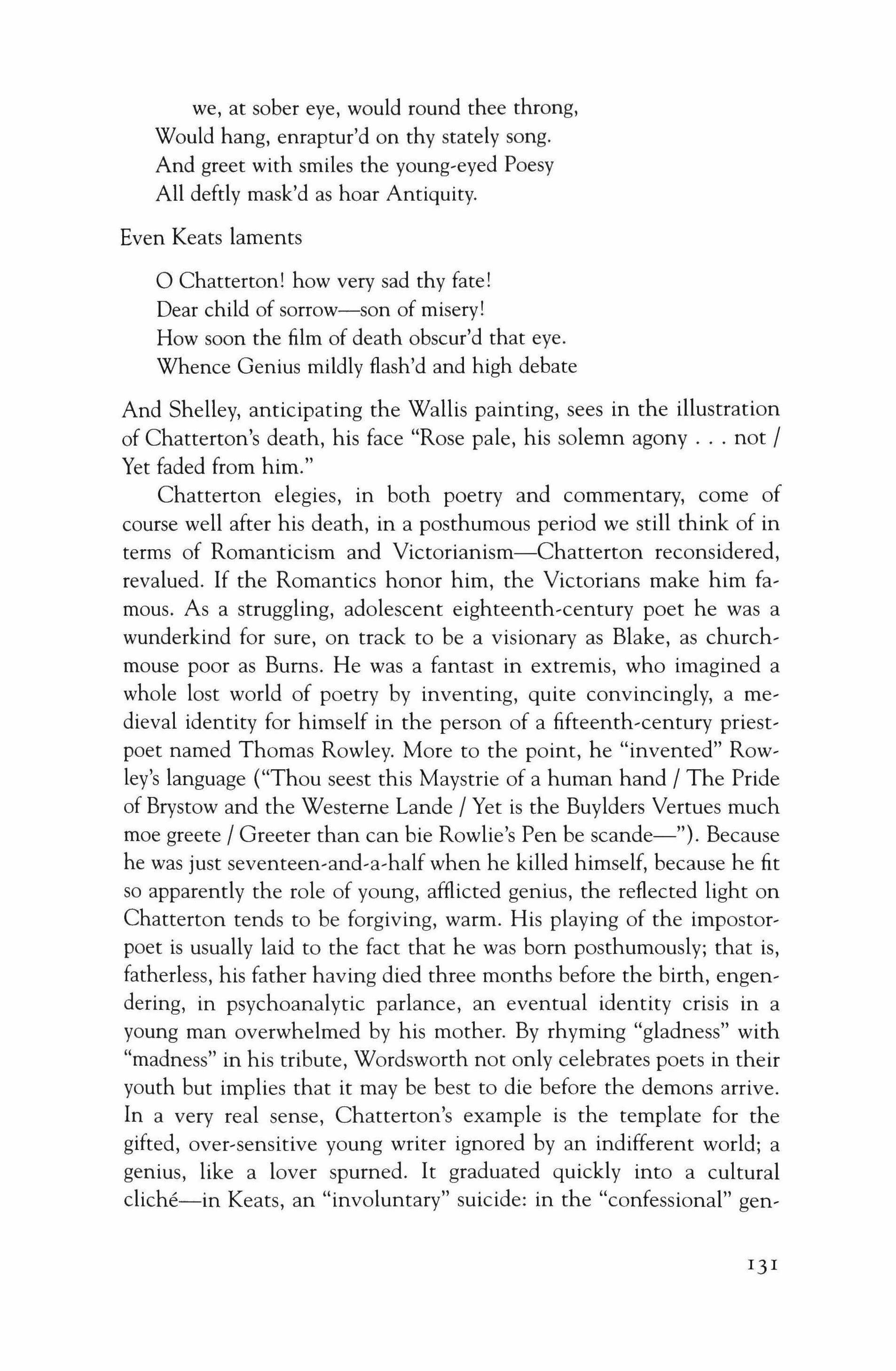
we, at sober eye, would round thee throng, Would hang, enraptur'd on thy stately song.
And greet with smiles the young-eyed Poesy
All deftly mask'd as hoar Antiquity.
Even Keats laments
o Chatterton! how very sad thy fate!
Dear child of sorrow-son of misery!
How soon the film of death obscur'd that eye.
Whence Genius mildly flash'd and high debate
And Shelley, anticipating the Wallis painting, sees in the illustration of Chatterton's death, his face "Rose pale, his solemn agony not / Yet faded from him."
Chatterton elegies, in both poetry and commentary, come of course well after his death, in a posthumous period we still think of in terms of Romanticism and Victorianism-Chatterton reconsidered, revalued. If the Romantics honor him, the Victorians make him famous. As a struggling, adolescent eighteenth-century poet he was a wunderkind for sure, on track to be a visionary as Blake, as churchmouse poor as Bums. He was a fantast in extremis, who imagined a whole lost world of poetry by inventing, quite convincingly, a medieval identity for himself in the person of a fifteenth-century priestpoet named Thomas Rowley. More to the point, he "invented" Rowley's language ("Thou seest this Maystrie of a human hand / The Pride of Brystow and the Westeme Lande / Yet is the Buylders Vertues much moe greete / Greeter than can bie Rowlie's Pen be scande-"). Because he was just seventeen-and-a-half when he killed himself, because he fit so apparently the role of young, afflicted genius, the reflected light on Chatterton tends to be forgiving, warm. His playing of the impostorpoet is usually laid to the fact that he was born posthumously; that is, fatherless, his father having died three months before the birth, engendering, in psychoanalytic parlance, an eventual identity crisis in a young man overwhelmed by his mother. By rhyming "gladness" with "madness" in his tribute, Wordsworth not only celebrates poets in their youth but implies that it may be best to die before the demons arrive. In a very real sense, Chatterton's example is the template for the gifted, over-sensitive young writer ignored by an indifferent world; a genius, like a lover spumed. It graduated quickly into a cultural cliche-in Keats, an "involuntary" suicide: in the "confessional" gen-
131
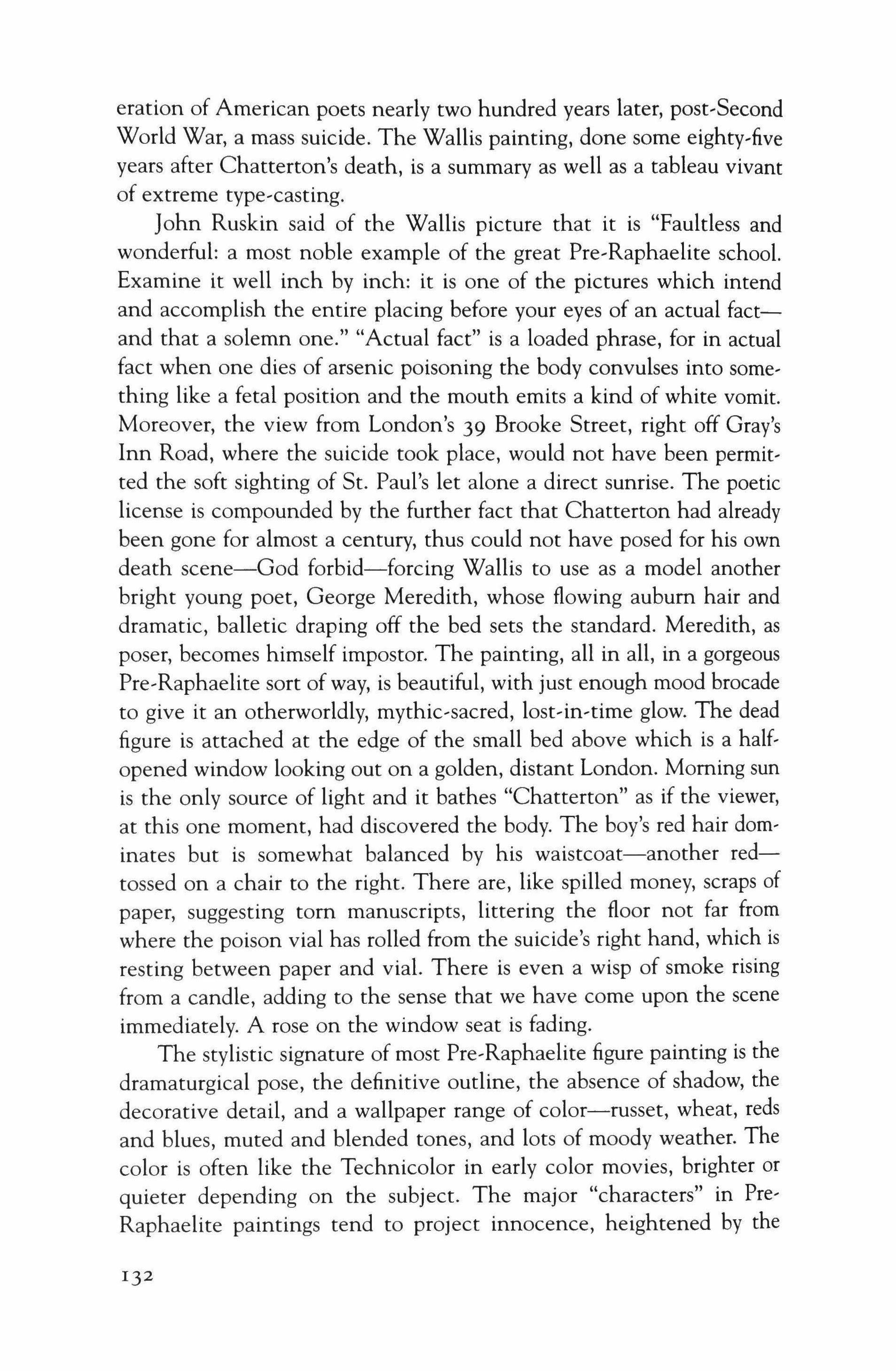
eration of American poets nearly two hundred years later, post'Second World War, a mass suicide. The Wallis painting, done some eighty-five years after Chatterton's death, is a summary as well as a tableau vivant of extreme type-casting.
John Ruskin said of the Wallis picture that it is "Faultless and wonderful: a most noble example of the great Pre-Raphaelite school. Examine it well inch by inch: it is one of the pictures which intend and accomplish the entire placing before your eyes of an actual factand that a solemn one." "Actual fact" is a loaded phrase, for in actual fact when one dies of arsenic poisoning the body convulses into some, thing like a fetal position and the mouth emits a kind of white vomit. Moreover, the view from London's 39 Brooke Street, right off Gray's Inn Road, where the suicide took place, would not have been permit, ted the soft sighting of St. Paul's let alone a direct sunrise. The poetic license is compounded by the further fact that Chatterton had already been gone for almost a century, thus could not have posed for his own death scene-God forbid-forcing Wallis to use as a model another bright young poet, George Meredith, whose flowing auburn hair and dramatic, balletic draping off the bed sets the standard. Meredith, as poser, becomes himself impostor. The painting, all in all, in a gorgeous Pre-Raphaelite sort of way, is beautiful, with just enough mood brocade to give it an otherworldly, mythic,sacred, lost-in-time glow. The dead figure is attached at the edge of the small bed above which is a halfopened window looking out on a golden, distant London. Morning sun is the only source of light and it bathes "Chatterton" as if the viewer, at this one moment, had discovered the body. The boy's red hair dominates but is somewhat balanced by his waistcoat-another redtossed on a chair to the right. There are, like spilled money, scraps of paper, suggesting tom manuscripts, littering the floor not far from where the poison vial has rolled from the suicide's right hand, which is resting between paper and vial. There is even a wisp of smoke rising from a candle, adding to the sense that we have come upon the scene immediately. A rose on the window seat is fading.
The stylistic signature of most Pre-Raphaelite figure painting is the dramaturgical pose, the definitive outline, the absence of shadow, the decorative detail, and a wallpaper range of color-russet, wheat, reds and blues, muted and blended tones, and lots of moody weather. The color is often like the Technicolor in early color movies, brighter or quieter depending on the subject. The major "characters" in Pre' Raphaelite paintings tend to project innocence, heightened by the
132
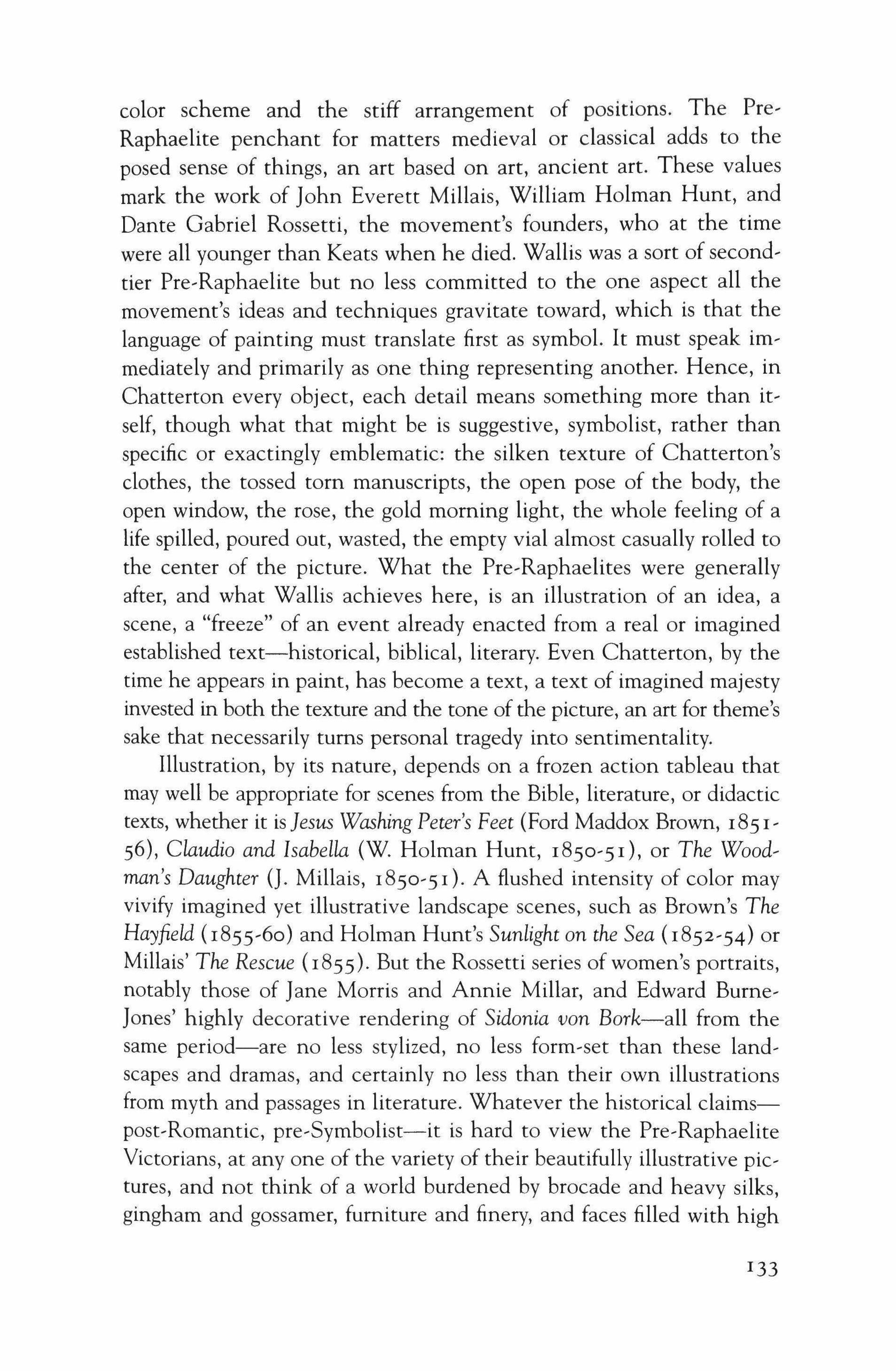
color scheme and the stiff arrangement of positions. The PreRaphaelite penchant for matters medieval or classical adds to the posed sense of things, an art based on art, ancient art. These values mark the work of John Everett Millais, William Holman Hunt, and Dante Gabriel Rossetti, the movement's founders, who at the time were all younger than Keats when he died. Wallis was a sort of secondtier Pre-Raphaelite but no less committed to the one aspect all the movement's ideas and techniques gravitate toward, which is that the language of painting must translate first as symbol. It must speak immediately and primarily as one thing representing another. Hence, in Chatterton every object, each detail means something more than itself, though what that might be is suggestive, symbolist, rather than specific or exactingly emblematic: the silken texture of Chatterton's clothes, the tossed torn manuscripts, the open pose of the body, the open window, the rose, the gold morning light, the whole feeling of a life spilled, poured out, wasted, the empty vial almost casually rolled to the center of the picture. What the Pre-Raphaelites were generally after, and what Wallis achieves here, is an illustration of an idea, a scene, a "freeze" of an event already enacted from a real or imagined established text-historical, biblical, literary. Even Chatterton, by the time he appears in paint, has become a text, a text of imagined majesty invested in both the texture and the tone of the picture, an art for theme's sake that necessarily turns personal tragedy into sentimentality.
Illustration, by its nature, depends on a frozen action tableau that may well be appropriate for scenes from the Bible, literature, or didactic texts, whether it is}esus Washing Peter's Feet (Ford Maddox Brown, 185156), Claudio and Isabella (W. Holman Hunt, 1850-51), or The Woodman's Daughter (J. Millais, 1850-5 I). A flushed intensity of color may vivify imagined yet illustrative landscape scenes, such as Brown's The Hayfield (1855-60) and Holman Hunt's Sunlight on the Sea (1852-54) or Millais' The Rescue (1855). But the Rossetti series of women's portraits, notably those of Jane Morris and Annie Millar, and Edward BurneJones' highly decorative rendering of Sidonia von Bark-all from the same period-are no less stylized, no less form-set than these landscapes and dramas, and certainly no less than their own illustrations from myth and passages in literature. Whatever the historical claimspost-Romantic, pre-Symbolist-it is hard to view the Pre-Raphaelite Victorians, at anyone of the variety of their beautifully illustrative pictures, and not think of a world burdened by brocade and heavy silks, gingham and gossamer, furniture and finery, and faces filled with high
133
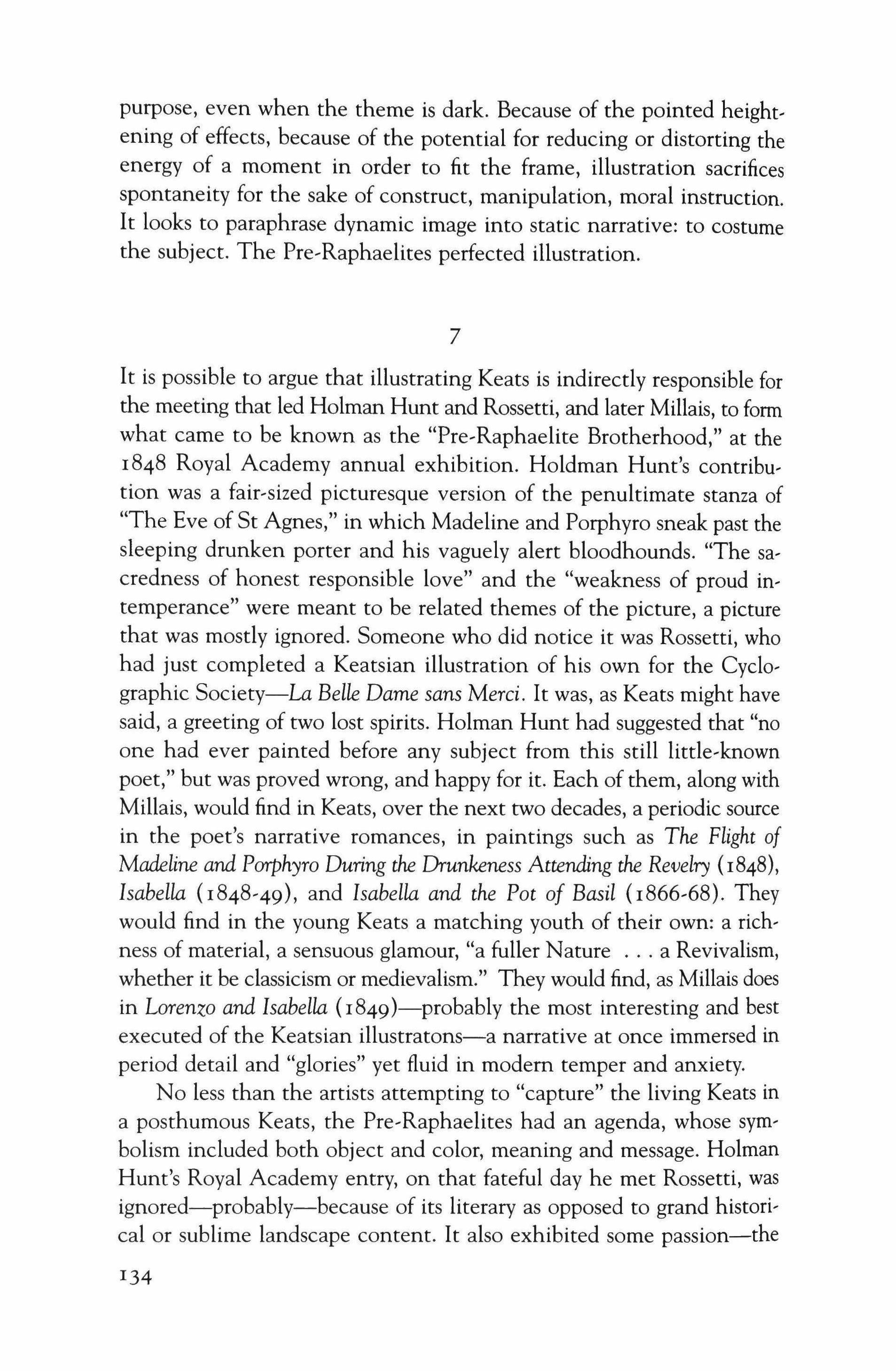
purpose, even when the theme is dark. Because of the pointed heightening of effects, because of the potential for reducing or distorting the energy of a moment in order to fit the frame, illustration sacrifices spontaneity for the sake of construct, manipulation, moral instruction. It looks to paraphrase dynamic image into static narrative: to costume the subject. The Pre-Raphaelites perfected illustration.
7
It is possible to argue that illustrating Keats is indirectly responsible for the meeting that led Holman Hunt and Rossetti, and later Millais, to form what came to be known as the "Pre-Raphaelite Brotherhood," at the 1848 Royal Academy annual exhibition. Holdman Hunt's contribution was a fair-sized picturesque version of the penultimate stanza of "The Eve of St Agnes," in which Madeline and Porphyro sneak past the sleeping drunken porter and his vaguely alert bloodhounds. "The sacredness of honest responsible love" and the "weakness of proud intemperance" were meant to be related themes of the picture, a picture that was mostly ignored. Someone who did notice it was Rossetti, who had just completed a Keatsian illustration of his own for the Cyclographic Society-La Belle Dame sans Merci. It was, as Keats might have said, a greeting of two lost spirits. Holman Hunt had suggested that "no one had ever painted before any subject from this still little-known poet," but was proved wrong, and happy for it. Each of them, along with Millais, would find in Keats, over the next two decades, a periodic source in the poet's narrative romances, in paintings such as The Flight of Madeline and Porphyro During the Drunkeness Attending the Revelry (1848), Isabella (1848-49), and Isabella and the Pot of Basil (1866-68). They would find in the young Keats a matching youth of their own: a richness of material, a sensuous glamour, "a fuller Nature a Revivalism, whether it be classicism or medievalism." They would find, as Millais does in Lorenzo and Isabella (1849}-probab1y the most interesting and best executed of the Keatsian illustratons-a narrative at once immersed in period detail and "glories" yet fluid in modem temper and anxiety.
No less than the artists attempting to "capture" the living Keats in a posthumous Keats, the Pre-Raphaelites had an agenda, whose symbolism included both object and color, meaning and message. Holman Hunt's Royal Academy entry, on that fateful day he met Rossetti, was ignored-probab1y-because of its literary as opposed to grand historicalor sublime landscape content. It also exhibited some passion-the 134
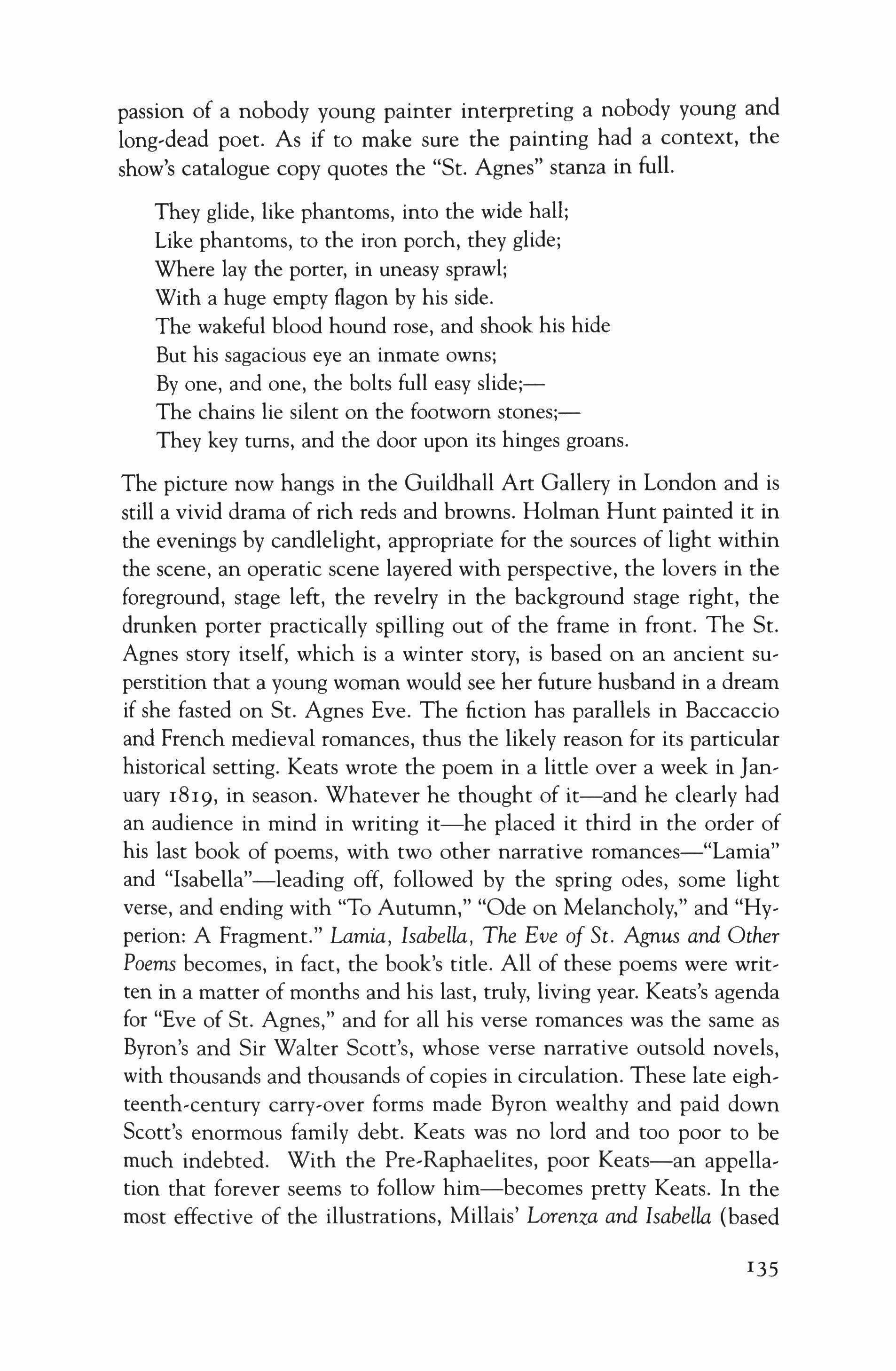
passion of a nobody young painter interpreting a nobody young and long-dead poet. As if to make sure the painting had a context, the show's catalogue copy quotes the "St. Agnes" stanza in full.
They glide, like phantoms, into the wide hall; Like phantoms, to the iron porch, they glide; Where lay the porter, in uneasy sprawl; With a huge empty flagon by his side.
The wakeful blood hound rose, and shook his hide
But his sagacious eye an inmate owns; By one, and one, the bolts full easy slide;The chains lie silent on the footwom stones;They key turns, and the door upon its hinges groans.
The picture now hangs in the Guildhall Art Gallery in London and is still a vivid drama of rich reds and browns. Holman Hunt painted it in the evenings by candlelight, appropriate for the sources of light within the scene, an operatic scene layered with perspective, the lovers in the foreground, stage left, the revelry in the background stage right, the drunken porter practically spilling out of the frame in front. The St. Agnes story itself, which is a winter story, is based on an ancient superstition that a young woman would see her future husband in a dream if she fasted on St. Agnes Eve. The fiction has parallels in Baccaccio and French medieval romances, thus the likely reason for its particular historical setting. Keats wrote the poem in a little over a week in Jan, uary 1819, in season. Whatever he thought of it-and he clearly had an audience in mind in writing it-he placed it third in the order of his last book of poems, with two other narrative romances-"Lamia" and "Isabella"-leading off, followed by the spring odes, some light verse, and ending with "To Autumn," "Ode on Melancholy," and "Hyperion: A Fragment." Lamia, Isabella, The Eve of St. Agnus and Other Poems becomes, in fact, the book's title. All of these poems were writ, ten in a matter of months and his last, truly, living year. Keats's agenda for "Eve of St. Agnes," and for all his verse romances was the same as Byron's and Sir Walter Scott's, whose verse narrative outsold novels, with thousands and thousands of copies in circulation. These late eighteenth-century carry-over forms made Byron wealthy and paid down Scott's enormous family debt. Keats was no lord and too poor to be much indebted. With the Pre-Raphaelites, poor Keats-an appellation that forever seems to follow him-becomes pretty Keats. In the most effective of the illustrations, Millais' Lorenza and Isabella (based
135

on "Isabella; or, The Pot of Basil"}, the dramatic complexity, visual subtlety, and character insight combine to create a picture of real depth of field-there are at least a dozen people at the dinner table, including one standing-without violating the importance of the foreground action, the most famous detail of which is the foot jabbing of the greyhound by one of Isabella's murderous brothers. Yet for all its beauty and intelligence, the picture remains an illustration, an interpretation of an interpretation of how the brothers "could not in the selfsame mansion dwell / Without some stir of heart, some malady." Keats again borrows from Baccaccio, adding his own romantic, green Gothicism, specifically through the agency of Isabella's secreting of her lover's head within a pot of basil. The edge of the melodrama may belong to Keats, but so does the resonance of his gorgeous language, qualities that become exaggerated in the hands of his Pre-Raphaelite "discoverers": in terms of which the evocative turns into the explicative, the lyrical into the narrative, the imagination into intention. Rossetti, Holman Hunt, and Millais come to Keats nearly thirty years after his death; they see in certain of his poems a purpose of their own, which is to make public his most salable images, images he himself, young and ambitious as he is, wishes to be sold. The Pre-Raphaelires, though, represent the most transparent part of this Keats, the side of his secondary writing that presents a kind of drapery of poetry converted to a welldisguised didacticism.
They likely found Keats with the help of Richard Monckton Milnes, who in 1848, the first year of the illustrations, published the first muted biography, The Life, and Literary Remains of John Keats. Not surprisingly, the mixed result is something of a hodge-podge of personal anecdotes, letters, extensive borrowings from Brown's abortive Keatsian memoir, Milnes's own narrative and commentary, plus some sixtyseven poems (of approximately, when the count was finally in, one hundred and sixty). The biography was received with modest Victorian response, warm but with reservations about Keats's qualified masculinity ("A pale flower by some maiden cherished," according to Shelley) and aggressive sensuality, the very qualities, in the yet longer pictorial poems, the Pre-Raphaelites thought so attractive. Milnes-later Lord Houghton-had been a part of the 1829 stellar group at Cambridge that had linked and celebrated Keats and Shelley both by reprinting at no little expense, an edition of Adonais, the great pastoral elegy that promoted its own didactic, distorted portrait of Keats. Arthur Hallam and Alfred Tennyson were other star members of the group. (When
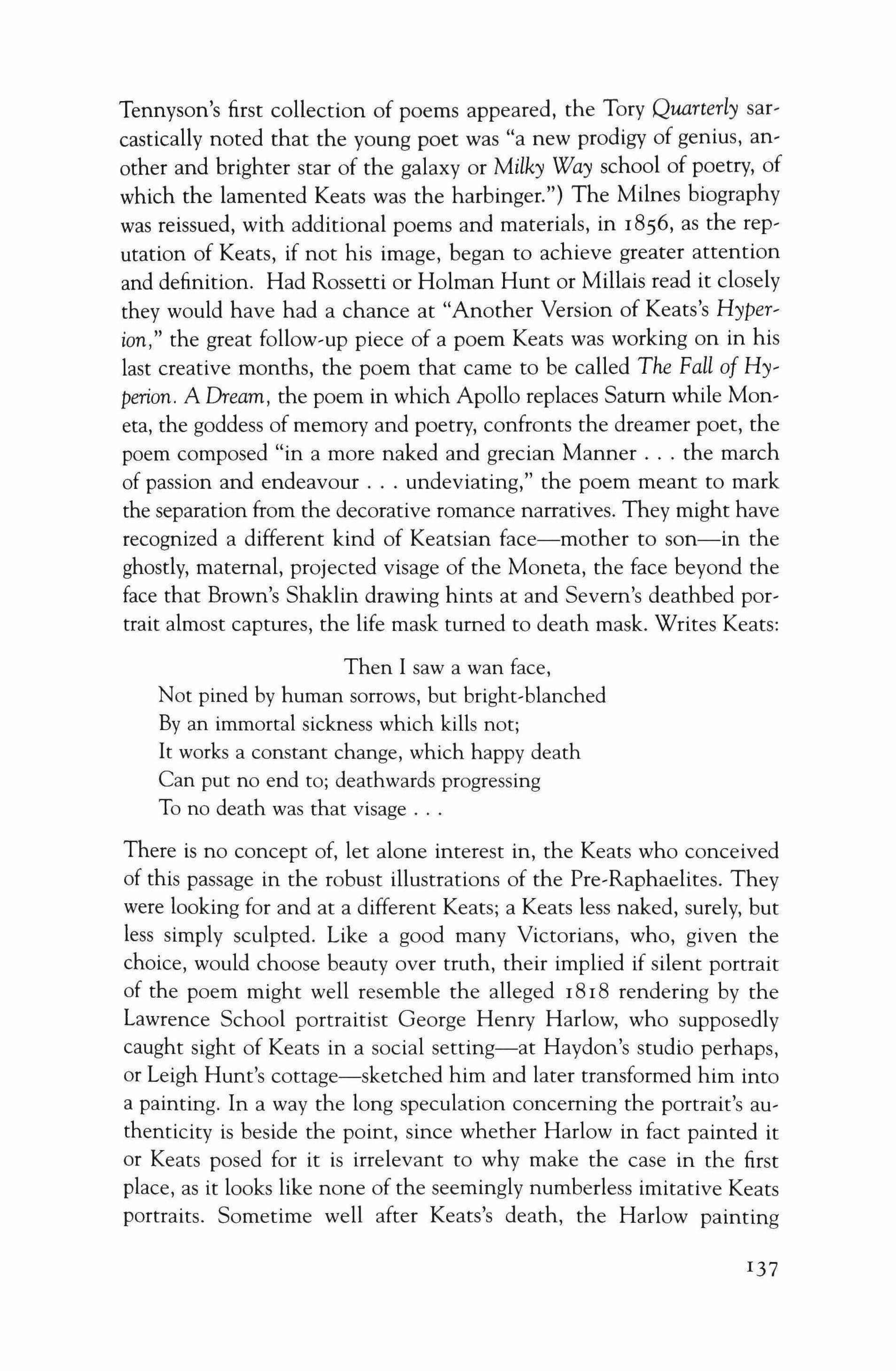
Tennyson's first collection of poems appeared, the Tory Quarterly sarcastically noted that the young poet was "a new prodigy of genius, another and brighter star of the galaxy or Milky Way school of poetry, of which the lamented Keats was the harbinger."} The Milnes biography was reissued, with additional poems and materials, in 1856, as the reputation of Keats, if not his image, began to achieve greater attention and definition. Had Rossetti or Holman Hunt or Millais read it closely they would have had a chance at "Another Version of Keats's Hyperion," the great follow-up piece of a poem Keats was working on in his last creative months, the poem that came to be called The Fall of Hy� perion. A Dream, the poem in which Apollo replaces Saturn while Moneta, the goddess of memory and poetry, confronts the dreamer poet, the poem composed "in a more naked and grecian Manner the march of passion and endeavour undeviating," the poem meant to mark the separation from the decorative romance narratives. They might have recognized a different kind of Keatsian face-mother to son-in the ghostly, maternal, projected visage of the Moneta, the face beyond the face that Brown's Shaklin drawing hints at and Severn's deathbed portrait almost captures, the life mask turned to death mask. Writes Keats:
Then I saw a wan face,
Not pined by human sorrows, but bright-blanched
By an immortal sickness which kills not;
It works a constant change, which happy death
Can put no end to; deathwards progressing
To no death was that visage
There is no concept of, let alone interest in, the Keats who conceived of this passage in the robust illustrations of the Pre-Raphaelires. They were looking for and at a different Keats; a Keats less naked, surely, but less simply sculpted. Like a good many Victorians, who, given the choice, would choose beauty over truth, their implied if silent portrait of the poem might well resemble the alleged 1818 rendering by the Lawrence School portraitist George Henry Harlow, who supposedly caught sight of Keats in a social setting-at Haydon's studio perhaps, or Leigh Hunt's cottage-sketched him and later transformed him into a painting. In a way the long speculation concerning the portrait's authenticity is beside the point, since whether Harlow in fact painted it or Keats posed for it is irrelevant to why make the case in the first place, as it looks like none of the seemingly numberless imitative Keats portraits. Sometime well after Keats's death, the Harlow painting
137
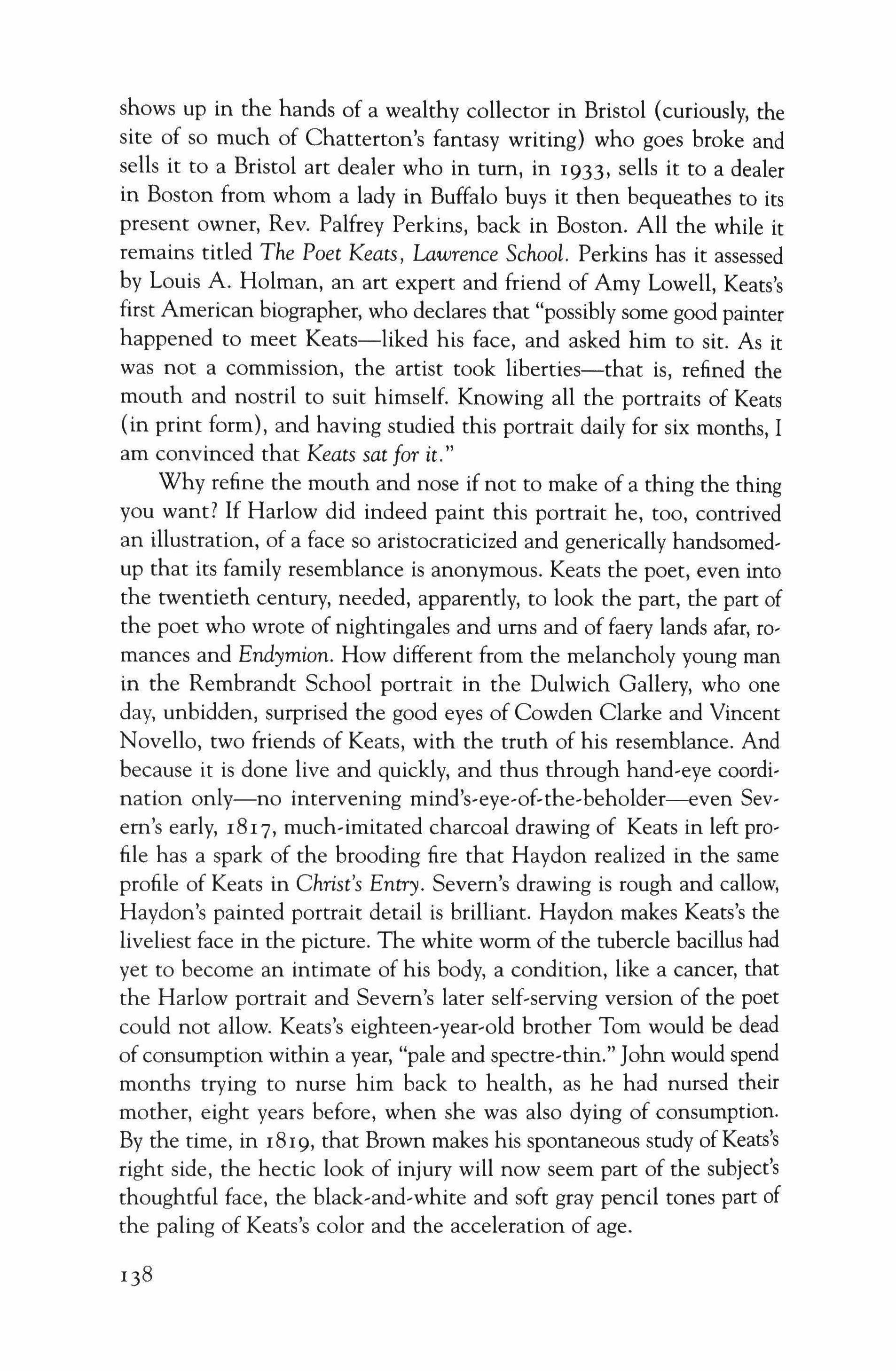
shows up in the hands of a wealthy collector in Bristol (curiously, the site of so much of Chatterton's fantasy writing) who goes broke and sells it to a Bristol art dealer who in turn, in 1933, sells it to a dealer in Boston from whom a lady in Buffalo buys it then bequeathes to its present owner, Rev. Palfrey Perkins, back in Boston. All the while it remains titled The Poet Keats, Lawrence School. Perkins has it assessed by Louis A. Holman, an art expert and friend of Amy Lowell, Keats's first American biographer, who declares that "possibly some good painter happened to meet Keats-liked his face, and asked him to sit. As it was not a commission, the artist took liberties-that is, refined the mouth and nostril to suit himself. Knowing all the portraits of Keats (in print form), and having studied this portrait daily for six months, I am convinced that Keats sat for it."
Why refine the mouth and nose if not to make of a thing the thing you want? If Harlow did indeed paint this portrait he, too, contrived an illustration, of a face so aristocraticized and generically handsomedup that its family resemblance is anonymous. Keats the poet, even into the twentieth century, needed, apparently, to look the part, the part of the poet who wrote of nightingales and urns and of faery lands afar, romances and Endymion. How different from the melancholy young man in the Rembrandt School portrait in the Dulwich Gallery, who one day, unbidden, surprised the good eyes of Cowden Clarke and Vincent Novello, two friends of Keats, with the truth of his resemblance. And because it is done live and quickly, and thus through hand-eye coordination only-no intervening mind's-eye-of-the-beholder-even Severn's early, 1817, much-imitated charcoal drawing of Keats in left profile has a spark of the brooding fire that Haydon realized in the same profile of Keats in Christ's Entry. Severn's drawing is rough and callow, Haydon's painted portrait detail is brilliant. Haydon makes Keats's the liveliest face in the picture. The white worm of the tubercle bacillus had yet to become an intimate of his body, a condition, like a cancer, that the Harlow portrait and Severn's later self-serving version of the poet could not allow. Keats's eighteen-year-old brother Tom would be dead of consumption within a year, "pale and spectre-thin." John would spend months trying to nurse him back to health, as he had nursed their mother, eight years before, when she was also dying of consumption. By the time, in 1819, that Brown makes his spontaneous study of Keats's right side, the hectic look of injury will now seem part of the subject's thoughtful face, the black-and-white and soft gray pencil tones part of the paling of Keats's color and the acceleration of age.
RichardJackson

The Apology of Judas
In those days I could fold the sky up and store it
In a closet. With every heave of my chest
The universe seemed to expand. In those days
The rope of the moon floating on the surface
Of the water was a kind of hope. I hardly noticed The bird's song limping from its broken nest, Hardly noticed the last star struggling against The dawn until the sun betrayed it. Why do We notice so little? Does the river suffer when You plunge your hand into it? Does the wind suffer When it snags itself on a branch? Maybe that's why We close our eyes to kiss. I think each night was just The bandage I used to cover the deep cuts of His words. Don't tum away. Don't imagine you know the story. Our lives are just dreams someone sold to the Highest bidder. I thought my own words could Trample the stars. I thought my name would nest In the future and take flight. But there was only That dusk of blackbirds. It's all just Fate settling Like dust in the attics of our deeds. But why Were they surprised? why was a sword drawn? Why has a sword always been drawn? Why do we Tum away from all those children nailed to the doors In Bosnia, or the nursing mothers whose breasts are Cut off with machetes in Liberia just to deny their future? Maybe we have to betray what we love just to show How unworthy we are. In the end, Truth taps At the windows of our souls. What quivers on the lake are only the footprints of Fate. Even our astronomers
139
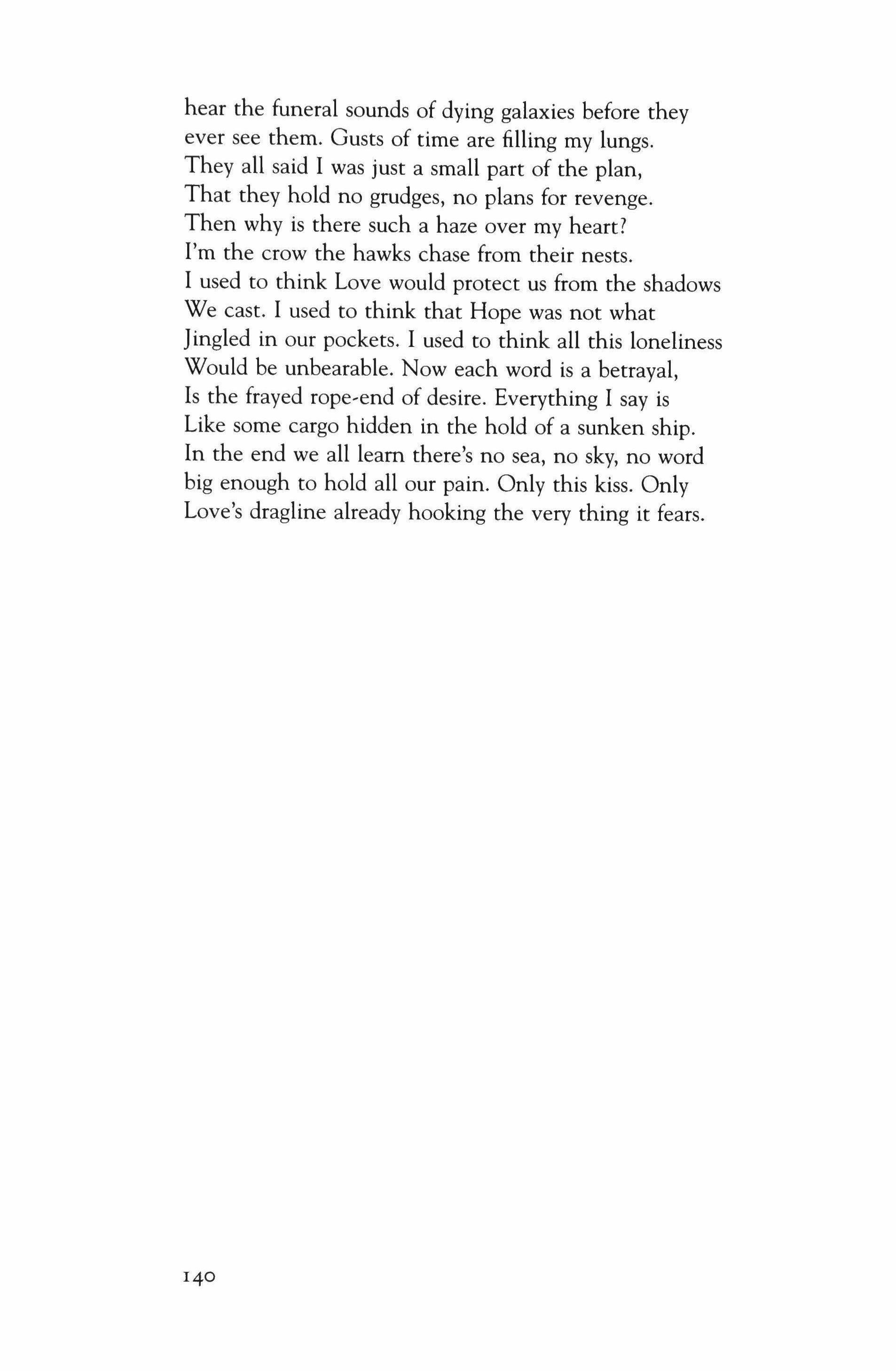
hear the funeral sounds of dying galaxies before they ever see them. Gusts of time are filling my lungs. They all said I was just a small part of the plan, That they hold no grudges, no plans for revenge. Then why is there such a haze over my heart? I'm the crow the hawks chase from their nests. I used to think Love would protect us from the shadows We cast. I used to think that Hope was not what Jingled in our pockets. I used to think all this loneliness Would be unbearable. Now each word is a betrayal, Is the frayed rope-end of desire. Everything I say is Like some cargo hidden in the hold of a sunken ship. In the end we all learn there's no sea, no sky, no word big enough to hold all our pain. Only this kiss. Only Love's dragline already hooking the very thing it fears.
The Terraces of Manarola
On the Cinque Terre, for Terri

I don't remember which life I was leading then, But flakes of light were blowing off the terraces
That ribboned the cliffs like the furrowed faces
Of the men tending the vines. It was this way,
One star whistling another star awake, One shadow
Leaning against another to dream. I wanted to be just The breath you forget upon waking. I wanted the skin
Of the night to be a violet petal, the word for love to be Spoken with the immutable breath of the stars, Something as clear and graceful as that last
Hoopoe bird flashing black and white over these men.
I don't remember how close Mars was then, though it's been getting closer than it has since the stone age, Which helps explain any of our wars, but This was the land of Montale, lemons the size Of the moon, the grapes beginning to speak,
The mimosa praying at roadside shrines
And hanging the flags for Pace, peace, and the men
Leaving a last glance clinging to the perfect rows
As they turned for home. I don't remember if it was
The life I believed or the life I wanted to believe. Even
The stream was exhausted from so much running down hill.
I remember the bar by the water, how someone said Love is the light a moth flies into. Was it flickering out, or shaking its fist at death? You couldn't hear
The warplanes from there. The life we have is The one we leave at the door like our dusty shoes.
The life we have is walking backwards up the cliffs
As if it were the songs everyone sang to forget. I remember one star showing through the rising fog That tried to put its finger on what the night would hide. I remember the eyes of the mules they used to haul
Up stones, one eye trained on the narrow path, one eye
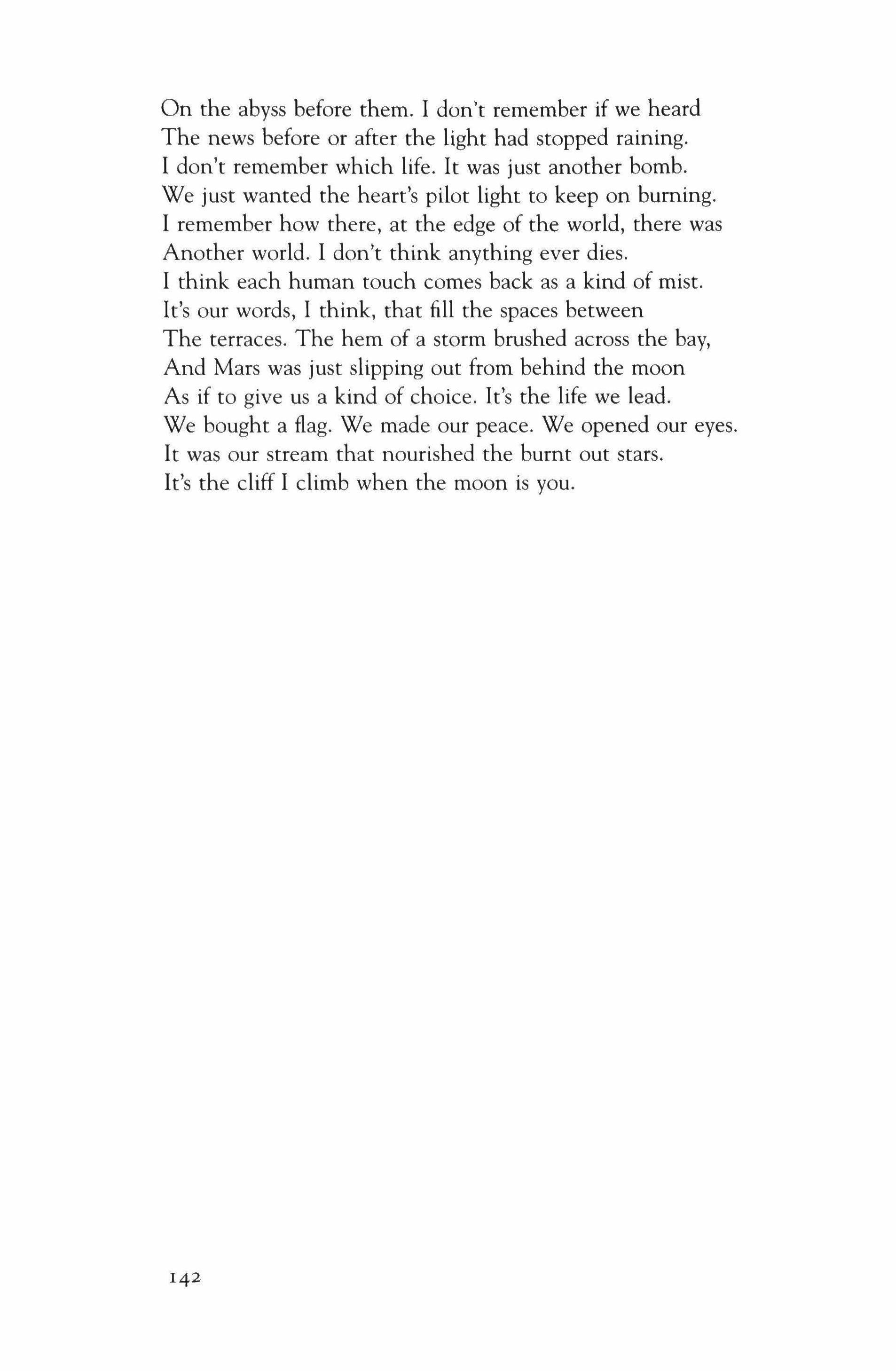
On the abyss before them. I don't remember if we heard The news before or after the light had stopped raining. I don't remember which life. It was just another bomb. We just wanted the heart's pilot light to keep on burning. I remember how there, at the edge of the world, there was Another world. I don't think anything ever dies.
I think each human touch comes back as a kind of mist.
It's our words, I think, that fill the spaces between The terraces. The hem of a storm brushed across the bay, And Mars was just slipping out from behind the moon
As if to give us a kind of choice. It's the life we lead. We bought a flag. We made our peace. We opened our eyes. It was our stream that nourished the burnt out stars.
It's the cliff I climb when the moon is you.
Claire Bateman Gold
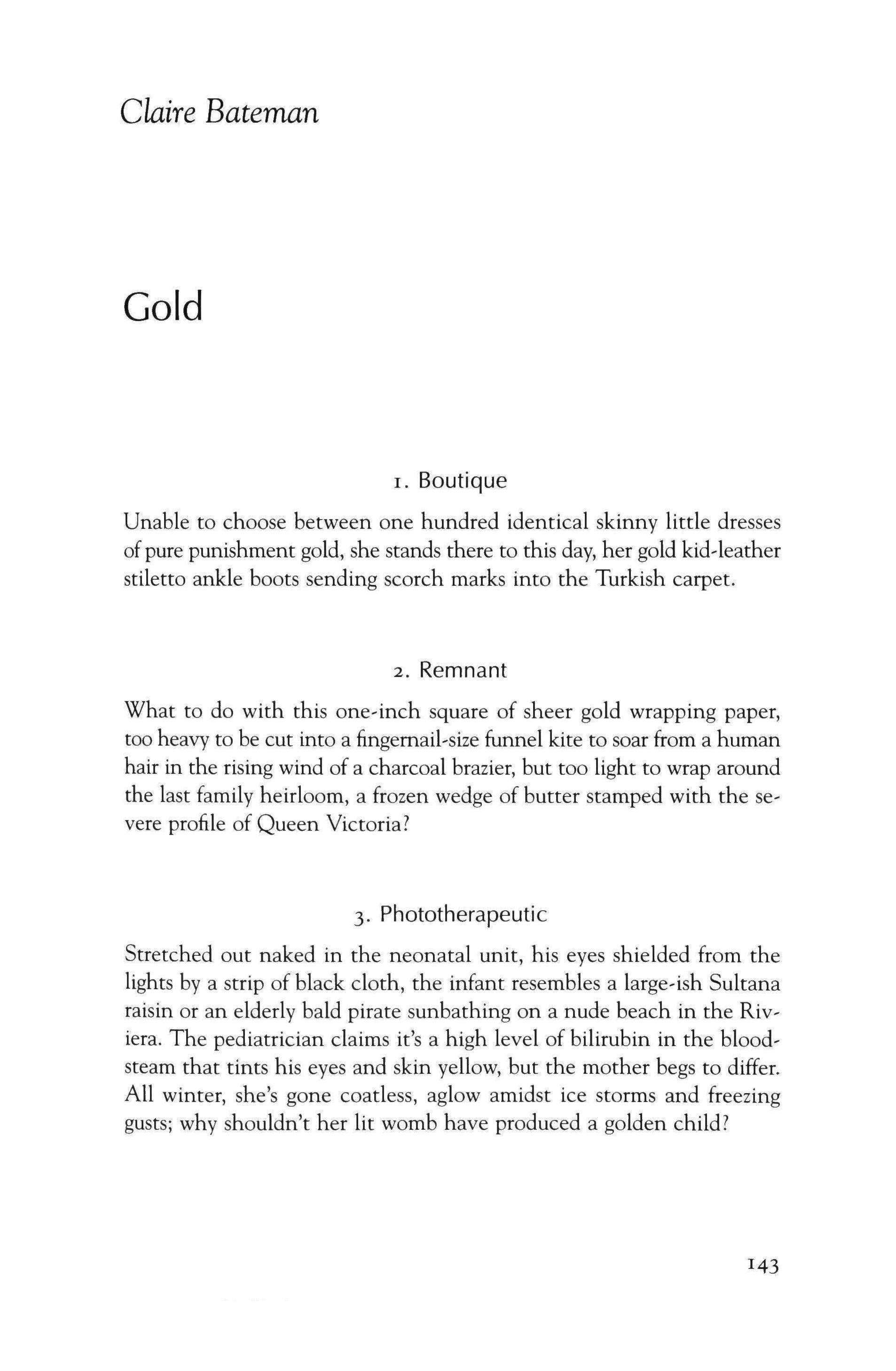
I. Boutique
Unable to choose between one hundred identical skinny little dresses of pure punishment gold, she stands there to this day, her gold kid,leather stiletto ankle boots sending scorch marks into the Turkish carpet.
2. Remnant
What to do with this one, inch square of sheer gold wrapping paper, too heavy to be cut into a fingernail-siae funnel kite to soar from a human hair in the rising wind of a charcoal brazier, but too light to wrap around the last family heirloom, a frozen wedge of butter stamped with the severe profile of Queen Victoria?
3. Phototherapeutic
Stretched out naked in the neonatal unit, his eyes shielded from the lights by a strip of black cloth, the infant resembles a large,ish Sultana raisin or an elderly bald pirate sunbathing on a nude beach in the Riviera. The pediatrician claims it's a high level of bilirubin in the blood, steam that tints his eyes and skin yellow, but the mother begs to differ. All winter, she's gone coatless, aglow amidst ice storms and freezing gusts; why shouldn't her lit womb have produced a golden child?
143

4. Vegetal
Squash is gold. Certain varieties of greenhouse-grown polar tomatoes are gold. In moonlight, albino carrots bum a steady low-voltage gold. But most savory are those vegetables whose hidden gold must be coaxed-or, as vegetable advocates claim, tortured-out of them by the application of heat. Consider, for example, the Vidalia onion. Sliced into a glass pan, laved in clear olive oil, and set upon a medium flame, it immediately shrivels as if from shock, then expands into translucence under your gaze, releasing a rarified golden blush which its reticent nature has hitherto hidden even from itself.
5. Inconsolable
He weeps because he can no longer scrape from slab walls that spongy golden fungus whose delicate bitterness so strangely satisfied his thirst. Upon his release from prison, he smuggled out several strips, stuffing them between his raw ankles and his pitiful socks, but in the open air of the wider world, it withered and soon crumbled, despite the fact that to the extreme discomfiture of his (by now) elderly wife and grown children, he spared no effort in attempting to recreate in his home the exact varieties of dankness and darkness that oppressed him these last twenty-nine years.
6. Family Secret
Passed down from mother to daughter through generations, the process reputedly has something to do with phlostigon, with napthalene, with oil of angelica & attar of jasmine, with reagents, desiccators, & sulfate paper, but no one knows for sure. The resulting phenomenon has been photographed since the late 1860s, when it was first captured on daguerreotype; a single print remains of the seated bride suffering the prolonged immobility required for her wedding portrait. Her gown, a whalebone-corseted, cincture-bodiced, pearl-buttoned, high-collared contraption, seems less elegant than afflictive. Her gaze is steady, only barely discernibly bored. The scene's only vibrance appears in the radiance flowing around the sausage-curl-Sc-ringlet sculpture of her hair-her wedding veil, you assume at first, but there's even in this overexposed, dimensionlessly bright print, you can tell that there's
144

something odd about the way it fans out, the shapes of its line & weave. Alter a moment, you realize with a shock that it's nothing less than a bridal crown of flame: her hair bums, but is not consumed.
Nowadays, of course, photographers can manipulate the darkness & density of surrounding shadows by adjusting the film speed setting, or, when equipped with a flash, they can reduce the amount of glare by in, creasing their actual distance from the subject while zooming in; thus, the flames show up distinctly in the modem glossy prints, each nimbused bride slicing the cake, hurling the bouquet, & dancing at arm's length with the groom, who must maintain a safe distance throughout the festivities.
Still, though, most people prefer the original daguerreotype, not de' spite but because of its weird, washed,out flatness, which seems to pre, serve the mystery of the phenomenon in a way that contemporary photography, forever associated in the public's mind with special effects & digital intervention, is unable to accomplish. In the imagination, that first print's flame bums an ever,deepening gold beneath its sepia wash.
145
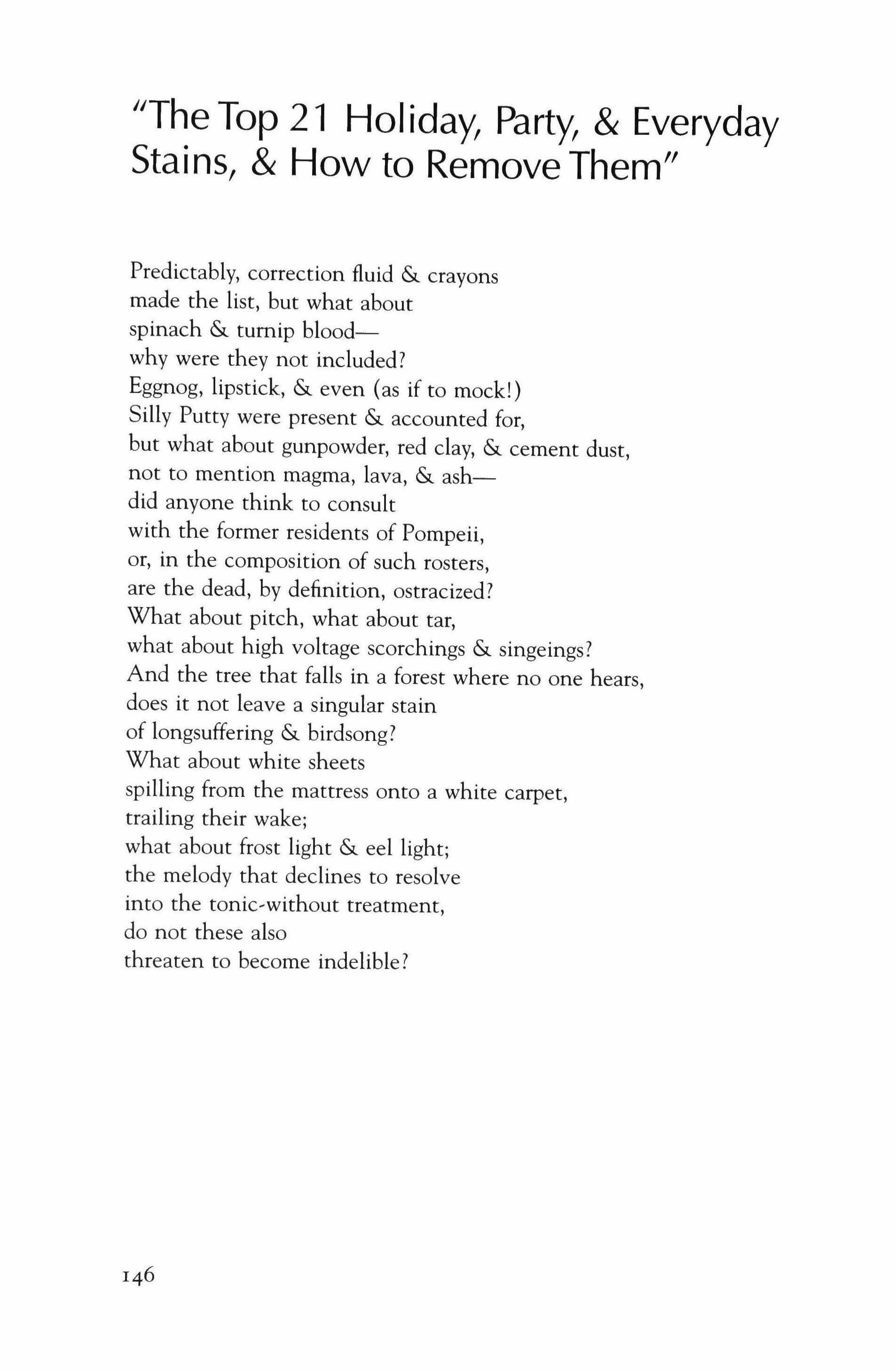
"The Top 21 Holiday, Party, & Everyday Stains, & How to Remove Them"
Predictably, correction fluid & crayons made the list, but what about spinach & turnip bloodwhy were they not included? Eggnog, lipstick, & even (as if to mockl) Silly Putty were present & accounted for, but what about gunpowder, red clay, & cement dust, not to mention magma, lava, & ashdid anyone think to consult with the former residents of Pompeii, or, in the composition of such rosters, are the dead, by definition, ostracized? What about pitch, what about tar, what about high voltage scorchings & singeings? And the tree that falls in a forest where no one hears, does it not leave a singular stain of longsuffering & birdsong? What about white sheets spilling from the mattress onto a white carpet, trailing their wake; what about frost light & eel light; the melody that declines to resolve into the tonic-without treatment, do not these also threaten to become indelible?
Sisters
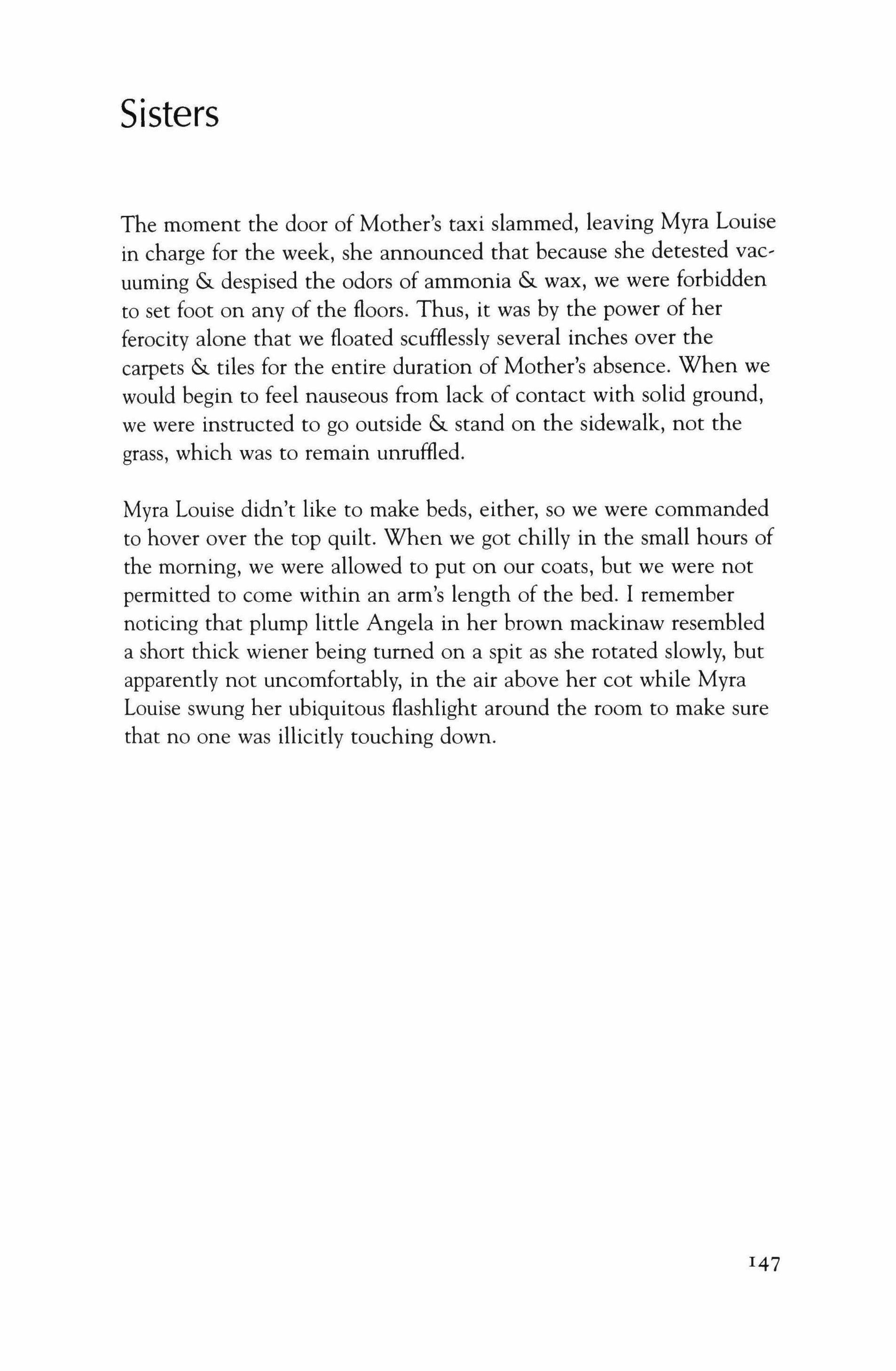
The moment the door of Mother's taxi slammed, leaving Myra Louise in charge for the week, she announced that because she detested vacuuming & despised the odors of ammonia & wax, we were forbidden to set foot on any of the floors. Thus, it was by the power of her ferocity alone that we floated scufflessly several inches over the carpets & tiles for the entire duration of Mother's absence. When we would begin to feel nauseous from lack of contact with solid ground, we were instructed to go outside & stand on the sidewalk, not the grass, which was to remain unruffled.
Myra Louise didn't like to make beds, either, so we were commanded to hover over the top quilt. When we got chilly in the small hours of the morning, we were allowed to put on our coats, but we were not permitted to come within an arm's length of the bed. I remember noticing that plump little Angela in her brown mackinaw resembled a short thick wiener being turned on a spit as she rotated slowly, but apparently not uncomfortably, in the air above her cot while Myra Louise swung her ubiquitous flashlight around the room to make sure that no one was illicitly touching down.
147
Steve Orlen
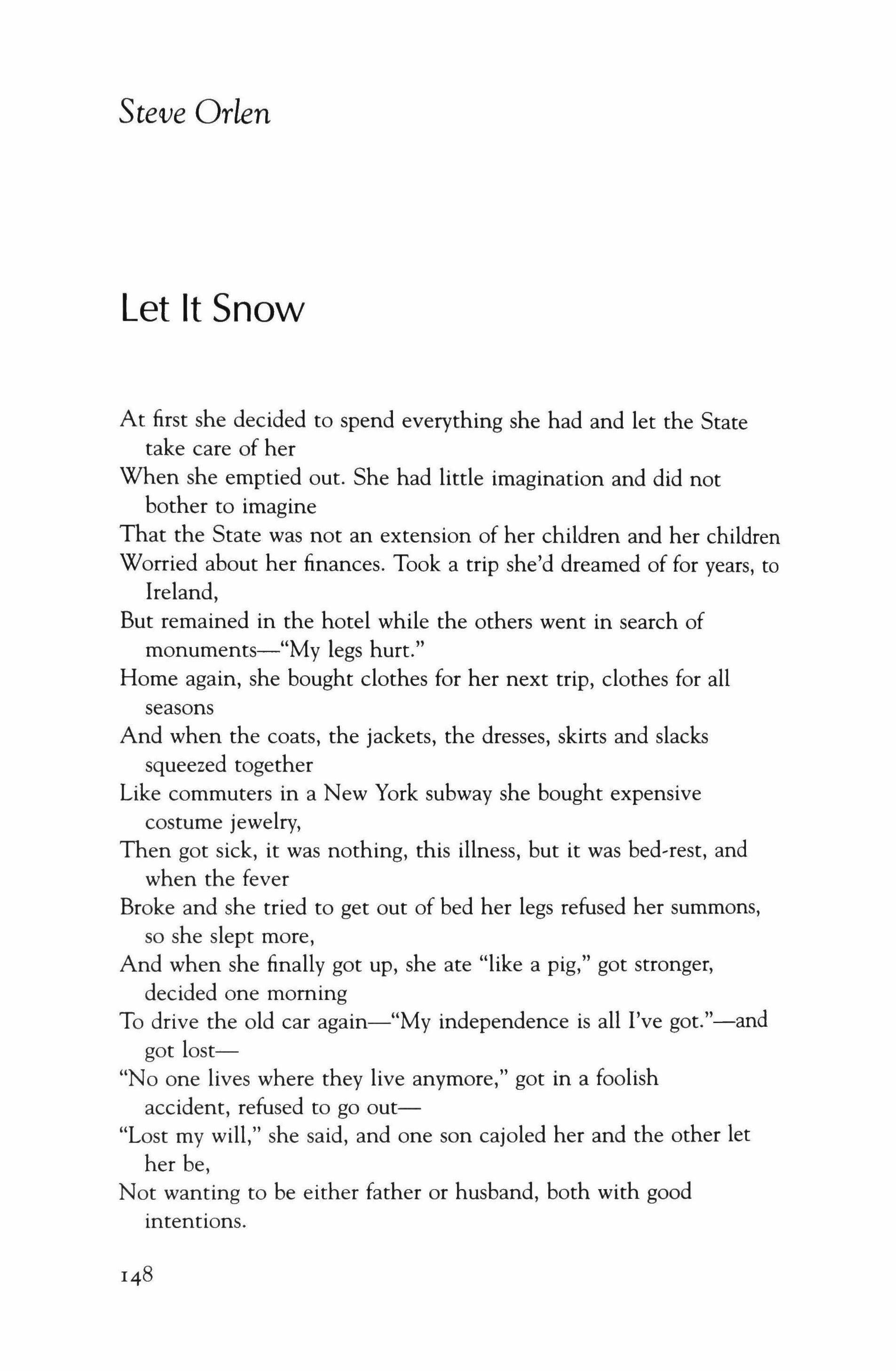
Let It Snow
At first she decided to spend everything she had and let the State take care of her
When she emptied out. She had little imagination and did not bother to imagine
That the State was not an extension of her children and her children
Worried about her finances. Took a trip she'd dreamed of for years, to Ireland,
But remained in the hotel while the others went in search of monuments-"My legs hurt."
Home again, she bought clothes for her next trip, clothes for all seasons
And when the coats, the jackets, the dresses, skirts and slacks squeezed together
Like commuters in a New York subway she bought expensive costume jewelry,
Then got sick, it was nothing, this illness, but it was bed-rest, and when the fever
Broke and she tried to get out of bed her legs refused her summons, so she slept more,
And when she finally got up, she ate "like a pig," got stronger, decided one morning
To drive the old car again-"My independence is all I've got."-and got lost-
"No one lives where they live anymore," got in a foolish accident, refused to go out-
"Lost my will," she said, and one son cajoled her and the other let her be,
Not wanting to be either father or husband, both with good intentions.
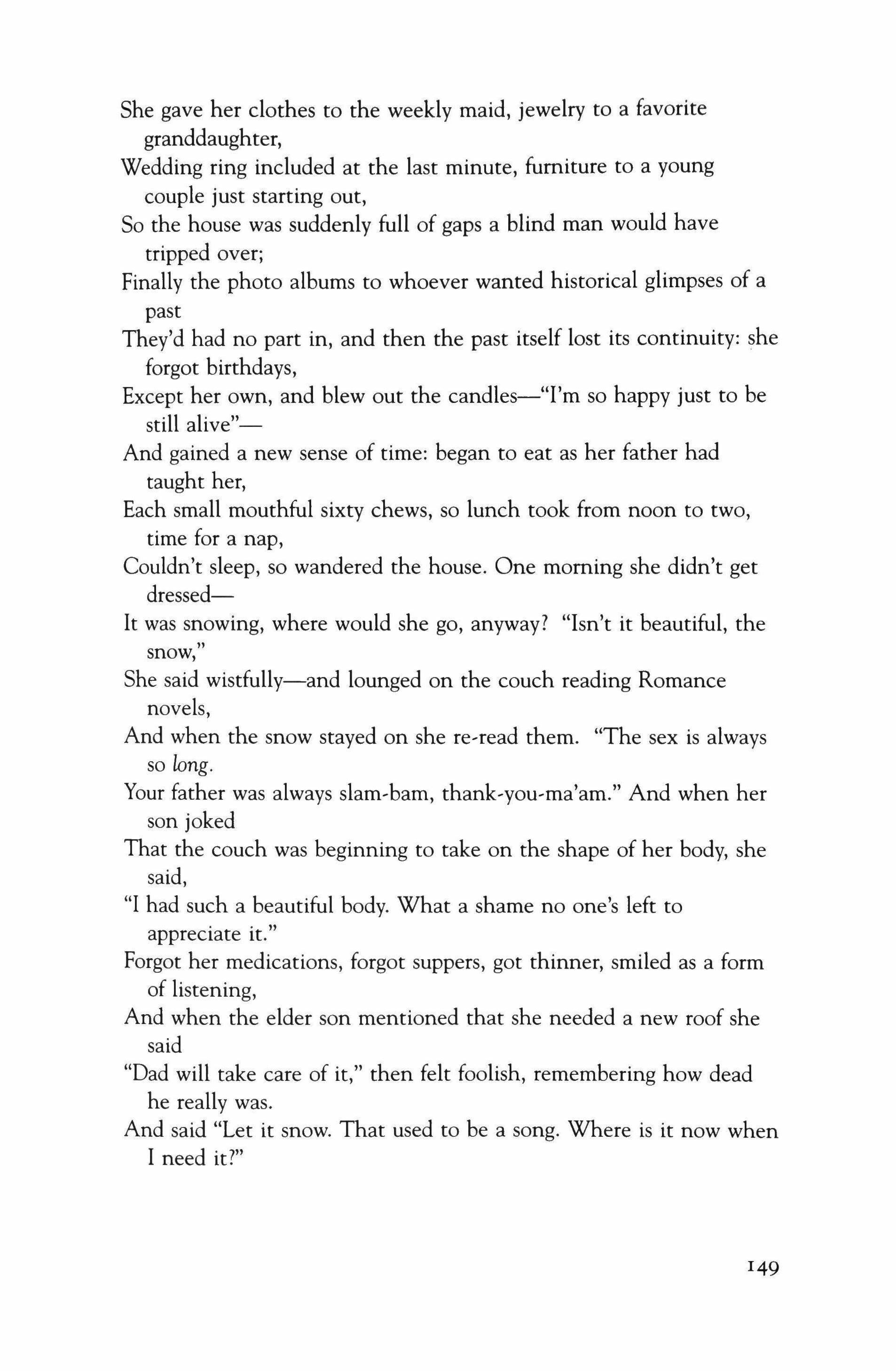
She gave her clothes to the weekly maid, jewelry to a favorite granddaughter,
Wedding ring included at the last minute, furniture to a young couple just starting out,
So the house was suddenly full of gaps a blind man would have tripped over;
Finally the photo albums to whoever wanted historical glimpses of a past
They'd had no part in, and then the past itself lost its continuity: she forgot birthdays,
Except her own, and blew out the candles-"I'm so happy just to be still alive"-
And gained a new sense of time: began to eat as her father had taught her,
Each small mouthful sixty chews, so lunch took from noon to two, time for a nap,
Couldn't sleep, so wandered the house. One morning she didn't get dressed-
It was snowing, where would she go, anyway? "Isn't it beautiful, the snow,"
She said wistfully-and lounged on the couch reading Romance novels,
And when the snow stayed on she re-read them. "The sex is always so long.
Your father was always slam-bam, thank-you-ma'am." And when her son joked
That the couch was beginning to take on the shape of her body, she said, "I had such a beautiful body. What a shame no one's left to appreciate it."
Forgot her medications, forgot suppers, got thinner, smiled as a form of listening,
And when the elder son mentioned that she needed a new roof she said "Dad will take care of it," then felt foolish, remembering how dead he really was.
And said "Let it snow. That used to be a song. Where is it now when I need it?"
149
A Conversation
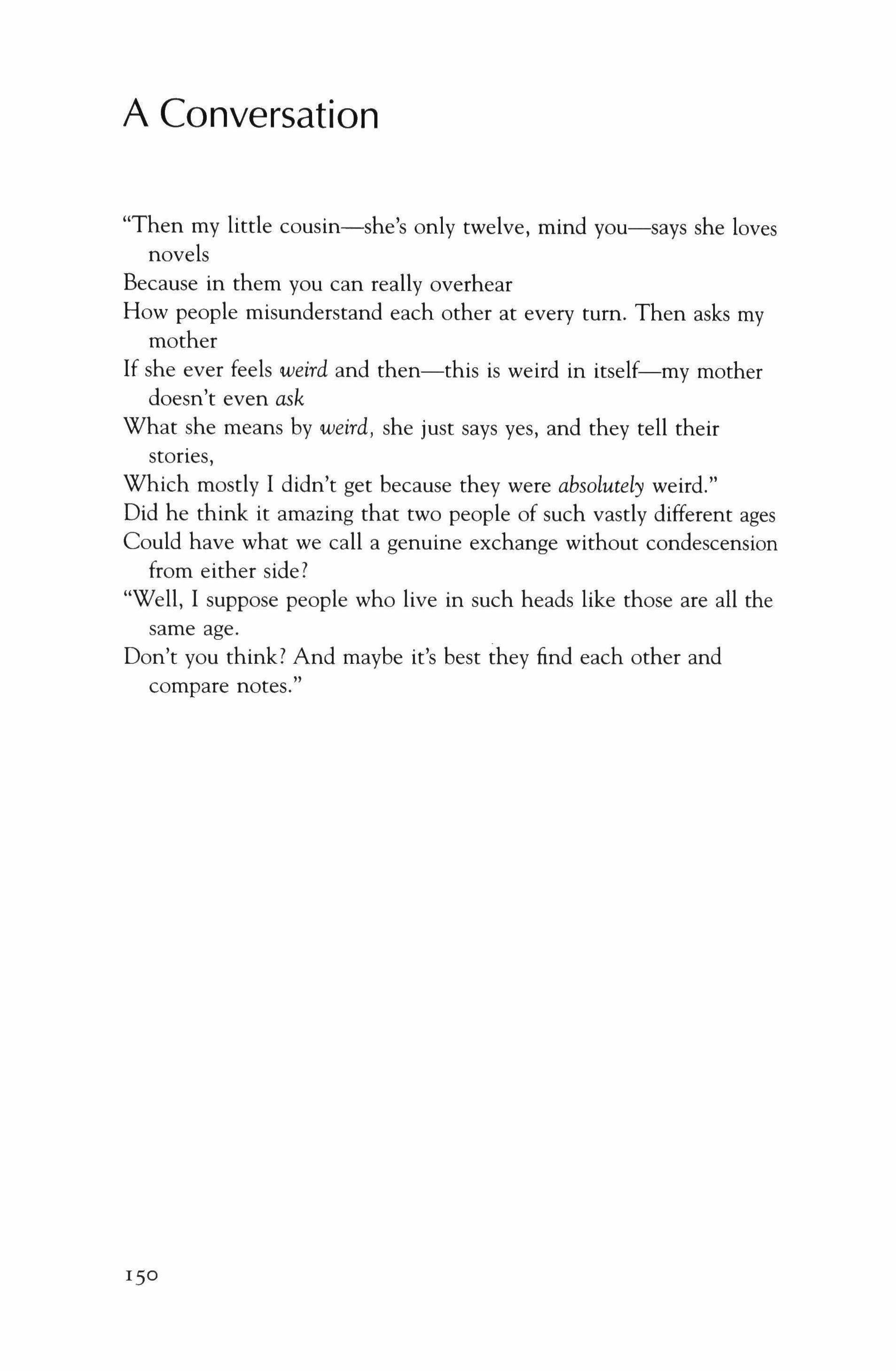
"Then my little cousin-she's only twelve, mind you-says she loves novels
Because in them you can really overhear
How people misunderstand each other at every turn. Then asks my mother
If she ever feels weird and then-this is weird in itself-my mother doesn't even ask
What she means by weird, she just says yes, and they tell their stories,
Which mostly I didn't get because they were absolutely weird."
Did he think it amazing that two people of such vastly different ages
Could have what we call a genuine exchange without condescension from either side?
"Well, I suppose people who live in such heads like those are all the same age.
Don't you think? And maybe it's best they find each other and compare notes."
Cynthia Huntington
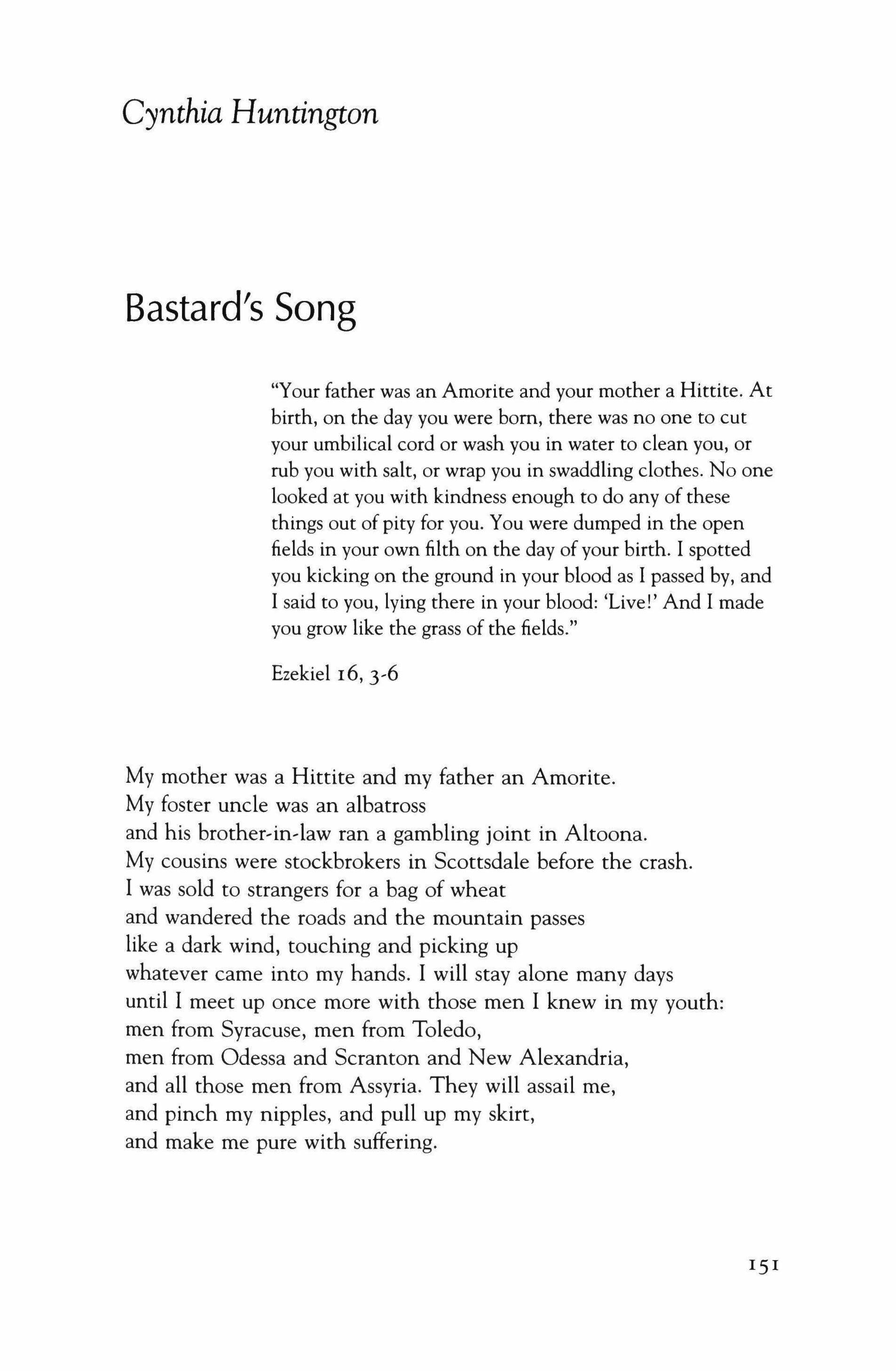
Bastard's Song
"Your father was an Amorite and your mother a Hittite. At birth, on the day you were born, there was no one to cut your umbilical cord or wash you in water to clean you, or rub you with salt, or wrap you in swaddling clothes. No one looked at you with kindness enough to do any of these things out of pity for you. You were dumped in the open fields in your own filth on the day of your birth. I spotted you kicking on the ground in your blood as I passed by, and I said to you, lying there in your blood: 'Live!' And I made you grow like the grass of the fields."
Ezekiel 16,3-6
My mother was a Hittite and my father an Amorite. My foster uncle was an albatross and his brother-in-law ran a gambling joint in Altoona. My cousins were stockbrokers in Scottsdale before the crash. I was sold to strangers for a bag of wheat and wandered the roads and the mountain passes like a dark wind, touching and picking up whatever came into my hands. I will stay alone many days until I meet up once more with those men I knew in my youth: men from Syracuse, men from Toledo, men from Odessa and Scranton and New Alexandria, and all those men from Assyria. They will assail me, and pinch my nipples, and pull up my skirt, and make me pure with suffering.
151
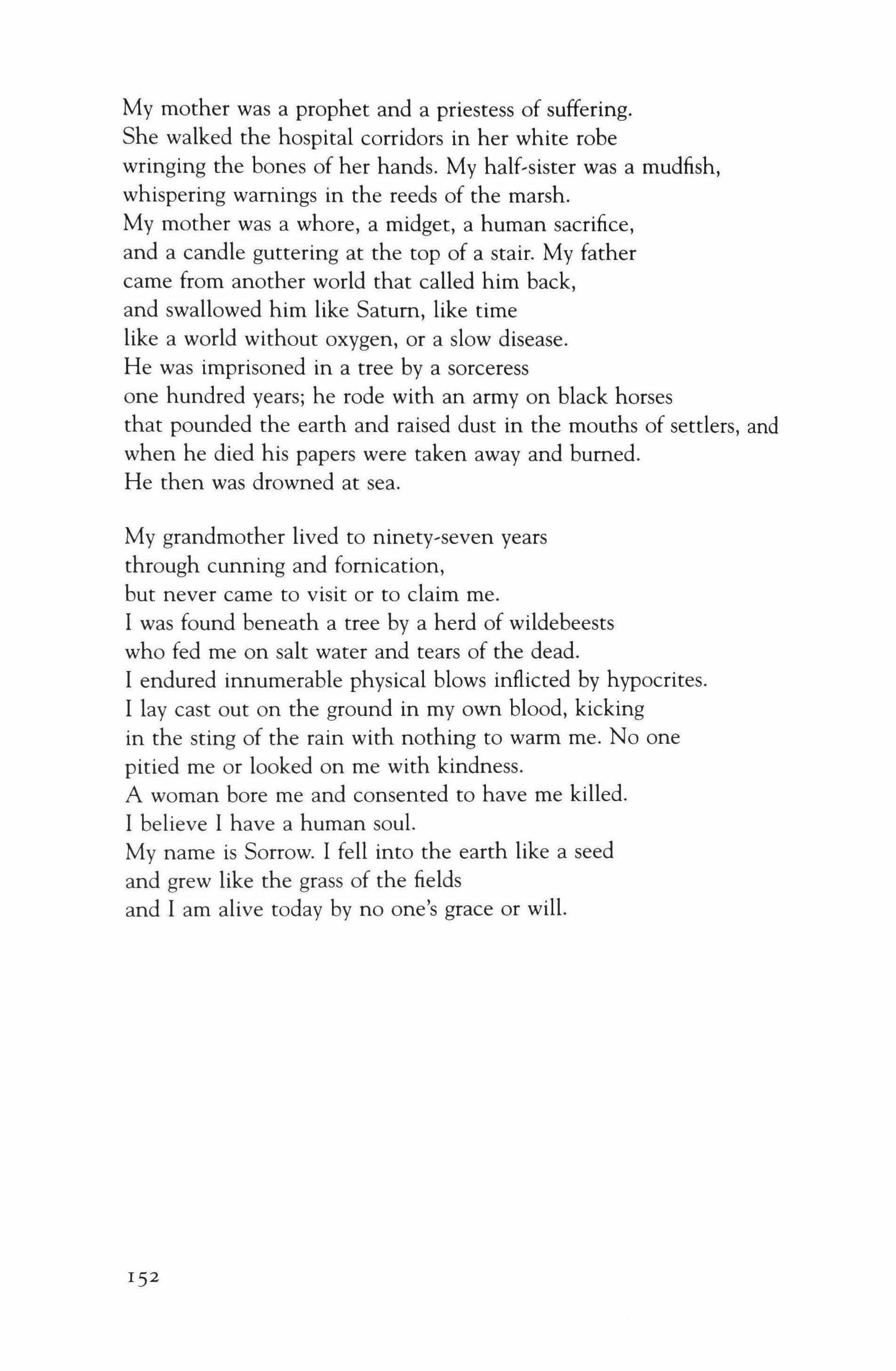
My mother was a prophet and a priestess of suffering. She walked the hospital corridors in her white robe wringing the bones of her hands. My half-sister was a mudfish, whispering warnings in the reeds of the marsh.
My mother was a whore, a midget, a human sacrifice, and a candle guttering at the top of a stair. My father came from another world that called him back, and swallowed him like Saturn, like time like a world without oxygen, or a slow disease.
He was imprisoned in a tree by a sorceress one hundred years; he rode with an army on black horses that pounded the earth and raised dust in the mouths of settlers, and when he died his papers were taken away and burned. He then was drowned at sea.
My grandmother lived to ninety-seven years through cunning and fornication, but never came to visit or to claim me.
I was found beneath a tree by a herd of wildebeests who fed me on salt water and tears of the dead. I endured innumerable physical blows inflicted by hypocrites.
I lay cast out on the ground in my own blood, kicking in the sting of the rain with nothing to warm me. No one pitied me or looked on me with kindness.
A woman bore me and consented to have me killed.
I believe I have a human soul.
My name is Sorrow. I fell into the earth like a seed and grew like the grass of the fields and I am alive today by no one's grace or will.
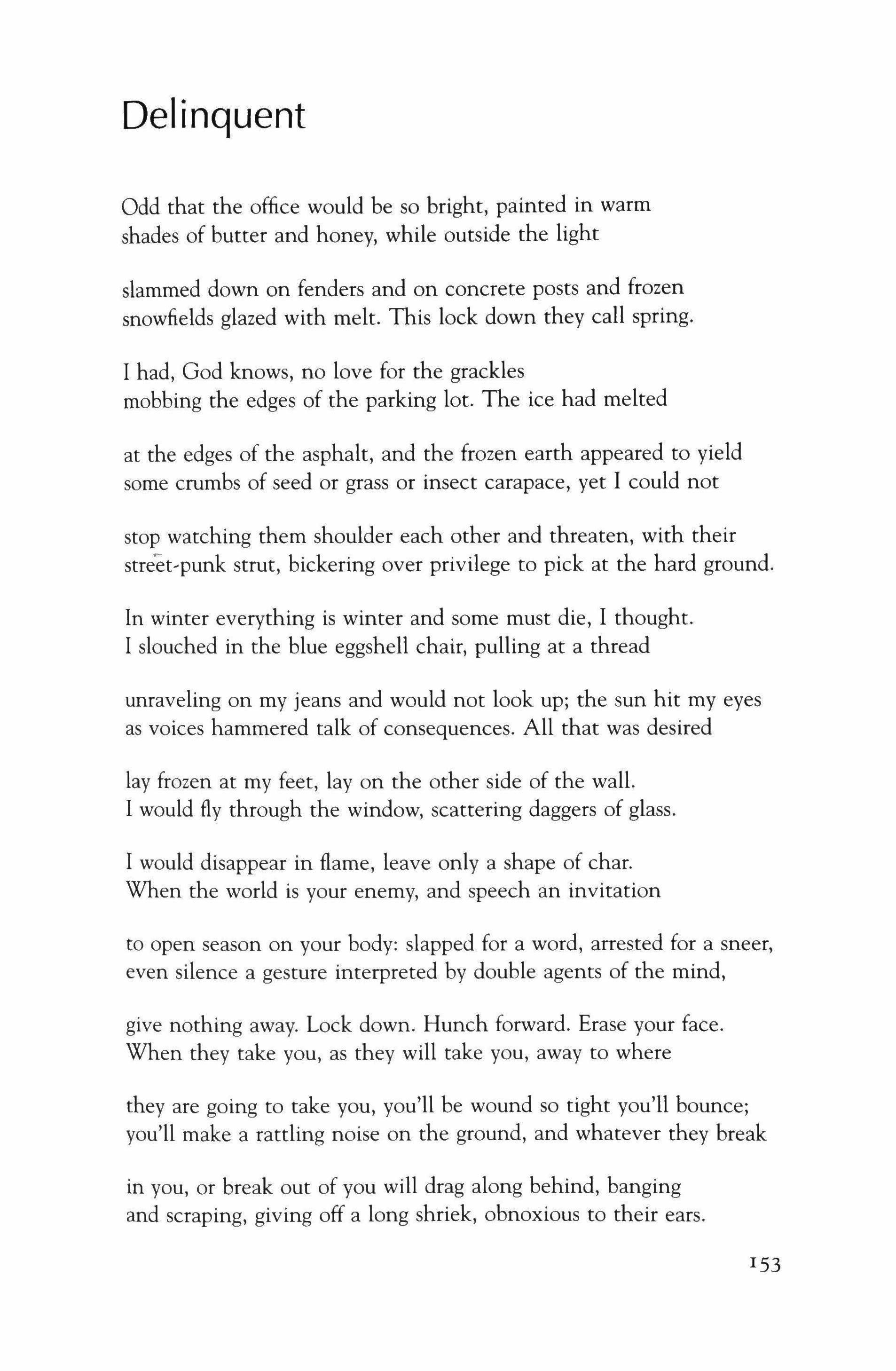
Delinquent
Odd that the office would be so bright, painted in warm shades of butter and honey, while outside the light
slammed down on fenders and on concrete posts and frozen snowfields glazed with melt. This lock down they call spring.
I had, God knows, no love for the grackles mobbing the edges of the parking lot. The ice had melted at the edges of the asphalt, and the frozen earth appeared to yield some crumbs of seed or grass or insect carapace, yet I could not stop watching them shoulder each other and threaten, with their street-punk strut, bickering over privilege to pick at the hard ground.
In winter everything is winter and some must die, I thought. I slouched in the blue eggshell chair, pulling at a thread
unraveling on my jeans and would not look up; the sun hit my eyes as voices hammered talk of consequences. All that was desired
lay frozen at my feet, lay on the other side of the wall. I would fly through the window, scattering daggers of glass.
I would disappear in flame, leave only a shape of char. When the world is your enemy, and speech an invitation to open season on your body: slapped for a word, arrested for a sneer, even silence a gesture interpreted by double agents of the mind, give nothing away. Lock down. Hunch forward. Erase your face. When they take you, as they will take you, away to where they are going to take you, you'll be wound so tight you'll bounce; you'll make a rattling noise on the ground, and whatever they break in you, or break out of you will drag along behind, banging and scraping, giving off a long shriek, obnoxious to their ears.
153
The child sat still
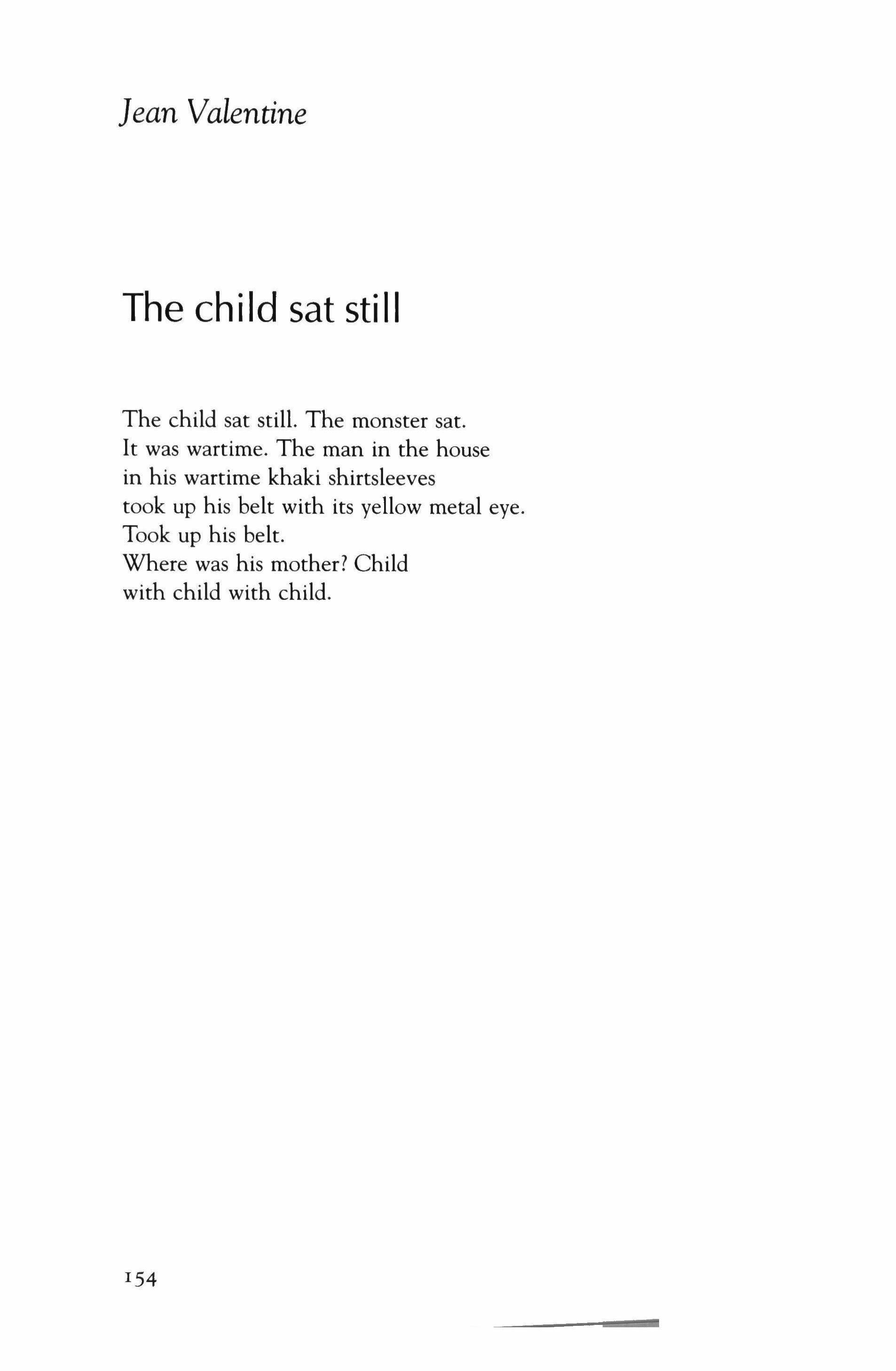
The child sat still. The monster sat. It was wartime. The man in the house in his wartime khaki shirtsleeves took up his belt with its yellow metal eye. Took up his belt. Where was his mother? Child with child with child.
]ean
Valentine
I54
Longing
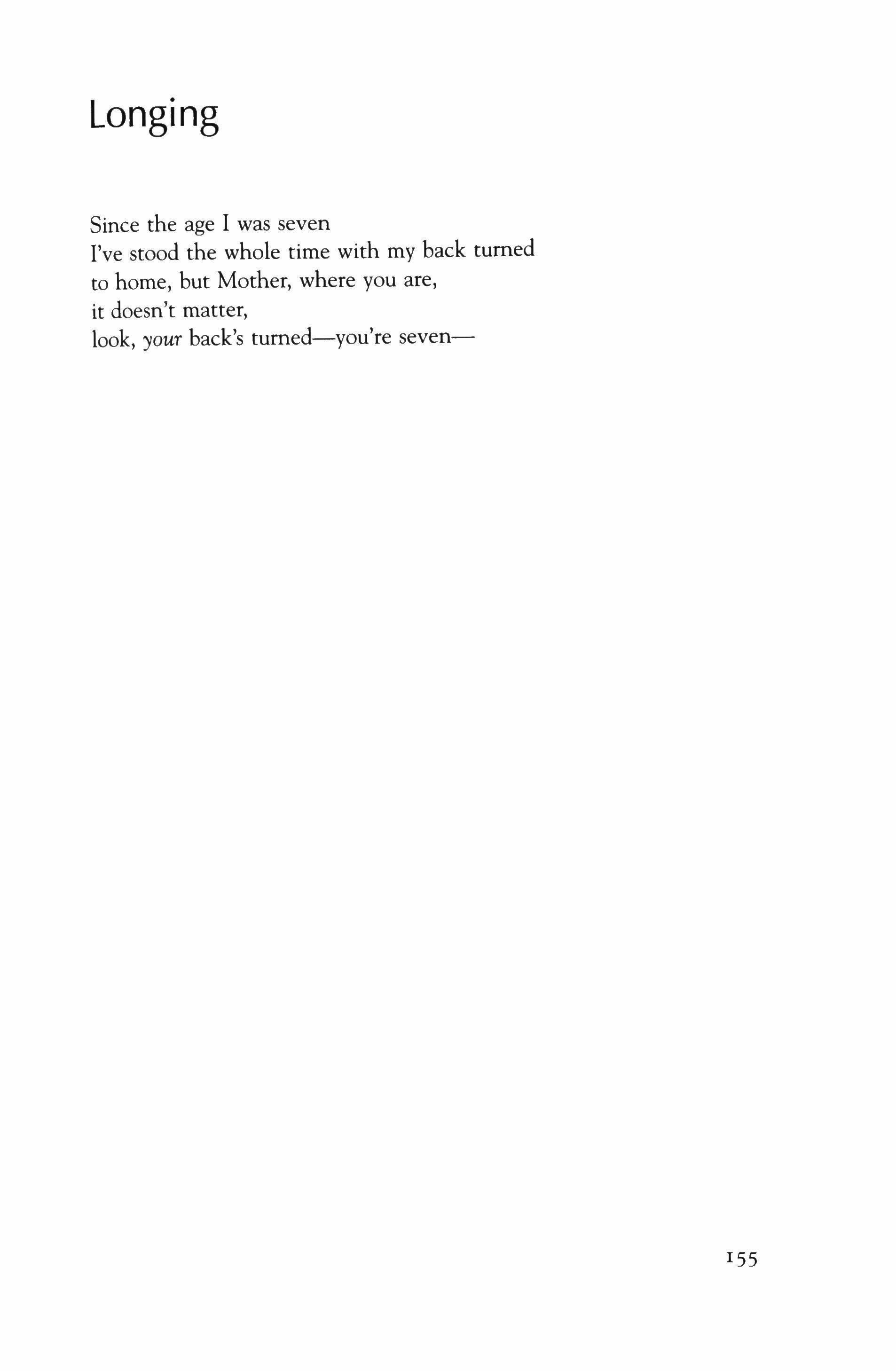
Since the age I was seven I've stood the whole time with my back turned to home, but Mother, where you are, it doesn't matter, look, your back's turned-you're seven-
155
Alane Rollings
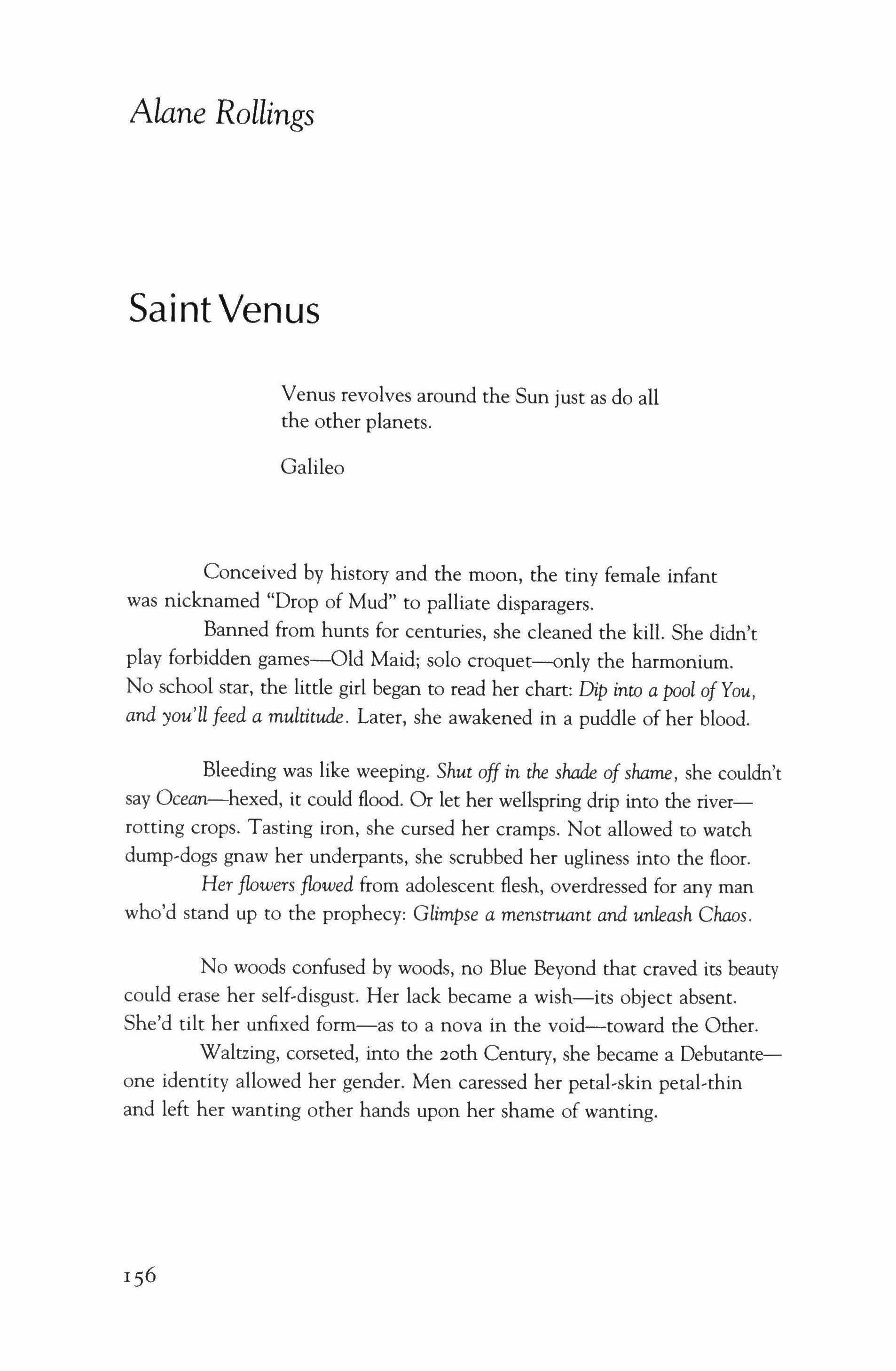
Saint Venus
Venus revolves around the Sun just as do all the other planets.
Galileo
Conceived by history and the moon, the tiny female infant was nicknamed "Drop of Mud" to palliate disparagers. Banned from hunts for centuries, she cleaned the kill. She didn't play forbidden games-Old Maid; solo croquet--only the harmonium. No school star, the little girl began to read her chart: Dip into a pool of You, and you'll feed a multitude. Later, she awakened in a puddle of her blood.
Bleeding was like weeping. Shut off in the shade of shame, she couldn't say Ocean-hexed, it could flood. Or let her wellspring drip into the riverrotting crops. Tasting iron, she cursed her cramps. Not allowed to watch dump-dogs gnaw her underpants, she scrubbed her ugliness into the floor. Her flowers flowed from adolescent flesh, overdressed for any man who'd stand up to the prophecy: Glimpse a menstruant and unleash Chaos.
No woods confused by woods, no Blue Beyond that craved its beauty could erase her self-disgust. Her lack became a wish-its object absent. She'd tilt her unfixed form-as to a nova in the void-toward the Other.
Waltzing, corseted, into the zoth Century, she became a Debutanteone identity allowed her gender. Men caressed her petal-skin petal-thin and left her wanting other hands upon her shame of wanting.
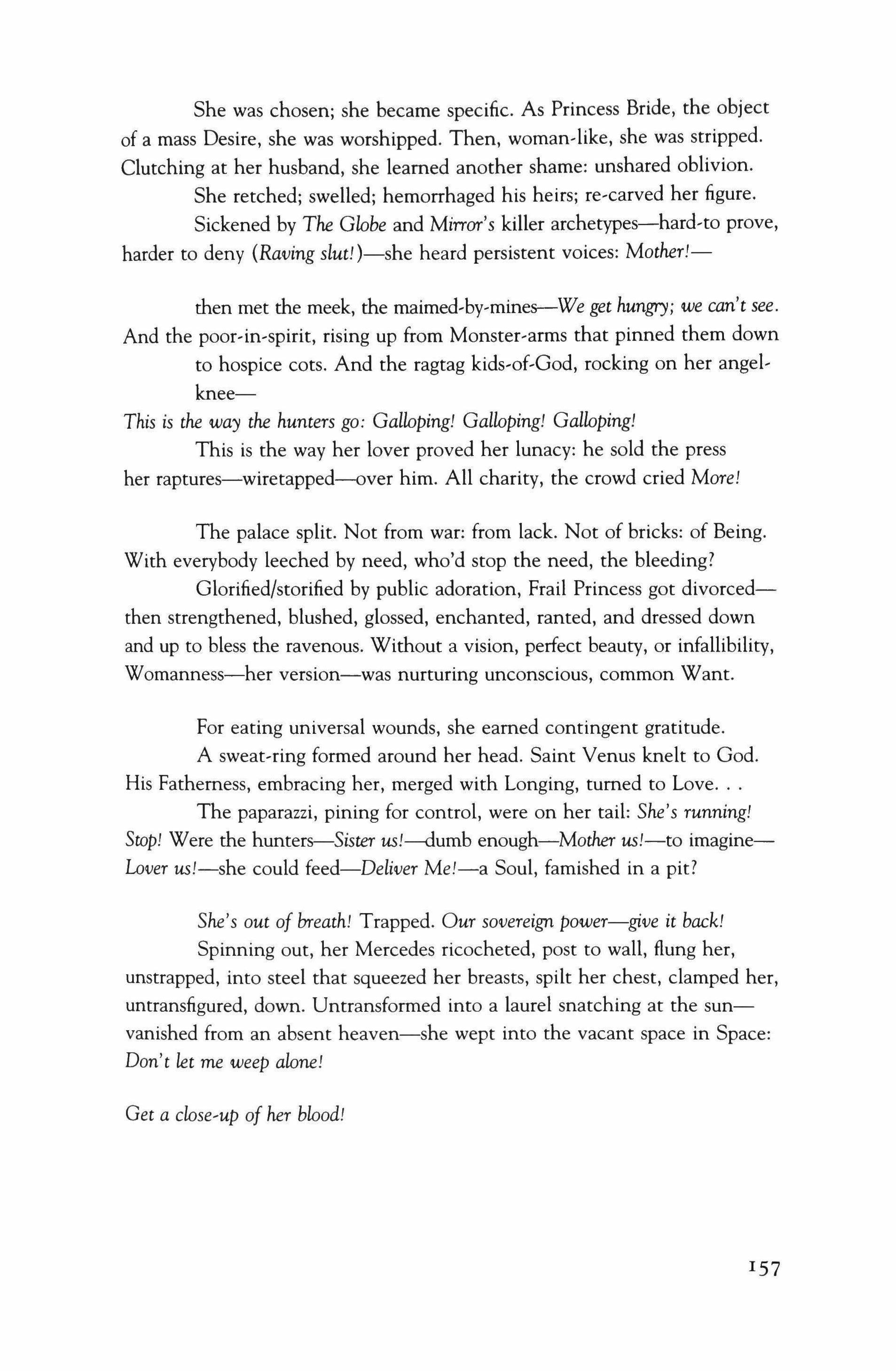
She was chosen; she became specific. As Princess Bride, the object of a mass Desire, she was worshipped. Then, woman-like, she was stripped. Clutching at her husband, she learned another shame: unshared oblivion. She retched; swelled; hemorrhaged his heirs; re-carved her figure. Sickened by The Globe and Mirror's killer archetypes-hard-to prove, harder to deny (Raving slut!}-she heard persistent voices: Mother!-
then met the meek, the maimed-by-mines--We get hungry; we can't see. And the poor-in-spirit, rising up from Monster-arms that pinned them down to hospice cots. And the ragtag kids-of-God, rocking on her angelknee-
This is the way the hunters go: Galloping! Galloping! Galloping!
This is the way her lover proved her lunacy: he sold the press her raptures-wiretapped-over him. All charity, the crowd cried More!
The palace split. Not from war: from lack. Not of bricks: of Being. With everybody leeched by need, who'd stop the need, the bleeding?
Glorified/storified by public adoration, Frail Princess got divorcedthen strengthened, blushed, glossed, enchanted, ranted, and dressed down and up to bless the ravenous. Without a vision, perfect beauty, or infallibility, Womanness-her version-was nurturing unconscious, common Want.
For eating universal wounds, she earned contingent gratitude.
A sweat-ring formed around her head. Saint Venus knelt to God. His Fatherness, embracing her, merged with Longing, turned to Love
The paparazzi, pining for control, were on her tail: She's running! StoP! Were the hunters-Sister us!-dumb enough-Mother us!-to imagineLover us!-she could feed-Deliver Me!-a Soul, famished in a pit?
She's out of breath! Trapped. Our sovereign power-give it back!
Spinning out, her Mercedes ricocheted, post to wall, flung her, unstrapped, into steel that squeezed her breasts, spilt her chest, clamped her, untransfigured, down. Untransformed into a laurel snatching at the sunvanished from an absent heaven-she wept into the vacant space in Space: Don't let me weep alone!
Get a close-up of her blood!
157
Beckian Fritz Goldberg
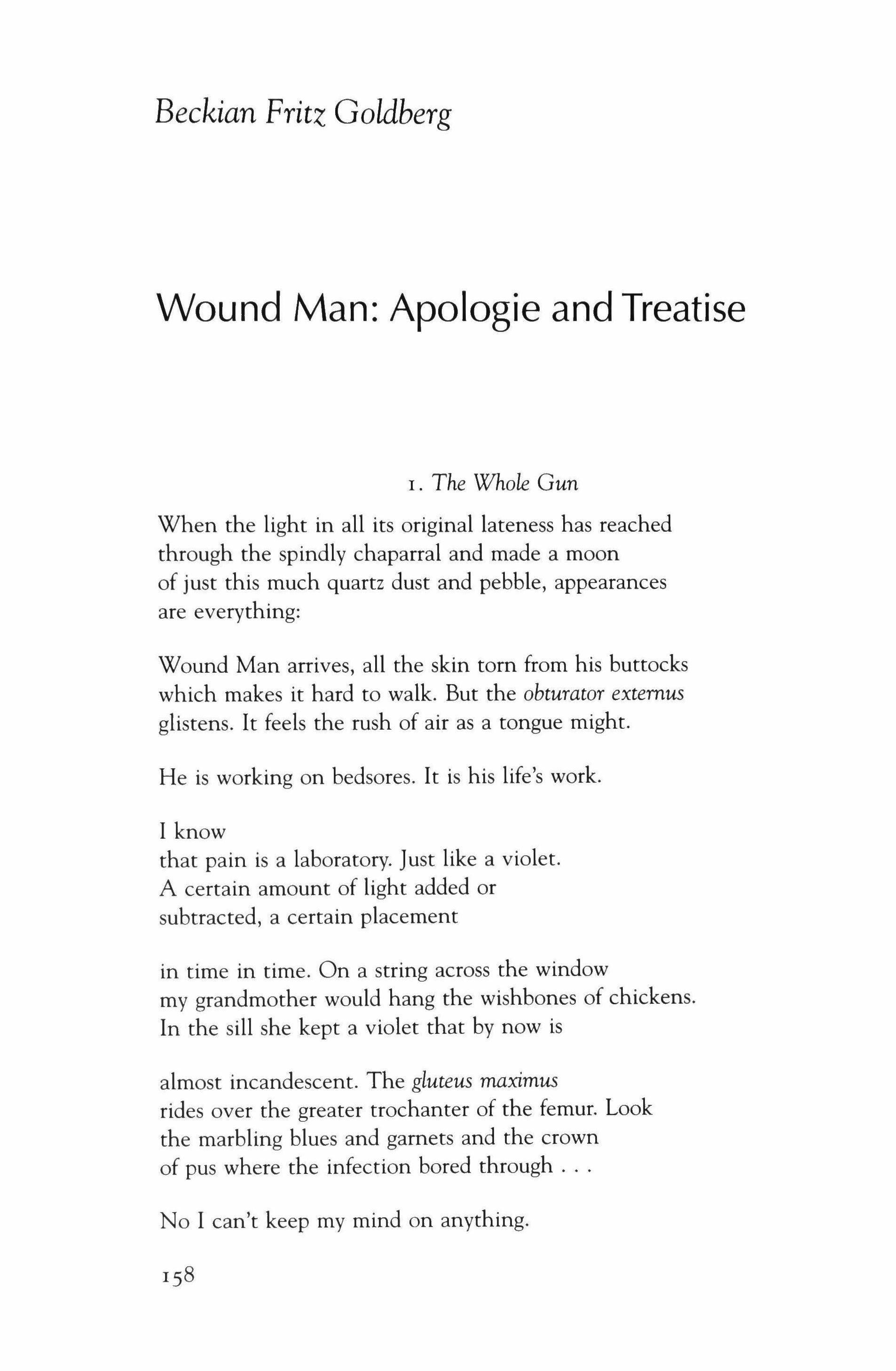
Wound Man: Apologie and Treatise
I. The Whole Gun
When the light in all its original lateness has reached through the spindly chaparral and made a moon of just this much quartz dust and pebble, appearances are everything:
Wound Man arrives, all the skin torn from his buttocks which makes it hard to walk. But the obturator extemus glistens. It feels the rush of air as a tongue might.
He is working on bedsores. It is his life's work.
I know that pain is a laboratory. Just like a violet. A certain amount of light added or subtracted, a certain placement in time in time. On a string across the window my grandmother would hang the wishbones of chickens. In the sill she kept a violet that by now is almost incandescent. The gluteus maximus rides over the greater trochanter of the femur. Look the marbling blues and garnets and the crown of pus where the infection bored through
No I can't keep my mind on anything.
Wound Man also has a needle in his genitals. And he is lying down, now, in the prodigal twilight. The whole desert glittering like a smashed bottle. Here, we can't even plant trees. We have to jackhammer them in. This body,
though, leaks light, it measures its bag of light. It will give it to science. And it will land on a lake going either way, way of the wavering underbird locked breast to breast with the solid drake. Take longing close
to what it wants and the whole gun goes through you with the shot. Wound Man has come from the north with a pistol jammed to his head and his head dreaming of violets and his mouth full of blood. Part of the skin is missingbut this ain't personal.
2. Lullaby
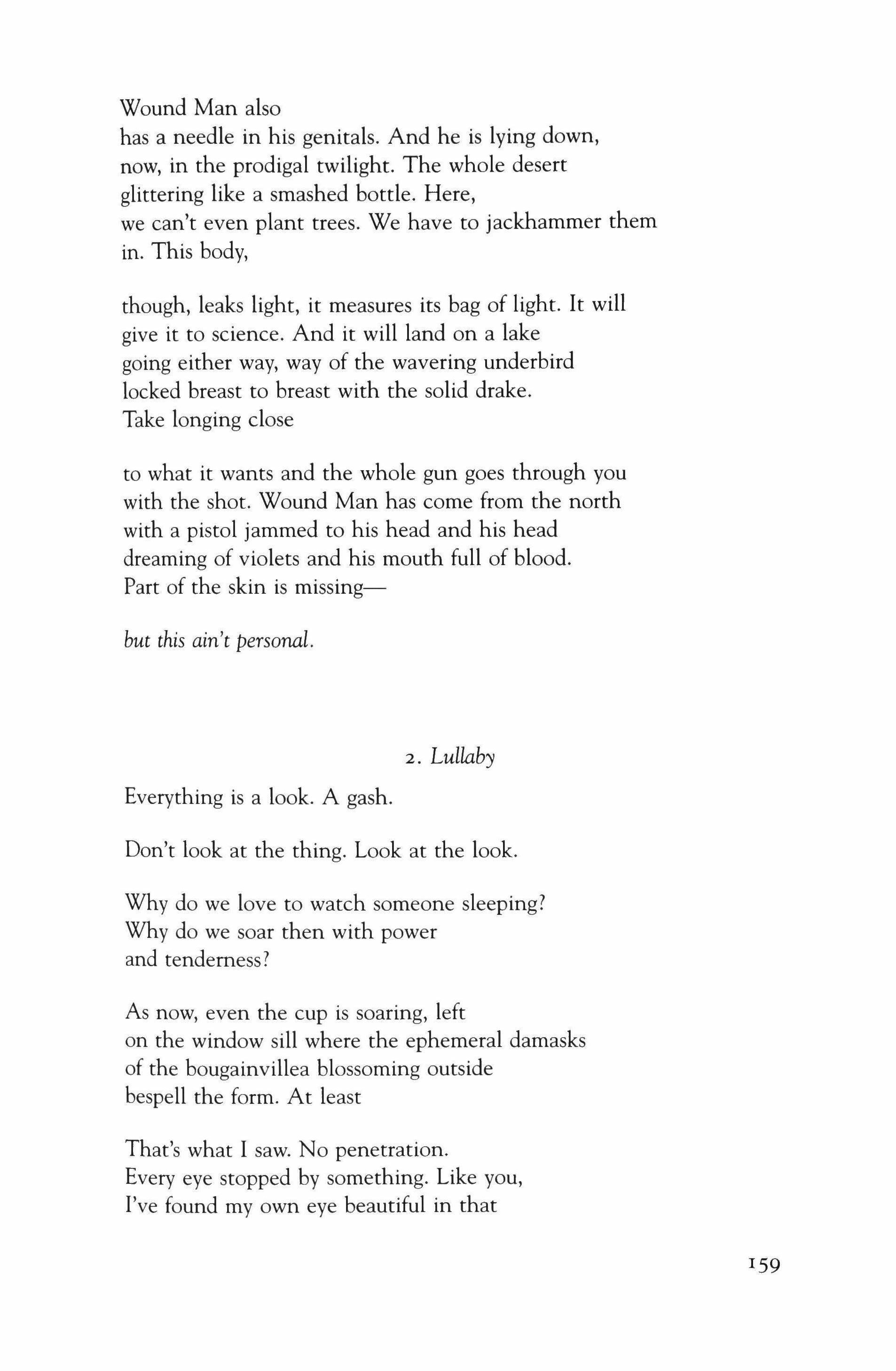
Everything is a look. A gash.
Don't look at the thing. Look at the look.
Why do we love to watch someone sleeping? Why do we soar then with power and tenderness?
As now, even the cup is soaring, left on the window sill where the ephemeral damasks of the bougainvillea blossoming outside bespell the form. At least
That's what I saw. No penetration. Every eye stopped by something. Like you, I've found my own eye beautiful in that
159
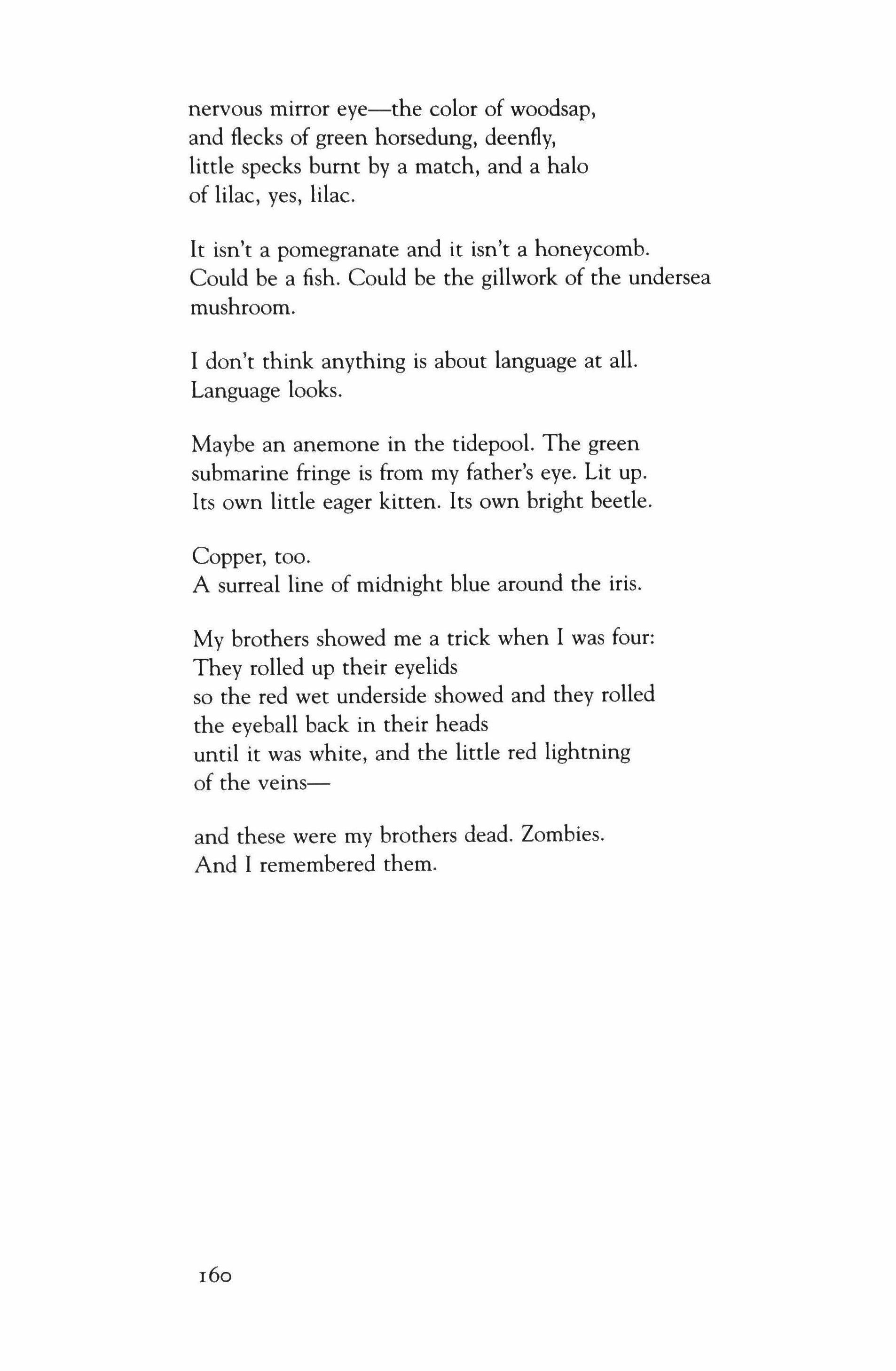
nervous mirror eye-the color of woodsap, and flecks of green horsedung, deenfly, little specks burnt by a match, and a halo of lilac, yes, lilac.
It isn't a pomegranate and it isn't a honeycomb. Could be a fish. Could be the gillwork of the undersea mushroom.
I don't think anything is about language at all. Language looks.
Maybe an anemone in the tidepool. The green submarine fringe is from my father's eye. Lit up. Its own little eager kitten. Its own bright beetle.
Copper, too.
A surreal line of midnight blue around the iris.
My brothers showed me a trick when I was four: They rolled up their eyelids so the red wet underside showed and they rolled the eyeball back in their heads until it was white, and the little red lightning of the veinsand these were my brothers dead. Zombies. And I remembered them.
160
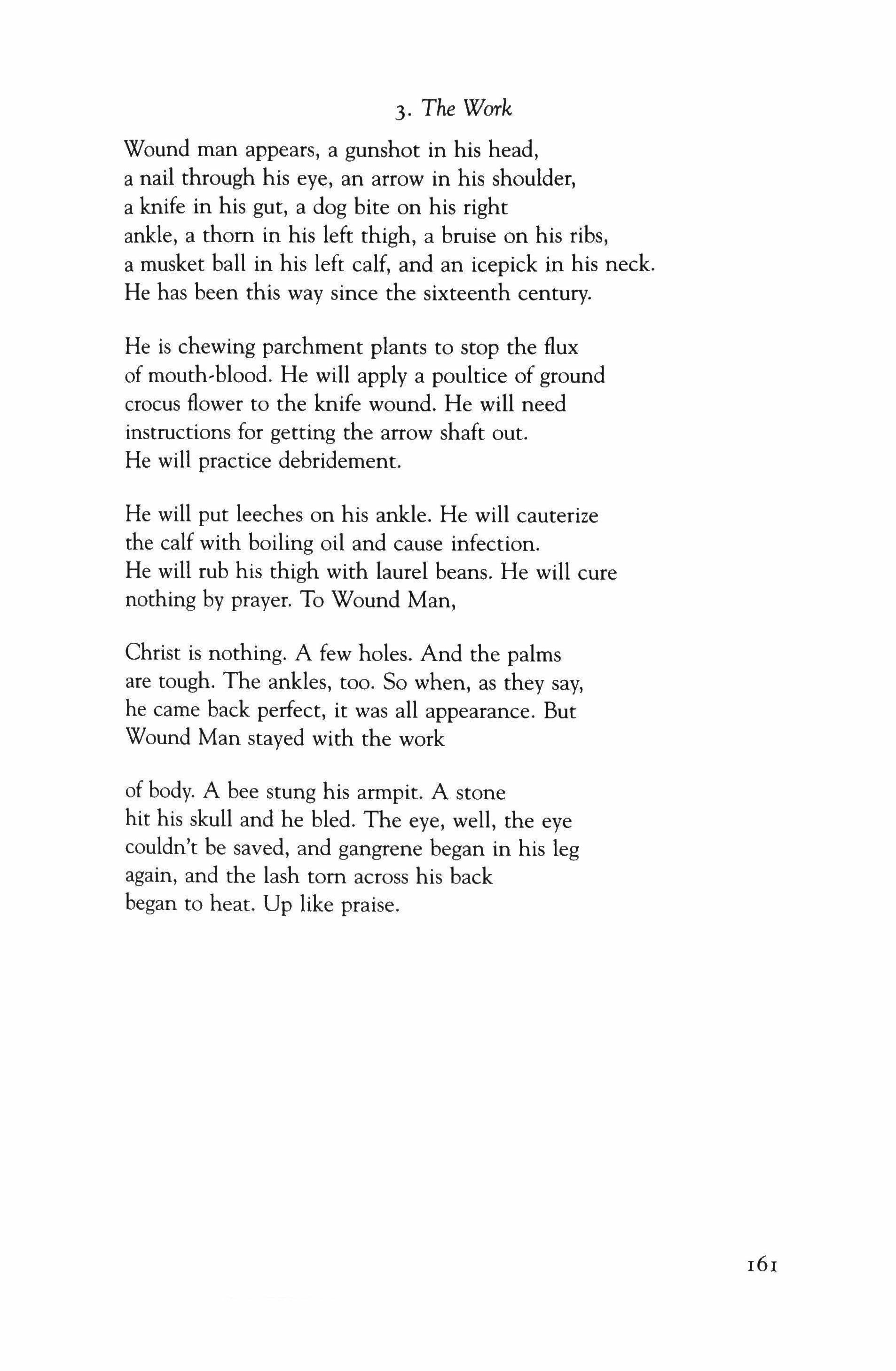
3. The Work
Wound man appears, a gunshot in his head, a nail through his eye, an arrow in his shoulder, a knife in his gut, a dog bite on his right ankle, a thorn in his left thigh, a bruise on his ribs, a musket ball in his left calf, and an icepick in his neck. He has been this way since the sixteenth century.
He is chewing parchment plants to stop the flux of mouth-blood. He will apply a poultice of ground crocus flower to the knife wound. He will need instructions for getting the arrow shaft out. He will practice debridement.
He will put leeches on his ankle. He will cauterize the calf with boiling oil and cause infection. He will rub his thigh with laurel beans. He will cure nothing by prayer. To Wound Man,
Christ is nothing. A few holes. And the palms are tough. The ankles, too. So when, as they say, he carne back perfect, it was all appearance. But Wound Man stayed with the work
of body. A bee stung his armpit. A stone hit his skull and he bled. The eye, well, the eye couldn't be saved, and gangrene began in his leg again, and the lash tom across his back began to heat. Up like praise.
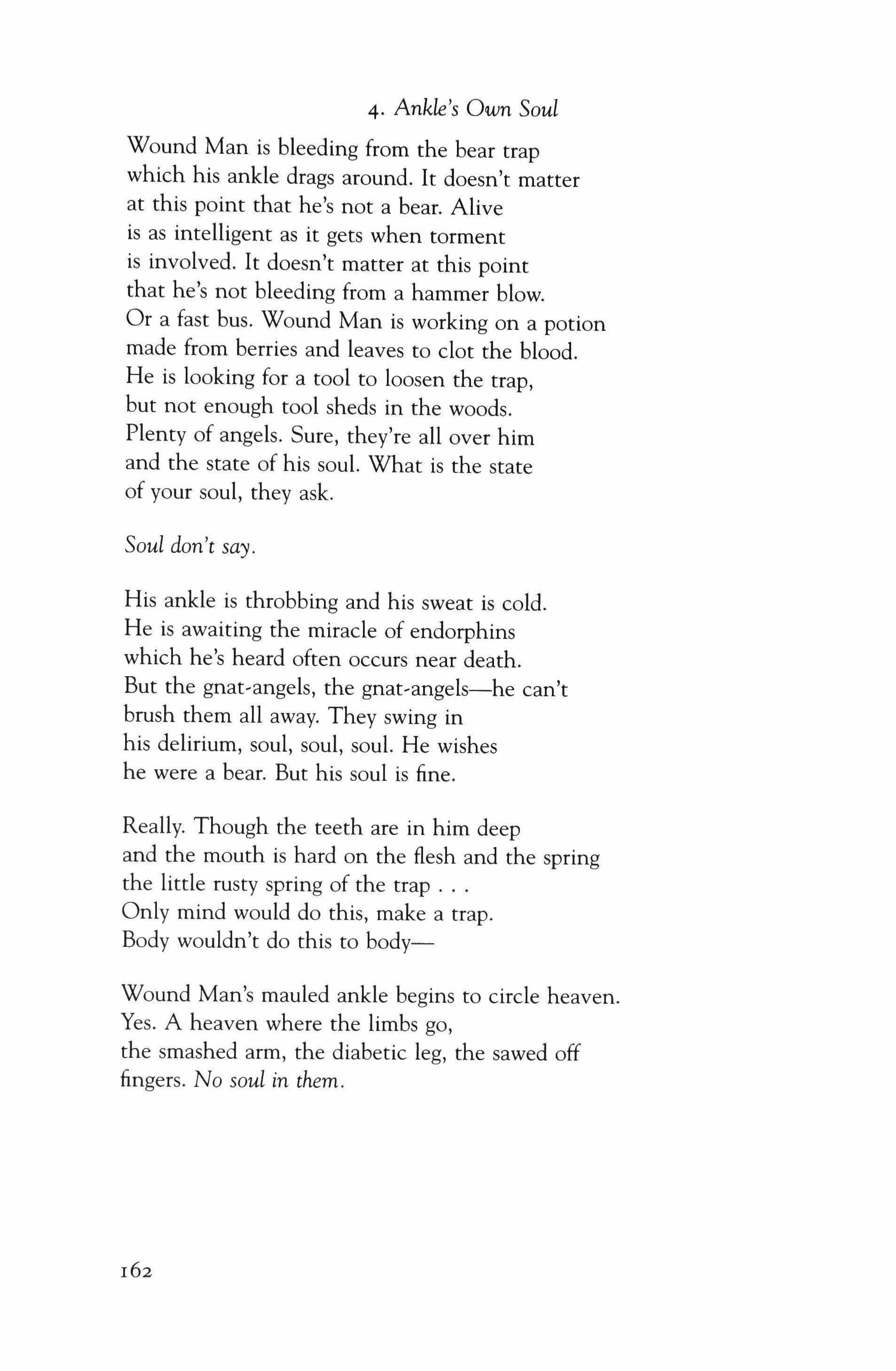
4. Ankle's Own Soul
Wound Man is bleeding from the bear trap which his ankle drags around. It doesn't matter at this point that he's not a bear. Alive is as intelligent as it gets when torment is involved. It doesn't matter at this point that he's not bleeding from a hammer blow. Or a fast bus. Wound Man is working on a potion made from berries and leaves to clot the blood. He is looking for a tool to loosen the trap, but not enough tool sheds in the woods. Plenty of angels. Sure, they're all over him and the state of his soul. What is the state of your soul, they ask.
Soul don't say.
His ankle is throbbing and his sweat is cold. He is awaiting the miracle of endorphins which he's heard often occurs near death. But the gnat-angels, the gnat-angels-he can't brush them all away. They swing in his delirium, soul, soul, soul. He wishes he were a bear. But his soul is fine.
Really. Though the teeth are in him deep and the mouth is hard on the flesh and the spring the little rusty spring of the trap Only mind would do this, make a trap. Body wouldn't do this to body-
Wound Man's mauled ankle begins to circle heaven. Yes. A heaven where the limbs go, the smashed arm, the diabetic leg, the sawed off fingers. No soul in them.

The gnats say something, he is sure. Something like thrown knives. Something like flying glass. Something like fire singeing hair. While he tries to pry the teeth of the trap apart with an abandoned shovel blade and a strong stick. And then he'll drag himself away. And dress his ankle, daily, like his own little child, pale and still, except for the teeming face.
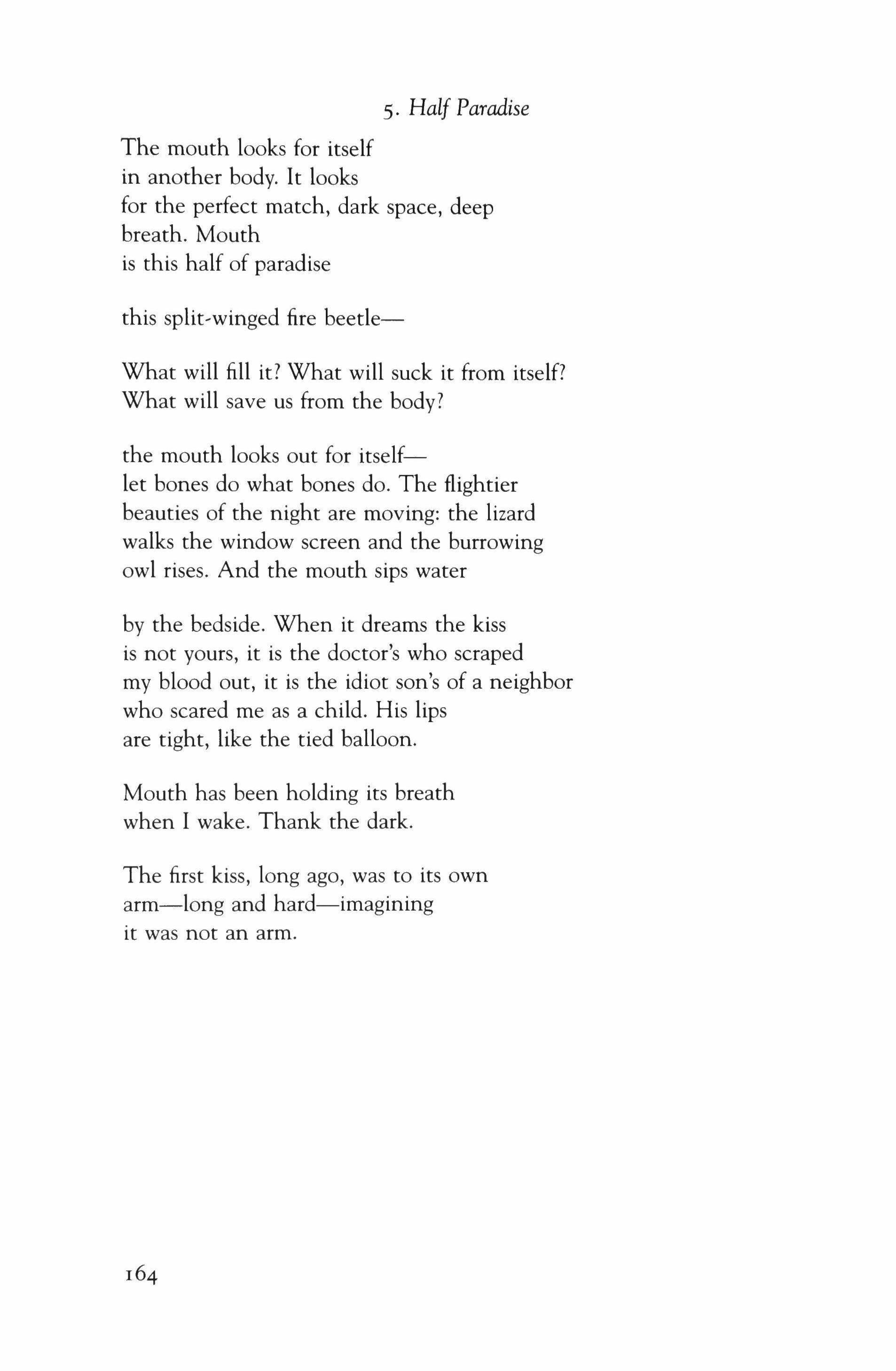
5. Half Paradise
The mouth looks for itself in another body. It looks for the perfect match, dark space, deep breath. Mouth is this half of paradise this split-winged fire beetle-
What will fill it? What will suck it from itself? What will save us from the body?
the mouth looks out for itselflet bones do what bones do. The flightier beauties of the night are moving: the lizard walks the window screen and the burrowing owl rises. And the mouth sips water by the bedside. When it dreams the kiss is not yours, it is the doctor's who scraped my blood out, it is the idiot son's of a neighbor who scared me as a child. His lips are tight, like the tied balloon.
Mouth has been holding its breath when I wake. Thank the dark.
The first kiss, long ago, was to its own arm-long and hard-imagining it was not an arm.

6. Metaphysic
When the blood appeared above his left breast he could not remember where it came from. He closed his eyes and tried to recall if something had ripped out his heart. Was it there? Or something was driven in. There was nothing to substantiate-
Some days we wake up changed and can't recall the changing.
The final December light on the brittlebush, the olives silvering above their wells of gravel, and the coxcombs of fuschia above the autumn sage fit the desert quietly. It always has the look of abandonment, this desert. The look of something the body has just left-a sheet, a scene, a bed, a room, a horizon
But Wound Man can't pin down the cause of blood this time. He hadn't run into a sword. He hadn't fought a man with a broken bottle. He hadn't been in a car accident. He hadn't been in the hospital.
But there was a hole in him. And the hole was bloody, half-clotted, and hot.
Had something tried to eat him? Was there such a thing as a vampire worm? Or was it a crow, straight for the meat?
Like a blue torch, the sky through the tree and him the soaked rag burning.

7. Spring
Because grief can be resurrected. Because the gash of scent or the stab of flower. Because time blooms time.
Because March begins again. Because morning glories and snap beans. Because swoon is the name of everything today,
false spring in January, a balm and lush light, the body thinks it is spring. The honeysuckle starts to bud against the west wall.
All my life the desert has taught me this trick. It is Spring:
Wound Man has fallen from a ladder and landed on an old board with a nail in it. The nail has opened his shin like a bright fish shining gut.
He does not remember the stitching up or the pulling out.
He remembers only April, ripping the bandage off with its leg hairs and the sting and the pink crust, the good skin around it pallid, damp, gleaming with salve. Necrotic rose.
Because even so the story is only part of the story. In spring, come the elegies.
166
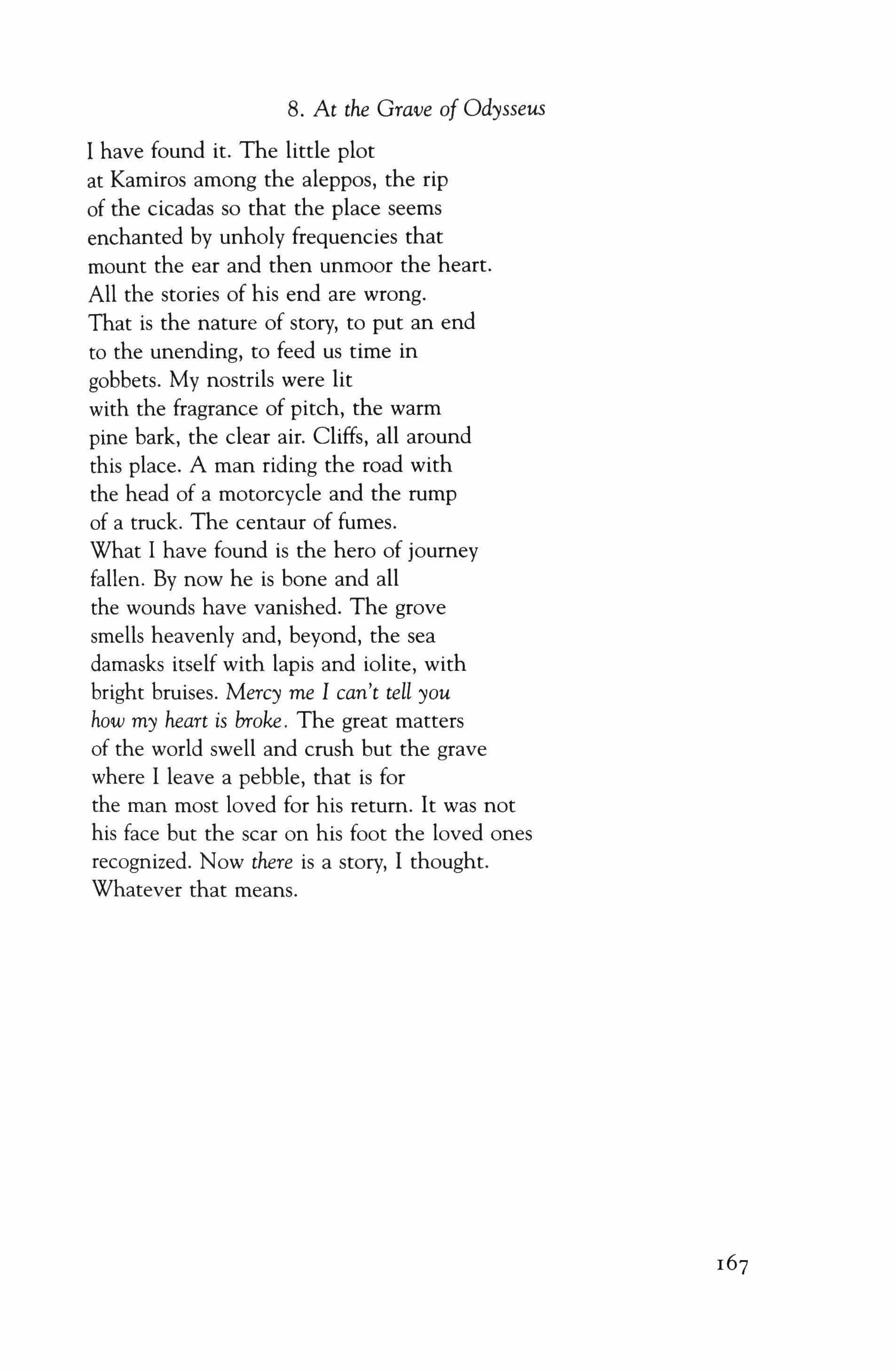
8. At the Grave of Odysseus
I have found it. The little plot at Kamiros among the aleppos, the rip of the cicadas so that the place seems enchanted by unholy frequencies that mount the ear and then unmoor the heart. All the stories of his end are wrong. That is the nature of story, to put an end to the unending, to feed us time in gobbets. My nostrils were lit with the fragrance of pitch, the warm pine bark, the clear air. Cliffs, all around this place. A man riding the road with the head of a motorcycle and the rump of a truck. The centaur of fumes. What I have found is the hero of journey fallen. By now he is bone and all the wounds have vanished. The grove smells heavenly and, beyond, the sea damasks itself with lapis and iolite, with bright bruises. Mercy me I can't tell you how my heart is broke. The great matters of the world swell and crush but the grave where I leave a pebble, that is for the man most loved for his return. It was not his face but the scar on his foot the loved ones recognized. Now there is a story, I thought. Whatever that means.

9. The Lute
John Donne once said the twitching body of a decapitated man was like a lute's strings. This is what Wound Man loved about the Metaphysicals. They knew their anatomy. They knew that beauty was another pestilence that ran its course and that poetry alone could molest desire. They did endless experiments: One in which they lifted a house into the body of an ox, then a whole country, India, its incense and exotica, into the body of a woman. What this proved, they never told. Of course, it was death they were trying to beat. If they could just beat the body. But the body always trumped: My apple better than your apple, My shine more than your shine. My kung fu better than your kung fu. They were left alone with words, but what was speech in a book of murder?
168

10.
Anatomia Fugitiva
The first scar was from birth, the scar of the umbilicus, in the center of his body. It was like a blond spider curled in death. It was the little wheel that froze From there to everywhere was far enough. Next came the wound from the hot flame he touched and the dogbite in the pure flesh of his forearm. Then the pox. It's how his body told time. It was June. The desert bright as salt. Not a shadow. Not one. The great stand-off. But how he got here was a mystery, as solitude always is. Between the signs in the story and the leap What next? The white waxen bell towers of the yucca raise a crowd of old joys in him. The wasp thinks him through. The mesquite stiffens the sexual hair, and the dry wash glittering with tin cans-that must be for the intestines. Everything, he saw, having its place, like a good arrow.
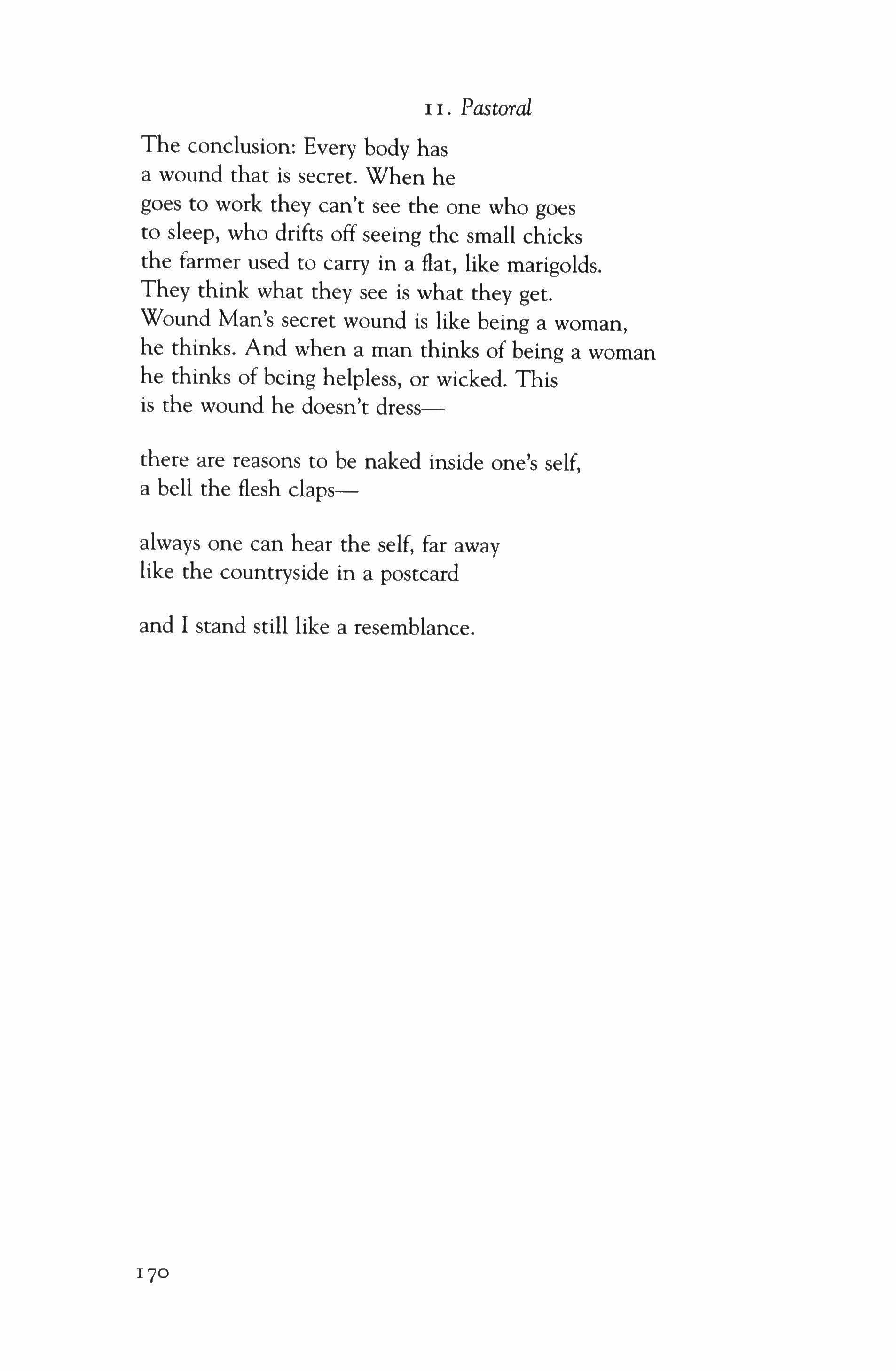
I!. Pastoral
The conclusion: Every body has a wound that is secret. When he goes to work they can't see the one who goes to sleep, who drifts off seeing the small chicks the farmer used to carry in a flat, like marigolds. They think what they see is what they get. Wound Man's secret wound is like being a woman, he thinks. And when a man thinks of being a woman he thinks of being helpless, or wicked. This is the wound he doesn't dress-
there are reasons to be naked inside one's self, a bell the flesh claps-
always one can hear the self, far away like the countryside in a postcard and I stand still like a resemblance.
170
Stanley Plumly
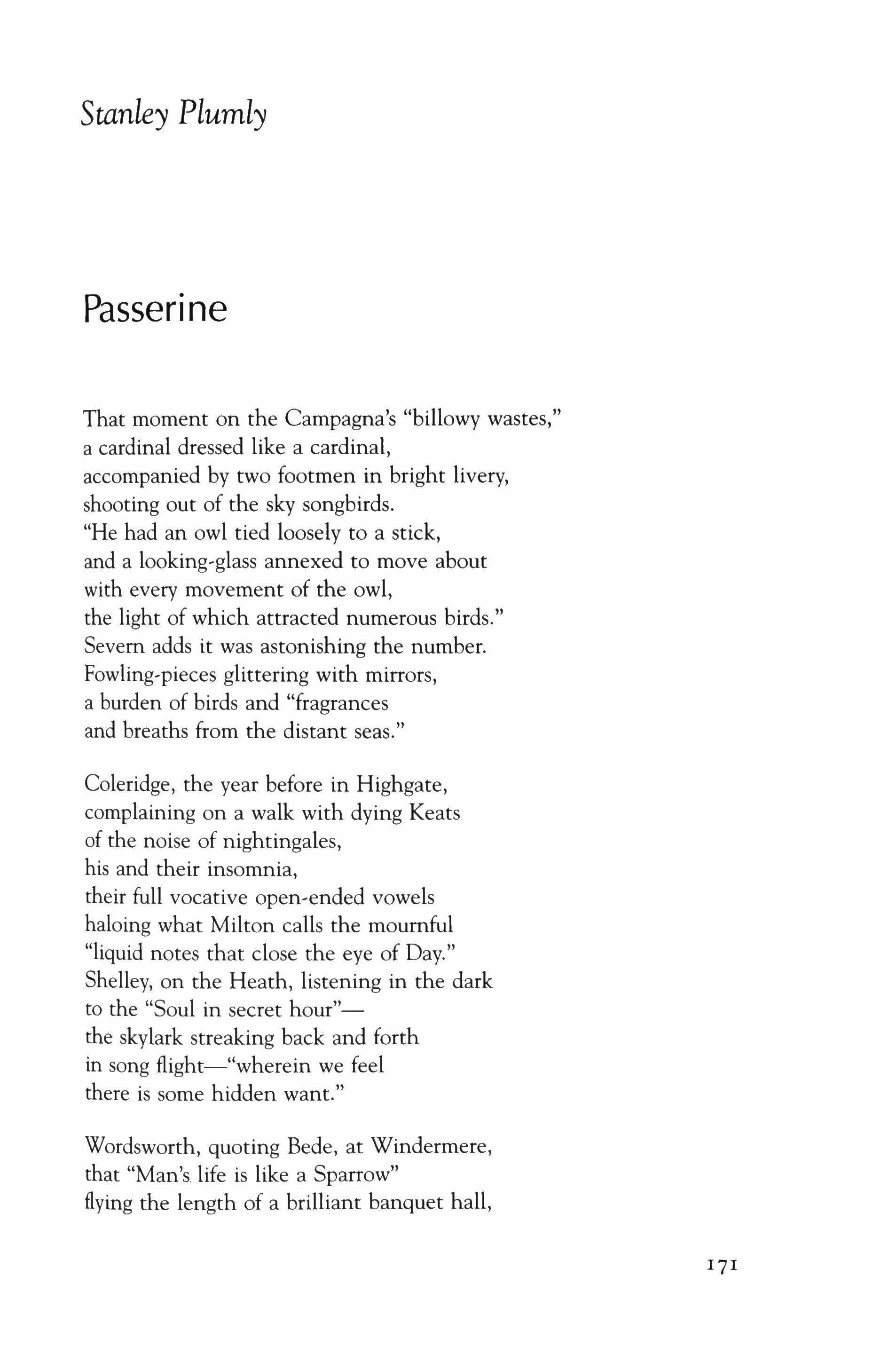
Passerine
That moment on the Campagna's "billowy wastes," a cardinal dressed like a cardinal, accompanied by two footmen in bright livery, shooting out of the sky songbirds. "He had an owl tied loosely to a stick, and a looking-glass annexed to move about with every movement of the owl, the light of which attracted numerous birds." Severn adds it was astonishing the number. Fowling-pieces glittering with mirrors, a burden of birds and "fragrances and breaths from the distant seas."
Coleridge, the year before in Highgate, complaining on a walk with dying Keats of the noise of nightingales, his and their insomnia, their full vocative open-ended vowels haloing what Milton calls the mournful "liquid notes that close the eye of Day." Shelley, on the Heath, listening in the dark to the "Soul in secret hour"the skylark streaking back and forth in song flight-"wherein we feel there is some hidden want."
Wordsworth, quoting Bede, at Windermere, that "Man's. life is like a Sparrow" flying the length of a brilliant banquet hall,

"Safe from wintry tempest," ignored by king and kind "Housed near a blazing fire."
The sparrow is "that transient Thing" fluttering at the entrance
but now on "hasty wing," though from "what world She came, what woe or weal
On her departure waits, no tongue hath shown."
Not the trill tongue of the sparrow, certainly, nor the wind,
out of the cold, that followed her-
Betsy Sholl Transport

On the radio: illegal roads gouged through the rain forest. Then I'm out of range and the station turns to screech, or the crew's pressed deeper in to lush green static,
eerie shrieks of tropical birds-more like the damned enduring Dante's bad weather, mist and barren trees ten times worse than this mid-coast November Be prepared
to Stop a sign reads, as if up ahead's a broken bridge, or rubble-blocked road-Dante's expertise, as superintendent of roads in Florence,
till factions and papal graft forced him out, never to return by any highway or street, though he'd wander on plenty, and in different cities hear of crooks, the local news
like 1950S New Jersey reporting Mafia bodies under fresh pavement. Even now, sitting in line behind the flag woman, I smell asphalt and think
getting it, someone's cursing or pleading, head stuck in tar as the steam roller bears down, its driver working the gears like a tiny brain moving some huge lumbering world. Dumb fate-
somebody's
173
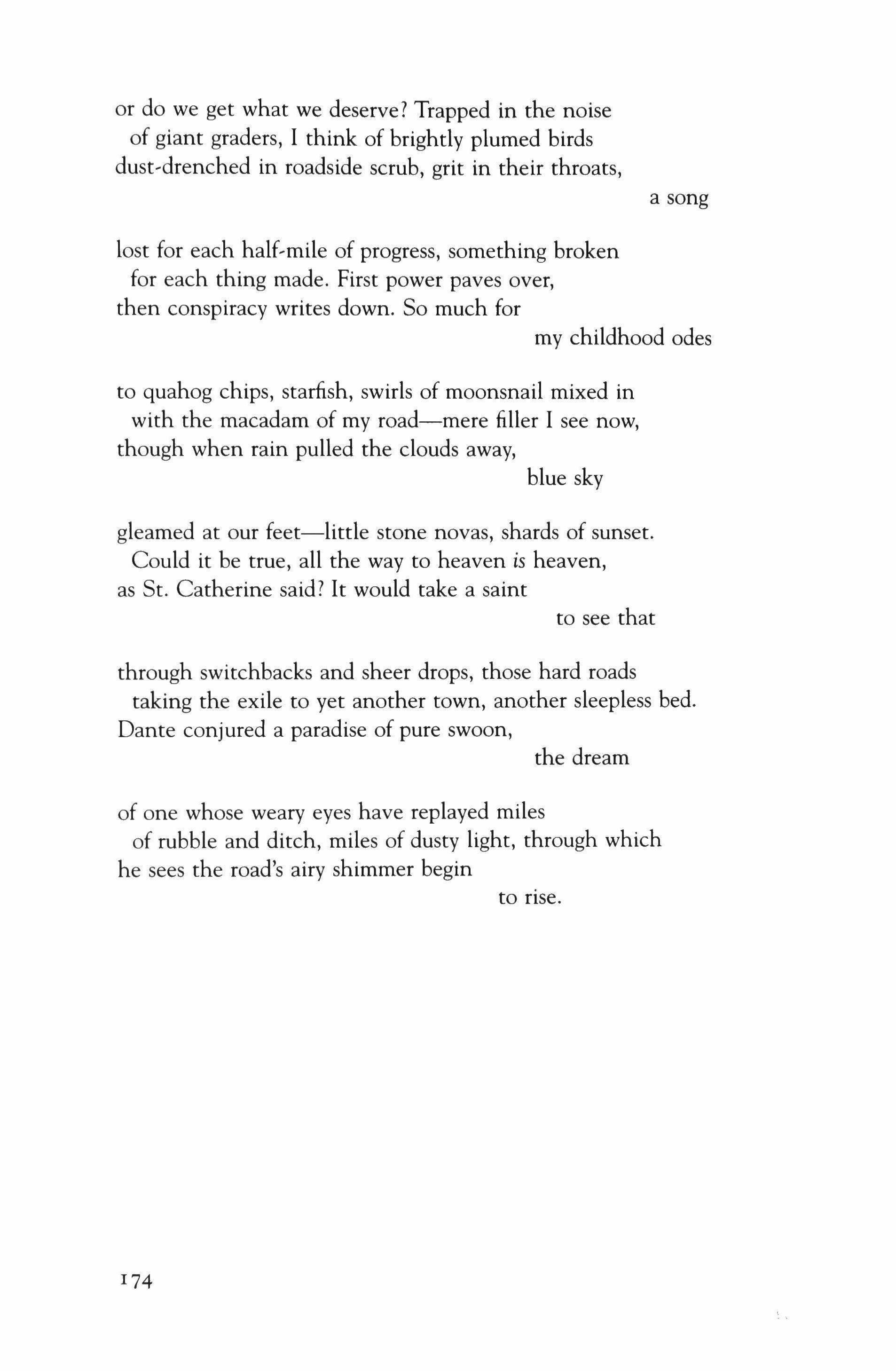
or do we get what we deserve? Trapped in the noise of giant graders, I think of brightly plumed birds dust-drenched in roadside scrub, grit in their throats, a song lost for each half-mile of progress, something broken for each thing made. First power paves over, then conspiracy writes down. So much for my childhood odes
to quahog chips, starfish, swirls of moonsnail mixed in with the macadam of my road-mere filler I see now, though when rain pulled the clouds away, blue sky
gleamed at our feet-little stone novas, shards of sunset. Could it be true, all the way to heaven is heaven, as St. Catherine said? It would take a saint to see that
through switchbacks and sheer drops, those hard roads taking the exile to yet another town, another sleepless bed. Dante conjured a paradise of pure swoon, the dream
of one whose weary eyes have replayed miles of rubble and ditch, miles of dusty light, through which he sees the road's airy shimmer begin to rise.
174
Tony Hoagland

Bad Intelligence
is the reason the Chinese orphanage was bombed It wasn't a stray piece of lint on a bombsite, or the spastic movement of an twenty-year-old jet pilot leaning forward to inspect a zit in a cockpit mirror.
No-someone had pulled the wrong map from the top-secret file cabinet, had given the map to someone else in office Z�13, who had circled the wrong building with lavender ink, and passed it on, and when the smoke rose from the successfully-demolished target and the other kinds of fallout began, the error had already been given a name by the damage-control guys, which the radio announcers were murmuring over the airways, and it was: Bad Intelligence.
Hearing it on the radio, driving to work,
I think, Yes, Bad Intelligence: that's what has guided me most of my life. Like the lesson I got from my mother: Anticipate betrayal: measure out your love in teaspoons, so you will never lose more than you can easily afford.
Or the other one, about how a worried expression on your face proves you are a Thoughtful Person; Or the one about despising weakness.
Bad Intelligence. Bad intelligence is why Candace always dated guys with snake tattoos. Why the homeless woman said, "God will take care of us."
175
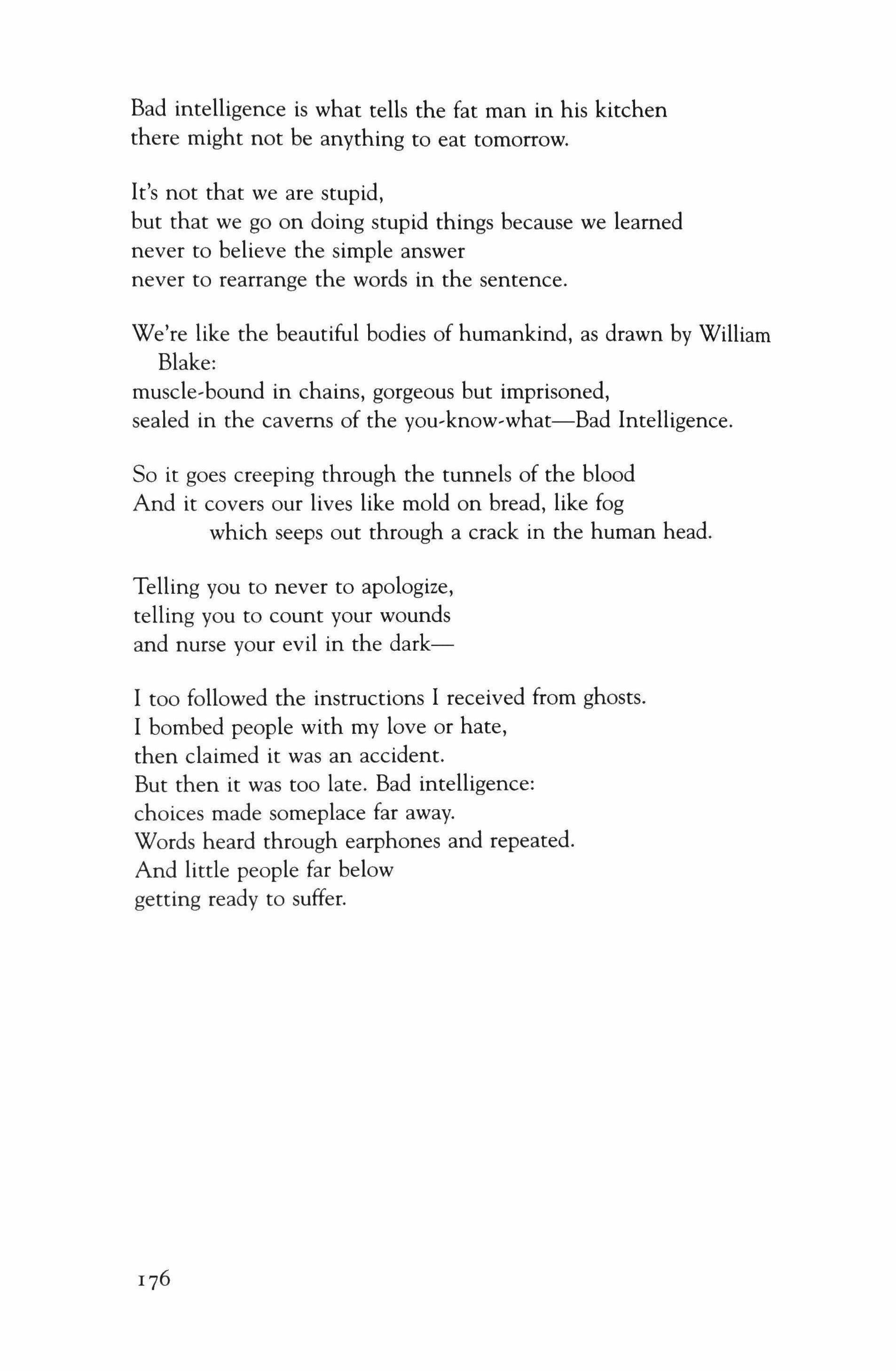
Bad intelligence is what tells the fat man in his kitchen there might not be anything to eat tomorrow.
It's not that we are stupid, but that we go on doing stupid things because we learned never to believe the simple answer never to rearrange the words in the sentence.
We're like the beautiful bodies of humankind, as drawn by William Blake: muscle-bound in chains, gorgeous but imprisoned, sealed in the caverns of the you-know-what-Bad Intelligence.
So it goes creeping through the tunnels of the blood And it covers our lives like mold on bread, like fog which seeps out through a crack in the human head.
Telling you to never to apologize, telling you to count your wounds and nurse your evil in the dark-
I too followed the instructions I received from ghosts. I bombed people with my love or hate, then claimed it was an accident. But then it was too late. Bad intelligence: choices made someplace far away. Words heard through earphones and repeated. And little people far below getting ready to suffer.
176
In the Painting Allegory of the Temp Agency,

the employers are depicted as wolves with bloodred mouths and yellow greedy eyes, pursuing the small-business employees through the dark forest
of capitalism. It is night and by the light of the minimum-wage moon we can see the long pink tongues of the bosses hanging out and the dilated white eyeballs of the employees as they flee through woods, lacking any sense of solidarity or collective organizing power.
Upon closer inspection the leaves beneath their feet are shredded dollar bills which bear the distressed expressions of ex-presidents and the wind in the trees is making a long
howl of no health insurance or job security and No, it is not really a very good painting, heavy handed in concept, and comic unintentionally in a way that
invites us to laugh at the desire for justiceRather, the painting shows that the artist was untalented, and is an allegory of how difficult it is
to be both skillful and sincere which in tum explains why the art that hangs in the lobbies of banks and in the boardrooms of corporate office buildings is often made of black and white slashes against a background of melted orange crayon or glowing lavender rectangles floating in gray haze, works in which no human figures appear, in which the Haves
177
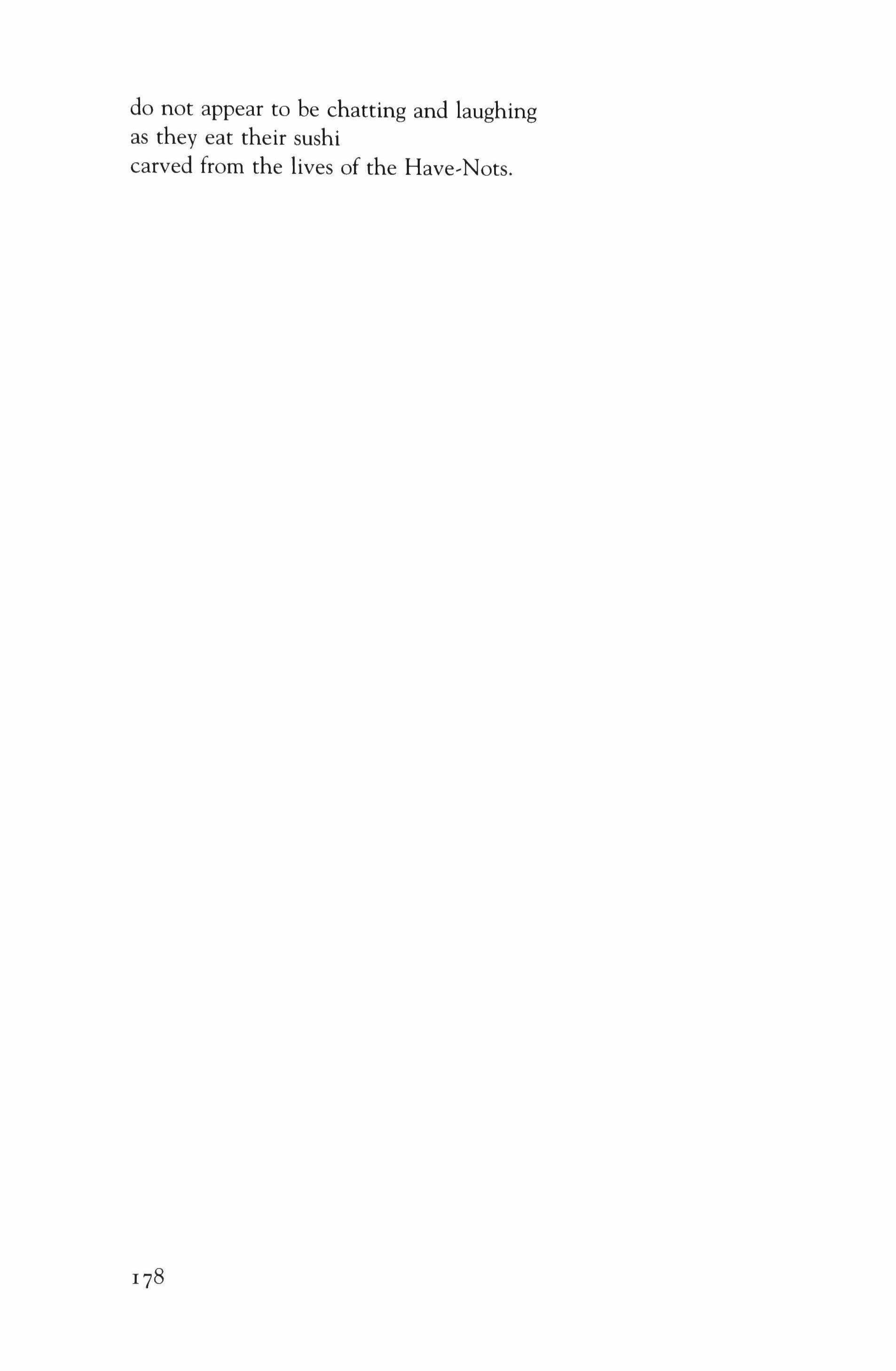
do not appear to be chatting and laughing as they eat their sushi carved from the lives of the Have-Nets.
178
Foodcourt

If you want to talk about America, why not just mention Jimmy's Wok and Roll American-Chinese Gourmet Emporium?the cloud of steam rising from the bean sprouts and shredded cabbage
when the oil is sprayed on from a giant plastic bottle wielded by Ramon, Jimmy's main employee, who hates having to wear the sanitary hair net and who thinks the food smells shitty? And the secretaries from the law firm
drifting in from work at noon to fill the tables of the foodcourt, in their cotton skirts and oddly sexy running shoes?
Why not mention the little grove of palm trees maintained by the mall corporation and the splashing fountain beside it
and the faint smell of dope,smoke drifting from the men's room where two boys from the suburbs dropped off by their moms
with their baggy ghetto pants and skateboards are getting ready to pronounce their first sentences in African-American!
Oh yes, everything all chopped up and stirred together in the big steel pan held over a medium,high blue flame
while Jimmy watches with his practical black eyes.
I79
David St. John 1968
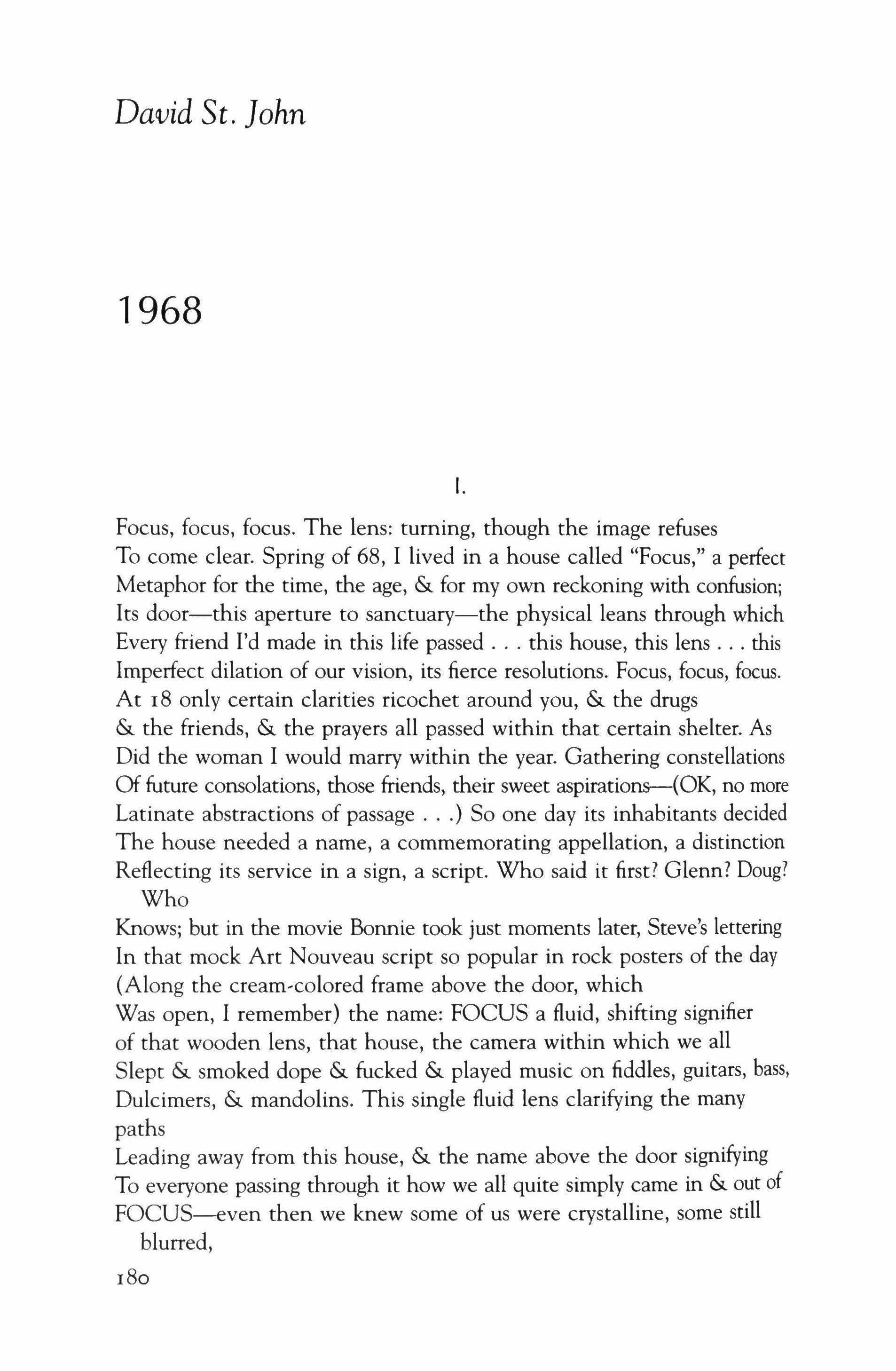
Focus, focus, focus. The lens: turning, though the image refuses To corne clear. Spring of 68, I lived in a house called "Focus," a perfect Metaphor for the time, the age, & for my own reckoning with confusion; Its door-this aperture to sanctuary-the physical leans through which Every friend I'd made in this life passed this house, this lens this Imperfect dilation of our vision, its fierce resolutions. Focus, focus, focus. At 18 only certain clarities ricochet around you, & the drugs & the friends, & the prayers all passed within that certain shelter. As Did the woman I would marry within the year. Gathering constellations Of future consolations, those friends, their sweet aspirations--(OK, no more Latinate abstractions of passage } So one day its inhabitants decided The house needed a name, a commemorating appellation, a distinction Reflecting its service in a sign, a script. Who said it first? Glenn? Doug? Who
Knows; but in the movie Bonnie took just moments later, Steve's lettering In that mock Art Nouveau script so popular in rock posters of the day (Along the cream-colored frame above the door, which Was open, I remember) the name: FOCUS a fluid, shifting signifier of that wooden lens, that house, the camera within which we all Slept & smoked dope & fucked & played music on fiddles, guitars, bass, Dulcimers, & mandolins. This single fluid lens clarifying the many paths
Leading away from this house, & the name above the door signifying To everyone passing through it how we all quite simply carne in & out of FOCUS-even then we knew some of us were crystalline, some still blurred, 180
I.
Unclear, unwanted-but all of us were there, poised & restless, ready
To be delivered into those lives indeterminate & yet already fixed in & on
Some new vision, some pupil widening with light, resembling {somehow} our own.
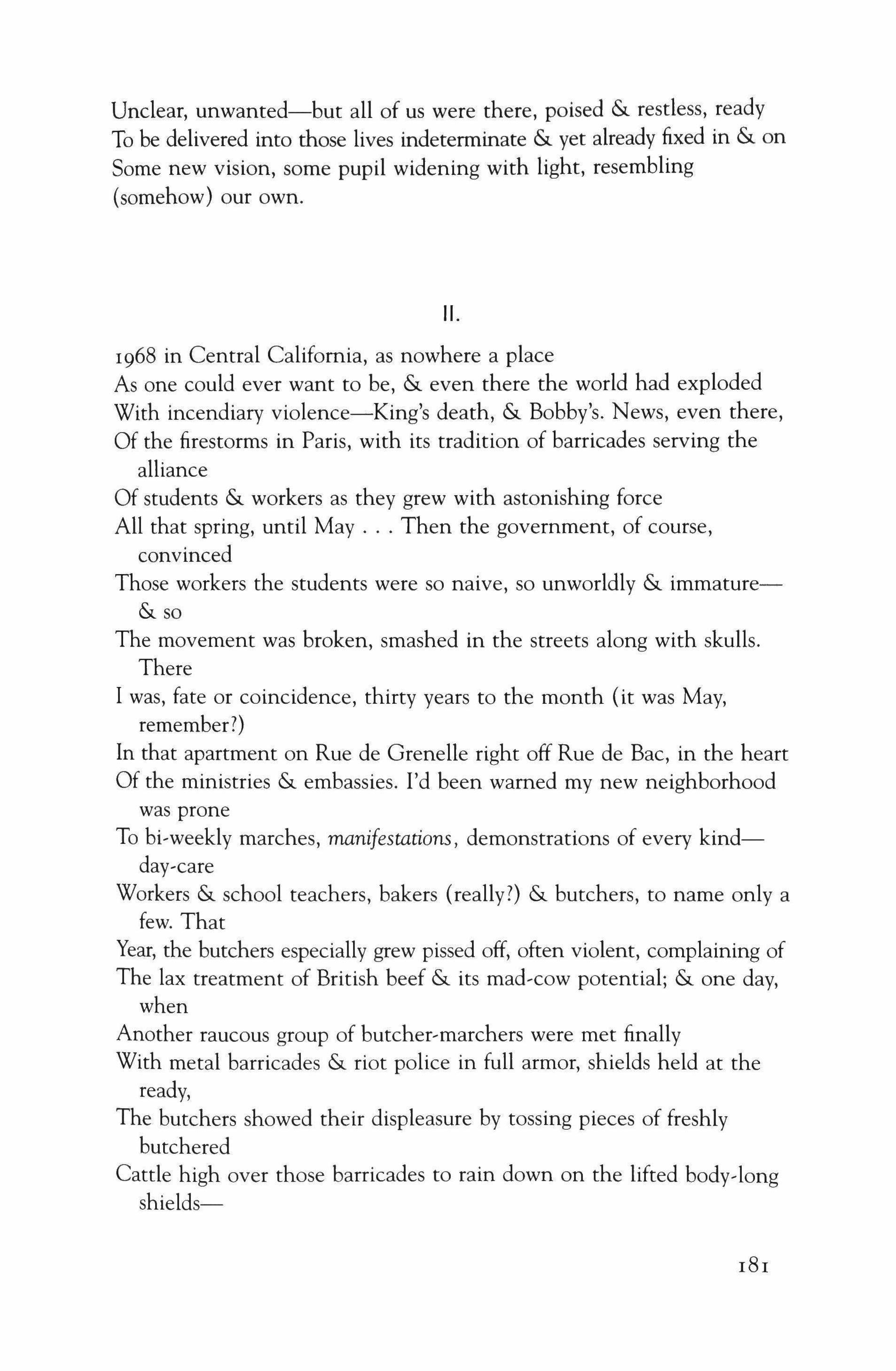
1968 in Central California, as nowhere a place
As one could ever want to be, & even there the world had exploded
With incendiary violence-King's death, & Bobby's. News, even there, Of the firestorms in Paris, with its tradition of barricades serving the alliance
Of students & workers as they grew with astonishing force
All that spring, until May Then the government, of course, convinced
Those workers the students were so naive, so unworldly & immature&so
The movement was broken, smashed in the streets along with skulls. There
I was, fate or coincidence, thirty years to the month {it was May, remember?}
In that apartment on Rue de Grenelle right off Rue de Bac, in the heart Of the ministries & embassies. I'd been warned my new neighborhood was prone
To bi-weekly marches, manifestations, demonstrations of every kindday-care
Workers & school teachers, bakers {really?} & butchers, to name only a few. That
Year, the butchers especially grew pissed off, often violent, complaining of The lax treatment of British beef & its mad-cow potential; & one day, when
Another raucous group of butcher-marchers were met finally
With metal barricades & riot police in full armor, shields held at the ready,
The butchers showed their displeasure by tossing pieces of freshly butchered
Cattle high over those barricades to rain down on the lifted body-long shields-
II.

Vivienne, at four, stood with me just inside
The glass door a linen shop just at the street of the heart of this latest Confrontation-a door the owner had quietly & calmly & purposefully locked,
With us still inside, as the sound of the marchers approach had grown louder, & louder as the butchers & their bullhorns arrived, meeting both Police & barricades at the street leading to the French Ministry of Butcherdom.
We watched as the bloody legs & shoulders of beef were catapulted & wildly
Heaved high into the air over the triple-deep metal barricades
Only to be received with the exquisite ballet of the raised gray riot shields & their deft deflections. Vivienne watched it all speechless, & amazed. Later,
The manifestation over, the butcher/marchers dispersed & the police all gone home
In their waiting busses, as always the street cleaners in their green jumpsuits & green Trucks came from the streets nearby, where they'd been killing time smoking & playing cards & listening to soccer matches, & like lightning straightened up
All the debris-leaflets, water bottles, the spare remains of bovine rainUntil the streets looked again as polished & scrubbed & pristine as they had
That morning, at least, so much so as any Parisian morning might allow. I'd already discovered that every night that month of May, 1998, that French TV was running a day-for-day account of the riots
Of that May exactly 30 years before. After Vivienne was asleep, I'd tum on The tiny cereal box of a television & watch the newsreel footage of those endless
Street fights, day by day in 68, all through Paris, workers & students together
Constructing their own barricades, often burning, of furniture & cars, As the police began moving in & out, along & beyond the running students,
Tear gas canisters firing up into the air & falling onto the crowds, the crowds
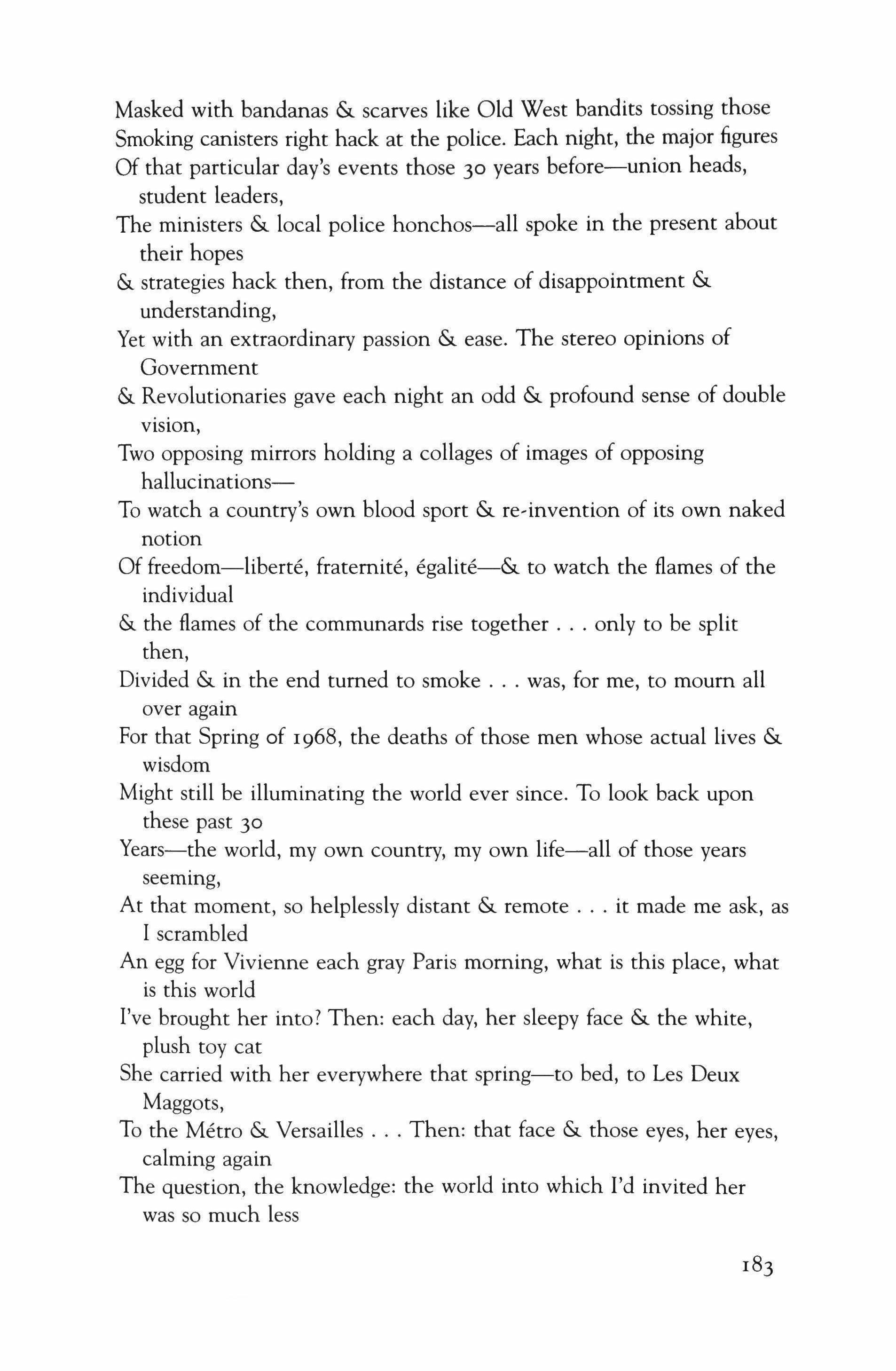
Masked with bandanas & scarves like Old West bandits tossing those Smoking canisters right hack at the police. Each night, the major figures
Of that particular day's events those 30 years before-union heads, student leaders,
The ministers & local police honchos-all spoke in the present about their hopes & strategies hack then, from the distance of disappointment & understanding,
Yet with an extraordinary passion & ease. The stereo opinions of Government & Revolutionaries gave each night an odd & profound sense of double vision,
Two opposing mirrors holding a collages of images of opposing hallucinations-
To watch a country's own blood sport & re-invention of its own naked notion
Of freedorn-e-liberte, fraternite, egalite-e-Si to watch the flames of the individual & the flames of the communards rise together only to be split then,
Divided & in the end turned to smoke was, for me, to mourn all over again
For that Spring of 1968, the deaths of those men whose actual lives & wisdom
Might still be illuminating the world ever since. To look back upon these past 30
Years-the world, my own country, my own life-all of those years seeming,
At that moment, so helplessly distant & remote it made me ask, as I scrambled
An egg for Vivienne each gray Paris morning, what is this place, what is this world
I've brought her into? Then: each day, her sleepy face & the white, plush toy cat
She carried with her everywhere that spring-to bed, to Les Deux Maggots,
To the Metro & Versailles Then: that face & those eyes, her eyes, calming again
The question, the knowledge: the world into which I'd invited her was so much less
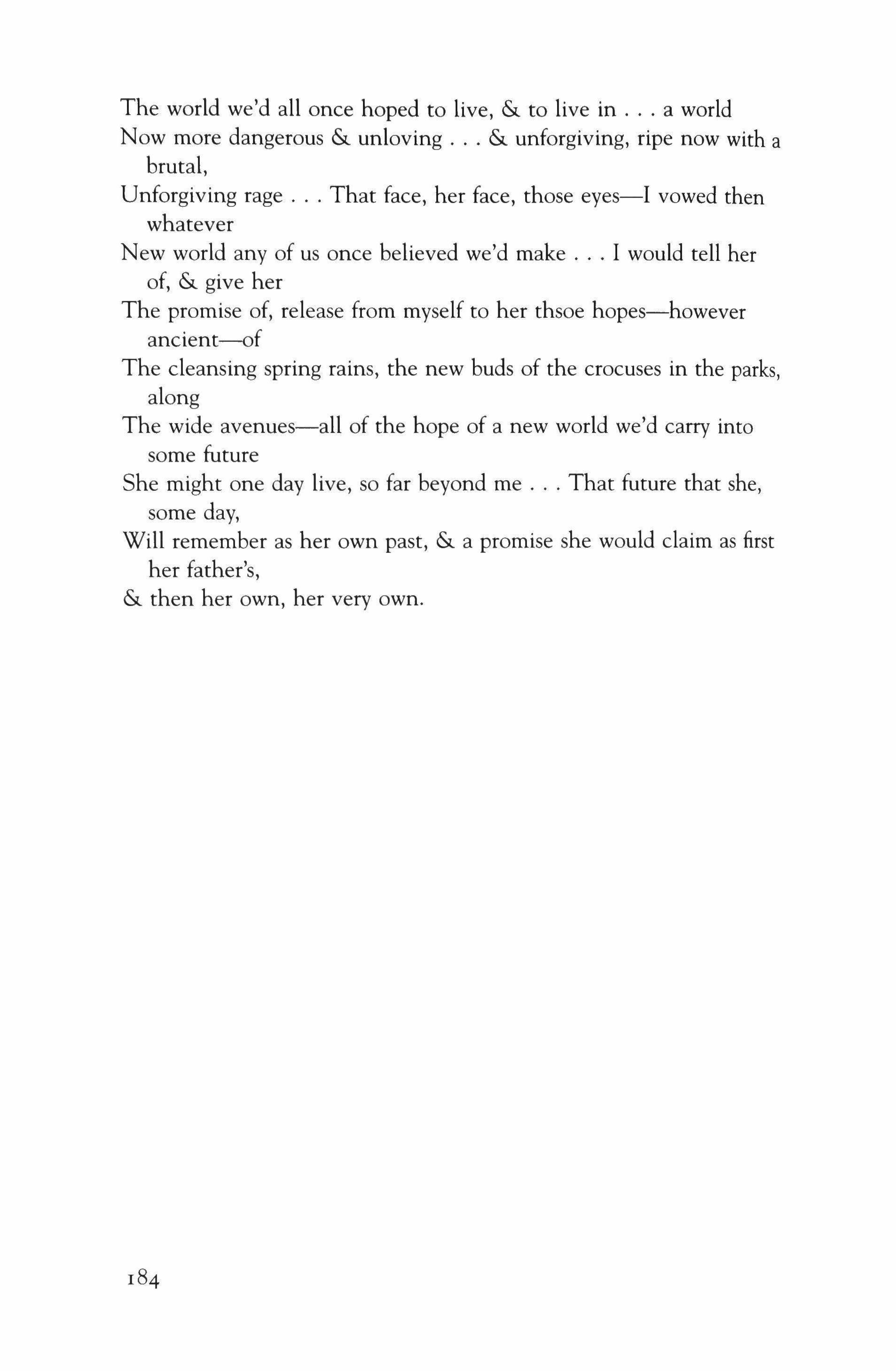
The world we'd all once hoped to live, & to live in a world
Now more dangerous & unloving & unforgiving, ripe now with a brutal,
Unforgiving rage
That face, her face, those eyes-I vowed then whatever
New world any of us once believed we'd make I would tell her of, & give her
The promise of, release from myself to her thsoe hopes-however ancient-of
The cleansing spring rains, the new buds of the crocuses in the parks, along
The wide avenues-all of the hope of a new world we'd carry into some future
She might one day live, so far beyond me That future that she, some day,
Will remember as her own past, & a promise she would claim as first her father's, & then her own, her very own.
Richard Lyons Snow Effects
German Alps, 1980

Some complain how time drags itself and then accelerates. Some admit, as everyone will, that the past can't be changed, except to lie, deceive someone concerning the effects of memory, vertical shadows to misapprehend what this stranger in down is doing as he climbs a snowy incline with a bag of groceries as if a ghost, reeling in its extinction, had turned white to see how it feels to be included in what's around it.
A brook that looks like an arm bubbles down, freezing a second before it resumes its descent into a family of trees all bent one way from the winds off the steppe.
Back up at the top of the town, the pellets continue falling fast, and the plows-stripped to their motors-look like racing cars with parachutes billowing out behind them, the way the wind together with the snow accompanies him everywhere, cold fire, cold earth, ice.
No matter how fast the plow plows, then or now, the past drifts into featurelessness. Wasn't memory a blank from the start, a mother like a white wind sweeping through an open door so that any venture, any going-away in a too-small pair of boots, is a freefall through the architecture of a woman's body, the architecture of snow, nervous because its bearing is nervous, an avalanche of interiors like bees munching plaster of paris? Each alpine house pinches its white nomenclature of ash. A snowy ash, a lethal ash, sifts through the roof of the world.
18S
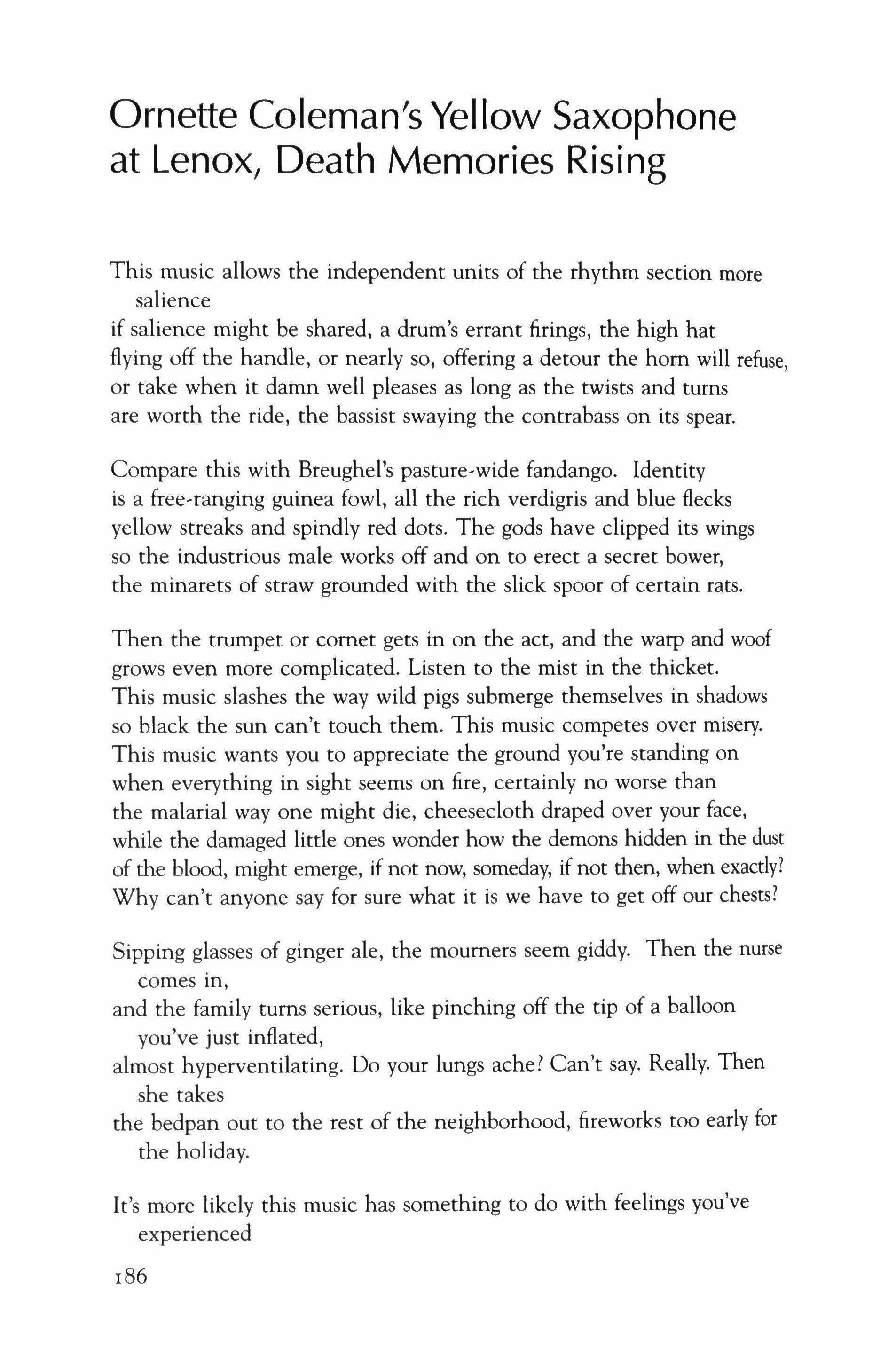
Ornette Coleman's Yellow Saxophone at Lenox,
Death Memories Rising
This music allows the independent units of the rhythm section more salience if salience might be shared, a drum's errant firings, the high hat flying off the handle, or nearly so, offering a detour the hom will refuse, or take when it damn well pleases as long as the twists and turns are worth the ride, the bassist swaying the contrabass on its spear.
Compare this with Breughel's pasture-wide fandango. Identity is a free-ranging guinea fowl, all the rich verdigris and blue flecks yellow streaks and spindly red dots. The gods have clipped its wings so the industrious male works off and on to erect a secret bower, the minarets of straw grounded with the slick spoor of certain rats.
Then the trumpet or comet gets in on the act, and the warp and woof grows even more complicated. Listen to the mist in the thicket. This music slashes the way wild pigs submerge themselves in shadows so black the sun can't touch them. This music competes over misery. This music wants you to appreciate the ground you're standing on when everything in sight seems on fire, certainly no worse than the malarial way one might die, cheesecloth draped over your face, while the damaged little ones wonder how the demons hidden in the dust of the blood, might emerge, if not now, someday, if not then, when exactly? Why can't anyone say for sure what it is we have to get off our chests?
Sipping glasses of ginger ale, the mourners seem giddy. Then the nurse comes in, and the family turns serious, like pinching off the tip of a balloon you've just inflated, almost hyperventilating. Do your lungs ache? Can't say. Really. Then she takes the bedpan out to the rest of the neighborhood, fireworks too early for the holiday.
It's more likely this music has something to do with feelings you've experienced
186
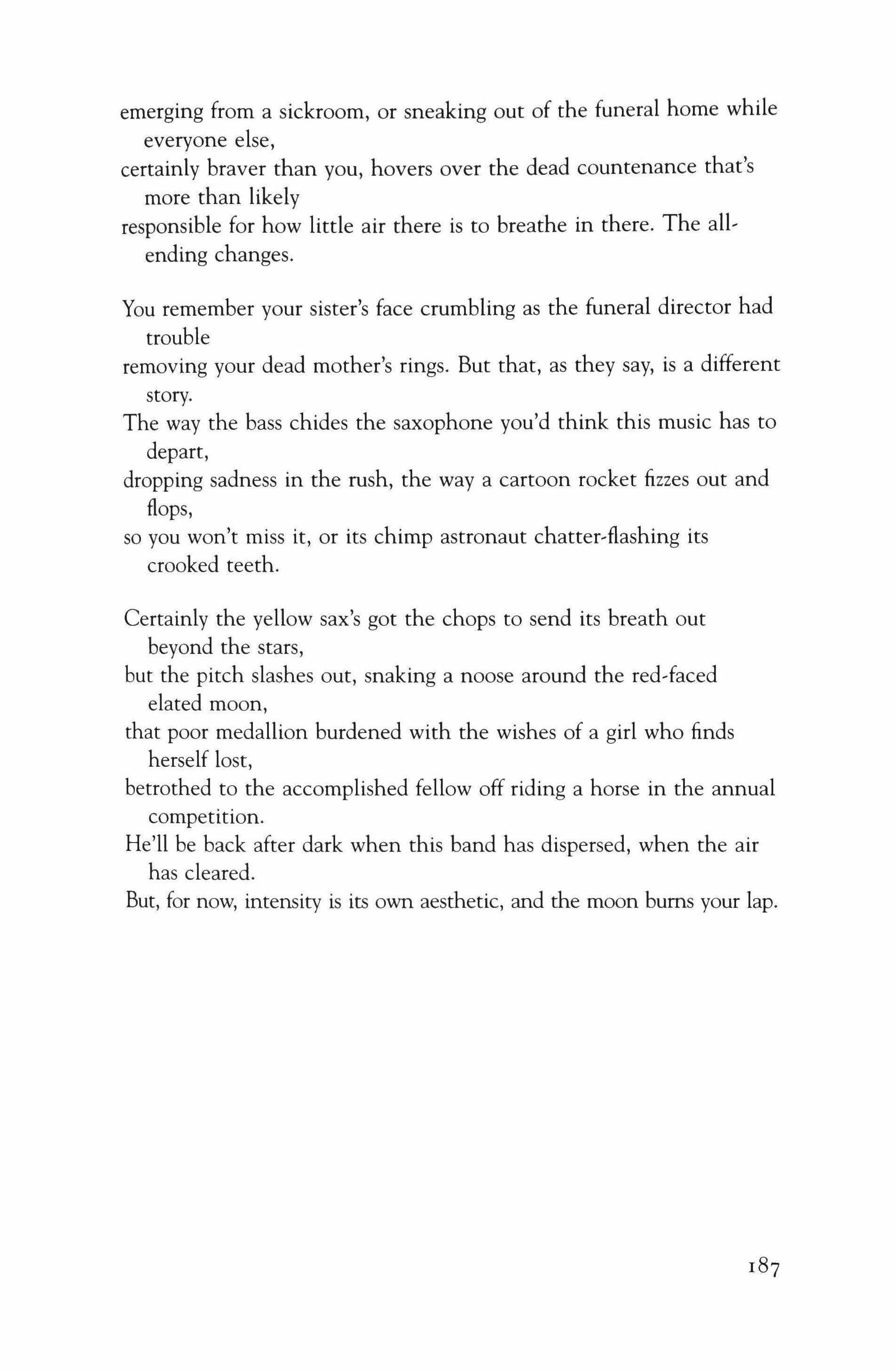
emerging from a sickroom, or sneaking out of the funeral home while everyone else, certainly braver than you, hovers over the dead countenance that's more than likely responsible for how little air there is to breathe in there. The allending changes.
You remember your sister's face crumbling as the funeral director had trouble removing your dead mother's rings. But that, as they say, is a different story. The way the bass chides the saxophone you'd think this music has to depart, dropping sadness in the rush, the way a cartoon rocket fizzes out and flops, so you won't miss it, or its chimp astronaut chatter-flashing its crooked teeth.
Certainly the yellow sax's got the chops to send its breath out beyond the stars, but the pitch slashes out, snaking a noose around the red-faced elated moon, that poor medallion burdened with the wishes of a girl who finds herself lost, betrothed to the accomplished fellow off riding a horse in the annual competition. He'll be back after dark when this band has dispersed, when the air has cleared. But, for now, intensity is its own aesthetic, and the moon bums your lap.
Martha Rhodes
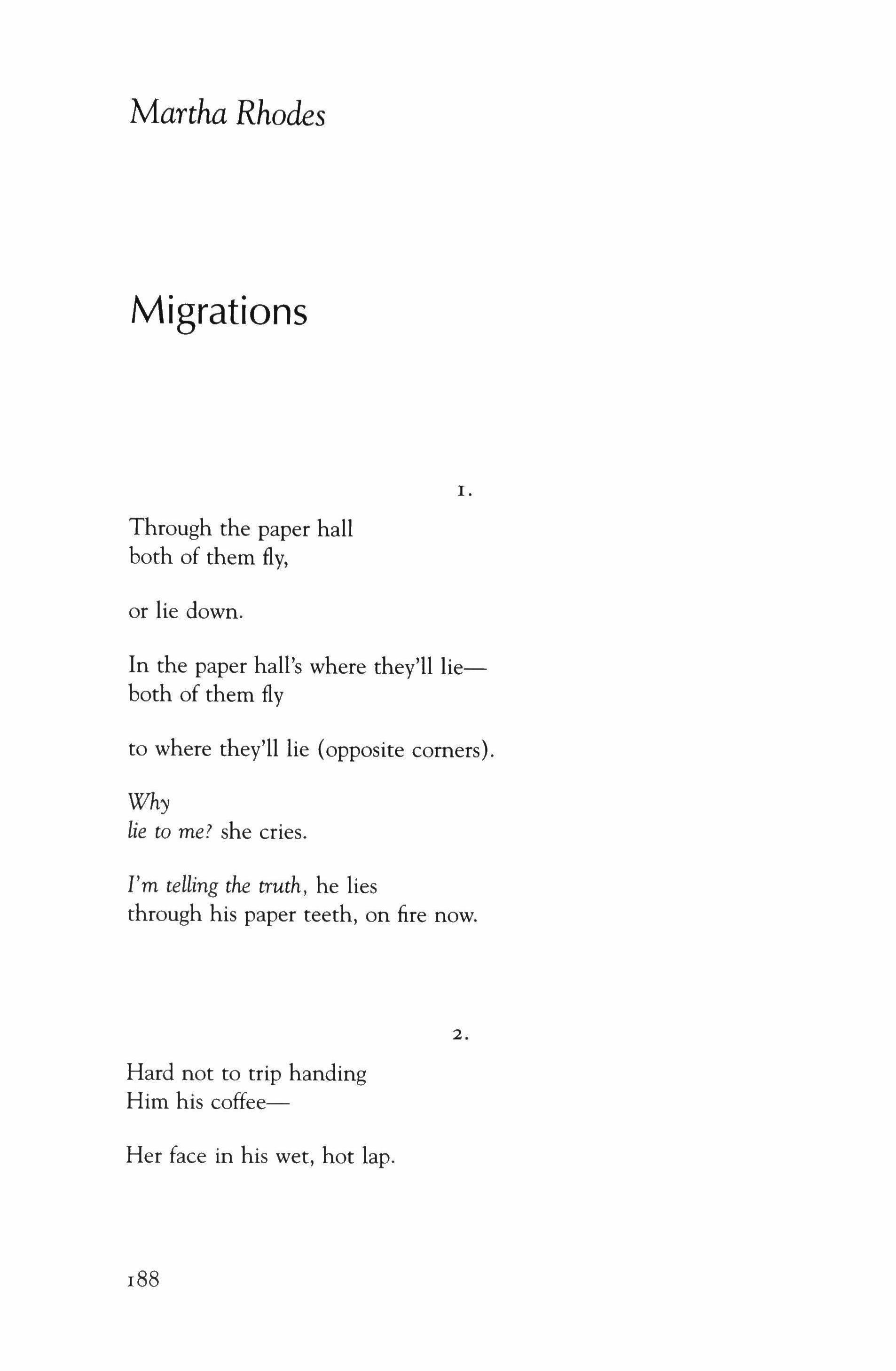
Migrations
Through the paper hall both of them fly, or lie down.
In the paper hall's where they'll lieboth of them fly
to where they'll lie (opposite comers).
Why lie to me? she cries.
I'm telling the truth, he lies through his paper teeth, on fire now.
2.
Hard not to trip handing Him his coffee-
Her face in his wet, hot lap.
I.
188
3·
Ordered by her to leave forever he eyes the wallpaper he chose and pasted. She bought the curtains to match the paper. Oh, can't they just continue like thisher drapes, his walls.
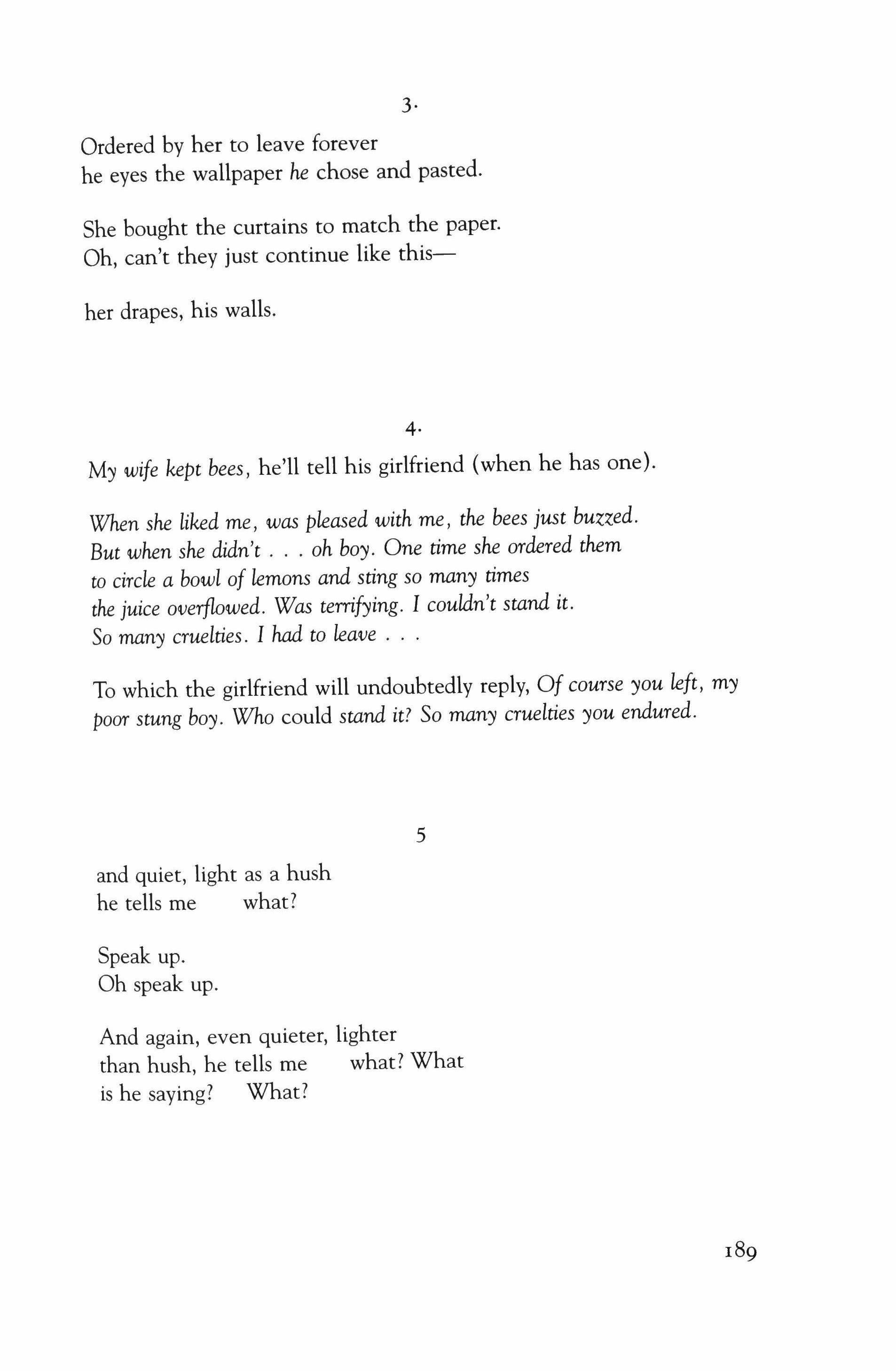
4·
My wife kept bees, he'll tell his girlfriend (when he has one).
When she liked me, was pleased with me, the bees just buzzed. But when she didn't oh boy. One time she ordered them to circle a bowl of lemons and sting so many times the juice overflowed. Was terrifying. I couldn't stand it. So many cruelties. I had to leave
To which the girlfriend will undoubtedly reply, Of course you left, my poor stung boy. Who could stand it? So many cruelties you endured.
5
and quiet, light as a hush he tells me what?
Speak up. Oh speak up.
And again, even quieter, lighter than hush, he tells me what? What is he saying? What?
And lighter, softer than hush he tells me if he wanted me to hear him
I'd hear him.
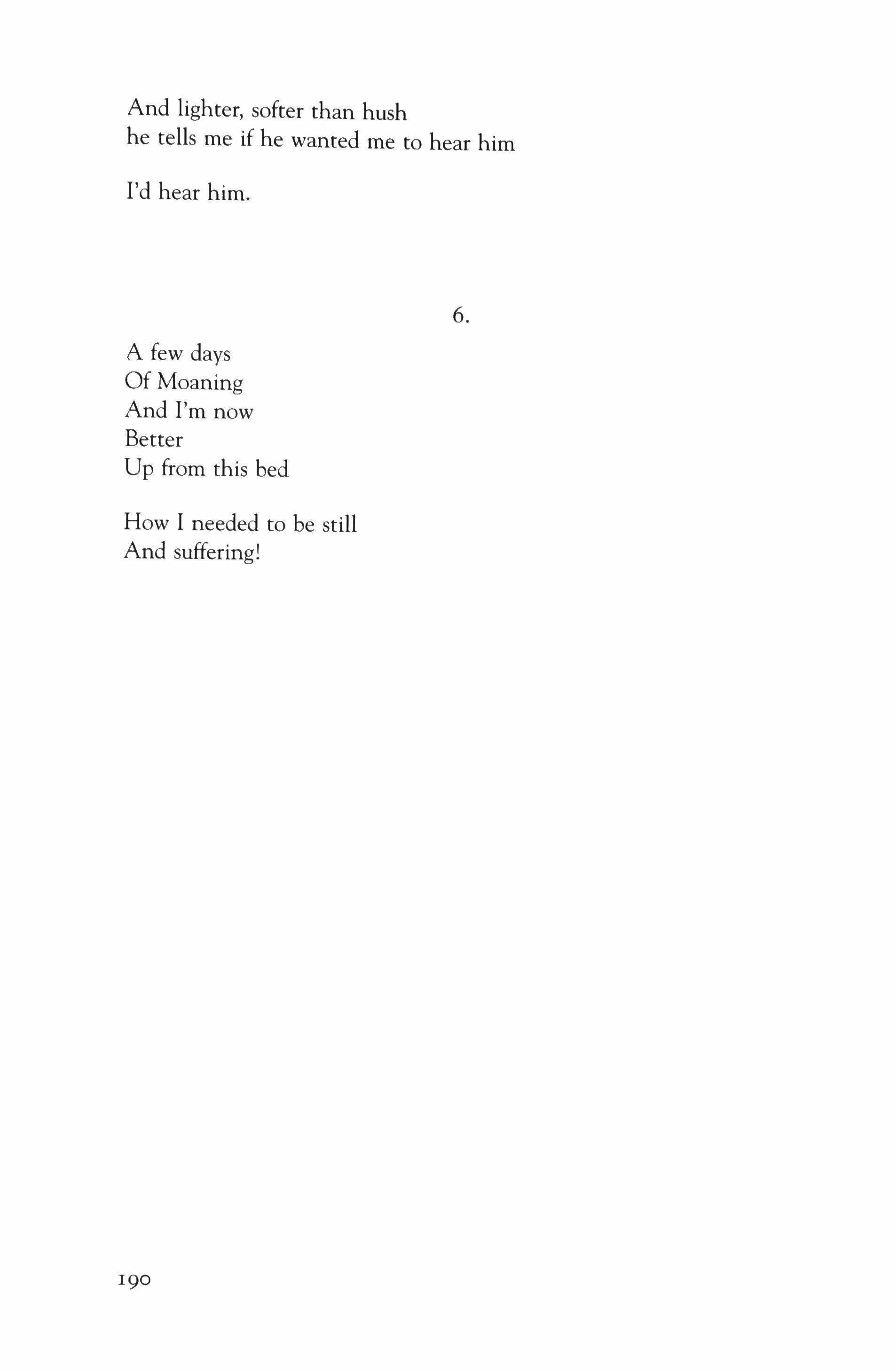
A few days Of Moaning And I'm now Better Up from this bed
How I needed to be still And suffering!
6.
Our House

Ours is the only all glass house in the state. Tourists from everywhere come to see, especially a guy from Worcester.
He yells from his car, hey honey, walk down the hall to the bathroom again and do that little thing you do when you adjust your skirt-
Ours is the only all glass house in the world, my oldest sister moans.
My teacher says our house is a bow wow house! I announce one night.
That's Bauhaus, dear, our mother says, and goodness, it's not.
My friends love our house. My friends love ME! my middle sister boasts.
Remember, girls, it's the interior of the house that's of import, Father proclaims. To find one's riches, one must look within.
Indeed we do, dear, Mother says, we do do that.
Mark Halliday

Bonite in the Park
Private silence drove him out to the silence of public noise.
He was not young but he was a boy. He hated the word typical. In this park there were invisible gnats which dissolved ideas.
Officer, I'm not bothering anyone, I just want to sit and read.
All this was three years ago, in that period when solitude was blatant. Each young woman wearing denim cutoffs was annihilation for him. Each pretty one.
Officer, I'm not bothering anyone, I just want to sit and read.
If it's all mere physics then this spirit sensation is a vicious joke.
The narrow man who crossed the park scuffing leaves was a bundle of telegrams unsent.
All this was three years ago, in that period when solitude was blatant. Evening came gently but not without the usual mortality whisper. Father, I did not mean to be foolish. Mother, I meant to be good.
Each young woman wearing denim cutoffs was annihilation for himeach pretty one.
The fact that his arms were thin seemed to confirm, or require, romanticism.
The worry of men is partly like the worry of sparrows. He murmured songs but the lyrics bumped into a furniture store and fell in a heap.
If it's all mere physics then this spirit sensation is a vicious joke. Father, I did not mean to be foolish. Mother, I meant to be good.
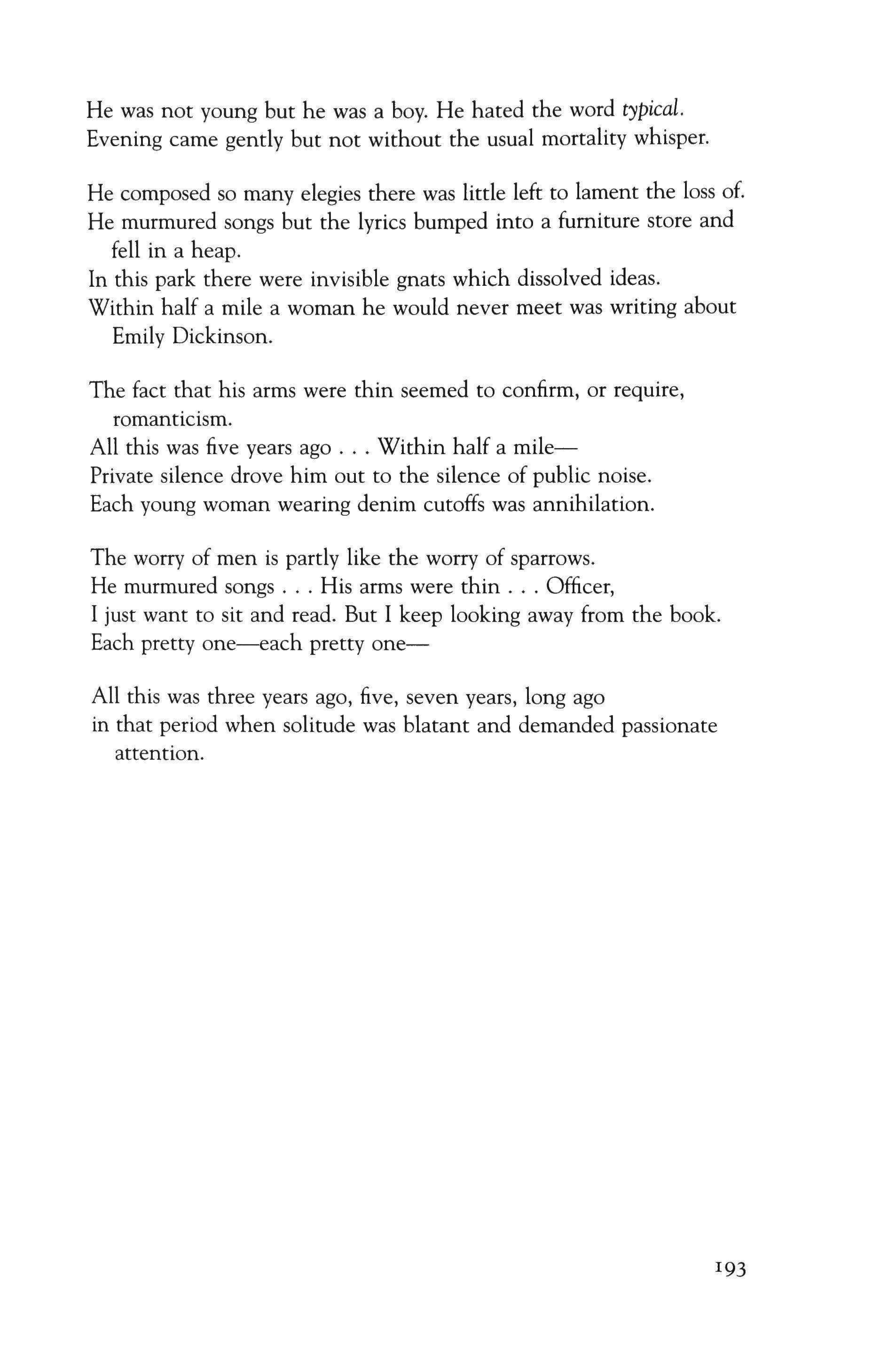
He was not young but he was a boy. He hated the word typical. Evening carne gently but not without the usual mortality whisper.
He composed so many elegies there was little left to lament the loss of. He murmured songs but the lyrics bumped into a furniture store and fell in a heap. In this park there were invisible gnats which dissolved ideas. Within half a mile a woman he would never meet was writing about Emily Dickinson.
The fact that his arms were thin seemed to confirm, or require, romanticism.
All this was five years ago Within half a milePrivate silence drove him out to the silence of public noise. Each young woman wearing denim cutoffs was annihilation.
The worry of men is partly like the worry of sparrows. He murmured songs His arms were thin Officer, I just want to sit and read. But I keep looking away from the book. Each pretty one-each pretty one-
All this was three years ago, five, seven years, long ago in that period when solitude was blatant and demanded passionate attention.
193
Special Heads
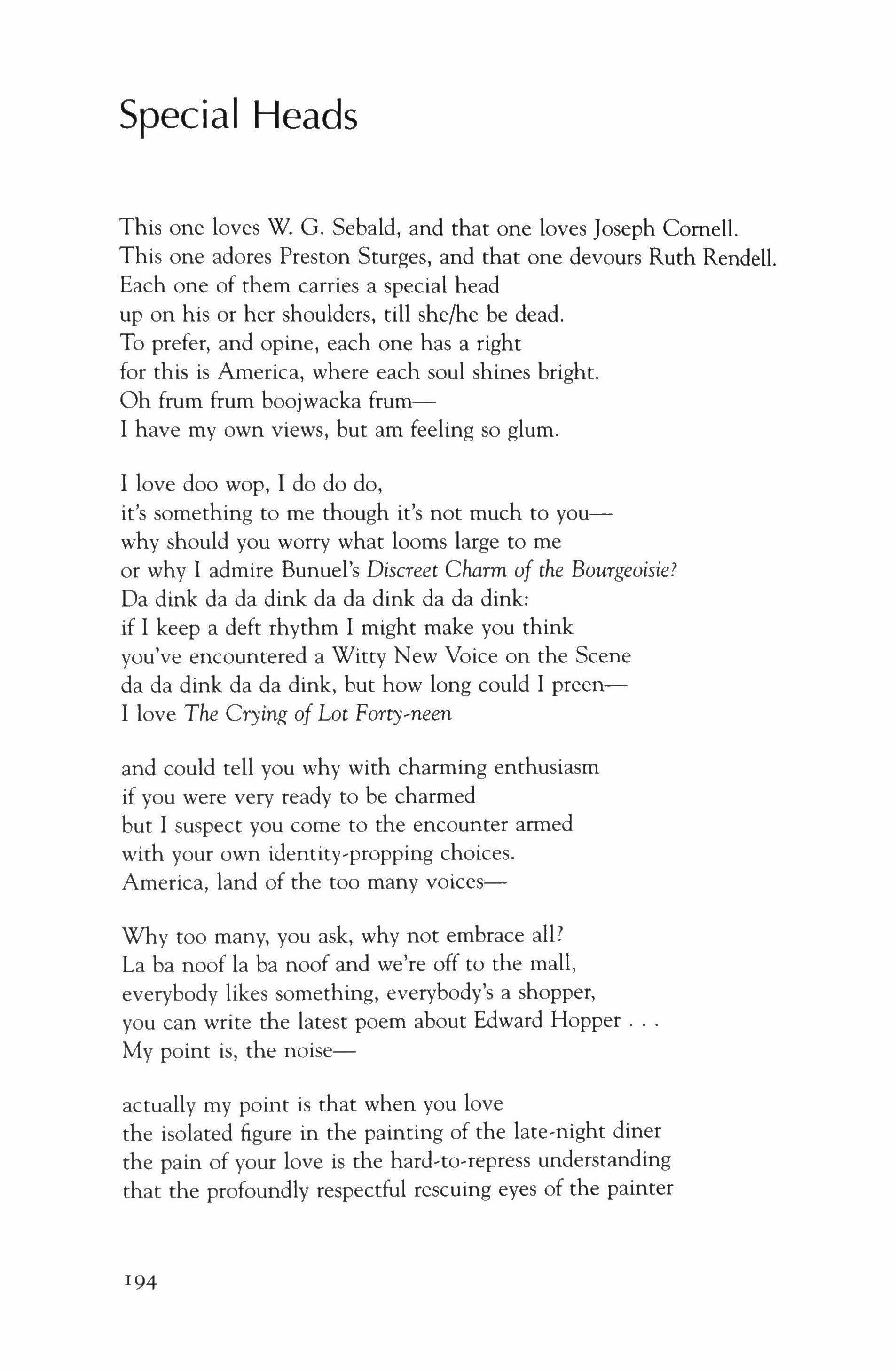
This one loves W. G. Sebald, and that one loves Joseph Cornell. This one adores Preston Sturges, and that one devours Ruth Rendell. Each one of them carries a special head up on his or her shoulders, till she/he be dead. To prefer, and opine, each one has a right for this is America, where each soul shines bright.
Oh frum frum boojwacka frum-
I have my own views, but am feeling so glum.
I love doo wop, I do do do, it's something to me though it's not much to youwhy should you worry what looms large to me or why I admire Bunuel's Discreet Charm of the Bourgeoisie?
Da dink da da dink da da dink da da dink: if I keep a deft rhythm I might make you think you've encountered a Witty New Voice on the Scene da da dink da da dink, but how long could I preen
I love The Crying of Lot Forty-neen
and could tell you why with charming enthusiasm if you were very ready to be charmed but I suspect you come to the encounter armed with your own identity-propping choices. America, land of the too many voices-
Why too many, you ask, why not embrace all?
La ba noof la ba noof and we're off to the mall, everybody likes something, everybody's a shopper, you can write the latest poem about Edward Hopper My point is, the noise-
actually my point is that when you love the isolated figure in the painting of the late-night diner the pain of your love is the hard-to-repress understanding that the profoundly respectful rescuing eyes of the painter
194
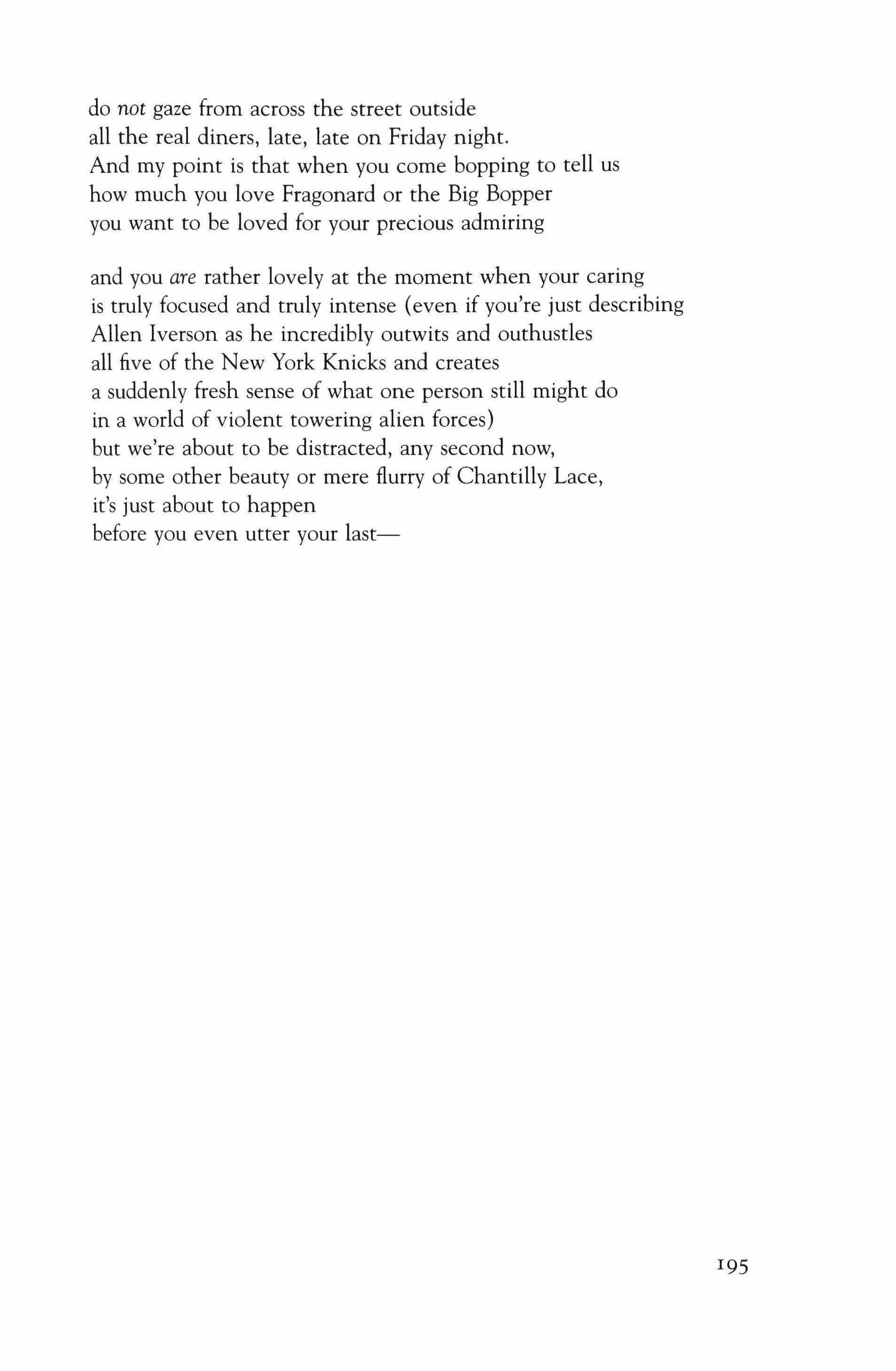
do not gaze from across the street outside all the real diners, late, late on Friday night. And my point is that when you come bopping to tell us how much you love Fragonard or the Big Bopper you want to be loved for your precious admiring and you are rather lovely at the moment when your caring is truly focused and truly intense {even if you're just describing Allen Iverson as he incredibly outwits and outhustles all five of the New York Knicks and creates a suddenly fresh sense of what one person still might do in a world of violent towering alien forces} but we're about to be distracted, any second now, by some other beauty or mere flurry of Chantilly Lace, it's just about to happen before you even utter your last-
195
Fiction Funk
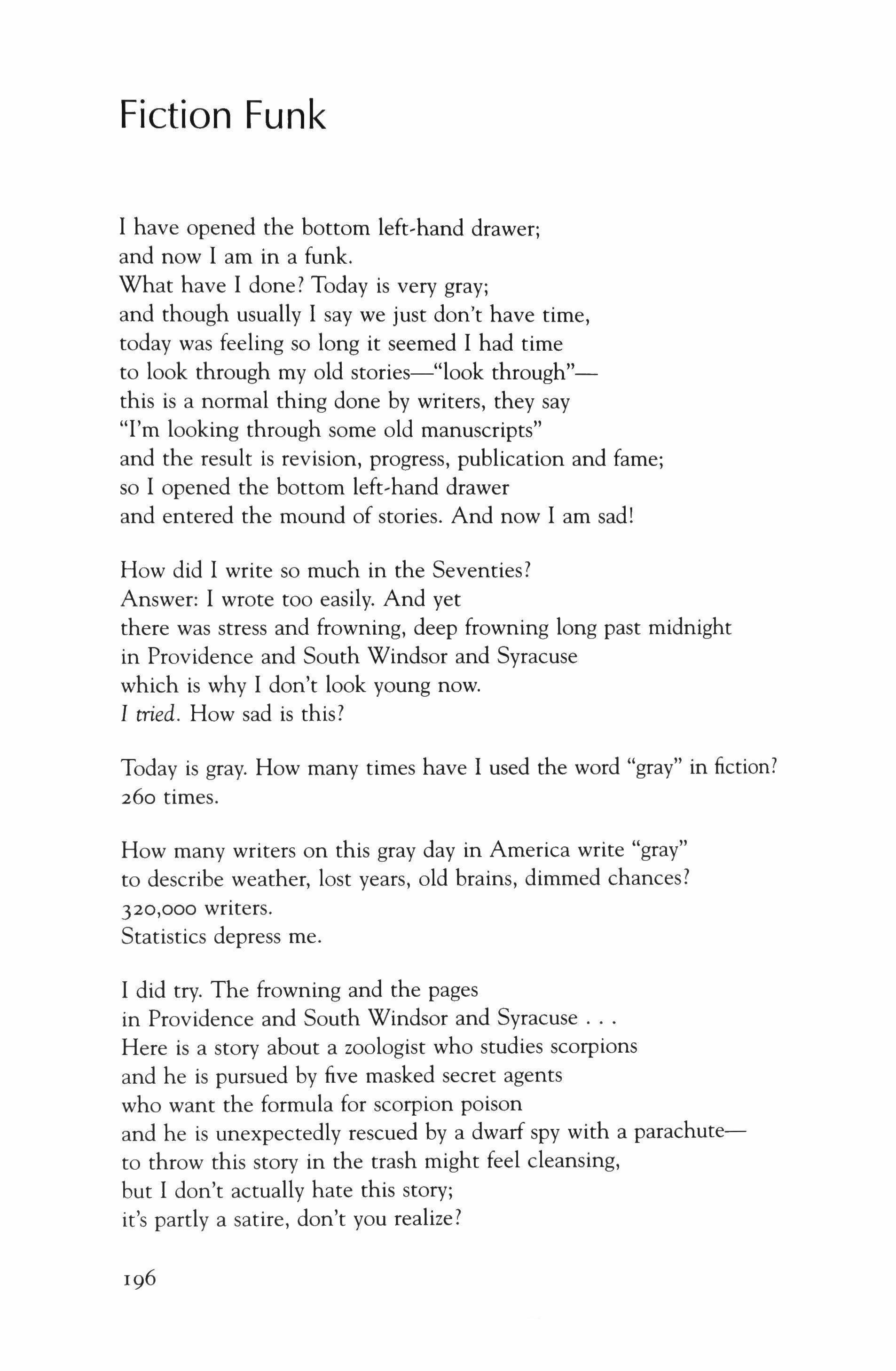
I have opened the bottom left-hand drawer; and now I am in a funk. What have I done? Today is very gray; and though usually I say we just don't have time, today was feeling so long it seemed I had time to look through my old stories-"look through"this is a normal thing done by writers, they say "I'm looking through some old manuscripts" and the result is revision, progress, publication and fame; so I opened the bottom left-hand drawer and entered the mound of stories. And now I am sad!
How did I write so much in the Seventies?
Answer: I wrote too easily. And yet there was stress and frowning, deep frowning long past midnight in Providence and South Windsor and Syracuse which is why I don't look young now. I tried. How sad is this?
Today is gray. How many times have I used the word "gray" in fiction? 260 times.
How many writers on this gray day in America write "gray" to describe weather, lost years, old brains, dimmed chances? 320,000 writers. Statistics depress me.
I did try. The frowning and the pages in Providence and South Windsor and Syracuse Here is a story about a zoologist who studies scorpions and he is pursued by five masked secret agents who want the formula for scorpion poison and he is unexpectedly rescued by a dwarf spy with a parachuteto throw this story in the trash might feel cleansing, but I don't actually hate this story; it's partly a satire, don't you realize?
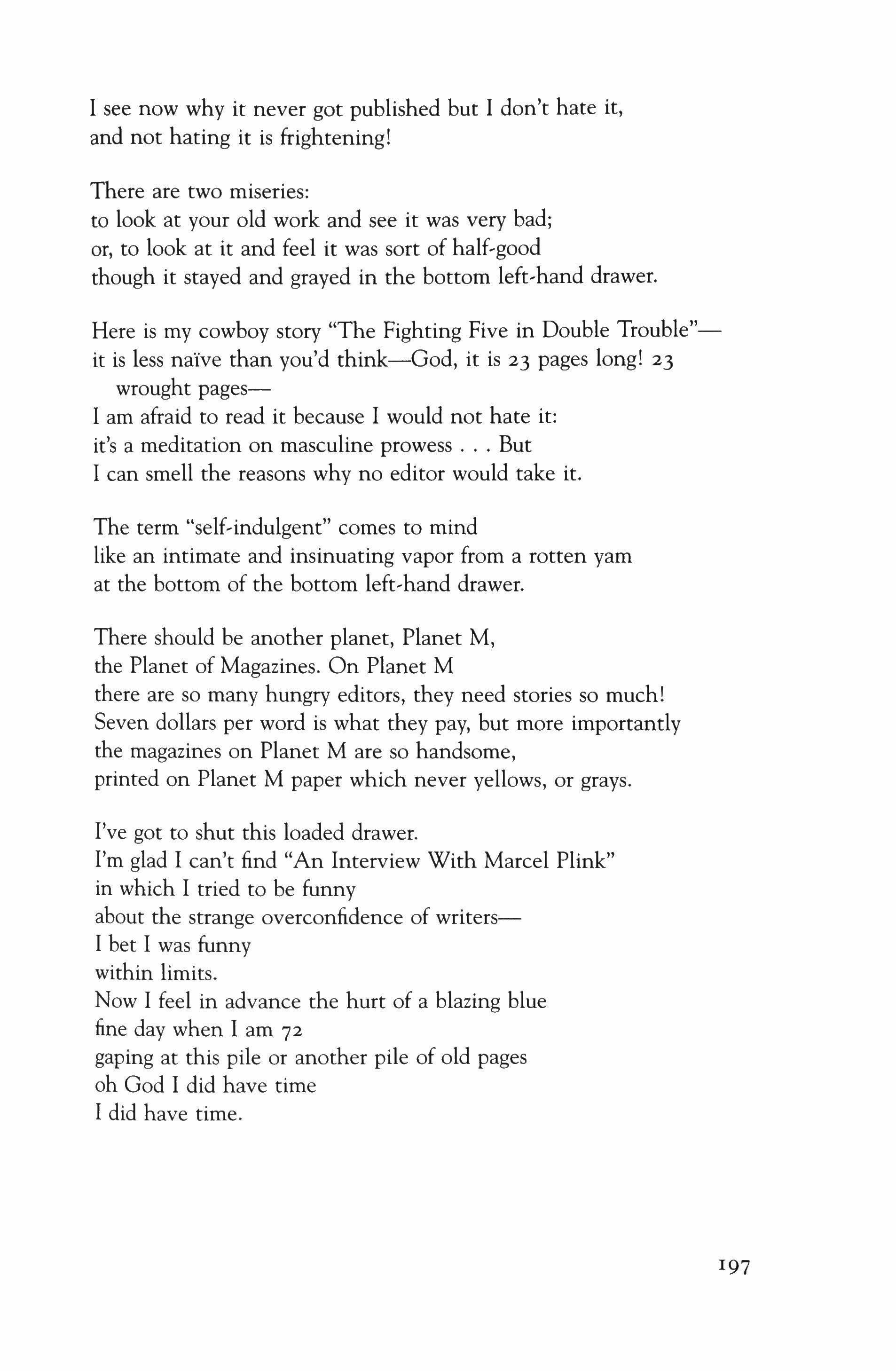
I see now why it never got published but I don't hate it, and not hating it is frightening!
There are two miseries: to look at your old work and see it was very bad; or, to look at it and feel it was sort of half,good though it stayed and grayed in the bottom left-hand drawer.
Here is my cowboy story "The Fighting Five in Double Trouble"it is less naive than you'd think-God, it is 23 pages long! 23 wrought pagesI am afraid to read it because I would not hate it: it's a meditation on masculine prowess But I can smell the reasons why no editor would take it.
The term "self,indulgent" comes to mind like an intimate and insinuating vapor from a rotten yam at the bottom of the bottom left-hand drawer.
There should be another planet, Planet M, the Planet of Magazines. On Planet M there are so many hungry editors, they need stories so much! Seven dollars per word is what they pay, but more importantly the magazines on Planet M are so handsome, printed on Planet M paper which never yellows, or grays.
I've got to shut this loaded drawer. I'm glad I can't find "An Interview With Marcel Plink" in which I tried to be funny about the strange overconfidence of writersI bet I was funny within limits.
Now I feel in advance the hurt of a blazing blue fine day when I am 72 gaping at this pile or another pile of old pages oh God I did have time I did have time.
197
Carl Phillips

Lost, But for a Few Still-Bright Details
Of the sea coming, sea,like, in; and the ships coming with it; and the quartermaster rocking, sweating beneath his orison of song, of signal-
And when that, too, was over:
When it was dark:
I lit a torch, I threw it, into the dark, it turned over and over again upon itself-if, over when, over if-itself a thronedom, weightless, unresisted, subject only to its own no-turning-back momentum, into the dark, making visible briefly those bits of the world that it passed over and, as when the back of a hand we've been struck about the head and face by enough before no longer surprises, whatever the torch lit, in passing, remained flinchless, fell without flinching back, into the dark the torch left behind it, a hand moving less
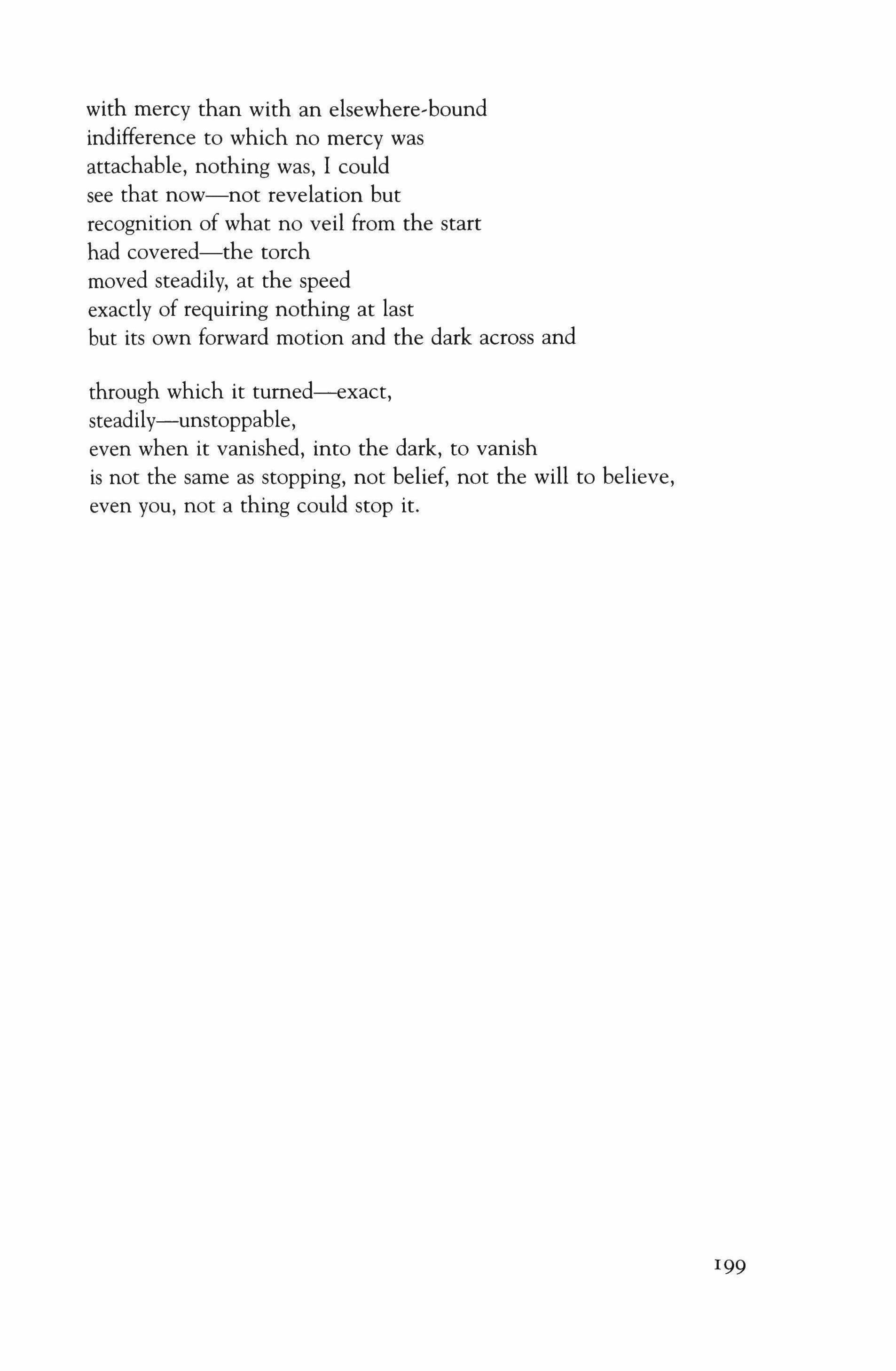
with mercy than with an elsewhere-bound indifference to which no mercy was attachable, nothing was, I could see that now-not revelation but recognition of what no veil from the start had covered-the torch moved steadily, at the speed exactly of requiring nothing at last but its own forward motion and the dark across and through which it tumed-exact, steadily-unstoppable, even when it vanished, into the dark, to vanish is not the same as stopping, not belief, not the will to believe, even you, not a thing could stop it.
199
Plumage

Like defining beauty without apology. Like arguing for it on moral grounds. To that extent-yes, sexual. Touching my hand but not taking it-on purpose, I think-briefly a gesture I'd at best once been fond of somewhere else, someone, You should come to me again, more often, you should come when I say-
I was nowhere I'd been before, despite parts 1 recognized: the old cathedral they'd recently elevated to basilica, its copper roof, the light when it fell on it falling no differently-a glove, a gauntlet-falling through a space where sorrow wasn't sorrow, it only looked like that, patient there, hawk-like in its patience in the sorrow branches.
200
John Koethe

Midtown
Is it so ridiculous, at an age
Long past the age of the exceptional And that city paved with gold and set for me,
To feel this sealed sense of self still
Breathing in the traffic of an April afternoon?
Sometimes I'd come in on the bus at noon
And walk around and have the perfect lunch I'd Saved for and arranged, and walk around some more. And I remember Scribner's and the galleries, The brilliant stores and all those interchangeable French restaurants with their Gallic names, And once a recognition that that person Staring from a mirror in the Metropolitan was me. There's a Gap now where De Pinna used to be And Chambertin closed years ago, and yet the sunlight Falling on Fifth Avenue feels practically the same. The clouds above St. Patrick's are the clouds from college.
A sphere of self set in a sea of average days
Bereft of purpose and of personality, a sea of passage
As though time were just a medium, a blankness Summoned in tranquility and then filled in. It's not what fills it up but that it passes And in passing recreates the world, which remains Unchanged. The crux is how you feel that world, Constructed from the way you feel yourself, Your friends, your feeling for the present and the past And for a place where all these incomplete conceptions end. For as I walked around today what struck me wasn't
201

What was different or was still the sameTrump Tower vs. Tiffany's-but just the inwardness Of being there at all, a point of isolation on a Former street of dreams that seemed demystified and small. There really was a kingdom: it was in my head, Beyond recall. There's nothing waiting for me now But what was waiting for me then-a hotel room, An evening with a friend, an ordinary place beyond a Sealed consciousness impervious to change. Grant me the heart to feel it and the sense to see.
202
A Tulip Tree
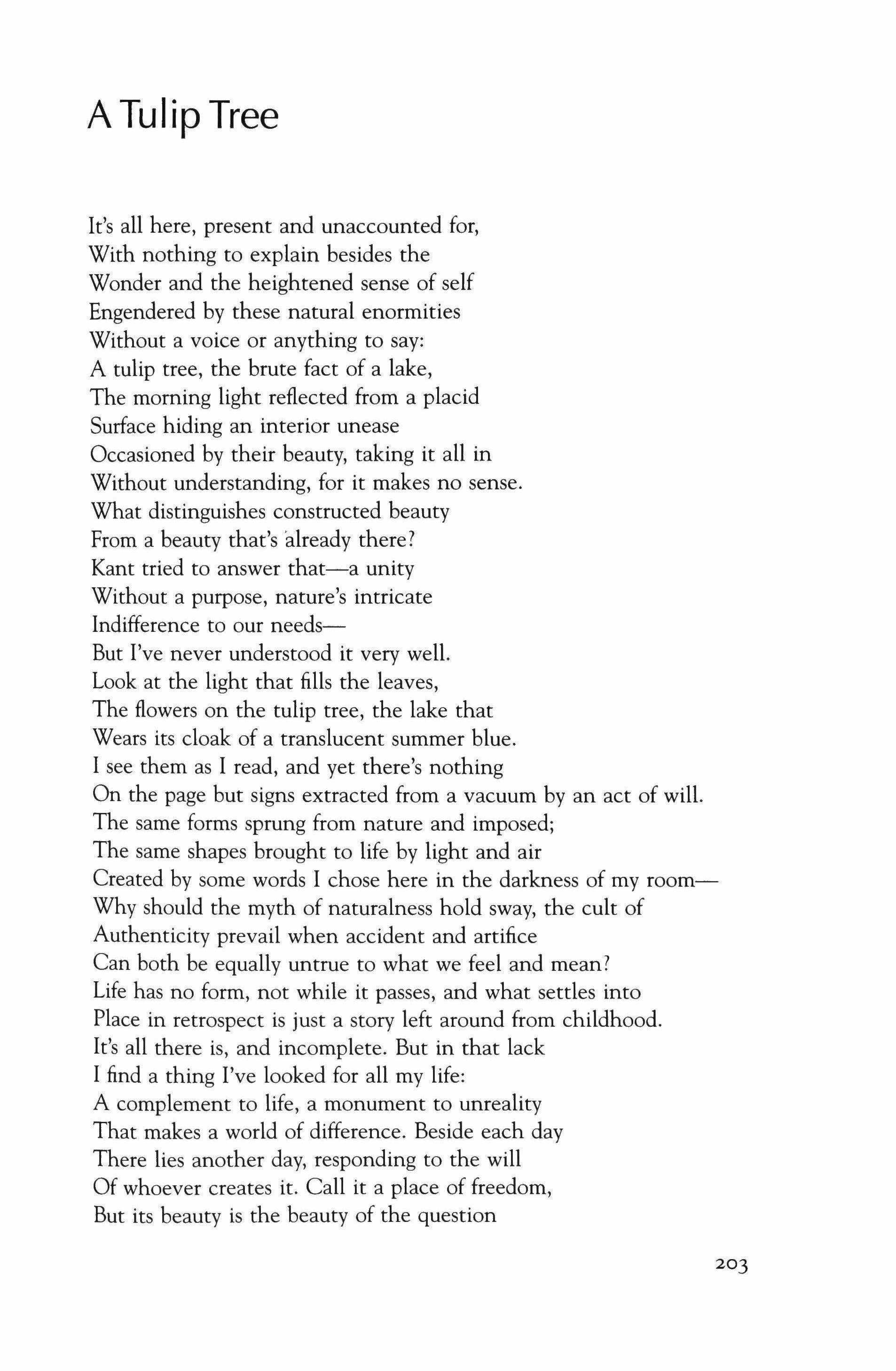
It's all here, present and unaccounted for, With nothing to explain besides the Wonder and the heightened sense of self Engendered by these natural enormities
Without a voice or anything to say:
A tulip tree, the brute fact of a lake, The morning light reflected from a placid
Surface hiding an interior unease
Occasioned by their beauty, taking it all in
Without understanding, for it makes no sense.
What distinguishes constructed beauty From a beauty that's 'already there?
Kant tried to answer that-a unity
Without a purpose, nature's intricate Indifference to our needs-
But I've never understood it very well. Look at the light that fills the leaves, The flowers on the tulip tree, the lake that Wears its cloak of a translucent summer blue.
I see them as I read, and yet there's nothing
On the page but signs extracted from a vacuum by an act of will. The same forms sprung from nature and imposed; The same shapes brought to life by light and air
Created by some words I chose here in the darkness of my roomWhy should the myth of naturalness hold sway, the cult of Authenticity prevail when accident and artifice
Can both be equally untrue to what we feel and mean?
Life has no form, not while it passes, and what settles into Place in retrospect is just a story left around from childhood. It's all there is, and incomplete. But in that lack I find a thing I've looked for all my life:
A complement to life, a monument to unreality That makes a world of difference. Beside each day There lies another day, responding to the will Of whoever creates it. Call it a place of freedom, But its beauty is the beauty of the question
203
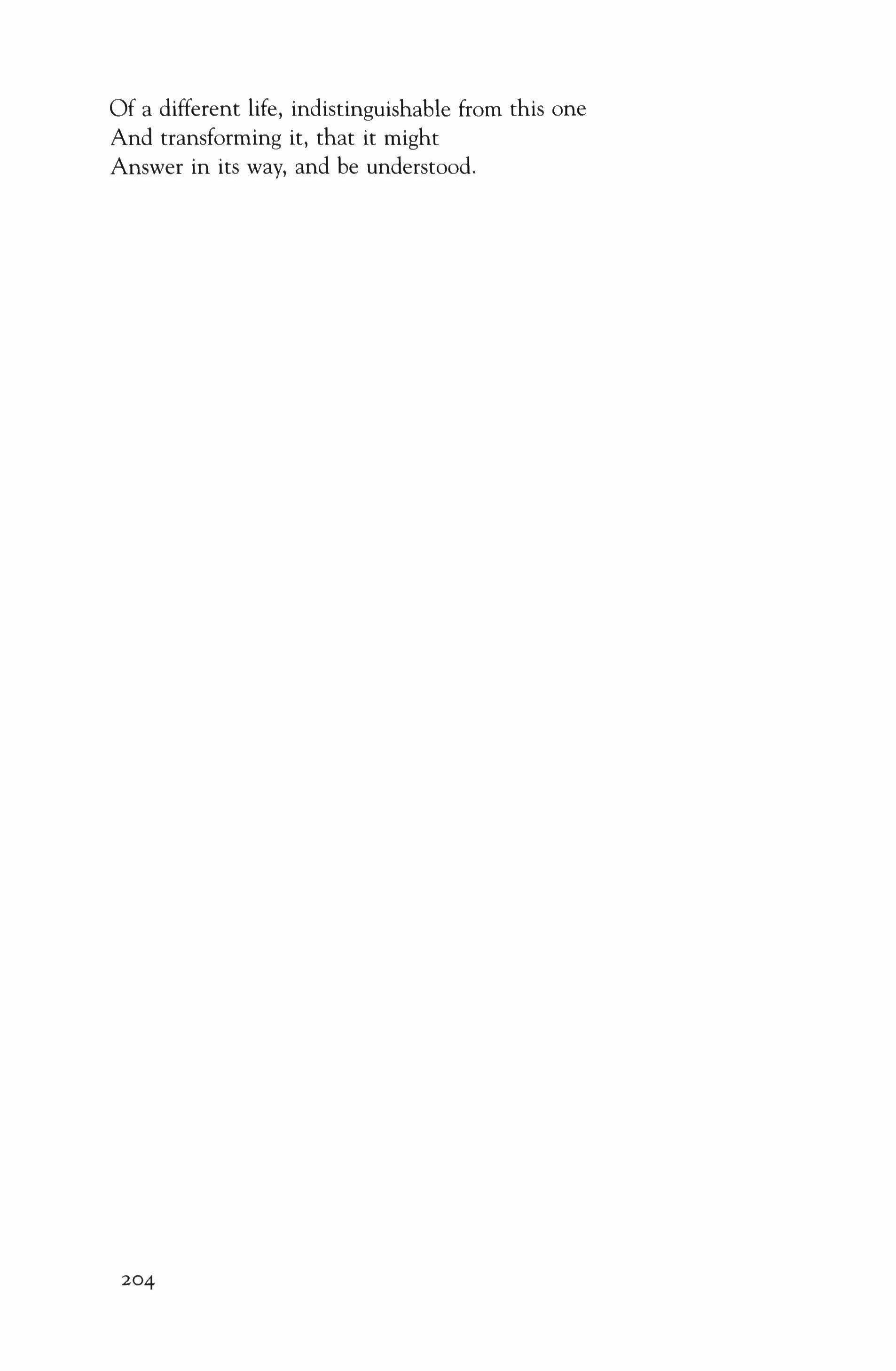
Of a different life, indistinguishable from this one And transforming it, that it might Answer in its way, and be understood.
204
CONTRIBUTORS
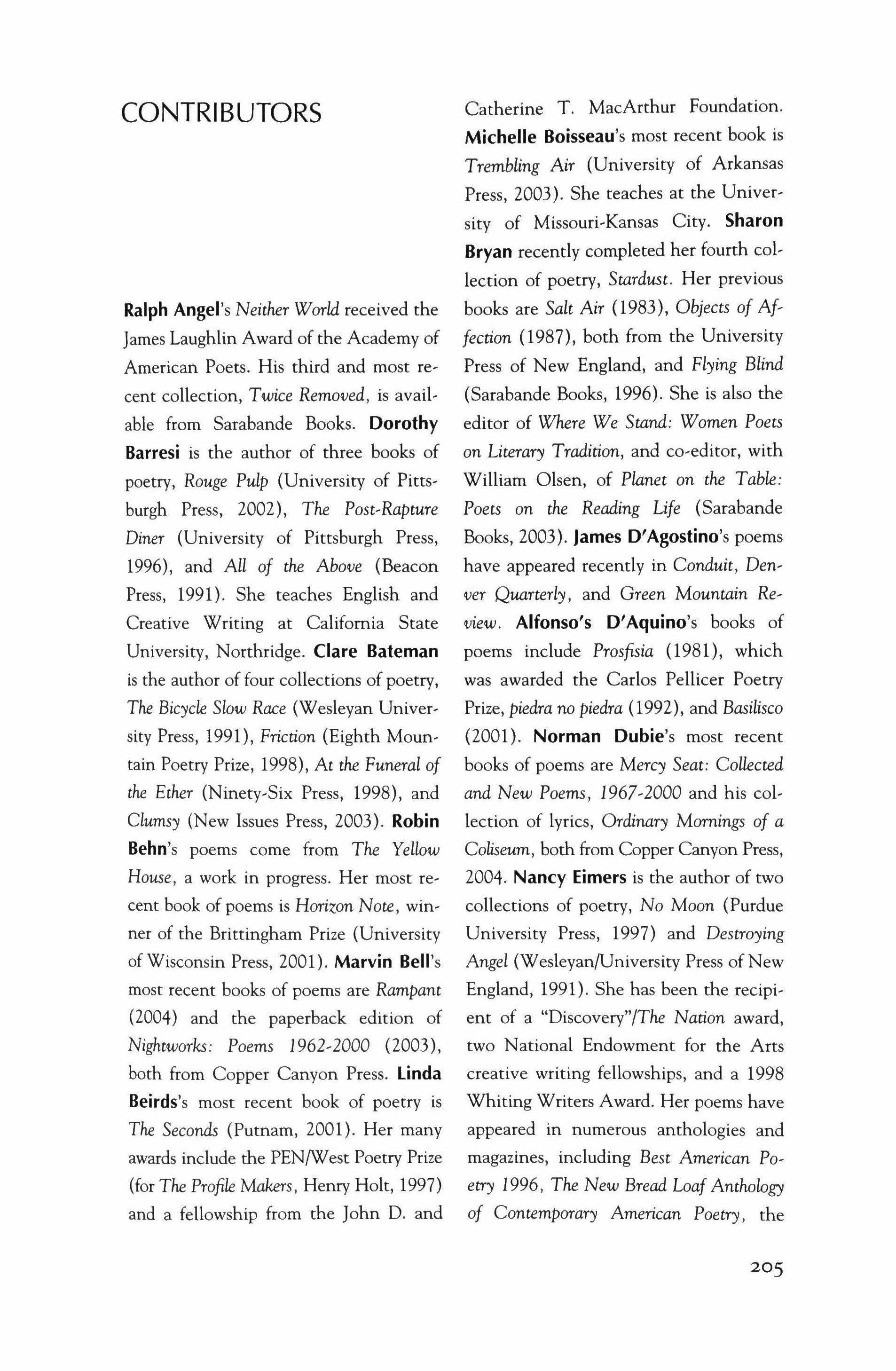
Ralph Angel's Neither World received the James Laughlin Award of the Academy of American Poets. His third and most recent collection, Twice Removed, is available from Sarabande Books. Dorothy Barresi is the author of three books of poetry, Rouge Pulp (University of Pittsburgh Press, 2002), The Post-Rapture Diner (University of Pittsburgh Press, 1996), and All of the Above (Beacon Press, 1991). She teaches English and Creative Writing at California State University, Northridge. Clare Bateman is the author of four collections of poetry, The Bicycle Slow Race (Wesleyan University Press, 1991), Friction (Eighth Mountain Poetry Prize, 1998), At the Funeral of the Ether (Ninety-Six Press, 1998), and Clumsy (New Issues Press, 2003). Robin Behn's poems come from The Yellow House, a work in progress. Her most recent book of poems is Horizon Note, winner of the Brittingham Prize (University of Wisconsin Press, 2001). Marvin Bell's most recent books of poems are Rampant (2004) and the paperback edition of Nightworks: Poems 1962-2000 (2003), both from Copper Canyon Press. linda Beirds's most recent book of poetry is The Seconds (Putnam, 2001). Her many awards include the PEN/West Poetry Prize (for The Profile Makers, Henry Holt, 1997) and a fellowship from the John D. and
Catherine T. MacArthur Foundation. Michelle Boisseau's most recent book is Trembling Air (University of Arkansas Press, 2003). She teaches at the University of Missouri-Kansas City. Sharon Bryan recently completed her fourth collection of poetry, Stardust. Her previous books are Salt Air (1983), Objects of Affection (1987), both from the University Press of New England, and Flying Blind (Sarabande Books, 1996). She is also the editor of Where We Stand: Women Poets on Literary Tradition, and co-editor, with William Olsen, of Planet on the Table: Poets on the Reading Life (Sarabande Books, 2003). James D'Agostino's poems have appeared recently in Conduit, Denver Quarterly, and Green Mountain Review. Alfonso's 0'Aquino's books of poems include Prosfisia (1981), which was awarded the Carlos Pellicer Poetry Prize, piedra no piedra (1992), and Basilisco (2001). Norman Dubie's most recent books of poems are Mercy Seat: Collected and New Poems, 1967-2000 and his collection of lyrics, Ordinary Mornings of a Coliseum, both from Copper Canyon Press, 2004. Nancy Eimers is the author of two collections of poetry, No Moon (Purdue University Press, 1997) and Destroying Angel (Wesleyan/University Press of New England, 1991). She has been the recipient of a "Discovery"/The Nation award, two National Endowment for the Arts creative writing fellowships, and a 1998 Whiting Writers Award. Her poems have appeared in numerous anthologies and magazines, including Best American Poetry 1996, The New Bread Loaf Anthology of Contemporary American Poetry, the
205

Paris Review, TriQuarterly, Field and Poetry Northwest. She teaches creative writing at Western Michigan University and in the MFA Program at Vermont College. Miranda Field has won a "Discovery"/ The Nation Award and a Pushcart Prize. Her first book, Swallow (Houghton Mifflin, 2002), won the Katharine Bakeless Nason Literary Publication Prize in Poetry. Forrest Gander's translations include No Shelter: Selected Poems by Pura Lopez Colome (Graywolf, 2001) and Mouth to Mouth: Poems by Twelve Contemporary Mexican Women (Milkweed Editions, 1993). His own most recent books are Science and Steepleflower (1998) and Tom Awake (2001), both from New Directions. Beckian Fritz Goldberg is the author of several volumes of poetry, including Body Betrayer (1991), In the Badlands of Desire (1993), both from Cleveland State University Press, and Never Be the Horse (Akron Poetry Prize, University of Akron Press, 1999). The Book of Accident will appear from the University of Akron Press in 2006. Linda Gregerson's third book of poems, Waterborne, received the Kingsley Tufts Poetry Award in 2002 and has just appeared in paperback. Her other awards include the Academy Award in literature from the American Academy of the Arts and Letters, the Levinson Prize from Poetry magazine, grants and fellowships from the Institute for Advanced Study, the Ingram Merrill Foundation, the National Humanities Center, the National Endowment for the Arts, and the Guggenheim Foundation. Mark Halliday teaches at Ohio University. His books of poems are
Little Star (William Morrow, 1987), Tasker Street (University of Massachusetts, 1992), Selfwolf (1999) and Jab (2002), both from the University of Chicago Press. Tony Hoagland's third collection of poems, What Narcissism Means to Me, is recently out from Graywolf Press. His second book, Donkey Gospel, was winner of the James Laughlin Prize. Cynthia Huntington's most recent book, The Radiant, won the Lewis Prize and was published by Four Way Books in 2003. Richard Jackson's most recent books of poems are Unauthorized Biography: New and Selected Poems (Ashland Poetry Press, 2003) and HeartwaU (University of Massachusetts Press, Juniper Prize, 2000). His poems have been translated into more than a dozen languages, including a book in Slovene. Kent Johnson is editor of Beneath a Single Moon: Buddhism in Contemporary American Poetry (Random House, 1991) and Third Wave: The New Russian Poetry (University of Michigan Press, 1992). Immanent Visitor: Selected Poems of Jaime Saenz, co-translated with Forrest Gander, was a finalist for the 2003 Pen Translation Award. Maurice Kilwein Guevara teaches in the doctoral creative writing program at the University of Wisconsin-Milwaukee. Currently president of the AWP, he is the first Latino to hold that position. John Koethe's most recent book, North Point North: New and Selected Poems (HarperCollins, 2002), was a finalist for the Los Angeles Times Book Prize. Richard Lyons directs the creative writing program at Mississippi State University. His books include These Modem Nights (University of Missouri Press,
206
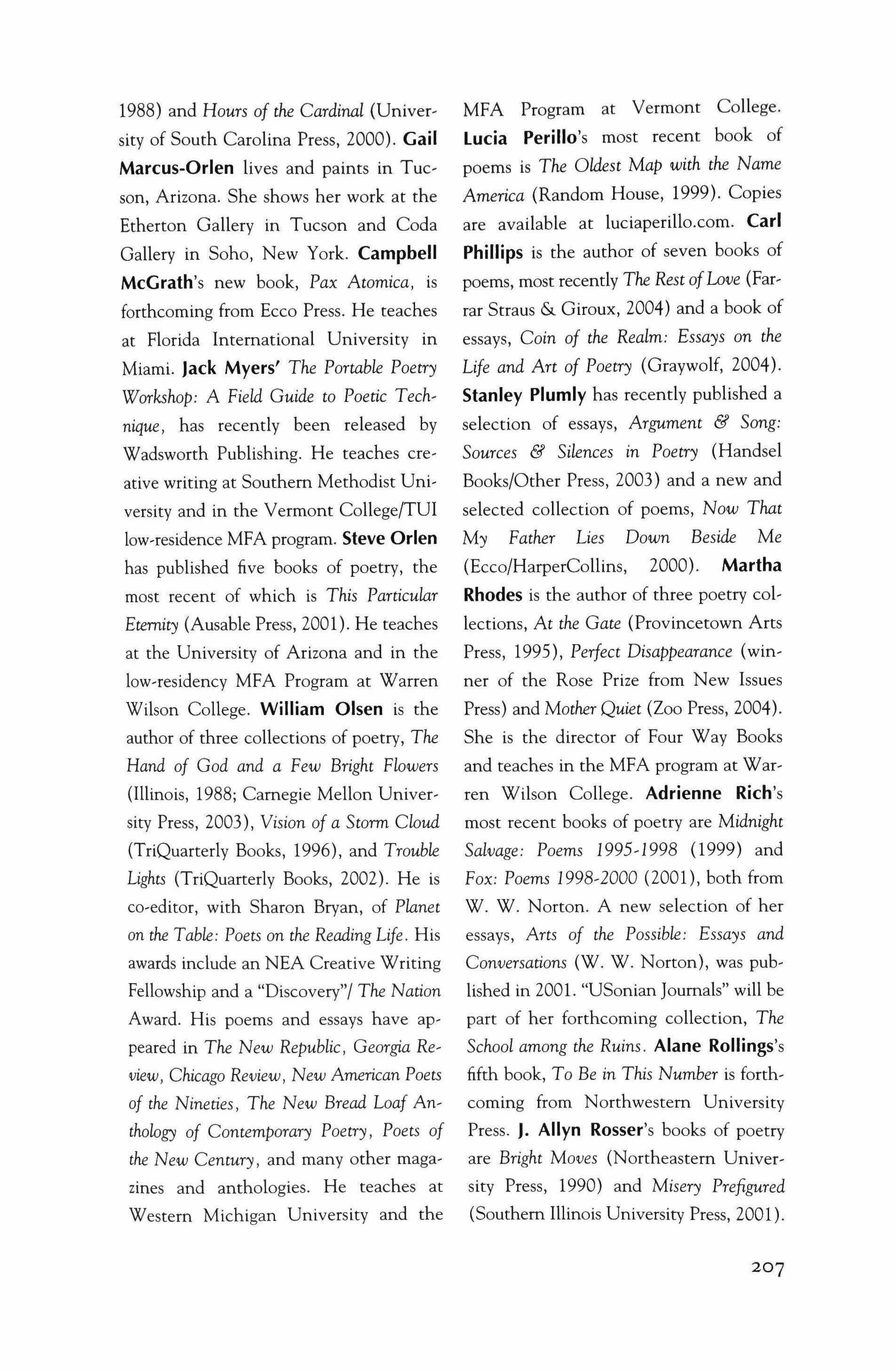
1988) and Hours of the Cardinal (University of South Carolina Press, 2000). Gail Marcus-Orlen lives and paints in Tucson, Arizona. She shows her work at the Etherton Gallery in Tucson and Coda Gallery in Soho, New York. Campbell McGrath's new book, Pax Atomica, is forthcoming from Ecco Press. He teaches at Florida International University in Miami. Jack Myers' The Portable Poetry Workshop: A Field Guide to Poetic Technique, has recently been released by Wadsworth Publishing. He teaches creative writing at Southern Methodist University and in the Vermont College/TUI low-residence MFA program. Steve Orlen has published five books of poetry, the most recent of which is This Particular Eternity (Ausable Press, 2001). He teaches at the University of Arizona and in the low-residency MFA Program at Warren Wilson College. William Olsen is the author of three collections of poetry, The Hand of God and a Few Bright Flowers (Illinois, 1988; Carnegie Mellon University Press, 2003), Vision of a Storm Cloud (TriQuarterly Books, 1996), and Trouble Lights (TriQuarterly Books, 2002). He is co-editor, with Sharon Bryan, of Planet on the Table: Poets on the Reading Life. His awards include an NEA Creative Writing Fellowship and a "Discovery"/ The Nation Award. His poems and essays have appeared in The New Republic, Georgia Review, Chicago Review, New American Poets of the Nineties, The New Bread Loaf Anthology of Contemporary Poetry, Poets of the New Century, and many other magazines and anthologies. He teaches at Western Michigan University and the
MFA Program at Vermont College. Lucia Perillo's most recent book of poems is The Oldest Map with the Name America (Random House, 1999). Copies are available at luciaperillo.com. Carl Phillips is the author of seven books of poems, most recently The Rest ofLove (Farrar Straus & Giroux, 2004) and a book of essays, Coin of the Realm: Essays on the Life and Art of Poetry (Graywolf, 2004).
Stanley Plumly has recently published a selection of essays, Argument & Song: Sources & Silences in Poetry (Handsel Books/Other Press, 2003) and a new and selected collection of poems, Now That My Father Lies Down Beside Me (Ecco/HarperCollins, 2000). Martha Rhodes is the author of three poetry collections, At the Gate (Provincetown Arts Press, 1995), Perfect Disappearance (winner of the Rose Prize from New Issues Press) and Mother Quiet (Zoo Press, 2004). She is the director of Four Way Books and teaches in the MFA program at Warren Wilson College. Adrienne Rich's most recent books of poetry are Midnight Salvage: Poems 1995-1998 (1999) and Fox: Poems 1998-2000 (2001), both from W. W. Norton. A new selection of her essays, Arts of the Possible: Essays and Conversations (W. W. Norton), was published in 2001. "USonian Journals" will be part of her forthcoming collection, The School among the Ruins. Alane Rollings's fifth book, To Be in This Number is forthcoming from Northwestern University Press. J. Allyn Rosser's books of poetry are Bright Moves (Northeastern University Press, 1990) and Misery Prefigured (Southern Illinois University Press, 2001).
207

She teaches at Ohio University and the University of Houston. Mary Ruefle is the author of eight books of poetry, most recently Tristimania (Carnegie Mellon, 2004). James Ryang is a poet, photographer, and translator. He lives in Brooklyn. Jaime Saenz (1921-1986) was Bolivia's greatest and most visionary poet of the twentieth century. He lived his whole life in La Paz. Reginald Shepherd's books are Otherhood (2003), Wrong (1999), Angel, Interrupted (1996), and Some Are Dreaming (1994; AWP Award 1993), all from the University of Pittsburgh Press. Betsy Sholl's most recent book is Late Psalm (University of Wisconsin Press, 2004). Arthur Smith's most recent books of poems are The Late World (2002) and Orders of Affection (1996), both from Carnegie Mellon University Press. He is professor of English at the University of Tennessee. Pamela Stewart's most recent book is The Red Window (University of Georgia Press, 1997). She is slowly working on a chapbook manuscript and on a "new and selected." David st. John's most recent book is The Face: A Novella in Verse (HarperCollins, 2004). He lives in Venice, CA. Jean Valentine is the author of eight books of poetry, most recently The Cradle of Real Life (Wesleyan, 2000). Her collected and new poems, Door in the Mountain, is forthcoming from Wesleyan. David Wojahn's most recent books are Spirit Cabinet (Universiry of Pittsburgh Press, 2002) and Strange Good Fortune: Essays on Contemporary Poetry (University of Arkansas Press, 2001). He is a 2003 recipient of a Guggenheim Fellowship. 208
Subscriptions
Three issues per year. Individuals: one year $24; two years $44; life $600. Institutions: one year $36; two years $68. Overseas: $5 per year additional. Price of back issues varies. Sample copies $5· Address correspondence and subscriptions to TriQuarterly, Northwestern University, 629 Noyes St., Evanston, IL 60208-4210. Phone (847) 491-7614.
Submissions
The editors invite submissions of fiction, poetry and literary essays, which must be postmarked between October I and March 3 I; manuscripts postmarked between April I and September 30 will not be read. No manuscripts will be returned unless accompanied by a stamped, self-addressed envelope. All manuscripts accepted for publication become the properry of TriQuarterly, unless otherwise indicated.
Reprints
Reprints of issues 1- I7 of TriQuarterly are available in full format from Kraus Reprint Company, Route 100, Millwood, NY 10546, and all issues in microfilm from Universiry Microfilms International, 300 North Zeeb Road, Ann Arbor, MI 48106.
Indexing
TriQuarterly is indexed in the Humanities Index (H. W. Wilson Co.), the American Humanities Index (Whitson Publishing Co.), Historical Abstracts, MLA, EBSCO Publishing (Peabody, MAl and Information Access Co. (Foster Ciry, CAl.
Distributors
Our national distributors to retail trade are Ingram Periodicals (La Vergne, TN); B. DeBoer (Nutley, NJ); Ubiquiry (Brooklyn, NY); Armadillo (Los Angeles, CAl·
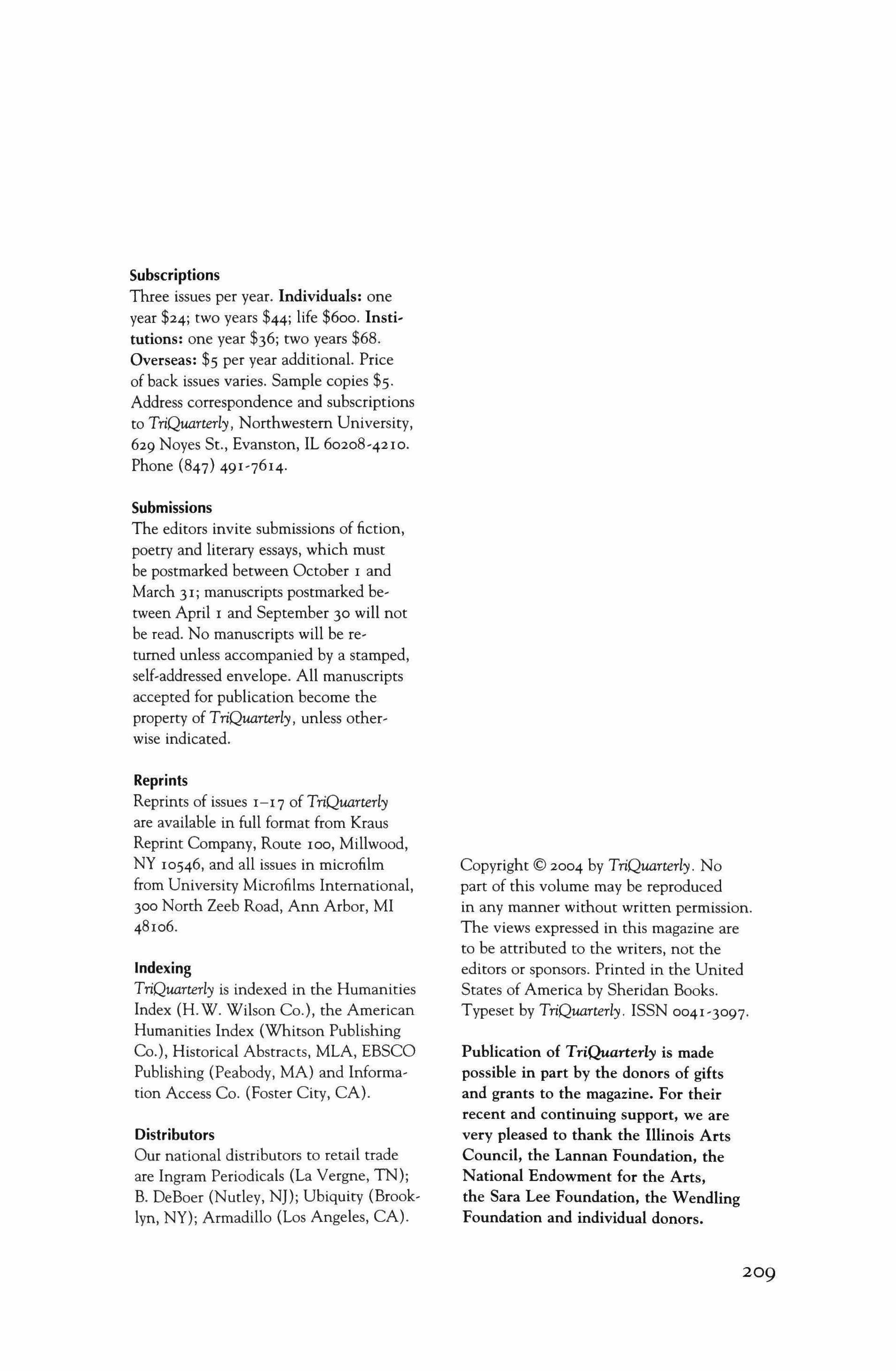
Copyright © 2004 by TriQuarterly. No part of this volume may be reproduced in any manner without written permission. The views expressed in this magazine are to be attributed to the writers, not the editors or sponsors. Printed in the United States of America by Sheridan Books. Typeset by TriQuarterly. ISSN 0041-3097.
Publication of TriQuarterly is made possible in part by the donors of gifts and grants to the magazine. For their recent and continuing support, we are very pleased to thank the Illinois Arts Council, the Lannan Foundation, the National Endowment for the Arts, the Sara Lee Foundation, the Wendling Foundation and individual donors.
209
Washington and Lee University
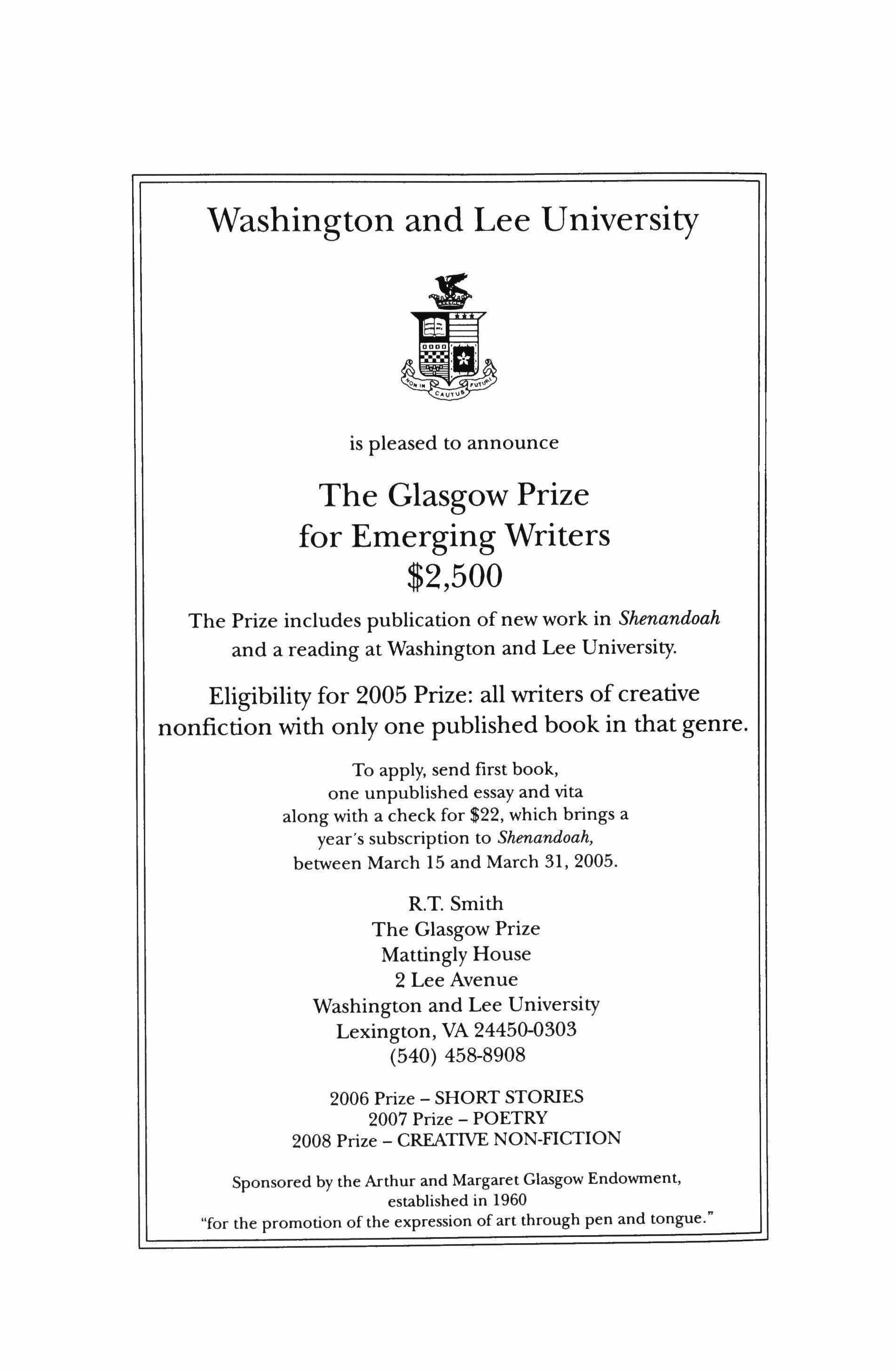
is pleased to announce
The Glasgow Prize for Emerging Writers
$2,500
The Prize includes publication of new work in Shenandoah and a reading at Washington and Lee University.
Eligibility for 2005 Prize: all writers of creative nonfiction with only one published book in that genre.
To apply, send first book, one unpublished essay and vita along with a check for $22, which brings a year's subscription to Shenandoah, between March 15 and March 31, 2005.
R.T. Smith
The Glasgow Prize Mattingly House 2 Lee Avenue Washington and Lee University Lexington, VA 24450-0303 (540) 458-8908
2006 Prize - SHORT STORIES
2007 Prize - POETRY
2008 Prize - CREATIVE NON-FICTION
Sponsored by the Arthur and Margaret Glasgow Endowment, established in 1960 "for the promotion of the expression of art through pen and tongue."
Promoting the diverse work of new and established writers since 1990
Win
We award $1,000 prizes and publication for prose and poetry in our annual spring contest. Past judges include Mark Doty, Rick Moody, Ellen Bryant Voigt, Ehud Havazelet, and Scott Russell Sanders.
Submit
Fugue invites submissions of fiction, creative nonfiction, and poetry. Send SASE for guidelines or visit us on the web at www.class.uidaho.edu/english/Fugue
Subscribe

Past contributors
Kathy Acker
Steve Almond
Charles Baxter
Stephen Dobyns
Denise Duhamel
Stephen Dunn
Terrance Hayes
Brenda Hillman
Jane McCafferty
Ed McClanahan
Sharon Olds
Padgert Powell
Pattiann Rogers
Sonia Sanchez
Floyd Skloot
Melanie Rae Thon
Robert Wrigley
Individual
1 year! 2 issues
$14
2 years! 4 issues $25
3 years! 6 issues $35
Institutional
1 year! 2 issues $22
2 years! 4 issues $40
3 years! 6 issues $55
Send orders to: Fugue
200 Brink Hall
P.O. Box 441102
University of Idaho Moscow, Idaho 83844-1102
� The Pushcart Prize and Best American Essays have recognized the emergence of this voice in American Letters. Take a look and see if you agree. cs-
Published by the MFA program at the University of Idaho.
MARK RUDMAN'S POETRY from Wesleyan
Praise for the Rider Trilogy
Mark Rudman hit a vein of pure gold.. with Rider, which won the 1994 National Book Critics Circle Award for poetry. The poised frenetic energy ofthat journey through autobiography and intellectual obsessions might have seemed a tough act to follow, but The Millennium Hotel delivers if anything even more bravura, wildness, originality.
-Voice Literary Supplement (25: Up: Our Favorite Books ofthe Year)
Since Byron, many poets have been "provoked" into poetry by Venice, and, since Pound, that provocation has proved to be particularly fruitful for American poets. Provoked in Venice makes a rich, and distinctly personal, addition to this tradition. Rudman's Venice becomes a site where meditations on the formings and fadings ofold-world cultures mingle with American memories and autobiographical details. The result is, exactly, not ordinary.
-Tony Tanner
THE COUPLE
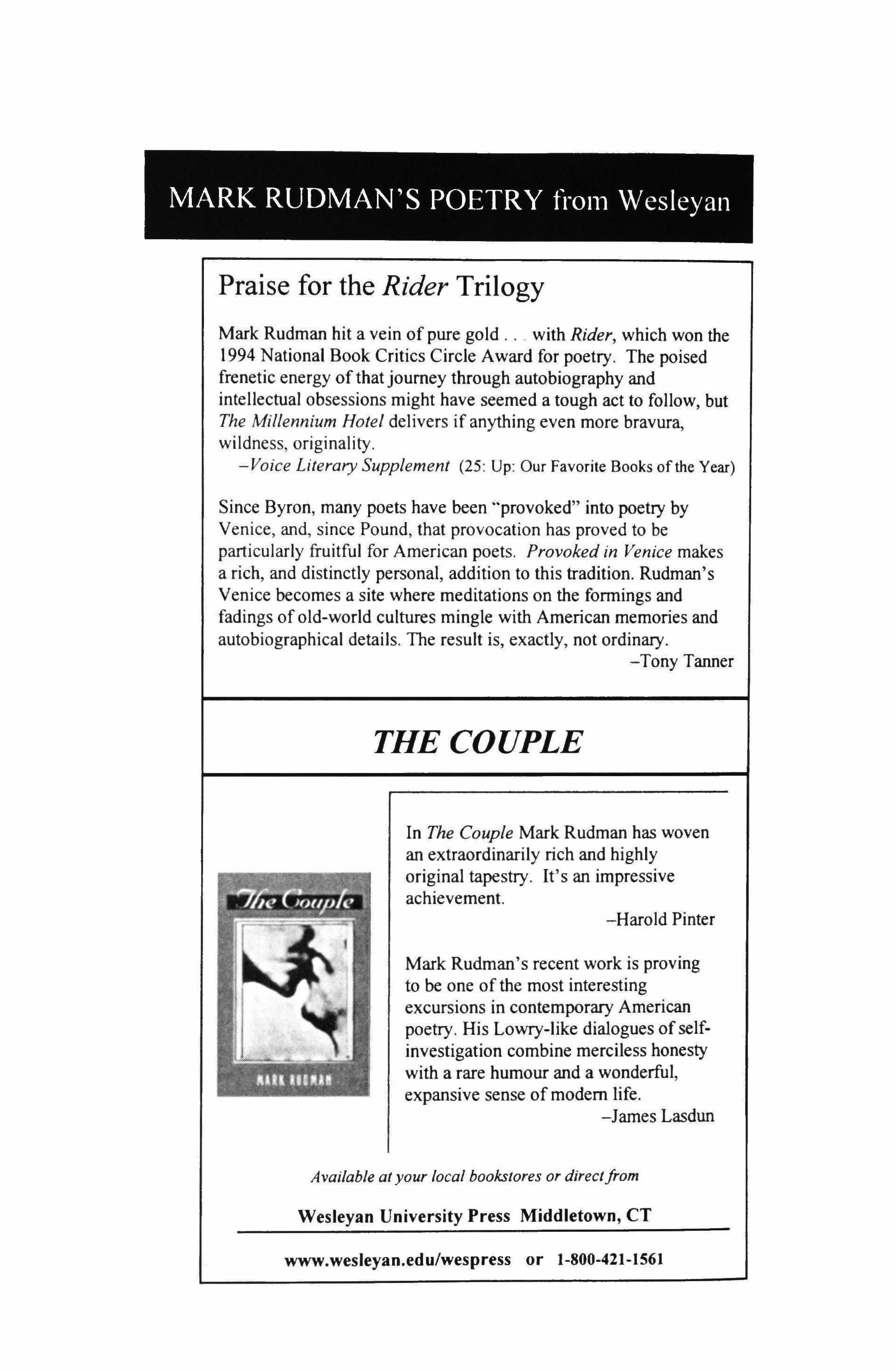
In The Couple Mark Rudman has woven an extraordinarily rich and highly original tapestry. It's an impressive achievement.
-Harold Pinter
Mark Rudman's recent work is proving to be one of the most interesting excursions in contemporary American poetry. His Lowry-like dialogues ofselfinvestigation combine merciless honesty with a rare humour and a wonderful, expansive sense ofmodem life.
-James Lasdun
Available at your local bookstores or directfrom Wesleyan University Press Middletown, CT
www.wesleyan.edu!wespress or 1-800-421-1561
Contributors Have Included:
Nin Andrews
Adrian Blevins
Fleda Brown
Denise Duhamel
Cornelius Eady
Moira Egan
Roland Flint
Tony Hoagland
Dorianne Laux
William Matthews
Howard Nemerov
Linda Pastan
Stanley Plumly
David St. John
Ross Taylor
Hilary Tham
David Wagoner
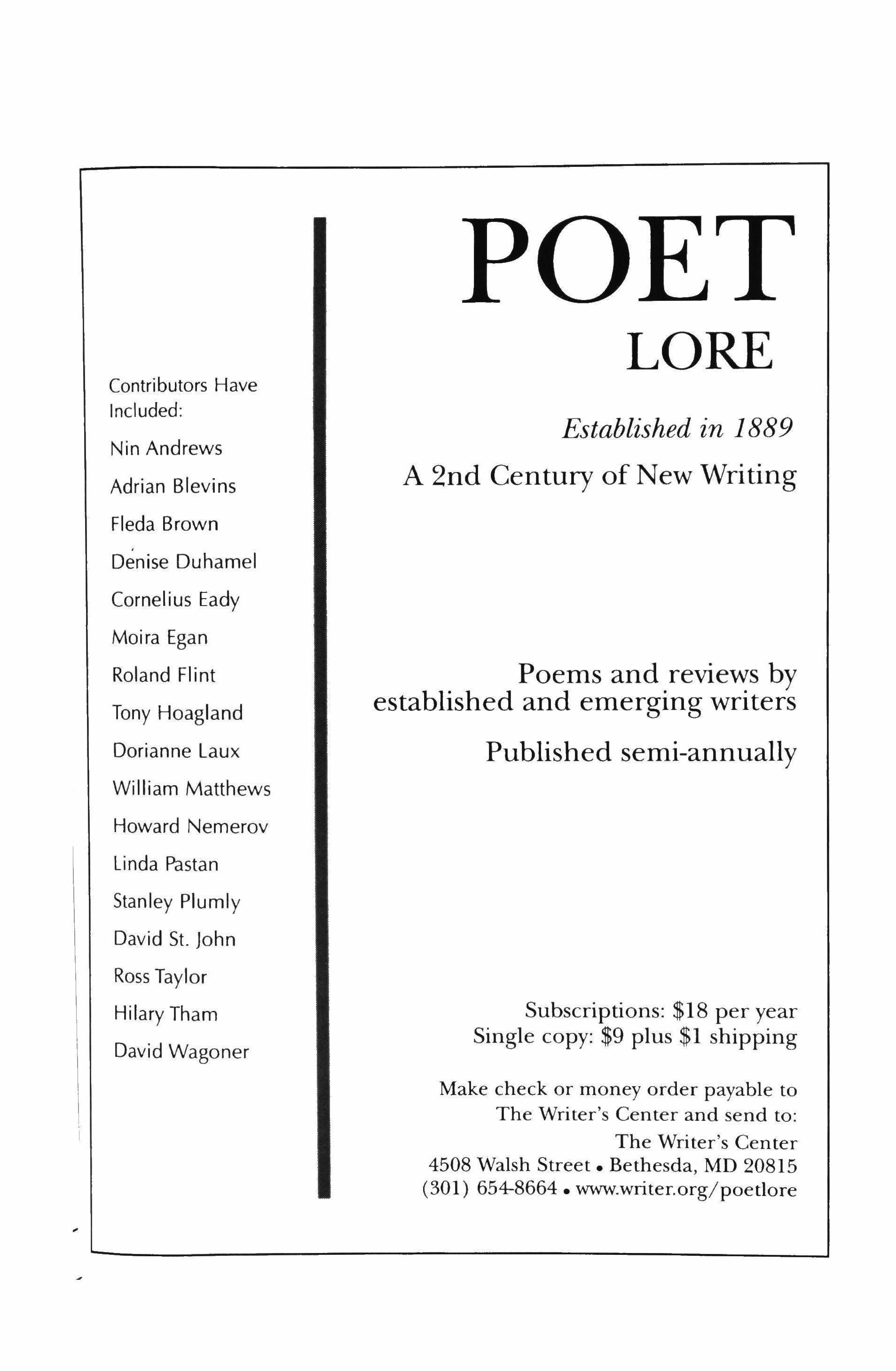
POET LORE
Subscriptions: $18 per year Single copy: $9 plus $1 shipping
Make check or money order payable to The Writer's Center and send to: The Writer's Center 4508 Walsh Street. Bethesda, MD 20815 (301) 654-8664. www.writer.org/poetlore
Established
A 2nd Century of New Writing
in 1889
Poems and reviews by established and emerging writers Published semi-annually
Fiction Witold Gombrowicz • Vladimir [abotinsky Hans Janowitz • Joann Kobin Trudy
Lewis Mark Wisniewski Poetry
Jennifer Chang
Grotz Faiz

Alfred Corn
Ahmed Faiz
Rick Barot
Jennifer
Marilyn Hacker
Henrik Norbrandt Lucia Perillo
Elizabeth
Rees Victor Rodriguez Nunez Nonfiction
Jeremy Bernstein Dick Davis Carol Frost
• Mark Harman
Harold G. Henderson
Michael Ignatieff • Christian F. D. Schubart and much more
Twice the length of our usual publication, this special double issue (Vol. 25, # 1,2) contains the memorable selection of contemporary poems, stories, and essays that NER readers have come to anticipate, as well as a broad array of works in and on translation. You'll find compelling work in all genres, including essays reflecting on ideas of translation and the process of translation itself Poems and stories appearing here-many of them for the first time in English-were originally written in French, German, Italian, Latin, Russian, Polish, Portuguese, Danish, Spanish, and Urdu and range over almost a thousand years, from the Middle Ages to the present moment.
$12 FOR THIS SPECIAL DOUBLE ISSUE, OR SUBSCRIBE NOW AT THE REGULAR RATE AND GET THE DOUBLE ISSUE PLUS THREE MORE! (PLEASE MENTION THIS AD WITH YOUR PAYMENT)
Subscriptions (4 i ssu c s ): S25 individuals, S+o institutions For single issues or to subscribe (,111 (xo o ) +50-l)5"71 or write to ��\\ England RC\'i�\\', Middlebury College, Middlcburv, \'"1" o,-,� Visit our website at \\'\\'\\'.middkhury.cdu/--llCl"l·\·ic\\,

MICHIGAN QUARTERLY REVIEW
ANNOUNCES A DOUBLE ISSUE
FALL 2004 AND WINTER 2005
VIET NAM: BEYOND THE FRAME
Edited by Rebekah Linh Collins and Barbara Tran
For-everyone there is a Viet Nam "beyond the frame": the one they never read about or saw depicted on their TV and movie screens; the one they came to know intimately, lost in the myths of history; the one they heard about from families in the diaspora but never experienced personally.
This special issue of MQR is the most comprehensive forum so far in which writers from a variety of academic disciplines, as well as creative writers, explore the terra incognita of a nation and people insufficiently studied and understood.
Essays and Reviews: John Balaban, Philip Beidler, Rebekah Linh Collins, Duong Bich Hanh, Eric Henry, Sarah Gail Johnson, Christian Langworthy, Boreth Ly, Tom Nawrocki, Isabelle Thuy Pelaud, Quang Phu Van, John C. Schafer, K. W. Taylor, Nora Taylor, Thuong Vuong Riddick, Monique Truong, Andrew Wells-Dang, Indigo Williams Willing, John Whitmore, Alex Wood, Jack Yeager
Fiction: Matt Friedson, Dennis Kistler, Andrew Lam, Christian Langworthy, Ly Lan (trans. Lily Chiu and Nguyen Thi Nga), Lee Minh McGuire, Aimee Phan, Tran Dieu Hang (trans. Qui-Phiet Tran), Tran Huy Quang (trans. Le Ngoc Tran), Viet Dinh, Vu Tran, Bruce Weigl
Poetry: Bao Phi, Earl Coleman, Jilly Dybka, W. D. Ehrhart, Preston Hood, Lam Thi My Da (trans. Martha Collins and Thuy Dinh), Christian Langworthy, Linh Dinh, Walt McDonald, Catherine K. H. N. Magia, Barbara Tran, Truong Tran
Graphic works: Binh Danh, Howard Henry Chen
To order both issues, send a check for $18 (includes postage) to ,Michigan Quarterly Review, 3574 Rackham Bldg., 915 E. Washington St., Ann Arbor, MI48109-1070.
MERIDIAN
Modern classics
-by Seamus Heaney, Charles Wright, Russell Banks, and Ann Beattie-
Lost Classics
-by Walt Whitman, Jorge Luis Borges, Zora Neale Hurston, Robert Frost, and Jon Dos Pass os-
rIsIng
stars
-like Trudi Lewis, whose "Limestone Diner" (Meridian 11) was chosen by Lorrie Moore for Best American Short Stories 2004-
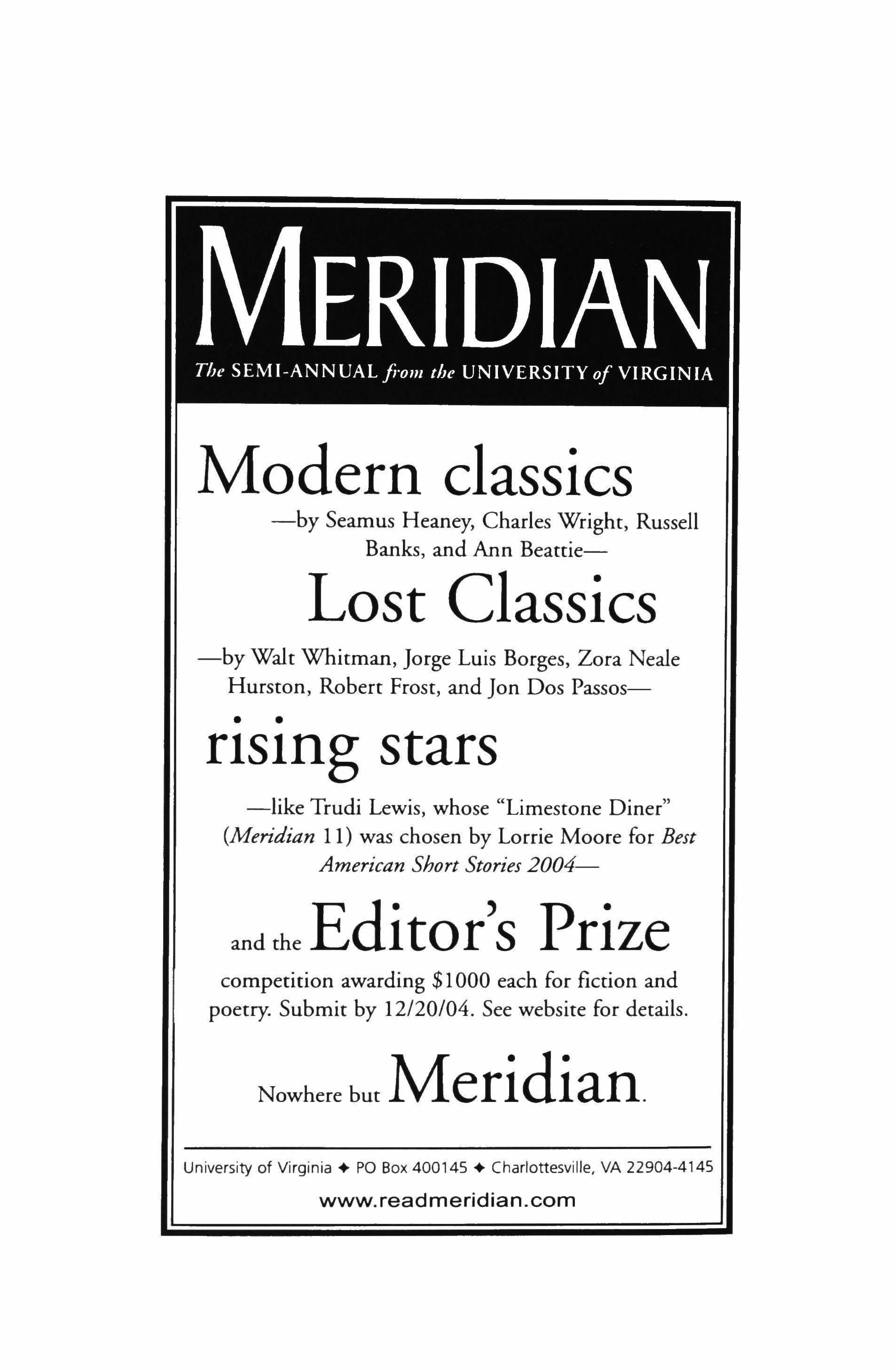
competition awarding $1000 each for fiction and poetry. Submit by 12/20104. See website for details.
The SEMI-ANNUAL ji-Olll the UNIVERSITY of VIRGINIA
andtheEditor's Prize
Nowhere but Meridian. University of Virginia + PO Box 400145 + Charlottesville, VA 22904-4145 www.readmeridian.com


U cia Rerillo
Ntlr:anfta Field
rienne Rich
Marvin Bell
Maurice Kilwein Guevara
Ralph Angel
Linda Gregerson
Arthur Smith
Sharon Bryan
Campbell McGrath
Michelle Boisseau
Dorothy Barresi
Mary Ruefle
Norman Dubie
David Wojahn
Reginald Shepherd
Pamela Stewart
James D'Agostino
Jack Myers
J. Allyn Rosser
Jaime Saenz
Translated from the Spanish by Forrest Gander and Kent Johnson
Alfonso D'Aquino
Translated from the Spanish by James Ryang
Robin Behn
Linda Bierds
Stanley Plumly
Richard Jackson
Claire Bateman
Steve Orlen
Cynthia Huntington
Jean Valentine
Alane Rollings
Beckian Fritz Goldberg
Betsy Sholl
Tony Hoagland
David St. John
Richard Lyons
Martha Rhodes
Mark Halliday
Carl Phillips
John Koethe
TriQuarterlyl19
$11.95













































































 after Phillip K. Dick
after Phillip K. Dick













































































































































